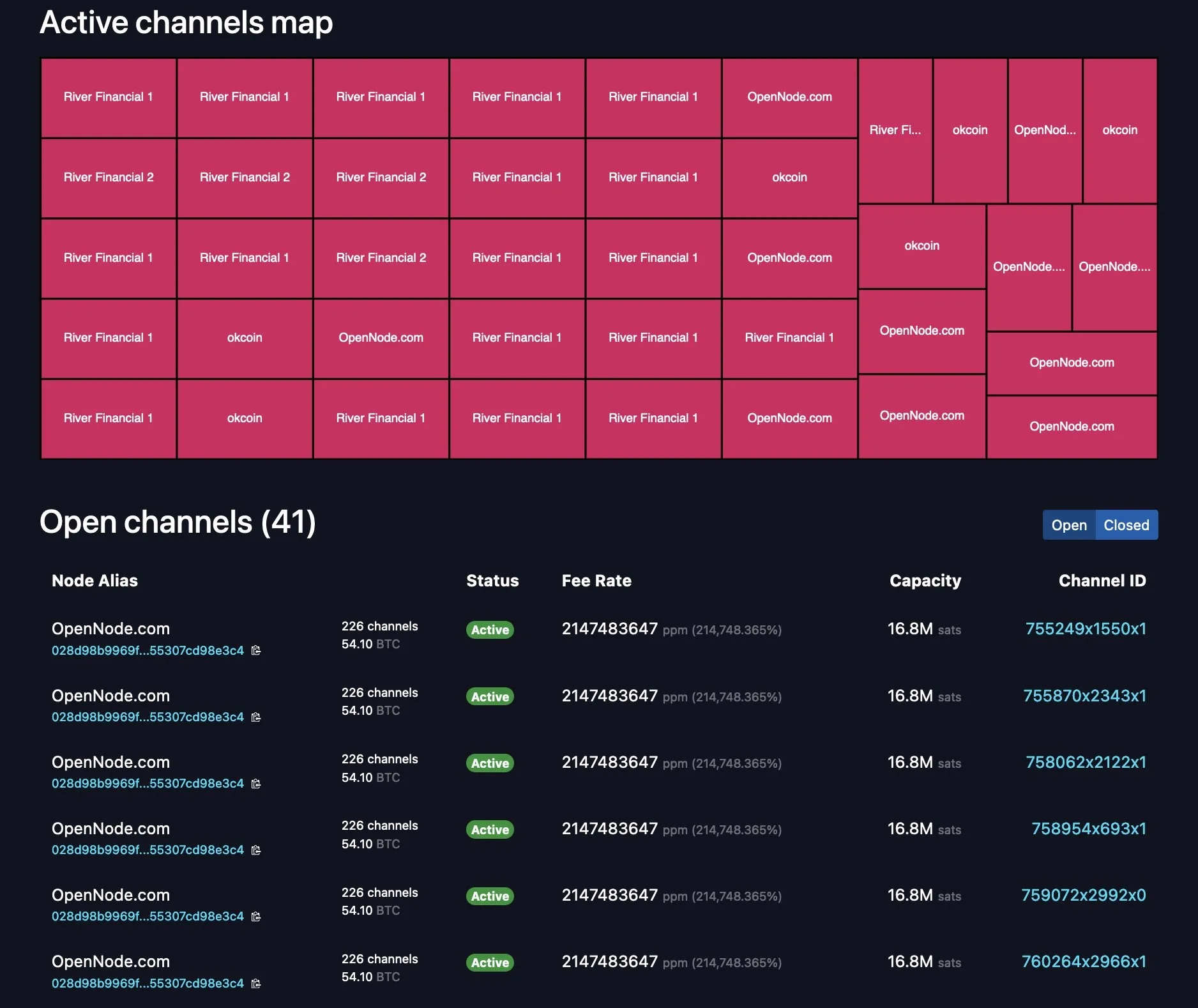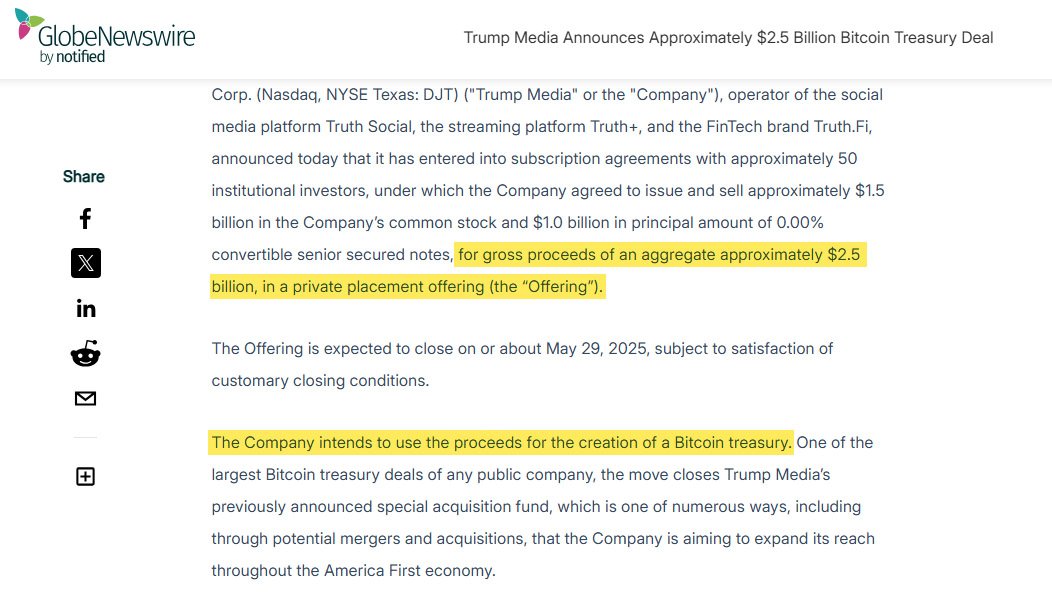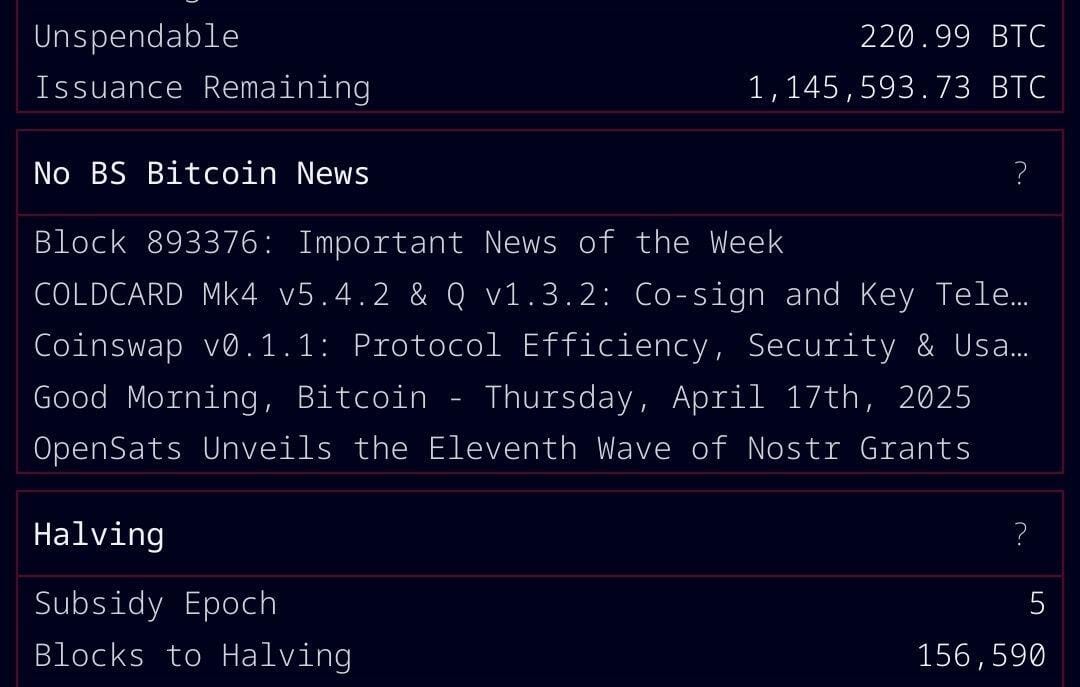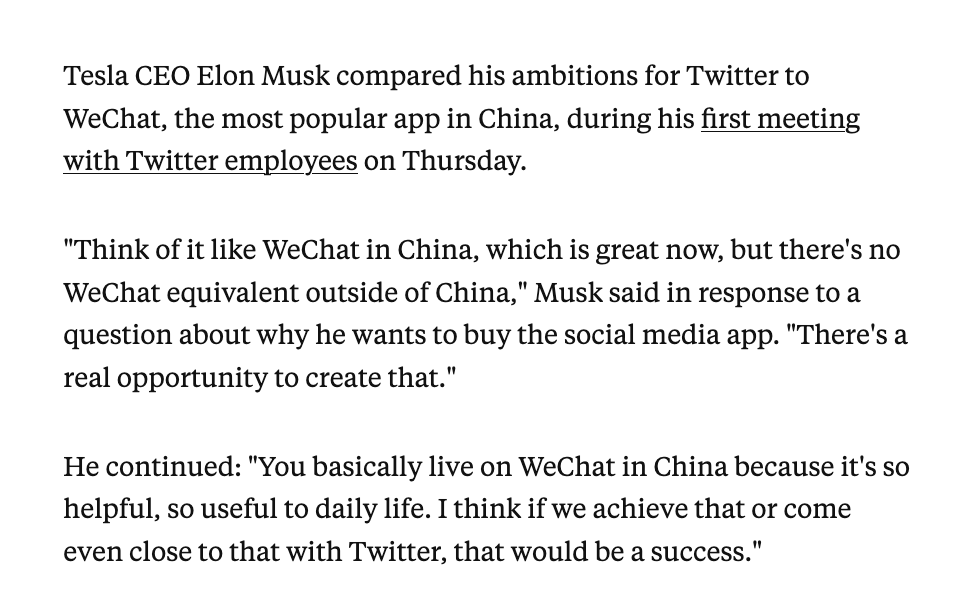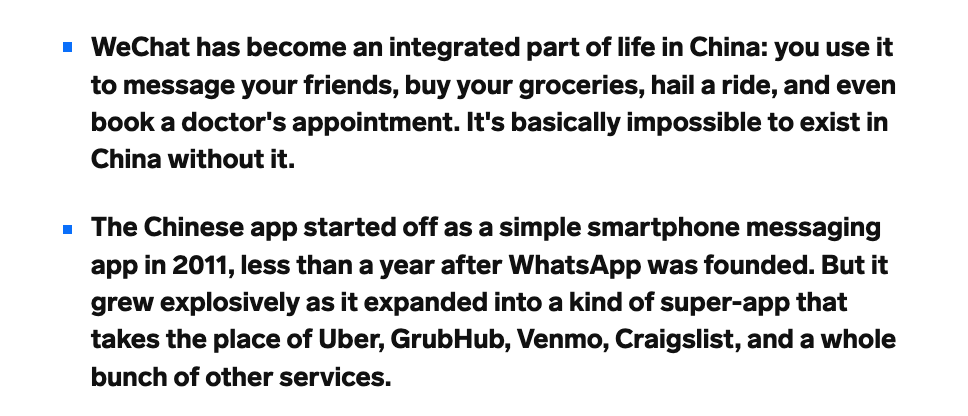-
 @ 19497234:86e67560
2025-06-02 17:18:45
@ 19497234:86e67560
2025-06-02 17:18:45By: Morris Kuol Yoll
South Sudan’s political landscape has undergone significant shifts, with Bol Mel’s rapid rise sparking intense debate. His appointment as First Vice President by President Salva Kiir, along with his roles as Special Presidential Envoy for Sudan, Deputy Secretary for the SPLM Party, and his promotion to General, has led many to speculate that Kiir is grooming him as his successor.
This shift in leadership strategy contrasts sharply with South Sudan’s historical pattern of political succession, traditionally shaped by military and revolutionary credentials. Bol Mel’s path to power, however, appears orchestrated through political favoritism rather than earned through military or democratic legitimacy. His ascent has raised fundamental questions about his leadership capabilities, legitimacy, and public acceptance in a country where succession has long been determined by hierarchical seniority within the SPLM/A.
As South Sudan approaches another critical political transition, understanding the historical foundations of leadership in the SPLM/A and contrasting past leaders’ paths to power against Bol Mel’s political trajectory offers valuable insight into whether his leadership will be accepted or challenged by the South Sudanese people.
The Rise of the SPLM and Dr. John Garang’s Leadership
Before the armed struggle erupted in 1983, Southern Sudanese practiced multiparty democracy, electing their High Executive Council leaders through a democratic system, despite periodic interference from the Sudanese regime. However, the formation of the Sudan People’s Liberation Movement (SPLM) fundamentally altered South Sudan’s political direction.
The SPLM was both a liberation movement and a military force, led by Dr. John Garang, who simultaneously held the positions of political leader and Commander-in-Chief of the SPLA. Unlike previous leaders who championed South Sudanese autonomy, Garang pursued the New Sudan ideology, advocating for unity rather than separation. Under his leadership, alternative ideologies, including independence, were discouraged, forcing veteran Southern Sudanese politicians who had joined the liberation struggle to align with the SPLM’s ideological framework.
Dr. John Garang’s Path to Leadership
Despite being a colonel in the Sudanese army, Dr. John Garang had never held a political position in either the Sudanese government or Southern Sudan’s administration. He was largely unknown to Southern Sudanese civilians, except for his military colleagues, who recognized his political inclinations.
In 1983, following Major Kerbino Kuanyin Bol’s rebellion, Garang, along with other commanders, joined the armed struggle. While South Sudan had numerous seasoned politicians from various parties, they were excluded from forming the SPLM, consolidating Garang’s political and military dominance.
Resistance from veterans of Anyanya-Two initially challenged Garang’s leadership, but his close allies—Kerbino Kuanyin Bol, William Nyuon Bany, and Salva Kiir Mayardit—helped secure his authority, allowing him to establish both the SPLM and SPLA as the defining forces of Southern Sudan and the Sudan’s liberation movement.
Garang’s Leadership and Public Acceptance
Garang’s ability to lead the liberation struggle was rooted in his military training and higher education, qualities that Southern Sudanese recognized and embraced. Unlike other leaders, he did not rely on political favoritism—his success was a result of his charisma, strategic thinking, and ability to define South Sudan’s grievances on a national platform.
Under Garang, Southern Sudanese felt politically represented for the first time in Sudanese politics. His leadership allowed him to articulate the injustices faced by South Sudan and marginalized regions, gaining him widespread support.
Upon his tragic death, the leadership baton was passed to Salva Kiir, who inherited power through the traditional military succession line, marking a stark contrast to the political path Bol Mel is now taking.
Salva Kiir’s Rise to Power and the Contrast with Bol Mel’s Leadership
Following Dr. Garang’s death, General Salva Kiir, as Garang’s Vice President, was swiftly confirmed as his successor. His rise to power followed the SPLM/A’s hierarchical line of succession, making his leadership widely accepted by South Sudanese.
Unlike Garang, who pursued unity with Sudan, Kiir was widely perceived as a champion of Southern Sudan’s independence. This belief helped solidify his leadership, ensuring broad public support as he led the country through the 2011 Referendum, ultimately becoming South Sudan’s first President.
In stark contrast, Bol Mel’s rise lacks revolutionary legitimacy, as his leadership appears imposed rather than organically earned. His absence from the liberation struggle, coupled with allegations of corruption, places his acceptance at serious risk.
Bol Mel’s Business and Political Credibility: Challenges to His Legitimacy
Bol Mel’s business background, rather than military credentials, forms the foundation of his political presence. Questions surrounding how he amassed his wealth, particularly his control over major government-funded projects, oil exports, and road construction, have made his legitimacy a contentious issue.
Public concerns over his business dealings, particularly his alleged involvement in crude oil quotas meant for infrastructure development, fuel accusations of corruption, as roads promised through oil-funded projects remain unfinished despite years of revenue collection.
Unlike past SPLM leaders, whose military and revolutionary credentials secured their leadership, Bol Mel’s reputation is largely built on financial power, making his credibility in leading the country questionable.
Question of Bol Mel’s Political and Generational Positioning
While Bol Mel is portrayed as a younger generation leader, the SPLM has many capable younger members who would warrant legitimate public support. His rise does not represent a merit-based generational shift, but rather political favoritism engineered by President Kiir.
Furthermore, the SPLM party has gradually lost its ideological foundation, existing more in name than in practice. Loyal SPLM/A veterans have been sidelined, while outsiders, who joined after the peace agreement, now dominate political leadership.
Kiir’s systematic removal of key SPLM/A officers appears to be clearing the path for Bol Mel, making his transition controversial rather than widely accepted.
Conclusion & Summary
Bol Mel’s rise to power significantly challenges South Sudan’s traditional leadership structure. Unlike previous leaders who earned legitimacy through revolutionary struggle, Bol Mel’s leadership appears as favoritism rather than earned.
His military credentials are weak, his business empire is tied to corruption allegations, and his public support base is limited.
The South Sudanese people yearn for strong leadership—one that fights corruption, invests in development, and fosters peace in a deeply divided country. Bol Mel does not exhibit these qualities at present, which will complicate his acceptance if he ascends to power.
Ultimately, South Sudan’s next leader must unify the country, promote development, and restore political trust—qualities that Bol Mel has yet to demonstrate. This raises questions about whether his leadership will bring stability or intensify political turmoil.
Morris Kuol Yoll is a South Sudanese Canadian who resides in Alberta, Canada, and can be reached at: myoll2002@yahoo.com
-
 @ b7274d28:c99628cb
2025-05-28 01:11:43
@ b7274d28:c99628cb
2025-05-28 01:11:43In this second installment of The Android Elite Setup tutorial series, we will cover installing the nostr:npub10r8xl2njyepcw2zwv3a6dyufj4e4ajx86hz6v4ehu4gnpupxxp7stjt2p8 on your #Android device and browsing for apps you may be interested in trying out.
Since the #Zapstore is a direct competitor to the Google Play Store, you're not going to be able to find and install it from there like you may be used to with other apps. Instead, you will need to install it directly from the developer's GitHub page. This is not a complicated process, but it is outside the normal flow of searching on the Play Store, tapping install, and you're done.
Installation
From any web browser on your Android phone, navigate to the Zapstore GitHub Releases page and the most recent version will be listed at the top of the page. The .apk file for you to download and install will be listed in the "Assets."
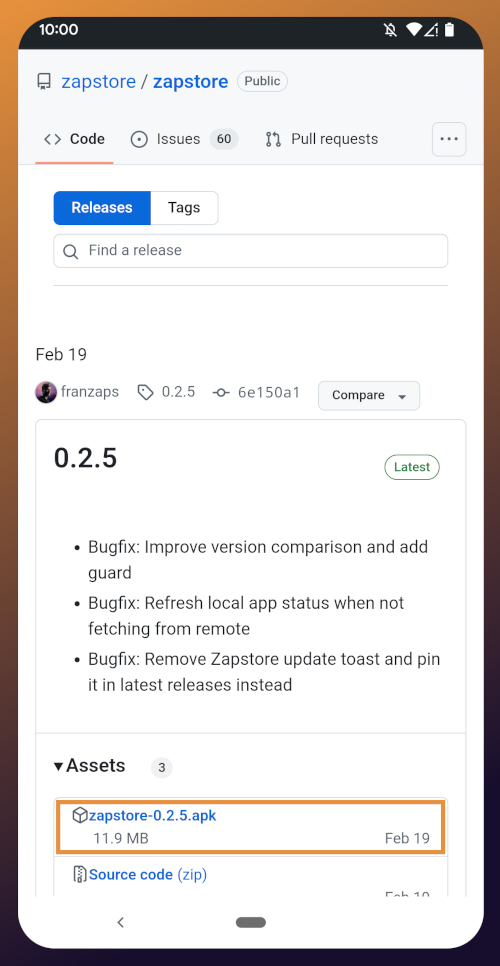
Tap the .apk to download it, and you should get a notification when the download has completed, with a prompt to open the file.
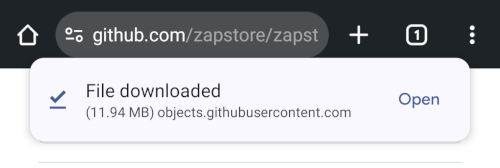
You will likely be presented with a prompt warning you that your phone currently isn't allowed to install applications from "unknown sources." Anywhere other than the Play Store is considered an "unknown source" by default. However, you can manually allow installation from unknown sources in the settings, which the prompt gives you the option to do.
In the settings page that opens, toggle it to allow installation from this source, and you should be prompted to install the application. If you aren't, simply go to your web browser's downloads and tap on the .apk file again, or go into your file browser app and you should find the .apk in your Downloads folder.

If the application doesn't open automatically after install, you will find it in your app drawer.
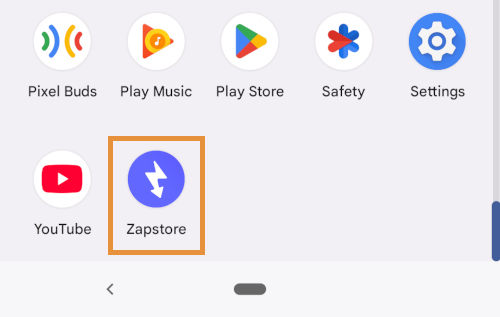
Home Page
Right at the top of the home page in the Zapstore is the search bar. You can use it to find a specific app you know is available in the Zapstore.
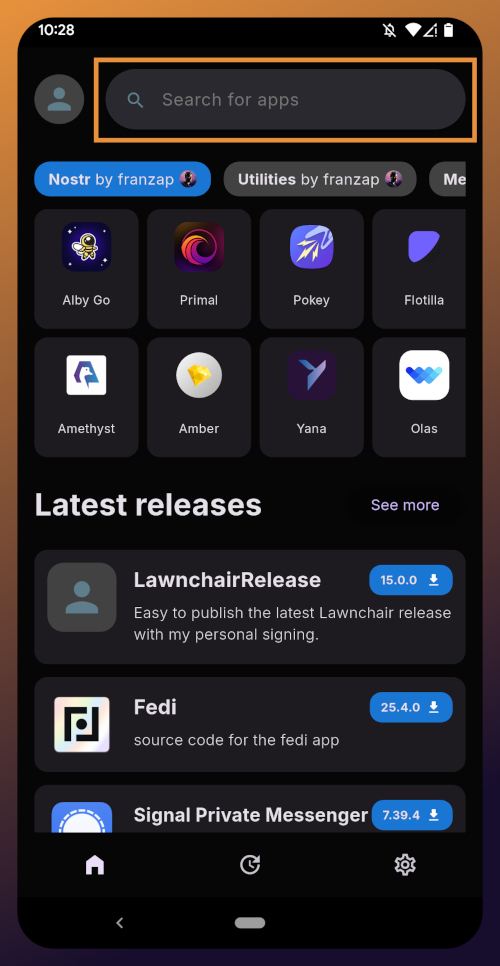
There are quite a lot of open source apps available, and more being added all the time. Most are added by the Zapstore developer, nostr:npub1wf4pufsucer5va8g9p0rj5dnhvfeh6d8w0g6eayaep5dhps6rsgs43dgh9, but some are added by the app developers themselves, especially Nostr apps. All of the applications we will be installing through the Zapstore have been added by their developers and are cryptographically signed, so you know that what you download is what the developer actually released.
The next section is for app discovery. There are curated app collections to peruse for ideas about what you may want to install. As you can see, all of the other apps we will be installing are listed in nostr:npub1wf4pufsucer5va8g9p0rj5dnhvfeh6d8w0g6eayaep5dhps6rsgs43dgh9's "Nostr" collection.
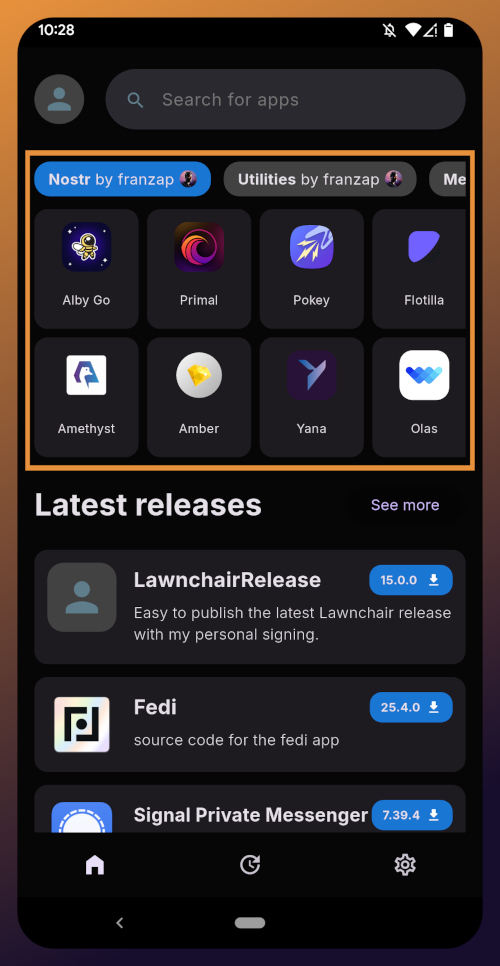
In future releases of the Zapstore, users will be able to create their own app collections.
The last section of the home page is a chronological list of the latest releases. This includes both new apps added to the Zapstore and recently updated apps. The list of recent releases on its own can be a great resource for discovering apps you may not have heard of before.
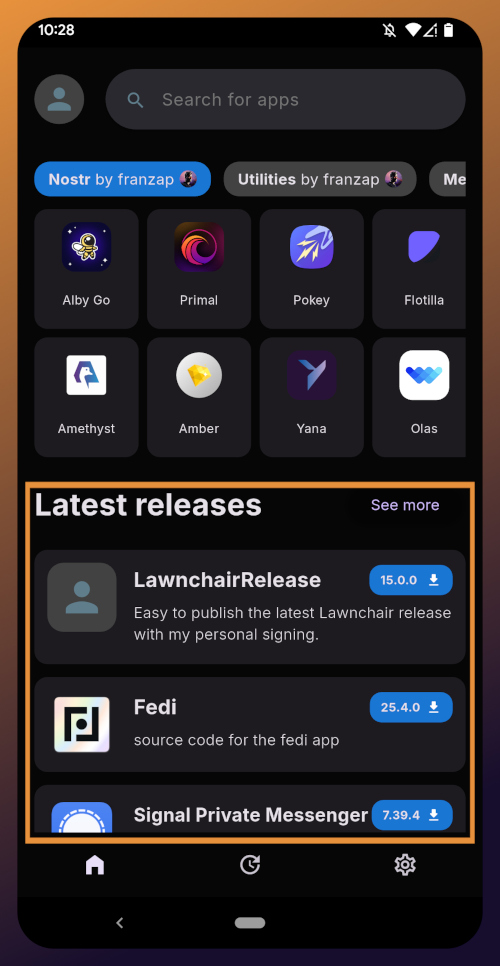
Installed Apps
The next page of the app, accessed by the icon in the bottom-center of the screen that looks like a clock with an arrow circling it, shows all apps you have installed that are available in the Zapstore. It's also where you will find apps you have previously installed that are ready to be updated. This page is pretty sparse on my test profile, since I only have the Zapstore itself installed, so here is a look at it on my main profile:
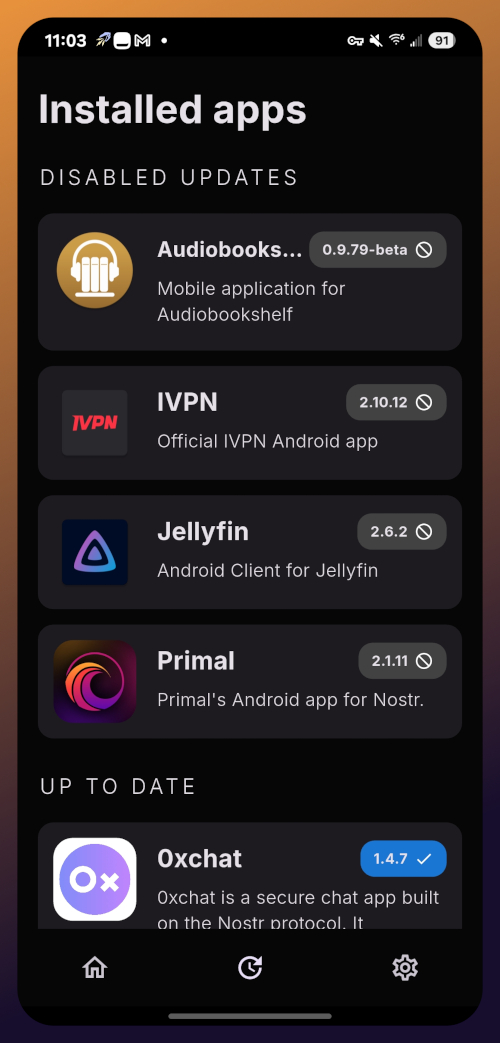
The "Disabled Apps" at the top are usually applications that were installed via the Play Store or some other means, but are also available in the Zapstore. You may be surprised to see that some of the apps you already have installed on your device are also available on the Zapstore. However, to manage their updates though the Zapstore, you would need to uninstall the app and reinstall it from the Zapstore instead. I only recommend doing this for applications that are added to the Zapstore by their developers, or you may encounter a significant delay between a new update being released for the app and when that update is available on the Zapstore.
Tap on one of your apps in the list to see whether the app is added by the developer, or by the Zapstore. This takes you to the application's page, and you may see a warning at the top if the app was not installed through the Zapstore.
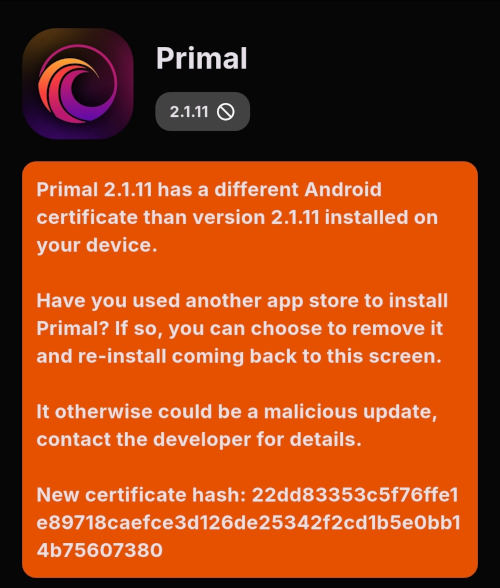
Scroll down the page a bit and you will see who signed the release that is available on the Zapstore.

In the case of Primal, even though the developer is on Nostr, they are not signing their own releases to the Zapstore yet. This means there will likely be a delay between Primal releasing an update and that update being available on the Zapstore.
Settings
The last page of the app is the settings page, found by tapping the cog at the bottom right.
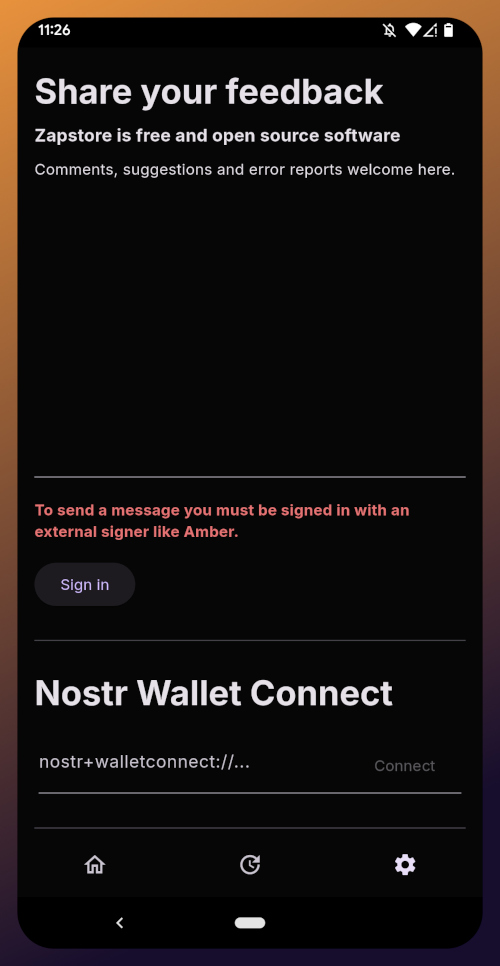
Here you can send the Zapstore developer feedback directly (if you are logged in), connect a Lightning wallet using Nostr Wallet Connect, delete your local cache, and view some system information.
We will be adding a connection to our nostr:npub1h2qfjpnxau9k7ja9qkf50043xfpfy8j5v60xsqryef64y44puwnq28w8ch wallet in part 5 of this tutorial series.
For the time being, we are all set with the Zapstore and ready for the next stage of our journey.
Continue to Part 3: Amber Signer. Nostr link: nostr:naddr1qqxnzde5xuengdeexcmnvv3eqgstwf6d9r37nqalwgxmfd9p9gclt3l0yc3jp5zuyhkfqjy6extz3jcrqsqqqa28qy2hwumn8ghj7un9d3shjtnyv9kh2uewd9hj7qg6waehxw309aex2mrp0yhxyunfva58gcn0d36zumn9wss80nug
-
 @ 0c65eba8:4a08ef9a
2025-06-02 17:18:50
@ 0c65eba8:4a08ef9a
2025-06-02 17:18:50If you’ve been following me, you know I only offer what I live. I’ve created something life-changing for fathers with sons aged 10–14, and I want you to join me.
I’m doing this with my own son. And I’m looking for just ten other fathers to join us. This will be an exclusive group. You’ll meet my son. Your sons will interact with each other. That means I’m only choosing men I’d personally want around. Men who will protect, challenge, and elevate each other and our boys.
This is not a retreat. It's not a weekend workshop. It's not a fun hike with your kid.
This is a one-year rite of passage designed to initiate your son, and yourself, into manhood. It's a call to fathers ready to lead on a new level.
If you're a father with a son aged 10–14, and you already know that modern culture is not going to turn him into a man, you need to read this.
What we're offering is not mainstream. It is not ideological. It is not religious, though it is fully compatible with your religious beliefs. It's the revival of a lost tradition: the intentional, demanding, and sacred transfer of masculine responsibility from father to son.
The Program
-
Starts October. Ends with a 170km Mont Blanc trek in late June 2025.
-
Includes bi-weekly training for fathers on how to teach masculinity, logic, discipline, and legacy.
-
Includes physical training plans, intellectual and moral development, and the cultivation of sovereignty.
-
Ends with a 10–14 day hike and formal coming-of-age ceremony on the trail.
What You’ll Get as a Father
-
A framework to build your family legacy
-
The tools to teach your son how to think, speak, and act like a man
-
A tribe of other fathers walking the same road
-
A transformation in your own identity as a sovereign leader, not just a provider
What Your Son Will Gain
-
A year of direct male mentorship
-
Physical, emotional, and spiritual preparation for adolescence
-
A clear initiation into manhood acknowledged by his father and peers
-
The confidence that comes from being tested and affirmed in his masculinity and sovereignty
Why This Matters Now
We live in a culture that infantilizes boys, vilifies men, and offers no clear path from one to the other. If you don’t initiate your son, the culture will, and it will do so with screens, porn, weakness, and shame.
If you're the kind of man who:
-
Knows something is deeply wrong with how boys are being raised today
-
Has the courage and discipline to lead
-
Wants to pass on strength, clarity, and purpose, not confusion
...then this may be the most important investment you ever make.
We are looking for 8 to 10 fathers for the first cohort.
If you're interested in learning more, message me. No price is listed yet, but this is for fathers ready to invest in themselves to become better leaders and in their sons' future as men. If you're looking for a bargain, this isn't for you. If you're looking to make a generational impact, it might be.
🔥 Only 10 Fathers Will Be Chosen
This is not for everyone. This is for fathers who want to lead, fully, unapologetically, and with purpose. If that’s you, don’t wait.
Book your discovery call now and let’s talk. I want to hear your story, meet you man-to-man, and see if you belong in this first cohort.
Let’s build men. One father, one son, one rite at a time.
-
-
 @ 2cde0e02:180a96b9
2025-06-02 17:03:04
@ 2cde0e02:180a96b9
2025-06-02 17:03:04pen; monochromized
https://stacker.news/items/995339
-
 @ ef53426a:7e988851
2025-06-02 17:06:54
@ ef53426a:7e988851
2025-06-02 17:06:54Welcome back to the SWC, folks. We’re about to witness the Money in the Bank title eliminator. The wrestler who climbs the ladder and grabs the briefcase filled with money will be next in line to challenge for the Shitcoin World Championship belt.
Special guest referee ‘Risk-Free’ Raúl Mal starts the action between Sergeant Sol Anna and The Ethereal Ghoul. There’s the bell. The Coinbase Arena is a complete sellout tonight. Who will emerge as the next contender?
The ghoul runs at the ropes and flies at his opponent with a clothesline. Sol Anna dips under, then dips again on the return. The ghoul crashes into the referee instead, and he is down. A ripple of laughter from the audience. Looks like Mal took a knee to the nuts.
Great counter by the sergeant, and the ghoul hits the canvas face-first. A quick elbow drop, then another. My god, she goes down hard. The ghoul blocks through muscle memory, and Sol Anna crosses the ring to take a run-up. Bam. Proof of Stake! What a move. Now she turns her focus to setting up the ladder.
The referee is back up and checks on the downed wrestler.
Sol Anna gets one foot on the ladder. She’s climbing up, but back comes the ghoul.
A blow to the face. And another. No effect. The ghoul latches on and drags Sol Anna back to the canvas.
They lock up, and Sol Anna whips the ghoul into the ladder. By gawd, he’s broken in half! Now what’s she doing? She’s out of the ring, looking under the skirting. What’s that? No. Somebody stop her. Weapons aren’t part of this. That metal could do some serious damage — it’s a hard fork!
The referee comes over to put a stop to this. It’s not legal, even in a hardcore ladder match.
She’s got three seconds to get back in the ring, or it’ll be a count-out. The hard fork will have to wait.
Ethereal Ghoul OUTTA NOWHERE with the NFT! And the referee is down again. Mal’s back was turned. Oh, the humanity. What a dirty trick. And again, a boot to the nether regions. That man is writhing in pain on the floor.
Sol Anna slides back into the ring. She sets up a second ladder while the ghoul doles out more punishment to Raúl Mal.
Now he spots the green of the sergeant’s uniform halfway to the briefcase. Ethereal drags her down. A roundhouse kick connects. He gets into position behind Sol Anna. He lifts her up, looking for the Omega Candle, but no, she reverses and gets his neck. Ooh, the ghoul is in serious trouble here. The tether choke is locked in, but the ghoul can’t tap. The guest referee is still sprawled on the canvas, a mess of black and white stripes.
Sol Anna releases and goes for the first ladder. She gets halfway up, and the Ethereal Ghoul gets to his feet. He’s on the other ladder. How does this work? Will they both go for it? That dangling briefcase is so close—
Wait. Is that the Strategy music? It is. Yes, it is! Sexy Sailor comes sprinting down the ramp. The crowd erupts. Listen to that roar. “Sailor. Sailor!”
Can they still make it to the briefcase? One more step for Sol Anna. The ghoul is close, but Sailor scoots into the ring. He’s got the ladder by the bottom rungs.
Oh, the crowd knows what’s coming. Sol Anna shakes her head. Don’t do it.
“Do it. Do it,” the crowd chants.
Sailor grins at the camera. The rugpull! RUGPULL! He rips the ladder away and Sergeant Sol Anna bounces off the turnbuckle and crashes to the canvas. Oh brother, that looked painful.
Now he’s got the ghoul in his sights. Another rugpull. Ethereal Ghoul is down. I think he fell right on top of the referee.
“Michael. Michael,” the crowd sings.
Both contenders look completely out of gas. And then there’s this guy. He’s got a microphone. What’s Sexy Sailor going to tell us?
“I’m going to set up this ladder here and teach these two shitcoiners a lesson.”
Chants of “SWC, SWC,” ring out.
Sailor scales the ladder, mic in hand.
There’s a hush in the arena.
“What do we say when some contender claims to be the next big thing?”
Still quiet.
“We say this. THERE IS NO SECOND BEST.” Sailor drinks in the atmosphere and puts his hand to his ear, motioning for the crowd to continue.
60,000 people in unison chant, “THERE IS NO SECOND BEST CRYPTO ASSET.”
Sailor reaches for the briefcase. He has it. Sexy Sailor wins the Money in the Bank match. Confetti falls and he climbs back down to the canvas. Ethereal Ghoul and Sergeant Sol Anna slink out of the ring, hobbling back up the ramp.
“Wait,” he says. “Let’s see what’s in this briefcase.”
Oh my, he’s tossing banknotes everywhere. Covering the ring. Some have floated in the crowd. It’s like an ATM explosion.
“Hey, ghoul. Sol Anna. You see this paper? It’s even more worthless than you.”
Finally, the guest referee Raúl Mal gets back to his feet. He raises Sexy Sailor’s hand, confirming the winner of the Money in the Bank match CryptoSlam 2025.
Oh no! Not again. Sailor takes aim at Mal’s groin. Blam. Money shot. And again. Mal is down again. Surely he can’t come back from this.
“I’ve still got this mic. It’s over when I say it’s over.”
A few more shouts of “Sailor” ring out.
“This is what I think of your worthless fiat.”
He’s dropping his pants. Not again. Oh no. This is not what SWC audiences want to see.
“All these banknotes are good for… is wiping my gray hairy ass.” He turns to the contenders still fleeing the scene. “Have fun staying poor, shitcoiners,” he screams, and then drops the mic.
What an event. What a match, people!
Keep watching. We’ve got the Royal Rugpull coming right up. Thirty-two of SWC’s top memecoins are battling it out here at CryptoSlam 25. Don’t go ANYWHERE.
-
 @ dfa02707:41ca50e3
2025-06-02 17:02:13
@ dfa02707:41ca50e3
2025-06-02 17:02:13Contribute to keep No Bullshit Bitcoin news going.
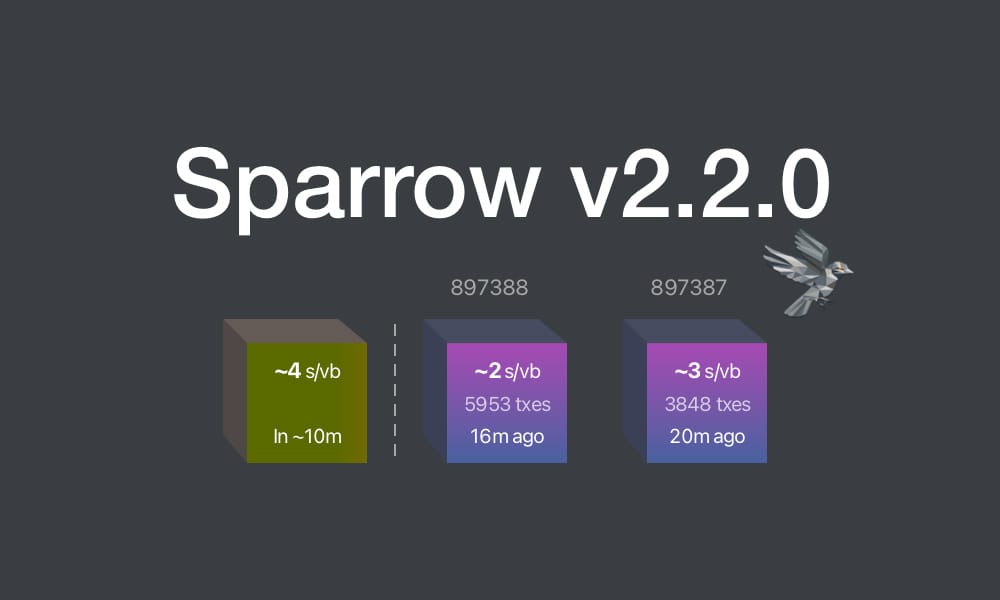
This update brings key enhancements for clarity and usability:
- Recent Blocks View: Added to the Send tab and inspired by Mempool's visualization, it displays the last 2 blocks and the estimated next block to help choose fee rates.
- Camera System Overhaul: Features a new library for higher resolution detection and mouse-scroll zoom support when available.
- Vector-Based Images: All app images are now vectorized and theme-aware, enhancing contrast, especially in dark mode.
- Tor & P2A Updates: Upgraded internal Tor and improved support for pay-to-anchor (P2A) outputs.
- Linux Package Rename: For Linux users, Sparrow has been renamed to sparrowwallet (or sparrowserver); in some cases, the original sparrow package may need manual removal.
- Additional updates include showing total payments in multi-payment transaction diagrams, better handling of long labels, and other UI enhancements.
- Sparrow v2.2.1 is a bug fix release that addresses missing UUID issue when starting Tor on recent macOS versions, icons for external sources in Settings and Recent Blocks view, repackaged
.debinstalls to use older gzip instead of zstd compression, and removed display of median fee rate where fee rates source is set to Server.
Learn how to get started with Sparrow wallet:
Release notes (v2.2.0)
- Added Recent Blocks view to Send tab.
- Converted all bitmapped images to theme aware SVG format for all wallet models and dialogs.
- Support send and display of pay to anchor (P2A) outputs.
- Renamed
sparrowpackage tosparrowwalletandsparrowserveron Linux. - Switched camera library to openpnp-capture.
- Support FHD (1920 x 1080) and UHD4k (3840 x 2160) capture resolutions.
- Support camera zoom with mouse scroll where possible.
- In the Download Verifier, prefer verifying the dropped file over the default file where the file is not in the manifest.
- Show a warning (with an option to disable the check) when importing a wallet with a derivation path matching another script type.
- In Cormorant, avoid calling the
listwalletdirRPC on initialization due to a potentially slow response on Windows. - Avoid server address resolution for public servers.
- Assume server address is non local for resolution failures where a proxy is configured.
- Added a tooltip to indicate truncated labels in table cells.
- Dynamically truncate input and output labels in the tree on a transaction tab, and add tooltips if necessary.
- Improved tooltips for wallet tabs and transaction diagrams with long labels.
- Show the address where available on input and output tooltips in transaction tab tree.
- Show the total amount sent in payments in the transaction diagram when constructing multiple payment transactions.
- Reset preferred table column widths on adjustment to improve handling after window resizing.
- Added accessible text to improve screen reader navigation on seed entry.
- Made Wallet Summary table grow horizontally with dialog sizing.
- Reduced tooltip show delay to 200ms.
- Show transaction diagram fee percentage as less than 0.01% rather than 0.00%.
- Optimized and reduced Electrum server RPC calls.
- Upgraded Bouncy Castle, PGPainless and Logback libraries.
- Upgraded internal Tor to v0.4.8.16.
- Bug fix: Fixed issue with random ordering of keystore origins on labels import.
- Bug fix: Fixed non-zero account script type detection when signing a message on Trezor devices.
- Bug fix: Fixed issue parsing remote Coldcard xpub encoded on a different network.
- Bug fix: Fixed inclusion of fees on wallet label exports.
- Bug fix: Increase Trezor device libusb timeout.
Linux users: Note that the
sparrowpackage has been renamed tosparrowwalletorsparrowserver, and in some cases you may need to manually uninstall the originalsparrowpackage. Look in the/optfolder to ensure you have the new name, and the original is removed.What's new in v2.2.1
- Updated Tor library to fix missing UUID issue when starting Tor on recent macOS versions.
- Repackaged
.debinstalls to use older gzip instead of zstd compression. - Removed display of median fee rate where fee rates source is set to Server.
- Added icons for external sources in Settings and Recent Blocks view
- Bug fix: Fixed issue in Recent Blocks view when switching fee rates source
- Bug fix: Fixed NPE on null fee returned from server
-
 @ dfa02707:41ca50e3
2025-06-02 17:02:12
@ dfa02707:41ca50e3
2025-06-02 17:02:12- This version introduces the Soroban P2P network, enabling Dojo to relay transactions to the Bitcoin network and share others' transactions to break the heuristic linking relaying nodes to transaction creators.
- Additionally, Dojo admins can now manage API keys in DMT with labels, status, and expiration, ideal for community Dojo providers like Dojobay. New API endpoints, including "/services" exposing Explorer, Soroban, and Indexer, have been added to aid wallet developers.
- Other maintenance updates include Bitcoin Core, Tor, Fulcrum, Node.js, plus an updated ban-knots script to disconnect inbound Knots nodes.
"I want to thank all the contributors. This again shows the power of true Free Software. I also want to thank everyone who donated to help Dojo development going. I truly appreciate it," said Still Dojo Coder.
What's new
- Soroban P2P network. For MyDojo (Docker setup) users, Soroban will be automatically installed as part of their Dojo. This integration allows Dojo to utilize the Soroban P2P network for various upcoming features and applications.
- PandoTx. PandoTx serves as a transaction transport layer. When your wallet sends a transaction to Dojo, it is relayed to a random Soroban node, which then forwards it to the Bitcoin network. It also enables your Soroban node to receive and relay transactions from others to the Bitcoin network and is designed to disrupt the assumption that a node relaying a transaction is closely linked to the person who initiated it.
- Pushing transactions through Soroban can be deactivated by setting
NODE_PANDOTX_PUSH=offindocker-node.conf. - Processing incoming transactions from Soroban network can be deactivated by setting
NODE_PANDOTX_PROCESS=offindocker-node.conf.
- Pushing transactions through Soroban can be deactivated by setting
- API key management has been introduced to address the growing number of people offering their Dojos to the community. Dojo admins can now access a new API management tab in their DMT, where they can create unlimited API keys, assign labels for easy identification, and set expiration dates for each key. This allows admins to avoid sharing their main API key and instead distribute specific keys to selected parties.
- New API endpoints. Several new API endpoints have been added to help API consumers develop features on Dojo more efficiently:
- New:
/latest-block- returns data about latest block/txout/:txid/:index- returns unspent output data/support/services- returns info about services that Dojo exposes
- Updated:
/tx/:txid- endpoint has been updated to return raw transaction with parameter?rawHex=1
- The new
/support/servicesendpoint replaces the deprecatedexplorerfield in the Dojo pairing payload. Although still present, API consumers should use this endpoint for explorer and other pairing data.
- New:
Other changes
- Updated ban script to disconnect inbound Knots nodes.
- Updated Fulcrum to v1.12.0.
- Regenerate Fulcrum certificate if expired.
- Check if transaction already exists in pushTx.
- Bump BTC-RPC Explorer.
- Bump Tor to v0.4.8.16, bump Snowflake.
- Updated Bitcoin Core to v29.0.
- Removed unnecessary middleware.
- Fixed DB update mechanism, added api_keys table.
- Add an option to use blocksdir config for bitcoin blocks directory.
- Removed deprecated configuration.
- Updated Node.js dependencies.
- Reconfigured container dependencies.
- Fix Snowflake git URL.
- Fix log path for testnet4.
- Use prebuilt addrindexrs binaries.
- Add instructions to migrate blockchain/fulcrum.
- Added pull policies.


Learn how to set up and use your own Bitcoin privacy node with Dojo here.
-
 @ 7f6db517:a4931eda
2025-06-02 17:02:21
@ 7f6db517:a4931eda
2025-06-02 17:02:21
What is KYC/AML?
- The acronym stands for Know Your Customer / Anti Money Laundering.
- In practice it stands for the surveillance measures companies are often compelled to take against their customers by financial regulators.
- Methods differ but often include: Passport Scans, Driver License Uploads, Social Security Numbers, Home Address, Phone Number, Face Scans.
- Bitcoin companies will also store all withdrawal and deposit addresses which can then be used to track bitcoin transactions on the bitcoin block chain.
- This data is then stored and shared. Regulations often require companies to hold this information for a set number of years but in practice users should assume this data will be held indefinitely. Data is often stored insecurely, which results in frequent hacks and leaks.
- KYC/AML data collection puts all honest users at risk of theft, extortion, and persecution while being ineffective at stopping crime. Criminals often use counterfeit, bought, or stolen credentials to get around the requirements. Criminals can buy "verified" accounts for as little as $200. Furthermore, billions of people are excluded from financial services as a result of KYC/AML requirements.
During the early days of bitcoin most services did not require this sensitive user data, but as adoption increased so did the surveillance measures. At this point, most large bitcoin companies are collecting and storing massive lists of bitcoiners, our sensitive personal information, and our transaction history.
Lists of Bitcoiners
KYC/AML policies are a direct attack on bitcoiners. Lists of bitcoiners and our transaction history will inevitably be used against us.
Once you are on a list with your bitcoin transaction history that record will always exist. Generally speaking, tracking bitcoin is based on probability analysis of ownership change. Surveillance firms use various heuristics to determine if you are sending bitcoin to yourself or if ownership is actually changing hands. You can obtain better privacy going forward by using collaborative transactions such as coinjoin to break this probability analysis.
Fortunately, you can buy bitcoin without providing intimate personal information. Tools such as peach, hodlhodl, robosats, azteco and bisq help; mining is also a solid option: anyone can plug a miner into power and internet and earn bitcoin by mining privately.
You can also earn bitcoin by providing goods and/or services that can be purchased with bitcoin. Long term, circular economies will mitigate this threat: most people will not buy bitcoin - they will earn bitcoin - most people will not sell bitcoin - they will spend bitcoin.
There is no such thing as KYC or No KYC bitcoin, there are bitcoiners on lists and those that are not on lists.
If you found this post helpful support my work with bitcoin.

-
 @ eb0157af:77ab6c55
2025-06-02 17:02:06
@ eb0157af:77ab6c55
2025-06-02 17:02:06The Wall Street financial institution has signed strategic agreements for bitcoin-backed loans with Maple Finance and FalconX.
According to Bloomberg, on May 27 Cantor Fitzgerald officially launched its new division dedicated to Bitcoin lending, announcing the completion of the first transactions of its Bitcoin Financing Business. The Wall Street firm confirmed it has finalized a first round of deals with two crypto sector players: Maple Finance and FalconX.
The company initially plans to make up to $2 billion in financing available to institutional clients.
Brandon Lutnick, President of Cantor Fitzgerald, commented:
“From the start, Cantor recognized the transformative impact that financial services for digital assets would have on the global economy. This milestone highlights how the combination of Cantor’s deep expertise and entrepreneurial spirit creates a distinctive advantage on Wall Street.”
The partnership with Maple Finance is part of Cantor’s broader expansion strategy. Sidney Powell, Co-Founder and CEO of Maple Finance, emphasized how the deal will expand his company’s ability to serve clients looking to access the digital asset market:
“We’re seeing strong and growing demand from institutions seeking to enter the crypto market through trusted and regulated channels.”
Josh Barkhordar, Head of U.S. Sales at FalconX, stated:
“Digital assets have lacked the institutional-grade credit infrastructure essential for healthy capital markets. This collaboration between Cantor and a crypto-native firm is a meaningful step toward building that framework.”
To ensure the security and reliability of its bitcoin-backed financing services, Cantor Fitzgerald has selected Anchorage Digital and Copper.co for custody solutions.
The post Cantor Fitzgerald launches first bitcoin-backed loans appeared first on Atlas21.
-
 @ 7f6db517:a4931eda
2025-06-02 17:02:21
@ 7f6db517:a4931eda
2025-06-02 17:02:21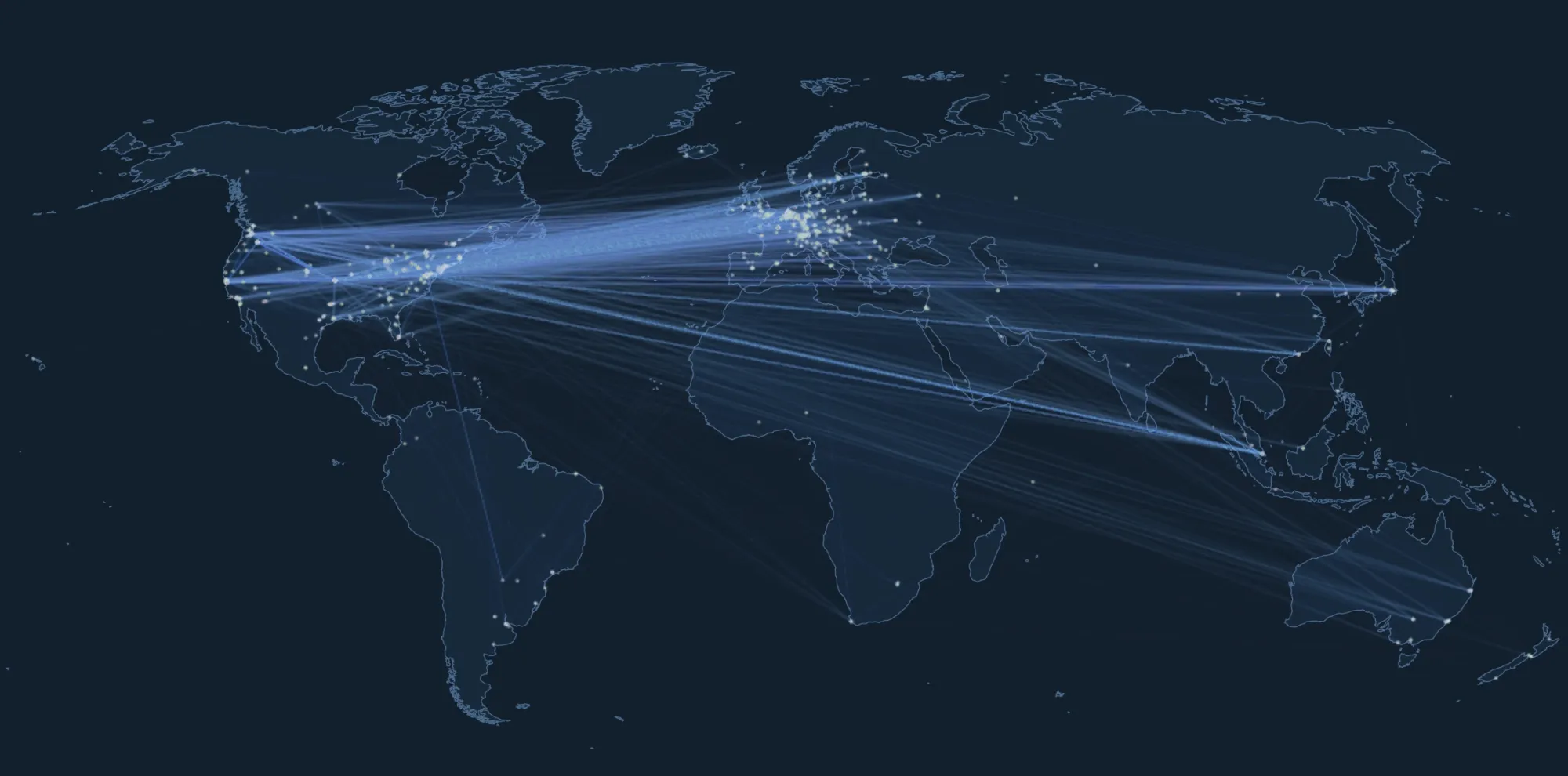
The former seems to have found solid product market fit. Expect significant volume, adoption, and usage going forward.
The latter's future remains to be seen. Dependence on Tor, which has had massive reliability issues, and lack of strong privacy guarantees put it at risk.
— ODELL (@ODELL) October 27, 2022
The Basics
- Lightning is a protocol that enables cheap and fast native bitcoin transactions.
- At the core of the protocol is the ability for bitcoin users to create a payment channel with another user.
- These payment channels enable users to make many bitcoin transactions between each other with only two on-chain bitcoin transactions: the channel open transaction and the channel close transaction.
- Essentially lightning is a protocol for interoperable batched bitcoin transactions.
- It is expected that on chain bitcoin transaction fees will increase with adoption and the ability to easily batch transactions will save users significant money.
- As these lightning transactions are processed, liquidity flows from one side of a channel to the other side, on chain transactions are signed by both parties but not broadcasted to update this balance.
- Lightning is designed to be trust minimized, either party in a payment channel can close the channel at any time and their bitcoin will be settled on chain without trusting the other party.
There is no 'Lightning Network'
- Many people refer to the aggregate of all lightning channels as 'The Lightning Network' but this is a false premise.
- There are many lightning channels between many different users and funds can flow across interconnected channels as long as there is a route through peers.
- If a lightning transaction requires multiple hops it will flow through multiple interconnected channels, adjusting the balance of all channels along the route, and paying lightning transaction fees that are set by each node on the route.
Example: You have a channel with Bob. Bob has a channel with Charlie. You can pay Charlie through your channel with Bob and Bob's channel with User C.
- As a result, it is not guaranteed that every lightning user can pay every other lightning user, they must have a route of interconnected channels between sender and receiver.
Lightning in Practice
- Lightning has already found product market fit and usage as an interconnected payment protocol between large professional custodians.
- They are able to easily manage channels and liquidity between each other without trust using this interoperable protocol.
- Lightning payments between large custodians are fast and easy. End users do not have to run their own node or manage their channels and liquidity. These payments rarely fail due to professional management of custodial nodes.
- The tradeoff is one inherent to custodians and other trusted third parties. Custodial wallets can steal funds and compromise user privacy.
Sovereign Lightning
- Trusted third parties are security holes.
- Users must run their own node and manage their own channels in order to use lightning without trusting a third party. This remains the single largest friction point for sovereign lightning usage: the mental burden of actively running a lightning node and associated liquidity management.
- Bitcoin development prioritizes node accessibility so cost to self host your own node is low but if a node is run at home or office, Tor or a VPN is recommended to mask your IP address: otherwise it is visible to the entire network and represents a privacy risk.
- This privacy risk is heightened due to the potential for certain governments to go after sovereign lightning users and compel them to shutdown their nodes. If their IP Address is exposed they are easier to target.
- Fortunately the tools to run and manage nodes continue to get easier but it is important to understand that this will always be a friction point when compared to custodial services.
The Potential Fracture of Lightning
- Any lightning user can choose which users are allowed to open channels with them.
- One potential is that professional custodians only peer with other professional custodians.
- We already see nodes like those run by CashApp only have channels open with other regulated counterparties. This could be due to performance goals, liability reduction, or regulatory pressure.
- Fortunately some of their peers are connected to non-regulated parties so payments to and from sovereign lightning users are still successfully processed by CashApp but this may not always be the case going forward.
Summary
- Many people refer to the aggregate of all lightning channels as 'The Lightning Network' but this is a false premise. There is no singular 'Lightning Network' but rather many payment channels between distinct peers, some connected with each other and some not.
- Lightning as an interoperable payment protocol between professional custodians seems to have found solid product market fit. Expect significant volume, adoption, and usage going forward.
- Lightning as a robust sovereign payment protocol has yet to be battle tested. Heavy reliance on Tor, which has had massive reliability issues, the friction of active liquidity management, significant on chain fee burden for small amounts, interactivity constraints on mobile, and lack of strong privacy guarantees put it at risk.
If you have never used lightning before, use this guide to get started on your phone.
If you found this post helpful support my work with bitcoin.

-
 @ da8b7de1:c0164aee
2025-06-02 16:24:06
@ da8b7de1:c0164aee
2025-06-02 16:24:06Amerikai nukleáris végrehajtási rendeletek és szakpolitikai fejlemények
2025.05.23-án az amerikai kormány négy jelentős végrehajtási rendeletet adott ki, amelyek célja egy „nukleáris reneszánsz” felgyorsítása a következő 25 évben. Ezek a rendeletek egy, az egész kormányzatra kiterjedő tervet határoznak meg a 400 GW nukleáris kapacitás elérésére 2050-ig, lefedve az ipar minden területét: engedélyezés, üzemanyagciklus, reaktortechnológia, ellátási lánc, munkaerő, hulladékkezelés, finanszírozás és nemzetközi megállapodások. Azonnali intézkedések között szerepel a biztonságos hazai üzemanyag-ellátás megteremtése, szabályozási reformok, a reaktor-telepítések felgyorsítása, valamint pénzügyi és diplomáciai eszközök alkalmazása az amerikai nukleáris technológia belföldi és nemzetközi előmozdítására. A rendeletek gyorsított szabályozási eljárásokat írnak elő – például az NRC-nek (Nuclear Regulatory Commission) 18 hónapon belül kell elbírálnia az új reaktorokra vonatkozó kérelmeket –, valamint kibővített szerepet adnak az Energiaügyi és Védelmi Minisztériumoknak az engedélyezésben és telepítésben, beleértve a szövetségi földeken való elhelyezést is.
Az NRC jóváhagyta a NuScale kis moduláris reaktor (SMR) tervét
Az amerikai NRC jóváhagyta a NuScale Power 462 MW kapacitású kis moduláris reaktor (SMR) erőművének tervét, ami jelentős mérföldkő az új típusú nukleáris technológiák bevezetésében. Ez az engedélyezés a tervezettnél korábban történt, így a NuScale az egyetlen SMR, amely NRC-tervjóváhagyással rendelkezik, és technológiája hivatkozási alap lehet a jövőbeli építési és üzemeltetési engedélykérelmekben. A tervet kifejezetten nagy adatközpontok és ipari ügyfelek számára fejlesztették, a gyártási kapacitás már elérhető a dél-koreai Doosan vállalatnál. A NuScale várhatóan 2025 végéig szerzi meg első amerikai ügyfelét, és az első erőmű akár 2030-ra üzembe léphet, ha sikerül gyorsan szerződést kötni. Az NRC jóváhagyása szélesebb körű lendületet ad az amerikai fejlett nukleáris iparnak, beleértve a közelmúltbeli végrehajtási rendeleteket is, amelyek célja a reaktor-telepítések bővítése és a hazai ellátási láncok megerősítése.
Amerikai uránellátás és piaci helyzet
Az amerikai uránszektor kritikus ponthoz érkezett, kétpárti politikai támogatással és az adatközpontok, valamint az alapvető villamosenergia-igények növekvő keresletével. Az iparági vezetők egy közelgő kínálati hiányra figyelmeztetnek, mivel a magas minőségű készletek kimerülnek, és az új termelés beindítása nehézségekbe ütközik. Az új termelés ösztönző ára jelenleg 100 dollár felett van fontonként, ami meghaladja a jelenlegi spot árakat, így a már működő termelők előnyben vannak. A legutóbbi végrehajtási rendeletek és a Section 232 vizsgálatok megerősítik a kormány elkötelezettségét a hazai urántermelés és az ellátási lánc biztonsága mellett. Az orosz urán tilalom, amely 2028-ban lép teljesen életbe, tovább szűkíti a nyugati ellátást, a mentességek várhatóan a geopolitikai feszültségek miatt hamarabb megszűnnek. Kína gyors nukleáris fejlesztése tovább növeli a keresletet, ami kettéosztott globális uránpiacot eredményez.
Az amerikai urándúsítási kapacitás bővítése
Az Urenco USA megkezdte a termelést legújabb gázcentrifuga-egységében a New Mexico-i National Enrichment Facility-ben, ezzel mintegy 15%-kal bővítve a hazai dúsítási kapacitást. Ez a bővítés célja, hogy csökkentse az orosz ellátástól való függőséget, és támogassa az amerikai nukleáris üzemanyag-ellátási láncot. Az Urenco USA, az ország egyetlen kereskedelmi dúsított urán előállítója, jelenleg az amerikai atomerőművek szükségletének mintegy egyharmadát fedezi, és további bővítést fontolgat a piaci kereslet függvényében.
Nemzetközi nukleáris energetikai fejlemények
Globális nukleáris reaktor-építési hullám van kibontakozóban, élen az Egyesült Királysággal, Törökországgal, Lengyelországgal, valamint ázsiai és afrikai országokkal. Több mint 30 ország vállalta, hogy 2050-ig megháromszorozza a globális nukleáris kapacitást a nettó zéró kibocsátás és az energiabiztonság érdekében. Az atomtechnológia exportja továbbra is jelentős bevételi forrás Oroszország számára, miközben az Egyesült Államok jogalkotási és szakpolitikai lépéseket tesz a nukleáris export és együttműködés vezető szerepének biztosítására; a Szenátus Külügyi Bizottsága hamarosan tárgyalja azt a törvényjavaslatot, amely az amerikai nukleáris exportot hivatott erősíteni, hogy Kínát és Oroszországot megelőzze a globális piacon.
Ipari partnerségek és katonai alkalmazások
Az amerikai Védelmi Minisztérium nyolc céget választott ki mikroreaktor-technológiák fejlesztésére katonai létesítmények számára, azzal a céllal, hogy decentralizált, skálázható mikroreaktor-rendszereket hozzanak létre kritikus energiaigények kielégítésére. Ez a kezdeményezés a kereskedelmi mikroreaktor-fejlesztést és a kapcsolódó ellátási láncok megerősítését is ösztönzi, az NRC szabályozási útvonalainak kihasználásával.
Érintetti bevonás és konferenciák
A Nemzetközi Atomenergia Ügynökség (IAEA) nemrégiben zárta első, a nukleáris programok érintetti bevonásáról szóló nemzetközi konferenciáját Bécsben, amely hangsúlyozta a nyilvánosság és az érintettek bevonásának fontosságát a nukleáris energiafejlesztés minden szakaszában, hogy bizalmat építsenek és megalapozott döntéshozatalt támogassanak.
Források:
- world-nuclear-news.org
- nucnet.org
- iaea.org
- utilitydive.com
- observer.co.uk
- ans.org
-
 @ 2e8970de:63345c7a
2025-06-02 16:18:59
@ 2e8970de:63345c7a
2025-06-02 16:18:59https://www.wsj.com/tech/europe-global-tech-race-ff910a94
https://stacker.news/items/995308
-
 @ 9ca447d2:fbf5a36d
2025-06-02 17:01:45
@ 9ca447d2:fbf5a36d
2025-06-02 17:01:45Trump Media & Technology Group (TMTG), the company behind Truth Social and other Trump-branded digital platforms, is planning to raise $2.5 billion to build one of the largest bitcoin treasuries among public companies.
The deal involves the sale of approximately $1.5 billion in common stock and $1.0 billion in convertible senior secured notes.
According to the company, the offering is expected to close by the end of May, pending standard closing conditions.
Devin Nunes, CEO of Trump Media, said the investment in bitcoin is a big part of the company’s long-term plan.
“We view Bitcoin as an apex instrument of financial freedom,” Nunes said.
“This investment will help defend our Company against harassment and discrimination by financial institutions, which plague many Americans and U.S. firms.”
He added that the bitcoin treasury will be used to create new synergies across the company’s platforms including Truth Social, Truth+, and the upcoming financial tech brand Truth.Fi.
“It’s a big step forward in the company’s plans to evolve into a holding company by acquiring additional profit-generating, crown jewel assets consistent with America First principles,” Nunes said.
The $2.5 billion raise will come from about 50 institutional investors. The $1 billion in convertible notes will have 0% interest and be convertible into shares at a 35% premium.
TMTG’s current liquid assets, including cash and short-term investments, are $759 million as of the end of the first quarter of 2025. With this new funding, the company’s liquid assets will be over $3 billion.
Custody of the bitcoin treasury will be handled by Crypto.com and Anchorage Digital. They will manage and store the digital assets.
Earlier this week The Financial Times reported Trump Media was planning to raise $3 billion for digital assets acquisitions.
The article said the funds would be used to buy bitcoin and other digital assets, and an announcement could come before a major related event in Las Vegas.
Related: Bitcoin 2025 Conference Kicks off in Las Vegas Today
Trump Media denied the FT report. In a statement, the company said, “Apparently the Financial Times has dumb writers listening to even dumber sources.”
There was no further comment. However, the official $2.5 billion figure, which was announced shortly after by Trump Media through a press release, aligns with its actual filing and investor communication.
Trump Media’s official announcement
This comes at a time when the Trump family and political allies are showing renewed interest in Bitcoin.
President Donald Trump who is now back in office since the 2025 election, has said he wants to make the U.S. the “crypto capital of the world.”
Trump Media is also working on retail bitcoin investment products including ETFs aligned with America First policies.
These products will make bitcoin more accessible to retail investors and support pro-Trump financial initiatives.
But not everyone is happy.
Democratic Senator Elizabeth Warren recently expressed concerns about Trump Media’s Bitcoin plans. She asked U.S. regulators to clarify their oversight of digital-asset ETFs, warning of investor risk.
Industry insiders are comparing Trump Media’s plans to Strategy (MSTR) which has built a multi-billion dollar bitcoin treasury over the last year. They used stock and bond sales to fund their bitcoin purchases.
-
 @ 7f6db517:a4931eda
2025-06-02 17:02:20
@ 7f6db517:a4931eda
2025-06-02 17:02:20
Bank run on every crypto bank then bank run on every "real" bank.
— ODELL (@ODELL) December 14, 2022
The four main banks of bitcoin and “crypto” are Signature, Prime Trust, Silvergate, and Silicon Valley Bank. Prime Trust does not custody funds themselves but rather maintains deposit accounts at BMO Harris Bank, Cross River, Lexicon Bank, MVB Bank, and Signature Bank. Silvergate and Silicon Valley Bank have already stopped withdrawals. More banks will go down before the chaos stops. None of them have sufficient reserves to meet withdrawals.
Bitcoin gives us all the ability to opt out of a system that has massive layers of counterparty risk built in, years of cheap money and broken incentives have layered risk on top of risk throughout the entire global economy. If you thought the FTX bank run was painful to watch, I have bad news for you: every major bank in the world is fractional reserve. Bitcoin held in self custody is unique in its lack of counterparty risk, as global market chaos unwinds this will become much more obvious.
The rules of bitcoin are extremely hard to change by design. Anyone can access the network directly without a trusted third party by using their own node. Owning more bitcoin does not give you more control over the network with all participants on equal footing.
Bitcoin is:
- money that is not controlled by a company or government
- money that can be spent or saved without permission
- money that is provably scarce and should increase in purchasing power with adoptionBitcoin is money without trust. Whether you are a nation state, corporation, or an individual, you can use bitcoin to spend or save without permission. Social media will accelerate the already deteriorating trust in our institutions and as this trust continues to crumble the value of trust minimized money will become obvious. As adoption increases so should the purchasing power of bitcoin.
A quick note on "stablecoins," such as USDC - it is important to remember that they rely on trusted custodians. They have the same risk as funds held directly in bank accounts with additional counterparty risk on top. The trusted custodians can be pressured by gov, exit scam, or caught up in fraud. Funds can and will be frozen at will. This is a distinctly different trust model than bitcoin, which is a native bearer token that does not rely on any centralized entity or custodian.
Most bitcoin exchanges have exposure to these failing banks. Expect more chaos and confusion as this all unwinds. Withdraw any bitcoin to your own wallet ASAP.
Simple Self Custody Guide: https://werunbtc.com/muun
More Secure Cold Storage Guide: https://werunbtc.com/coldcard
If you found this post helpful support my work with bitcoin.

-
 @ 7f6db517:a4931eda
2025-06-02 17:02:20
@ 7f6db517:a4931eda
2025-06-02 17:02:20
@matt_odell don't you even dare not ask about nostr!
— Kukks (Andrew Camilleri) (@MrKukks) May 18, 2021
Nostr first hit my radar spring 2021: created by fellow bitcoiner and friend, fiatjaf, and released to the world as free open source software. I was fortunate to be able to host a conversation with him on Citadel Dispatch in those early days, capturing that moment in history forever. Since then, the protocol has seen explosive viral organic growth as individuals around the world have contributed their time and energy to build out the protocol and the surrounding ecosystem due to the clear need for better communication tools.
nostr is to twitter as bitcoin is to paypal
As an intro to nostr, let us start with a metaphor:
twitter is paypal - a centralized platform plagued by censorship but has the benefit of established network effects
nostr is bitcoin - an open protocol that is censorship resistant and robust but requires an organic adoption phase
Nostr is an open communication protocol that can be used to send messages across a distributed set of relays in a censorship resistant and robust way.
- Anyone can run a relay.
- Anyone can interact with the protocol.
- Relays can choose which messages they want to relay.
- Users are identified by a simple public private key pair that they can generate themselves.Nostr is often compared to twitter since there are nostr clients that emulate twitter functionality and user interface but that is merely one application of the protocol. Nostr is so much more than a mere twitter competitor. Nostr clients and relays can transmit a wide variety of data and clients can choose how to display that information to users. The result is a revolution in communication with implications that are difficult for any of us to truly comprehend.
Similar to bitcoin, nostr is an open and permissionless protocol. No person, company, or government controls it. Anyone can iterate and build on top of nostr without permission. Together, bitcoin and nostr are incredibly complementary freedom tech tools: censorship resistant, permissionless, robust, and interoperable - money and speech protected by code and incentives, not laws.
As censorship throughout the world continues to escalate, freedom tech provides hope for individuals around the world who refuse to accept the status quo. This movement will succeed on the shoulders of those who choose to stand up and contribute. We will build our own path. A brighter path.
My Nostr Public Key: npub1qny3tkh0acurzla8x3zy4nhrjz5zd8l9sy9jys09umwng00manysew95gx
If you found this post helpful support my work with bitcoin.

-
 @ b1ddb4d7:471244e7
2025-06-02 17:01:25
@ b1ddb4d7:471244e7
2025-06-02 17:01:25It’s 3 AM, and you’re staring at your phone screen, watching bitcoin’s price fluctuate by thousands of dollars in real-time. Your heart races as you see green candles shooting upward, and suddenly you’re questioning every financial decision you’ve ever made. Should you buy? Should you sell? Are you already too late to the party?
Welcome to the wild psychological rollercoaster that is bitcoin investing, where emotions often override logic, and where the ancient human drives of fear and greed play out on digital exchanges 24/7.
Community Driven by Emotion
Recent research reveals just how deeply psychology permeates the bitcoin ecosystem. According to a comprehensive 2024 survey by Kraken, 84% of digital currency holders have made investment decisions based on FOMO (Fear of Missing Out), while 81% admitted to making choices driven by FUD (Fear, Uncertainty, and Doubt). Perhaps most telling of all: 63% of holders acknowledged that emotional decisions have significantly damaged their portfolios.
With over 560 million digital currency users worldwide as of 2024, and bitcoin maintaining its position as the flagship digital asset, these psychological patterns affect hundreds of millions of investors globally. In the United States alone, approximately 36 million adults own bitcoin, making this psychological phenomenon a mainstream financial reality.
The FOMO Factor: When Missing Out Becomes an Obsession
FOMO in bitcoin isn’t just about missing a quick profit—it’s about missing what many believers see as a once-in-a-generation wealth transfer. The Kraken study found that 60% of bitcoin holders fear missing a significant price surge more than they fear missing a buying opportunity during dips. This reveals a fascinating bias: investors are more concerned with unrealized gains from assets they already own than with strategic accumulation during downturns.
This psychological quirk explains why bitcoin often experiences explosive rallies followed by sharp corrections. When FOMO kicks in, rational decision-making goes out the window. Investors chase green candles, buying at peaks instead of strategically accumulating during valleys. The irony? This behavior often ensures they miss the very opportunities they’re trying to catch.
Consider bitcoin’s journey past $100,000 in late 2024. As the price breached this psychological barrier, social media exploded with FOMO-driven content, creating a feedback loop where seeing others’ gains intensified the fear of being left behind. Yet historically, many of these late-stage buyers found themselves underwater when inevitable corrections followed.
The Fear and Greed Index
Bitcoin’s psychological state is so influential that it has its own emotional barometer: the Crypto Fear and Greed Index. This fascinating tool measures market sentiment on a scale from 0 (Extreme Fear) to 100 (Extreme Greed), incorporating factors like volatility, trading volume, social media sentiment, market dominance, and Google search trends.
The index reveals a counterintuitive truth: the best buying opportunities often occur during periods of “Extreme Fear,” while “Extreme Greed” frequently signals market tops. Yet human psychology drives us to do the opposite—buying when everyone’s greedy and selling when fear dominates.
This emotional inversion creates what researchers call “behavioral arbitrage”—opportunities for those who can master their psychology to profit from others’ emotional mistakes. The index serves as a mirror, reflecting our collective psychological state and often predicting market movements with surprising accuracy.
The HODL Culture
Perhaps nowhere is bitcoin’s unique psychology more evident than in its “HODL” culture. What began as a misspelled “hold” has evolved into a sophisticated psychological framework that shapes market dynamics in ways traditional finance has never seen.
Research into Bitcoin’s HODL phenomenon reveals that volatility actually strengthens conviction rather than weakening it. Unlike traditional investors who might panic-sell during 30-50% corrections, bitcoin holders often view these drops as validation of their long-term thesis rather than reasons to exit.
This creates a unique market structure where the supply of available bitcoin for trading continuously shrinks. Long-term holders remove coins from circulation, creating artificial scarcity that amplifies price movements in both directions. It’s not just code that makes bitcoin scarce—it’s psychology.
The HODL mentality represents a form of collective resistance to short-term market dynamics. Holders refuse to participate in what they see as irrational price discovery, instead betting on long-term adoption and monetary debasement. This isn’t passive investing; it’s active rebellion against traditional financial thinking.
Social Media: The Amplifier of Emotions
The role of social media in bitcoin psychology cannot be overstated. The Kraken study found a strong correlation between social media usage and FOMO-driven decisions: 85% of investors who rely on social media for investment information reported that emotional decisions had negatively impacted their portfolios.
Platforms like Twitter (now X), Reddit, and Discord function as emotional echo chambers where bullish sentiment gets amplified during rallies and bearish fears spread like wildfire during corrections. Memes become market-moving forces, and influential personalities can trigger massive buying or selling waves with single tweets.
This creates a fascinating paradox: the democratization of financial information through social media empowers individual investors, but it also makes them more susceptible to emotional manipulation and herd mentality. The speed and scale of information flow intensify psychological responses, compressing emotional cycles that might have taken weeks in traditional markets into mere hours or minutes.
The Gender and Age Divide in Bitcoin Psychology
Fascinating demographic patterns emerge when examining bitcoin’s psychological landscape. The Kraken research revealed significant gender differences in emotional investing: 66% of male bitcoin holders frequently made FOMO-driven decisions, compared to only 42% of female holders. Similarly, 83% of men reported FUD-influenced decisions versus 75% of women.
Age also plays a crucial role. Investors aged 45-60 showed the most extreme psychological patterns: 78% felt they had missed bitcoin’s biggest gains, yet 75% remained optimistic about future opportunities. This suggests that FOMO and hope can coexist, creating a complex emotional state that drives continued participation despite feelings of regret.
These demographic differences highlight how personal psychology intersects with market dynamics. Understanding these patterns can help investors recognize their own biases and develop more rational strategies.
The Neuroscience of Bitcoin Volatility
Recent academic research reveals the neurological basis of bitcoin’s psychological appeal. Studies on digital currency trading psychology show that bitcoin’s extreme volatility triggers the same reward pathways associated with gambling, creating potentially addictive patterns of behavior.
The unpredictability of bitcoin’s price movements creates what psychologists call “intermittent reinforcement”—the most powerful form of behavioral conditioning. Like slot machines, bitcoin provides irregular rewards that keep investors engaged far longer than consistent returns would.
This neurological response explains why many bitcoin investors check prices obsessively. The survey found that 55% of digital asset holders check markets significantly more frequently than traditional markets, suggesting an almost compulsive relationship with price monitoring.
Breaking Free from Emotional Cycles
Understanding bitcoin’s psychology isn’t just academic—it’s practical. Successful bitcoin investors develop strategies to counteract their emotional biases:
Dollar-Cost Averaging (DCA) has emerged as the most popular emotion-neutral strategy, with 59% of U.S. digital currency users employing this approach. By making regular purchases regardless of price, DCA removes the emotional burden of timing the market.
Automated trading tools and scheduled purchases help investors stick to predetermined strategies without succumbing to FOMO or FUD. These tools essentially outsource emotional decision-making to algorithms, reducing the psychological burden of active trading.
Education and community engagement in healthy bitcoin communities can provide emotional anchoring during volatile periods. Understanding bitcoin’s long-term value proposition helps investors maintain perspective during short-term chaos.
Bitcoin investing isn’t just about understanding technology, economics, or market analysis—it’s about understanding yourself. The statistics are clear: emotional decision-making significantly damages portfolio performance, yet the vast majority of investors continue making emotion-driven choices.
The key insight? Bitcoin’s psychology isn’t a bug—it’s a feature. The emotional volatility that terrifies traditional investors creates opportunities for th
-
 @ cae03c48:2a7d6671
2025-06-02 17:01:05
@ cae03c48:2a7d6671
2025-06-02 17:01:05Bitcoin Magazine
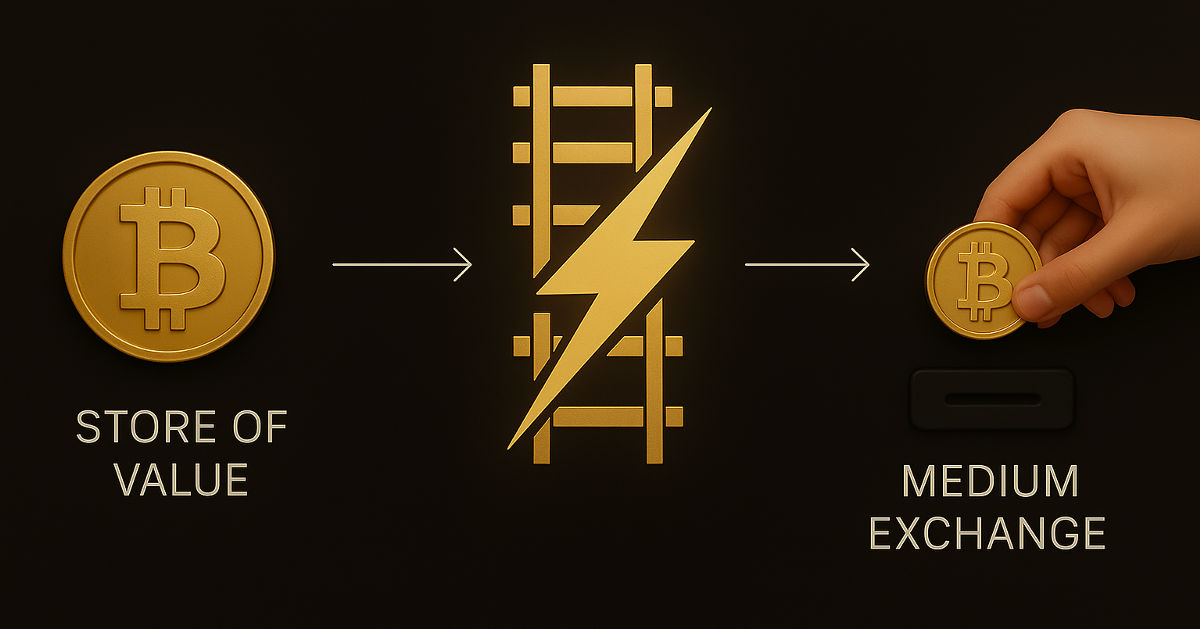
Amboss Launches Rails, a Self-Custodial Bitcoin Yield ServiceAmboss, a leader in AI-driven solutions for the Bitcoin Lightning Network, today announced Rails, a groundbreaking self-custodial Bitcoin yield service. According to a press release sent to Bitcoin Magazine, it’s designed to empower companies, custodians, and high net worth individuals. This allows participants to earn a yield on their Bitcoin.
Big news from @TheBitcoinConf !
We’re thrilled to announce Rails—a self-custodial Bitcoin yield service that empowers you to earn on your BTC while supercharging the Lightning Network.Let’s bring Bitcoin to the World.https://t.co/3WYYvB95hP
— AMBOSS
 (@ambosstech) May 29, 2025
(@ambosstech) May 29, 2025Rails also launched a secure way for Liquidity Providers (LPs) to hold all custody of their Bitcoin while generating returns from liquidity leases and payment routing, although they are not guaranteed. The implementation of Amboss’ AI technology, Rails strengthened their Lighting Network with more dependable transactions and larger payment volumes.
“Rails is a transformative force for the Lightning Network,” said the CEO and Co-Founder of Amboss Jesse Shrader. “It’s not just about yield—it’s about enabling businesses to strengthen the network while earning on their Bitcoin. This is a critical step in Bitcoin’s evolution as a global medium of exchange.”
The service offers two options:
- Rails LP is designed for high net worth individuals, custodians, and companies with Bitcoin treasuries, requiring a minimum commitment of 1 BTC for one year.
- Liquidity subscriptions are designed for businesses that receive Bitcoin payments, with fees starting at 0.5%.
Amboss partnered with CoinCorner and Flux (a joint venture between Axiom and CoinCorner), to bring Rails to the market. CoinCorner has incorporated it into both its exchange platform and daily payment services in the Isle of Man. Flux is jointly focused on advancing the Lightning Network’s presence in global payments. Their participation highlights growing industry trust in Rails as a tool to scale Bitcoin effectively.
“Rails offers a practical way for businesses like ours to participate in the Lightning Network’s growth,” said the CFO of CoinCorner David Boylan. “We’ve been using the Lightning Network for years, and Rails provides a structured approach to engaging with its economy, particularly through liquidity leasing and payment routing. This aligns with our goal of making Bitcoin more accessible and practical for everyday use.”
This post Amboss Launches Rails, a Self-Custodial Bitcoin Yield Service first appeared on Bitcoin Magazine and is written by Oscar Zarraga Perez.
-
 @ 7f6db517:a4931eda
2025-06-02 17:02:20
@ 7f6db517:a4931eda
2025-06-02 17:02:20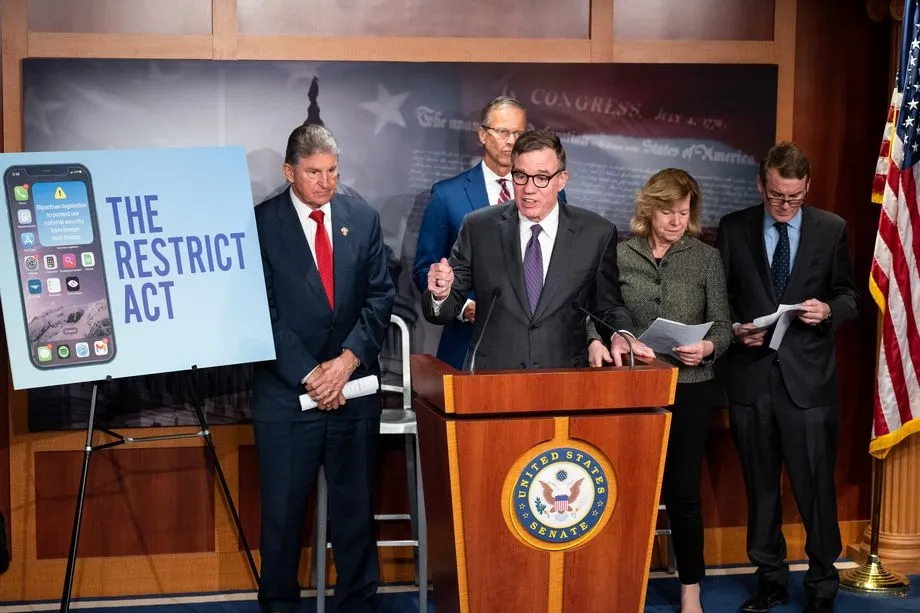
The newly proposed RESTRICT ACT - is being advertised as a TikTok Ban, but is much broader than that, carries a $1M Fine and up to 20 years in prison️! It is unconstitutional and would create massive legal restrictions on the open source movement and free speech throughout the internet.
The Bill was proposed by: Senator Warner, Senator Thune, Senator Baldwin, Senator Fischer, Senator Manchin, Senator Moran, Senator Bennet, Senator Sullivan, Senator Gillibrand, Senator Collins, Senator Heinrich, and Senator Romney. It has broad support across Senators of both parties.
Corrupt politicians will not protect us. They are part of the problem. We must build, support, and learn how to use censorship resistant tools in order to defend our natural rights.
The RESTRICT Act, introduced by Senators Warner and Thune, aims to block or disrupt transactions and financial holdings involving foreign adversaries that pose risks to national security. Although the primary targets of this legislation are companies like Tik-Tok, the language of the bill could potentially be used to block or disrupt cryptocurrency transactions and, in extreme cases, block Americans’ access to open source tools or protocols like Bitcoin.
The Act creates a redundant regime paralleling OFAC without clear justification, it significantly limits the ability for injured parties to challenge actions raising due process concerns, and unlike OFAC it lacks any carve-out for protected speech. COINCENTER ON THE RESTRICT ACT
If you found this post helpful support my work with bitcoin.

-
 @ cae03c48:2a7d6671
2025-06-02 17:01:02
@ cae03c48:2a7d6671
2025-06-02 17:01:02Bitcoin Magazine

Strategy Buys $75 Million Worth of BitcoinStrategy has acquired an additional 705 Bitcoin for approximately $75 million, further expanding its position as the largest corporate holder of Bitcoin as more public companies continue to adopt Bitcoin treasury strategies.
According to a Form 8-K filed with the SEC on June 2, the company purchased the Bitcoin at an average price of $106,495 per coin between May 26 and June 1, bringing its total holdings to 580,955 BTC. The acquisition was funded through Strategy’s at-the-market (ATM) equity offerings of perpetual preferred shares.
BREAKING:
 STRATEGY BUYS ANOTHER 705 #BITCOIN FOR $75 MILLION pic.twitter.com/WBgKUcbbEP
STRATEGY BUYS ANOTHER 705 #BITCOIN FOR $75 MILLION pic.twitter.com/WBgKUcbbEP— Bitcoin Magazine (@BitcoinMagazine) June 2, 2025
The company raised $74.6 million by selling a combination of its preferred stock classes, including 353,511 shares of STRK preferred stock for $36.2 million and 374,968 shares of STRF preferred stock for $38.4 million. With this purchase, Strategy’s average acquisition price across all its Bitcoin holdings stands at $70,023 per coin.
The continued expansion of corporate Bitcoin treasuries reflects growing institutional confidence in Bitcoin. We’re seeing unprecedented adoption in 2025, with over 60 public companies now holding Bitcoin on their balance sheets.
At current market prices of approximately $104,165, Strategy’s Bitcoin holdings are valued at more than $60 billion, reinforcing its dominant position in corporate Bitcoin holdings. The company has consistently accumulated Bitcoin through various market conditions since adopting its treasury strategy in 2020.
The purchase comes amid a broader trend of corporate Bitcoin adoption, with recent entrants including GameStop’s $513 million acquisition of 4,710 BTC and Semler Scientific’s $50 million purchase of 455 BTC. Total corporate Bitcoin holdings have surpassed $100 billion in 2025, marking a significant shift in traditional treasury management practices.
At press time, Bitcoin trades at $104,165, down 0.07% over the past 24 hours, as the market processes this latest institutional development and its implications for broader corporate adoption of Bitcoin as a treasury asset.
This post Strategy Buys $75 Million Worth of Bitcoin first appeared on Bitcoin Magazine and is written by Vivek Sen.
-
 @ 7f6db517:a4931eda
2025-06-02 17:02:20
@ 7f6db517:a4931eda
2025-06-02 17:02:20

"Privacy is necessary for an open society in the electronic age. Privacy is not secrecy. A private matter is something one doesn't want the whole world to know, but a secret matter is something one doesn't want anybody to know. Privacy is the power to selectively reveal oneself to the world." - Eric Hughes, A Cypherpunk's Manifesto, 1993
Privacy is essential to freedom. Without privacy, individuals are unable to make choices free from surveillance and control. Lack of privacy leads to loss of autonomy. When individuals are constantly monitored it limits our ability to express ourselves and take risks. Any decisions we make can result in negative repercussions from those who surveil us. Without the freedom to make choices, individuals cannot truly be free.
Freedom is essential to acquiring and preserving wealth. When individuals are not free to make choices, restrictions and limitations prevent us from economic opportunities. If we are somehow able to acquire wealth in such an environment, lack of freedom can result in direct asset seizure by governments or other malicious entities. At scale, when freedom is compromised, it leads to widespread economic stagnation and poverty. Protecting freedom is essential to economic prosperity.
The connection between privacy, freedom, and wealth is critical. Without privacy, individuals lose the freedom to make choices free from surveillance and control. While lack of freedom prevents individuals from pursuing economic opportunities and makes wealth preservation nearly impossible. No Privacy? No Freedom. No Freedom? No Wealth.
Rights are not granted. They are taken and defended. Rights are often misunderstood as permission to do something by those holding power. However, if someone can give you something, they can inherently take it from you at will. People throughout history have necessarily fought for basic rights, including privacy and freedom. These rights were not given by those in power, but rather demanded and won through struggle. Even after these rights are won, they must be continually defended to ensure that they are not taken away. Rights are not granted - they are earned through struggle and defended through sacrifice.
If you found this post helpful support my work with bitcoin.

-
 @ e516ecb8:1be0b167
2025-06-02 15:22:40
@ e516ecb8:1be0b167
2025-06-02 15:22:40Bitcoin was born as a middle finger to the financial establishment. Its 2008 whitepaper, penned by the enigmatic Satoshi Nakamoto, promised a peer-to-peer (P2P) electronic cash system—a decentralized rebellion against state-controlled money, sparked in the ashes of the global financial crisis. It was a cypherpunk dream: a currency free from banks, governments, and middlemen. But somewhere along the way, Bitcoin lost its soul. What was meant to be a fluid, practical currency has morphed into a clunky, expensive digital vault—a gilded cage for your wealth. Let’s unpack why Bitcoin is broken, why its fixes are flimsy, and why its rebellious spirit is fading into a state-backed shadow of its former self.
The P2P Promise: Shattered by Sky-High Fees Bitcoin’s core idea was simple: send money directly to anyone, anywhere, without a bank skimming off the top. Fast forward to today, and that vision is in tatters. Imagine you’ve got $34 in Bitcoin to send to a friend. By the time it arrives, after transaction fees, they might get a measly $2. According to data from BitInfoCharts, the average Bitcoin transaction fee in early 2025 hovers around $20–$30, with spikes as high as $60 during network congestion. For context, that’s more than the cost of a Venmo transfer or even some international wire fees.
This isn’t a one-off issue. Wallets like Guarda, Exodus, or even hardware wallets like Ledger face the same problem: Bitcoin’s base layer (Layer 1) is so congested that fees make small transactions absurdly impractical. Want to buy a $5 coffee with Bitcoin? You’d lose more in fees than the coffee’s worth. This isn’t P2P money—it’s confiscatory, inefficient, and anything but user-friendly.
Lightning Network: A Band-Aid on a Broken System Cue the Bitcoin maximalists: “But we have the Lightning Network!” Sure, Lightning was introduced as a second-layer solution to scale Bitcoin for smaller, faster transactions. It’s a network of off-chain payment channels designed to handle microtransactions with lower fees. Sounds great, right? Except it’s a patchwork fix that betrays Bitcoin’s original vision.
First, Lightning wasn’t part of Satoshi’s plan—it’s an afterthought, a kludge to address the base layer’s limitations. Second, it’s not universally adopted. According to 1ML, as of early 2025, only about 15% of Bitcoin wallets natively support Lightning. Major wallets like Coinbase Wallet and Trust Wallet still require workarounds or third-party integrations. Why? Because implementing Lightning is complex, and for most users, it involves trusting third-party nodes or custodians to route payments. So much for “be your own bank.”
Worse, running your own Lightning node requires technical know-how—think Linux commands, channel management, and constant monitoring. A 2024 survey by Bitcoin Magazine found that only 8% of Bitcoin users run their own nodes, Lightning or otherwise. For the average person, Lightning isn’t a solution; it’s a hurdle. And if you’re relying on a third party, you’re back to square one: trusting someone else with your money.
Take Adrián Bernabeu, author of Bitcoinismo, who preaches the gospel of self-custody while simultaneously hyping Lightning for micropayments. It’s a contradiction. You can’t champion “not your keys, not your crypto” while pushing a system that often requires third-party intermediaries for practical use. It’s like telling someone to live off-grid but handing them a generator that only works with a utility company’s permission.
A Gilded Cage: Bitcoin as a Store of Value So, if Bitcoin isn’t practical for payments, what’s it good for? The narrative has shifted: Bitcoin is now a “store of value,” a digital gold. Its price has soared—hitting $80,000 in late 2024, per CoinGecko—and its fixed supply of 21 million coins makes it a hedge against inflation. But this shift isn’t just about market dynamics; it’s a consequence of Bitcoin’s own flaws.
Moving Bitcoin is so expensive that it’s often smarter to hodl than to spend. Your wallet becomes an orange-tinted cage, trapping your wealth in a system where transferring value eats away at your holdings. Sure, you could wait for fees to drop, but that’s another nail in the P2P coffin. Real money doesn’t make you wait for a discount to use it. Imagine telling someone, “Hold off on buying groceries until the dollar’s transaction fees go down.” It’s absurd.
OP_RETURN and the Spam Problem: A Network Clogged with Junk Bitcoin’s blockchain isn’t just struggling with fees; it’s also drowning in digital clutter. The OP_RETURN function, meant for embedding small amounts of data (like metadata for smart contracts), has become a dumping ground for everything from NFT inscriptions to random spam. In 2023, Glassnode reported that OP_RETURN transactions accounted for nearly 20% of Bitcoin’s block space during peak periods, crowding out legitimate transactions and driving up fees.
Proposed fixes from Bitcoin Core and Knots—like limiting OP_RETURN data size or tweaking mempool rules—are more Band-Aids. They don’t address the root issue: Bitcoin’s block size limit. Capped at 1MB (or roughly 4MB with SegWit), Bitcoin can only process about 3–7 transactions per second, compared to Visa’s 24,000. Increasing the block size could ease congestion and lower fees, but Bitcoin Core developers have resisted this for years, citing concerns about centralization.
Here’s the kicker: Bitcoin Cash (BCH), a 2017 fork of Bitcoin, raised its block size to 32MB and processes transactions at a fraction of the cost. BCH’s average fee in 2025 is under $0.01, per BitInfoCharts. Bitcoin maximalists dismiss BCH as a failed experiment, but it’s hard to argue with the numbers. A larger block size reduces spam’s impact because legitimate transactions dominate. Admitting this, though, would mean conceding defeat in a years-long ideological battle. And Bitcoiners hate losing.
From Rebellion to Regulatory Lapdog Bitcoin’s cypherpunk roots are fading fast. What started as a revolt against state control is cozying up to governments. El Salvador made Bitcoin legal tender in 2021, but its state-backed Chivo wallet (built on Lightning) is riddled with bugs and usability issues, according to a 2024 Reuters report. Meanwhile, Bitcoin Core developers have lobbied for institutional adoption, with figures like Michael Saylor advocating for Bitcoin as a strategic reserve asset for governments and corporations.
This is a far cry from Satoshi’s vision. A 2023 post on X revealed that Core developers met with U.S. regulators to discuss Bitcoin’s role in national reserves—a move that reeks of compromise. The same system Bitcoin was meant to disrupt is now being courted. If governments start subsidizing Bitcoin mining to protect their reserves, as some speculate, the irony will be complete: a decentralized dream bankrolled by fiat.
The Looming Threats: Quantum and Mining Woes Bitcoin’s problems don’t end with fees and politics. Quantum computing looms on the horizon. A 2024 MIT Technology Review article estimated that quantum computers capable of breaking Bitcoin’s ECDSA cryptography could emerge by 2030. This threatens “Satoshi-era” wallets—those holding early, unspent coins—potentially undermining trust in the entire blockchain.
Then there’s mining. Bitcoin’s proof-of-work system is energy-intensive, with global mining consuming 150 TWh annually, per the Cambridge Bitcoin Electricity Consumption Index. As block rewards halve (the next halving is in 2028), miners will rely more on transaction fees. Higher fees mean even less practicality for P2P payments, locking Bitcoin further into its “digital gold” trap. If states step in to subsidize mining, as some X posts have speculated, Bitcoin’s anti-establishment ethos will be dead in the water.
The Final Irony: Paying for Freedom with Fiat Bitcoin promised to replace fiat currency, but its flaws are pushing it toward a bizarre dependency on the very system it sought to destroy. If governments subsidize mining or adopt Bitcoin as a reserve asset, we’ll be left with a bitter irony: a supposedly revolutionary asset propped up by fiat. The cypherpunk dream will have come full circle, not as a triumph, but as a compromise.
So, is Bitcoin broken? Yes. It’s a victim of its own success—too valuable to spend, too clunky to use, and too compromised to stay true to its roots. The question isn’t whether Bitcoin can be fixed; it’s whether its community has the courage to admit what’s wrong. Until then, your Bitcoin wallet remains a shiny, orange prison—a relic of a rebellion that forgot how to fight.
-
 @ cae03c48:2a7d6671
2025-06-02 17:01:00
@ cae03c48:2a7d6671
2025-06-02 17:01:00Bitcoin Magazine

Freedom, Decentralization and Unity: Stay True to These Principles and the Future Is Ours, Says Ross UlbrichtLast week, Ross William Ulbricht, at the 2025 Bitcoin Conference in Las Vegas, gave a speech about the principles of freedom, decentralization and unity.
Ross Ulbricht started by talking about his experience in prison and the price difference when he got into prison compared to now.
“When I launch Silk Road, buying a whole bitcoin will set you back less than a dollar,” said Ross. “Pocket change. Can you imagine that? Now they are worth over $100,000 each.”
“Bitcoin’s power comes from the fact that any one of us can mine if we choose to, and any one of us can generate addresses if we choose to,” stated Ross. “Any one of us can send bitcoin to anyone else. We are all on equal footing with Bitcoin. With Bitcoin, we are all free.”
Ross told everybody to stay united and that if we are together we will be able to accomplish anything.
“When I was put in prison for life. I was isolated and weak. I was stripped of everything. Had nothing to give everyone, but you didn’t abandon me. You didn’t forget me. Wrote me letters. You raised money for my defense. When I was silenced, you spoke up against the slender and smearers and in the end when I didn’t know if I would ever get out from behind those thick iron bars. We even got President Trump to see that Bitcoin is the future.”
Ross ended his speech by saying, “please never see each other as enemies. Those that oppose decentralization and freedom love it when we are divided. Stay united. As long as we can agree that we deserve freedom and that decentralization is how we secure it. Then we can be united. We can have each other’s backs. Just like you had mine.”
“Freedom, decentralization and unity,” said Ross. “Stay true to these principles and the future is ours.”
Ross Ulbricht’s Journey: From Life Sentence to Presidential Pardon
Ross Ulbricht became a controversial figure after launching Silk Road in 2011, an online marketplace that used Bitcoin for anonymous transactions. While the site was unfortunately used for selling illegal drugs, it also served as Bitcoin’s first real-world use case, showcasing the power of decentralized, censorship-resistant money.
In 2015, Ulbricht was sentenced to double life imprisonment without the possibility of parole. His punishment quickly became a symbol of government overreach for many in the tech and the Bitcoin world. Critics argued that his sentence far exceeded the limits of justice, especially considering the nonviolent nature of his crimes.
His pardon, announced shortly after Trump returned to office, is seen as a strong move to honor campaign promises and support Bitcoin’s values of personal freedom and resistance to government overreach. It sparked celebration throughout the Bitcoin community but also reminded advocates that the fight for justice is far from over.
Ten years ago to the day, I was sentenced to die in prison. Instead I gave my first public speech in freedom.
I wore a red tie as an homage to @realDonaldTrump, the man who saved my life. pic.twitter.com/WWp0vL3C9T
— Ross Ulbricht (@RealRossU) May 30, 2025
This post Freedom, Decentralization and Unity: Stay True to These Principles and the Future Is Ours, Says Ross Ulbricht first appeared on Bitcoin Magazine and is written by Oscar Zarraga Perez.
-
 @ dfa02707:41ca50e3
2025-06-02 17:02:17
@ dfa02707:41ca50e3
2025-06-02 17:02:17Contribute to keep No Bullshit Bitcoin news going.
- The latest firmware updates for COLDCARD devices introduce two major features: COLDCARD Co-sign (CCC) and Key Teleport between two COLDCARD Q devices using QR codes and/or NFC with a website.

What's new
- COLDCARD Co-Sign: When CCC is enabled, a second seed called the Spending Policy Key (Key C) is added to the device. This seed works with the device's Main Seed and one or more additional XPUBs (Backup Keys) to form 2-of-N multisig wallets.
- The spending policy functions like a hardware security module (HSM), enforcing rules such as magnitude and velocity limits, address whitelisting, and 2FA authentication to protect funds while maintaining flexibility and control, and is enforced each time the Spending Policy Key is used for signing.
- When spending conditions are met, the COLDCARD signs the partially signed bitcoin transaction (PSBT) with the Main Seed and Spending Policy Key for fund access. Once configured, the Spending Policy Key is required to view or change the policy, and violations are denied without explanation.
"You can override the spending policy at any time by signing with either a Backup Key and the Main Seed or two Backup Keys, depending on the number of keys (N) in the multisig."
-
A step-by-step guide for setting up CCC is available here.
-
Key Teleport for Q devices allows users to securely transfer sensitive data such as seed phrases (words, xprv), secure notes and passwords, and PSBTs for multisig. It uses QR codes or NFC, along with a helper website, to ensure reliable transmission, keeping your sensitive data protected throughout the process.
- For more technical details, see the protocol spec.
"After you sign a multisig PSBT, you have option to “Key Teleport” the PSBT file to any one of the other signers in the wallet. We already have a shared pubkey with them, so the process is simple and does not require any action on their part in advance. Plus, starting in this firmware release, COLDCARD can finalize multisig transactions, so the last signer can publish the signed transaction via PushTX (NFC tap) to get it on the blockchain directly."
- Multisig transactions are finalized when sufficiently signed. It streamlines the use of PushTX with multisig wallets.
- Signing artifacts re-export to various media. Users are now provided with the capability to export signing products, like transactions or PSBTs, to alternative media rather than the original source. For example, if a PSBT is received through a QR code, it can be signed and saved onto an SD card if needed.
- Multisig export files are signed now. Public keys are encoded as P2PKH address for all multisg signature exports. Learn more about it here.
- NFC export usability upgrade: NFC keeps exporting until CANCEL/X is pressed.
- Added Bitcoin Safe option to Export Wallet.
- 10% performance improvement in USB upload speed for large files.
- Q: Always choose the biggest possible display size for QR.
Fixes
- Do not allow change Main PIN to same value already used as Trick PIN, even if Trick PIN is hidden.
- Fix stuck progress bar under
Receiving...after a USB communications failure. - Showing derivation path in Address Explorer for root key (m) showed double slash (//).
- Can restore developer backup with custom password other than 12 words format.
- Virtual Disk auto mode ignores already signed PSBTs (with “-signed” in file name).
- Virtual Disk auto mode stuck on “Reading…” screen sometimes.
- Finalization of foreign inputs from partial signatures. Thanks Christian Uebber!
- Temporary seed from COLDCARD backup failed to load stored multisig wallets.
Destroy Seedalso removes all Trick PINs from SE2.Lock Down Seedrequires pressing confirm key (4) to execute.- Q only: Only BBQr is allowed to export Coldcard, Core, and pretty descriptor.
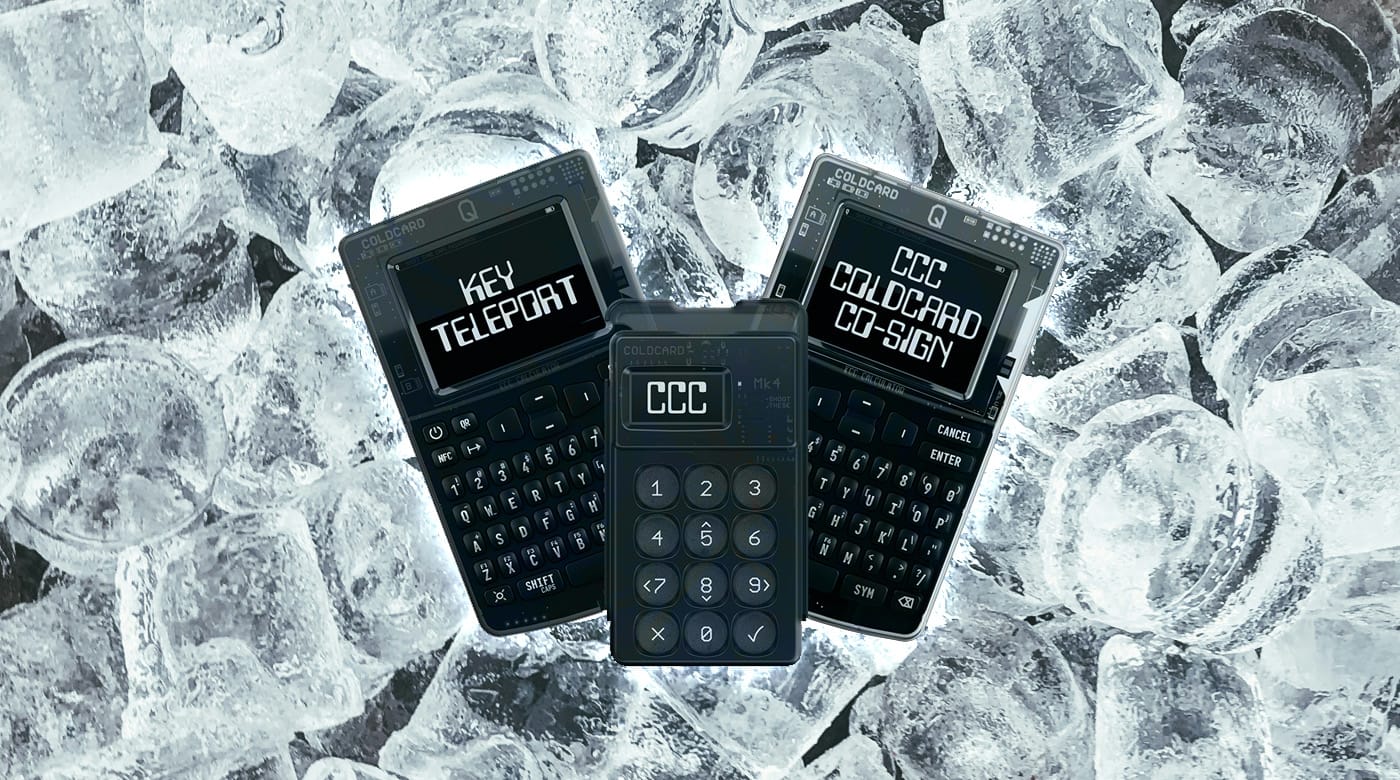
-
 @ 7f6db517:a4931eda
2025-06-02 17:02:20
@ 7f6db517:a4931eda
2025-06-02 17:02:20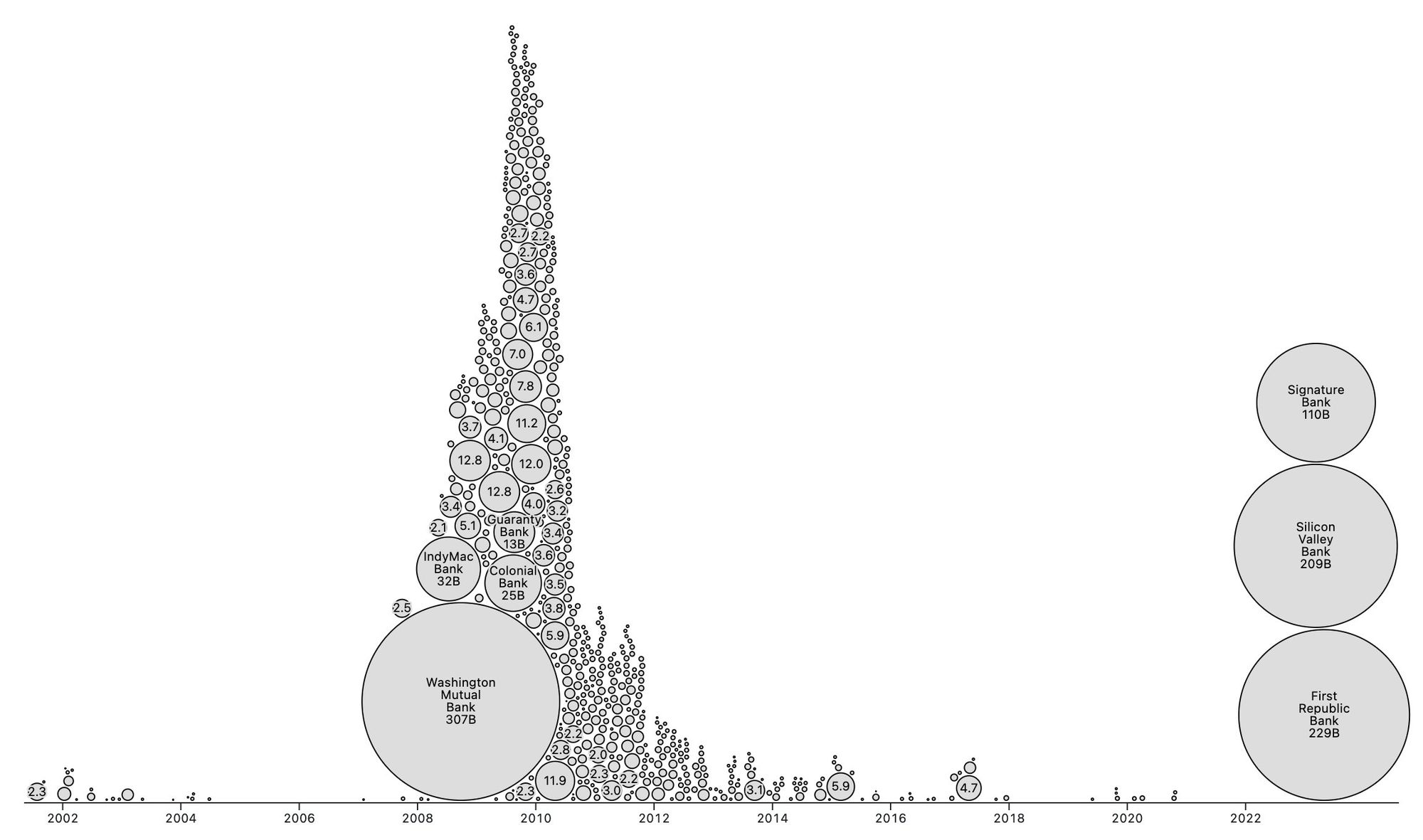
People forget Bear Stearns failed March 2008 - months of denial followed before the public realized how bad the situation was under the surface.
Similar happening now but much larger scale. They did not fix fundamental issues after 2008 - everything is more fragile.
The Fed preemptively bailed out every bank with their BTFP program and First Republic Bank still failed. The second largest bank failure in history.
There will be more failures. There will be more bailouts. Depositors will be "protected" by socializing losses across everyone.
Our President and mainstream financial pundits are currently pretending the banking crisis is over while most banks remain insolvent. There are going to be many more bank failures as this ponzi system unravels.
Unlike 2008, we have the ability to opt out of these broken and corrupt institutions by using bitcoin. Bitcoin held in self custody is unique in its lack of counterparty risk - you do not have to trust a bank or other centralized entity to hold it for you. Bitcoin is also incredibly difficult to change by design since it is not controlled by an individual, company, or government - the supply of dollars will inevitably be inflated to bailout these failing banks but bitcoin supply will remain unchanged. I do not need to convince you that bitcoin provides value - these next few years will convince millions.
If you found this post helpful support my work with bitcoin.

-
 @ b1ddb4d7:471244e7
2025-06-02 16:01:06
@ b1ddb4d7:471244e7
2025-06-02 16:01:06Bitcoin FilmFest (BFF25) returns to Warsaw for its third edition, blending independent cinema—from feature films and commercials to AI-driven experimental visuals—with education and entertainment.
Hundreds of attendees from around the world will gather for three days of screenings, discussions, workshops, and networking at the iconic Kinoteka Cinema (PKiN), the same venue that hosted the festival’s first two editions in March 2023 and April 2024.
This year’s festival, themed “Beyond the Frame,” introduces new dimensions to its program, including an extra day on May 22 to celebrate Bitcoin Pizza Day, the first real-world bitcoin transaction, with what promises to be one of Europe’s largest commemorations of this milestone.
BFF25 bridges independent film, culture, and technology, with a bold focus on decentralized storytelling and creative expression. As a community-driven cultural experience with a slightly rebellious spirit, Bitcoin FilmFest goes beyond movies, yet cinema remains at its heart.
Here’s a sneak peek at the lineup, specially curated for movie buffs:
 Generative Cinema – A special slot with exclusive shorts and a thematic debate on the intersection of AI and filmmaking. Featured titles include, for example: BREAK FREE, SATOSHI: THE CREATION OF BITCOIN, STRANGE CURRENCIES, and BITCOIN IS THE MYCELIUM OF MONEY, exploring financial independence, traps of the fiat system, and a better future built on sound money.
Generative Cinema – A special slot with exclusive shorts and a thematic debate on the intersection of AI and filmmaking. Featured titles include, for example: BREAK FREE, SATOSHI: THE CREATION OF BITCOIN, STRANGE CURRENCIES, and BITCOIN IS THE MYCELIUM OF MONEY, exploring financial independence, traps of the fiat system, and a better future built on sound money. Upcoming Productions Preview – A bit over an hour-long block of unreleased pilots and works-in-progress. Attendees will get exclusive first looks at projects like FINDING HOME (a travel-meets-personal-journey series), PARALLEL SPACES (a story about alternative communities), and THE LEGEND OF LANDI (a mysterious narrative).
Upcoming Productions Preview – A bit over an hour-long block of unreleased pilots and works-in-progress. Attendees will get exclusive first looks at projects like FINDING HOME (a travel-meets-personal-journey series), PARALLEL SPACES (a story about alternative communities), and THE LEGEND OF LANDI (a mysterious narrative). Freedom-Focused Ads & Campaigns – Unique screenings of video commercials, animations, and visual projects, culminating in “The PoWies” (Proof of Work-ies)—the first ever awards show honoring the best Bitcoin-only awareness campaigns.
Freedom-Focused Ads & Campaigns – Unique screenings of video commercials, animations, and visual projects, culminating in “The PoWies” (Proof of Work-ies)—the first ever awards show honoring the best Bitcoin-only awareness campaigns.To get an idea of what might come up at the event, here, you can preview 6 selected ads combined into two 2 videos:
 Open Pitch Competition – A chance for filmmakers to present fresh ideas and unfinished projects to an audience of a dedicated jury, movie fans and potential collaborators. This competitive block isn’t just entertaining—it’s a real opportunity for creators to secure funding and partnerships.
Open Pitch Competition – A chance for filmmakers to present fresh ideas and unfinished projects to an audience of a dedicated jury, movie fans and potential collaborators. This competitive block isn’t just entertaining—it’s a real opportunity for creators to secure funding and partnerships. Golden Rabbit Awards: A lively gala honoring films from the festival’s Official Selection, with awards in categories like Best Feature, Best Story, Best Short, and Audience Choice.
Golden Rabbit Awards: A lively gala honoring films from the festival’s Official Selection, with awards in categories like Best Feature, Best Story, Best Short, and Audience Choice.BFF25 Main Screenings
Sample titles from BFF25’s Official Selection:
 REVOLUCIÓN BITCOIN – A documentary by Juan Pablo, making its first screening outside the Spanish-speaking world in Warsaw this May. Three years of important work, 80 powerful minutes to experience. The film explores Bitcoin’s impact across Argentina, Colombia, Mexico, El Salvador, and Spain through around 40 diverse perspectives. Screening in Spanish with English subtitles, followed by a Q&A with the director.
REVOLUCIÓN BITCOIN – A documentary by Juan Pablo, making its first screening outside the Spanish-speaking world in Warsaw this May. Three years of important work, 80 powerful minutes to experience. The film explores Bitcoin’s impact across Argentina, Colombia, Mexico, El Salvador, and Spain through around 40 diverse perspectives. Screening in Spanish with English subtitles, followed by a Q&A with the director. UNBANKABLE – Luke Willms’ directorial debut, drawing from his multicultural roots and his father’s pioneering HIV/AIDS research. An investigative documentary based on Luke’s journeys through seven African countries, diving into financial experiments and innovations—from mobile money and digital lending to Bitcoin—raising smart questions and offering potential lessons for the West. Its May appearance at BFF25 marks its largest European event to date, following festival screenings and nominations across multiple continents over the past year.
UNBANKABLE – Luke Willms’ directorial debut, drawing from his multicultural roots and his father’s pioneering HIV/AIDS research. An investigative documentary based on Luke’s journeys through seven African countries, diving into financial experiments and innovations—from mobile money and digital lending to Bitcoin—raising smart questions and offering potential lessons for the West. Its May appearance at BFF25 marks its largest European event to date, following festival screenings and nominations across multiple continents over the past year. HOTEL BITCOIN – A Spanish comedy directed by Manuel Sanabria and Carlos “Pocho” Villaverde. Four friends, 4,000 bitcoins , and one laptop spark a chaotic adventure of parties, love, crime, and a dash of madness. Exploring sound money, value, and relationships through a twisting plot. The film premiered at the Tarazona and Moncayo Comedy Film Festival in August 2024. Its Warsaw screening at BFF25 (in Spanish with English subtitles) marks its first public showing outside the Spanish-speaking world.
HOTEL BITCOIN – A Spanish comedy directed by Manuel Sanabria and Carlos “Pocho” Villaverde. Four friends, 4,000 bitcoins , and one laptop spark a chaotic adventure of parties, love, crime, and a dash of madness. Exploring sound money, value, and relationships through a twisting plot. The film premiered at the Tarazona and Moncayo Comedy Film Festival in August 2024. Its Warsaw screening at BFF25 (in Spanish with English subtitles) marks its first public showing outside the Spanish-speaking world.Check out trailers for this year’s BFF25 and past editions on YouTube.
Tickets & Info:
- Detailed program and tickets are available at bitcoinfilmfest.com/bff25.
- Stay updated via the festival’s official channels (links provided on the website).
- Use ‘LN-NEWS’ to get 10% of tickets
-
 @ cae03c48:2a7d6671
2025-06-02 17:00:57
@ cae03c48:2a7d6671
2025-06-02 17:00:57Bitcoin Magazine
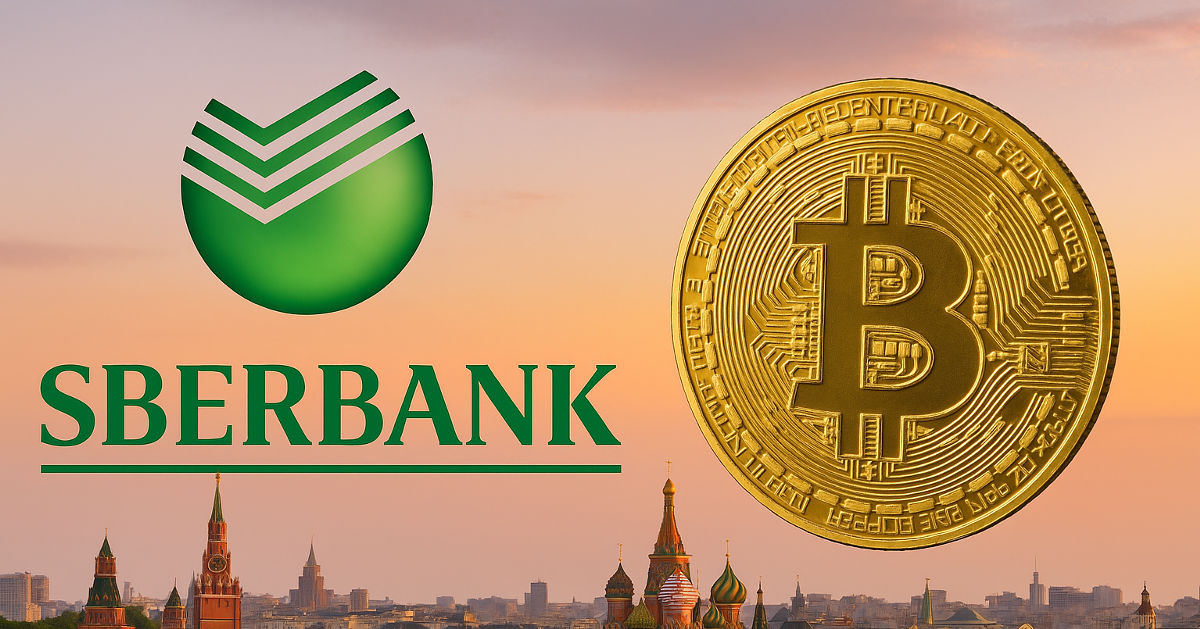
Sberbank, Russia’s Biggest Bank, Launches Structured Bond Tied to BitcoinSberbank, the largest bank in Russia, has launched a new structured bond that ties investor returns to the performance of Bitcoin and the U.S. dollar-to-ruble exchange rate. This new financial product represents one of the first moves by a major Russian institution to offer Bitcoin-linked investments under recently updated national regulations.
BREAKING:
 Russia's largest bank Sberbank launches structured bonds linked to Bitcoin. pic.twitter.com/LtD26jPS0x
Russia's largest bank Sberbank launches structured bonds linked to Bitcoin. pic.twitter.com/LtD26jPS0x— Bitcoin Magazine (@BitcoinMagazine) June 2, 2025
The structured bond is initially available over the counter to a limited group of qualified investors. According to the announcement, it allows investors to earn based on two factors: the price performance of BTC in U.S. dollars and any strengthening of the dollar compared to the Russian ruble.
Unlike typical Bitcoin investments, this product does not require the use of a Bitcoin wallet or foreign platforms. “All transactions [are] processed in rubles within Russia’s legal and infrastructure systems,” Sberbank stated, highlighting compliance with domestic financial protocols.
In addition to the bond, Sberbank has announced plans to launch similar structured investment products with Bitcoin exposure on the Moscow Exchange. The bank also revealed it will introduce a Bitcoin futures product via its SberInvestments platform on June 4, aligning with the product’s debut on the Moscow Exchange.
These developments follow a recent policy change by the Bank of Russia, which now permits financial institutions to offer Bitcoin-linked instruments to qualified investors. This shift opens the door for Bitcoin within the country’s traditional financial markets.
While Russia has previously taken a cautious approach to digital assets, Sberbank’s launch of a Bitcoin-linked bond and upcoming futures product marks a new phase of adoption—one that blends Bitcoin exposure with existing financial infrastructure.
The bank’s structured bond may signal a growing interest in regulated access to Bitcoin, especially within large financial institutions.
This post Sberbank, Russia’s Biggest Bank, Launches Structured Bond Tied to Bitcoin first appeared on Bitcoin Magazine and is written by Jenna Montgomery.
-
 @ cae03c48:2a7d6671
2025-06-02 17:00:48
@ cae03c48:2a7d6671
2025-06-02 17:00:48Bitcoin Magazine
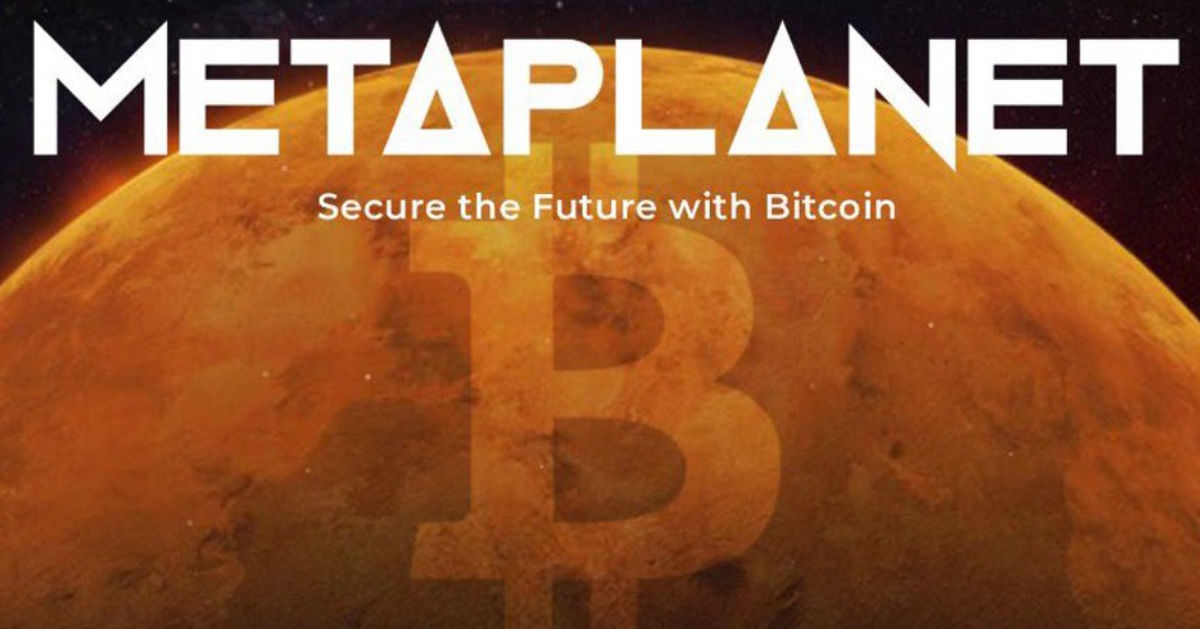
Metaplanet Acquires 1,088 More Bitcoin, Bringing Total Holdings to 8,888 BTCMetaplanet, Japan’s leading Bitcoin treasury firm, has purchased an additional 1,088 Bitcoin for approximately ¥16.89 billion at an average price of ¥15,519,019 per BTC. This acquisition raises the company’s total Bitcoin holdings to 8,888 BTC, with a cumulative purchase cost of ¥122.27 billion at an average price of ¥13,756,658 per BTC.
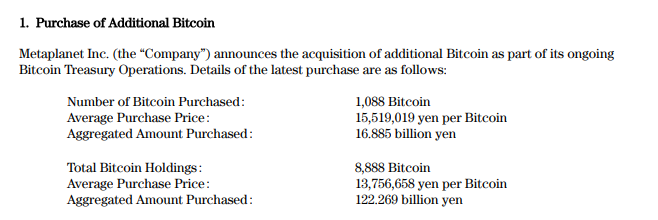
The company continues to report gains under its BTC Yield metric, a proprietary KPI that measures Bitcoin accumulation per share. Quarter-to-date (QTD), as of June 2, 2025, Metaplanet’s BTC Yield stands at 66.3%, following previous QTD yields of 95.6%, 309.8%, and 41.7% over the last three quarters. Total BTC Gain for Q2 2025 is 2,684 BTC, translating to a ¥40.54 billion gain based on a reference Bitcoin price of ¥15.10 million.
*Metaplanet Acquires Additional 1,088 $BTC, Total Holdings Reach 8,888 BTC* pic.twitter.com/X2clAIKNbR
— Metaplanet Inc. (@Metaplanet_JP) June 2, 2025
Metaplanet’s capital markets activity has been tightly aligned with its Bitcoin accumulation strategy. Since January 28, 2025, the company executed a series of zero-coupon, non-interest-bearing bond issuances and 0% discount stock acquisition rights to EVO FUND, raising over ¥35 billion and USD 121 million. These funds were used for Bitcoin purchases and bond redemptions.
— Dylan LeClair (@DylanLeClair_) June 2, 2025
In Q1 FY2025, Metaplanet reported its strongest financial results yet. Revenue increased 8% quarter-over-quarter to ¥877 million, while operating profit rose 11% to ¥593 million. Net income surged to ¥5.0 billion, complemented by unrealized gains of ¥13.5 billion from its Bitcoin holdings, further strengthening the company’s balance sheet.
Although Bitcoin prices dipped briefly at the end of March, causing a ¥7.4 billion valuation loss, Metaplanet swiftly recovered as BTC surged to new record levels. This strong connection with Bitcoin’s performance has led many investors to use Metaplanet as an investment vehicle to get Bitcoin exposure on the Tokyo Stock Exchange.
At the same time, Strategy acquired another 705 Bitcoin for about $75 million, further expanding its position as the largest corporate holder of Bitcoin as more public companies continue to adopt Bitcoin treasury strategies.
BREAKING:
 STRATEGY BUYS ANOTHER 705 #BITCOIN FOR $75 MILLION pic.twitter.com/WBgKUcbbEP
STRATEGY BUYS ANOTHER 705 #BITCOIN FOR $75 MILLION pic.twitter.com/WBgKUcbbEP— Bitcoin Magazine (@BitcoinMagazine) June 2, 2025
According to their SEC filing on June 2, they bought Bitcoin at an average price of $106,495 each between May 26 and June 1, bringing their total holdings to 580,955 BTC. The acquisition was funded by selling some of their preferred shares through an at-the-market (ATM) equity offering.
This post Metaplanet Acquires 1,088 More Bitcoin, Bringing Total Holdings to 8,888 BTC first appeared on Bitcoin Magazine and is written by Oscar Zarraga Perez.
-
 @ dfa02707:41ca50e3
2025-06-02 17:02:17
@ dfa02707:41ca50e3
2025-06-02 17:02:17Contribute to keep No Bullshit Bitcoin news going.
- Coinswap is a decentralized protocol for private, trustless cryptocurrency swaps. It allows participants to securely swap digital assets without intermediaries, using advanced cryptographic techniques and atomic swaps to ensure privacy and security.
- This release introduces major improvements to the protocol's efficiency, security, and usability, including custom in-memory UTXO indexes, more advanced coin-selection algorithms, fidelity bond management and more.
- The update also improves user experience with full Mac support, faster Tor connections, enhanced UI/UX, a unified API, and improved protocol documentation.
"The Project is under active beta development and open for contributions and beta testing. The Coinswap market place is live in testnet4. Bug fixes and feature requests are very much welcome."
- Manuals and demo docs are available here.
What's new
- Core protocol and performance improvements:
- Custom in-memory UTXO indexes. Frequent Core RPC calls, which caused significant delays, have been eliminated by implementing custom in-memory UTXO indexes. These indexes are also saved to disk, leading to faster wallet synchronization.
- Coin selection. Advanced coin-selection algorithms, like those in Bitcoin Core, have been incorporated, enhancing the efficiency of creating different types of transactions.
- Fidelity management. Maker servers now automate tasks such as checking bond expiries, redemption, and recreation for Fidelity Bonds, reducing the user's management responsibilities.
- Taker liveness. The
WaitingFundingConfirmationmessage has been added to keep swap connections between Takers and Makers, assisting with variable block confirmation delays.
-
User experience and compatibility:
- Mac compatibility. The crate and apps now fully support Mac.
- Tor operations are streamlined for faster, more resilient connections. Tor addresses are now consistently linked to the wallet seed, maintaining the same onion address through system reboots.
- The UI/UX improvements enhance the display of balances, UTXOs, offer data, fidelity bonds, and system logs. These updates make the apps more enjoyable and provide clearer coin swap logs during the swap process.
-
API design improvements. Transaction creation routines have been streamlined to use a single common API, which reduces technical debt and eliminates redundant code.
- Protocol spec documentation now details how Coinswap breaks the transaction graph and improves privacy through routed swaps and amount splitting, and includes diagrams for clarity.

Source: Coinswap Protocol specification.
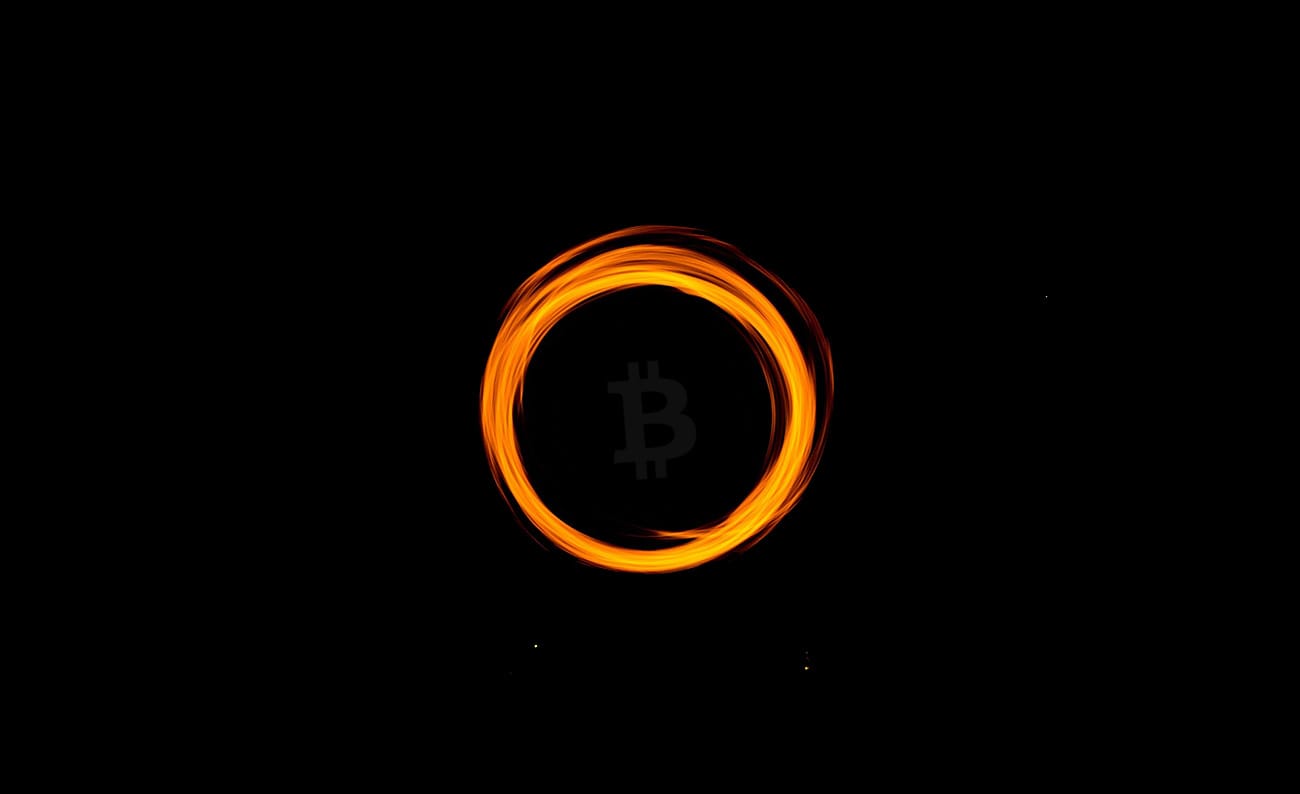
-
 @ 10f7c7f7:f5683da9
2025-06-02 15:10:30
@ 10f7c7f7:f5683da9
2025-06-02 15:10:30Unfortunately, I’m yet to be approached by either friends or family to enquire about bitcoin, I have very few friends, and my family are generally comfortable in their fiat lives. However, I often feel the need to prepare myself if the situation arises where I’m asked and I don’t do my usual, “ah, it’s just a hat” response and say nothing about bitcoin. As a result, I’m thinking through scenarios when I get asked, maybe even asked for advice and work out how to respond to people I care about, or even people I’m less bothered about, but I really don’t want to be the asshole who says; “have fun staying poor”. As Tuur Demeester mentioned, we need to prepare ourselves mentally for when price goes crazy, so we don’t immediate start acting up with ridiculous Lambo shaped purchases but also not realise the cash to do something that will benefit you and your loved ones. We also need to prepare ourselves for the phonecalls we may receive “wen moon”. I’m not going to suggest that anyone should or should not do anything, but I’m going to try and work some things out, so that when I’m asked, I can respond in a way that is balanced, constructive and will help the person I’m speaking to make progress in their journey.
Firstly, if they say that I’m just luck to have found bitcoin before them, there are many useful quotes that can be used as a response to this, but one of my favourites has to be from Thomas Jefferson:
“I find that the harder I work, the more luck I seem to have”
Short, simple and to the point, while also bringing the idea back from success being related to some magical concept that some people have and some people don’t, that removes the individual’s agency to positively impact their lot in life.
After this, the next suggestion may be related to luck, but at least this can be measured; how early did you first hear about bitcoin? Obviously, there could be some factors that may be outside of one’s immediate control, such as whether your name was on the cypherpunk mailing list in late 2009. Saying this, very few individuals chose to act on the contribution of one of the unknown contributors (Satoshi Nakamoto) who suddenly appeared on the mailing list, so started directing resources towards the network at the start. Even those that did and accumulated large stockpiles in the early days may have not initially known what they had or may have simply lost what they accumulated (poor old James Howells is still trying to dig up a Welsh refuse site). There are also those infamous episodes where individuals were given bitcoin early on and didn’t understand what they had or were simply careless with the necessary information (Alex Jones once received 10k bitcoin from Max Keiser). Even more recently, Dave Portnoy purchased a significant amount of bitcoin, was walked through the whole process by Marty Bent, but later lost his keys, suggesting it is not sufficient to simply be earlier to bitcoin to benefit from it, but something else.
If the person you speak to mentions they are late, there are many opportunities to illustrate how being early may not have given a better outcome and even resulted in a negative outcome, “I lost so many bitcoins, I’m not touching that crap again”. After knowing that you once owned X number of bitcoin, to have then had to start again from zero would be a very difficult barrier to get over. James Howells may have been in a much better situation if he had never mined those early bitcoin, and arrive at the topic years later and began buying like most others, or started buying as soon as he realised what bitcoin was. To provide the counter argument, there is also a story of someone having their bitcoin seedphrase stolen from cloud storage (big respect to RMessitt), but rather than sitting back and complaining, instead began to accumulate once more, only this time with better security hygiene. While they may not have been able to reaccumulate what they had before, they are in a better position than if they had simply given up, attributing it to bad luck, rather than working hard. These examples suggest that it may not only be about being early, but also about something else that has allowed certain early adopters (such as Max Keiser), to both keep and continue accumulating bitcoin since.
This leads to a final type of early adopter, who may not have lost access to their bitcoin, but may be useful to helping explain to your friend or family, why luck nor timing are what they think they’re cracked up to be. If you had a family member or friend that you trusted, and they said they had bought some bitcoin and if you wanted, they would buy some for you, would this be a good, bad or indifferent thing to happen? If you didn’t get worried the first-time price dropped and sold, it might have worked out quite well for you financially if you held it for 4 or more years. However, unless you took this intervening time to investigate what you had bought (you’re likely a busy person if you’d been able to accumulate sufficient cash to throw a bit into bitcoin to make it worth your while), you may not know what you owned. As a result, rather than not selling when the price dipped (fingers crossed your friend would never have actually let you press the sell button), if the price rose considerably, you might sell some, and thought yourself very wise having maybe bought pre-2020, and then having made a humble 20x in late 2024.
From a dollar, pound, euro, yen perspective, this is very much a success, a good trade and positive profit, but from a bitcoin perspective, this is selling the best and buy a worse asset, this is ending up with fewer sats, but most importantly, this is not understanding why bitcoin. During the time you held (ignored or forgotten about), you would have missed the opportunity to explore what you had bought all those years before and why it might be of interest. If you had, you may have thought about exploring how to purchase some more, how to self-custody your bitcoin and any other bitcoin related skill you could develop, getting you to a point where when price rose, the idea of “cashing out” was not your immediate thought. In this final example, if you had chosen to sell all your bitcoin when the price rose, while you may have “made out like a bandit”, but you would also return yourself to your prior no-coiner state, ultimately only temporarily better off, until that fiat tended to zero. The questions can then be raised, what was missing from this lucky, early individual’s journey?
This will hopefully give your inquisitive yet naïve no-coiner friend a chance to take a step back, reflect on their earlier comments, and feel the warmth in their cheeks as they realise they are blushing slightly that they called you lucky (well, here’s hoping). If nothing else, these examples will help illustrate that neither luck nor timing is all it takes to benefit from bitcoin. The final example then illustrates that it isn’t only about owning bitcoin from when it is cheaper (in their mind, bitcoin is always undervalued) until the price reaches a higher level, there is something else that is important. For me, this something is being inquisitive to learn about what you own, to develop understanding and build sufficient conviction to be able to response calmly when someone you care about refers to bitcoin as a scam, a ponzi scheme or the currency of choice of child traffickers (that would be the US dollar). Conviction is also important for those moments when the fiat price may have fallen, as it did throughout 2022, so that rather than sell, you’ve continued to purchase more, in an attempt to offset the purchases you may be regretting that you made at the prior peak. If you have the conviction, you can also be comfortable that you will neither time the bottom, nor deploy all the dry powder at this time, but you’re still comfortable that you’re moving the product of your time and effort into an asset that you control, that over time will store value better than fiat currency. From listening to very close to 40 hours of podcasts a week (shout out to bitcoin Bugle) for the past 5 years (yep, that’s over 10k hours), much to the family’s annoyance, irrespective of the dollar value, it is better to hold bitcoin than anything else.
As a result, it is absolutely, definitely not about being lucky, don’t attribute to luck what I worked damn hard to accumulate! It is also not about being early. While the example above may have a much lower entry price than I ever had and my first purchase in April 2020 was only for £50, neither is important to where I am now. My average cost basis is now multiple times higher than this first purchase, but that is not the point, and this is what I’ll tell my friend or family if they ever ask the question. Yes, buy a little now, I’ll help you and hopefully you won’t lose it, but more importantly, try and answer the question of why someone would listen to 10k hours of podcasts about bitcoin? While trying to get an answer to this question, they may begin to realise for themselves that it is worthwhile working harder to learn about this asset and starting the save the value of your time and effort in it. If they are willing the build their own conviction about bitcoin, they will be able to realise that starting today is the earliest they’ll ever be able to start and if they do, maybe someone in the future will tell them they are early or lucky, and this whole process can begin again. The circle of being the “lucky” bitcoiner.
“There is no early or late, lucky or unlucky, there is only knowledge and those too proud to learn”
-
 @ 7f6db517:a4931eda
2025-06-02 17:02:19
@ 7f6db517:a4931eda
2025-06-02 17:02:19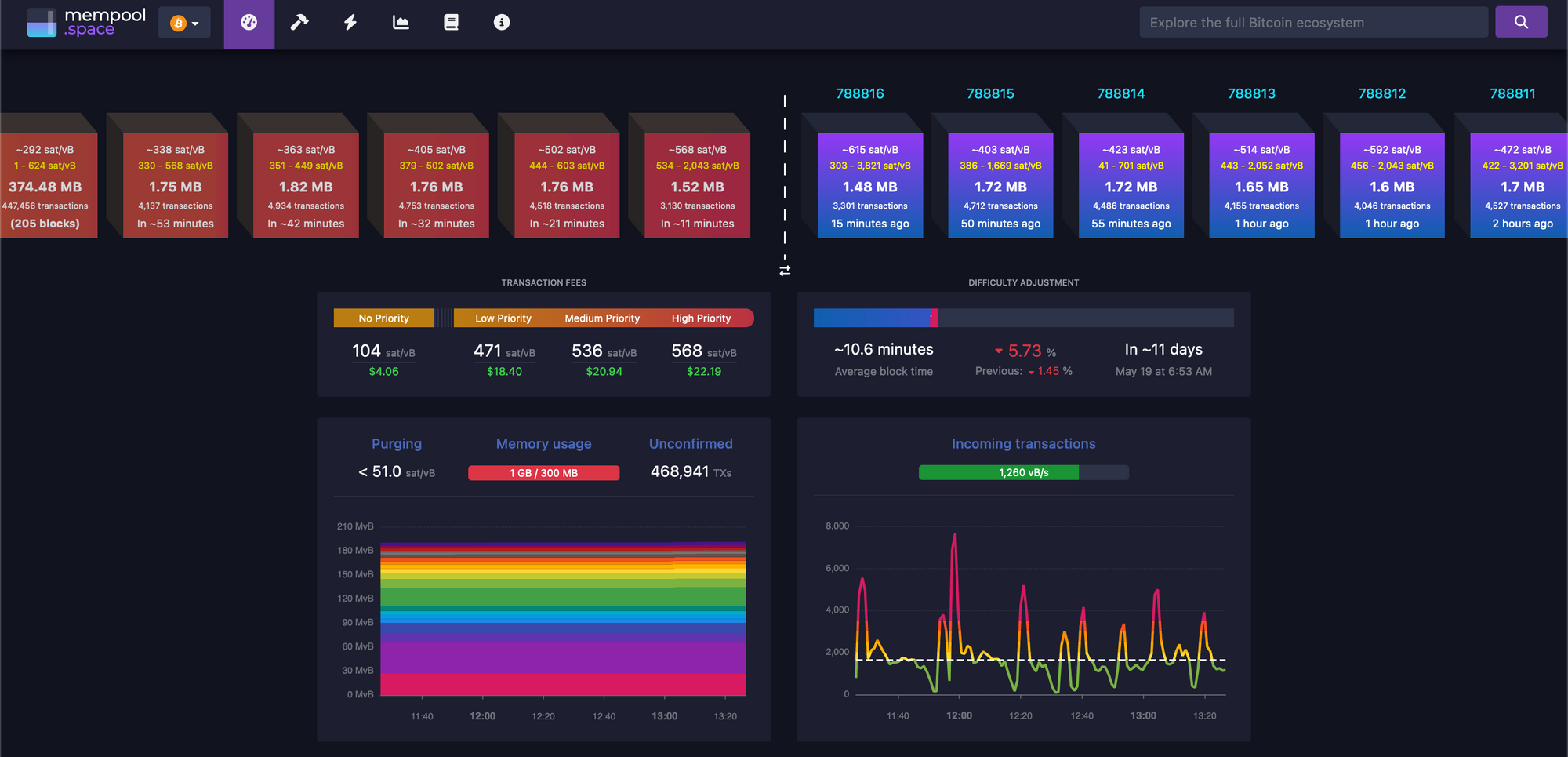
There must be a limit to how much data is transferred across the bitcoin network in order to keep the ability to run and use your own node accessible. A node is required to interact with the global bitcoin network - if you do not use your own node then you must trust someone else's node. If nodes become inaccessible to run then the network will centralize around the remaining entities that operate them - threatening the censorship resistance at the core of bitcoin's value prop. The bitcoin protocol uses three main mechanisms to keep node operation costs low - a fixed limit on the amount of data in each block, an automatic difficulty adjustment that regulates how many blocks are produced based on current mining hash rate, and a robust dynamic transaction fee market.
Bitcoin transaction fees limit network abuse by making usage expensive. There is a cost to every transaction, set by a dynamic free market based on demand for scarce block space. It is an incredibly robust way to prevent spam without relying on centralized entities that can be corrupted or pressured.
After the 2017 bitcoin fee spike we had six years of relative quiet to build tools that would be robust in a sustained high fee market. Fortunately our tools are significantly better now but many still need improvement. Most of the pain points we see today will be mitigated.
The reality is we were never going to be fully prepared - pressure is needed to show the pain points and provide strong incentives to mitigate them.
It will be incredibly interesting to watch how projects adapt under pressure. Optimistic we see great innovation here.
_If you are willing to wait for your transaction to confirm you can pay significantly lower fees. Learn best practices for reducing your fee burden here.
My guide for running and using your own bitcoin node can be found here._
If you found this post helpful support my work with bitcoin.

-
 @ f85b9c2c:d190bcff
2025-06-02 15:58:09
@ f85b9c2c:d190bcff
2025-06-02 15:58:09
Never get too attached to something to the extent that you can live without it
The Weight We Pile On I’ve noticed something about myself lately—most of my worries, my sleepless nights, my tight chest—they’re born from my own hands. We cause anxiety, stress, and headaches by ourselves, don’t we? It’s a truth I can’t dodge, a mirror I can’t unsee. I cling too hard, I grip too tight, I fight for things that don’t need a fight. And in the end, I’m the one left aching, shaking, breaking. It’s not the world doing this to me—it’s me. I stack the bricks of stress, one by one, until I’m crushed beneath. I’ve learned the hard way that attachment is a thief, sneaking in to steal my peace.
The Trap of Holding Too Close I used to think love meant holding on with all my might—people, dreams, plans, tight in my sight. But oh, how that backfired, how it wired me wrong. The tighter I held, the louder the bell of stress would ring, a sting I couldn’t shake. I’d lose sleep over a job I might not get, fret over a friend who didn’t text back, or rack my brain over a future I can’t predict. Attachment became my chain, my pain, my rain. I’d pour my soul into something—someone—and when it slipped, I’d trip, I’d fall, I’d call it a loss. But was it? Or was I just too attached, too latched, too matched to something I thought I couldn’t live without?
Learning to Let Go Here’s what I’m teaching myself now: never get too attached to something to the extent you can’t live without it. It’s a rhythm I’m learning—release, breathe, ease. Life flows better when I don’t clutch. That doesn’t mean I don’t care—it means I care enough to set it free.
I think of the times I let go—a relationship that wasn’t mine to force, a goal that wasn’t my course. The headaches faded, the stress unbraided itself from my mind. I found I could live without it, thrive without it, jive without it. What’s meant for me stays; what’s not drifts away. And that’s okay—it’s a sway I can dance to.
Freedom in the Balance I’m not saying detachment is easy—it’s a battle, a rattle, a shift. But there’s freedom in it, a lightness I can’t resist. When I stop tying my worth to things—to rings, to strings, to wings—I stop the cycle of self-made misery. Anxiety shrinks when I don’t overthink. Stress unwinds when I don’t bind myself to what’s out of reach.
I’ve started asking myself: Can I live without this? If the answer’s no, I know I’ve gone too far, too deep, too steep. So, I pull back, I slack the rope, I cope with grace. Life’s too short to let my own hands choke my joy.
A Lighter Way to Live We cause anxiety, stress, and headaches by ourselves—I see it now, clear as day, bright as May. But we can stop. We can drop the load, unload the strain, regain the calm. For me, it’s about loving without owning, dreaming without drowning, living without frowning over what might slip.
I’ll hold what matters, but loosely, smoothly, coolly. Because in the end, I don’t want to be the one tying knots in my own heart. I want to live free—free from me, free to be. And that’s a rhythm worth chasing, a peace worth embracing.
-
 @ dfa02707:41ca50e3
2025-06-02 17:02:17
@ dfa02707:41ca50e3
2025-06-02 17:02:17News
- Bitcoin mining centralization in 2025. According to a blog post by b10c, Bitcoin mining was at its most decentralized in May 2017, with another favorable period from 2019 to 2022. However, starting in 2023, mining has become increasingly centralized, particularly due to the influence of large pools like Foundry and the use of proxy pooling by entities such as AntPool.

Source: b10c's blog.
- OpenSats announces the eleventh wave of Nostr grants. The five projects in this wave are the mobile live-streaming app Swae, the Nostr-over-ham-radio project HAMSTR, Vertex—a Web-of-Trust (WOT) service for Nostr developers, Nostr Double Ratchet for end-to-end encrypted messaging, and the Nostr Game Engine for building games and applications integrated with the Nostr ecosystem.
- New Spiral grantee: l0rinc. In February 2024, l0rinc transitioned to full-time work on Bitcoin Core. His efforts focus on performance benchmarking and optimizations, enhancing code quality, conducting code reviews, reducing block download times, optimizing memory usage, and refactoring code.
- Project Eleven offers 1 BTC to break Bitcoin's cryptography with a quantum computer. The quantum computing research organization has introduced the Q-Day Prize, a global challenge that offers 1 BTC to the first team capable of breaking an elliptic curve cryptographic (ECC) key using Shor’s algorithm on a quantum computer. The prize will be awarded to the first team to successfully accomplish this breakthrough by April 5, 2026.
- Unchained has launched the Bitcoin Legacy Project. The initiative seeks to advance the Bitcoin ecosystem through a bitcoin-native donor-advised fund platform (DAF), investments in community hubs, support for education and open-source development, and a commitment to long-term sustainability with transparent annual reporting.
- In its first year, the program will provide support to Bitcoin hubs in Nashville, Austin, and Denver.
- Support also includes $50,000 to the Bitcoin Policy Institute, a $150,000 commitment at the University of Austin, and up to $250,000 in research grants through the Bitcoin Scholars program.
"Unchained will match grants 1:1 made to partner organizations who support Bitcoin Core development when made through the Unchained-powered bitcoin DAF, up to 1 BTC," was stated in a blog post.
- Block launched open-source tools for Bitcoin treasury management. These include a dashboard for managing corporate bitcoin holdings and provides a real-time BTC-to-USD price quote API, released as part of the Block Open Source initiative. The company’s own instance of the bitcoin holdings dashboard is available here.
Source: block.xyz
- Bull Bitcoin expands to Mexico, enabling anyone in the country to receive pesos from anywhere in the world straight from a Bitcoin wallet. Additionally, users can now buy Bitcoin with a Mexican bank account.
"Bull Bitcoin strongly believes in Bitcoin’s economic potential in Mexico, not only for international remittances and tourism, but also for Mexican individuals and companies to reclaim their financial sovereignty and protect their wealth from inflation and the fragility of traditional financial markets," said Francis Pouliot, Founder and CEO of Bull Bitcoin.
- Corporate bitcoin holdings hit a record high in Q1 2025. According to Bitwise, public companies' adoption of Bitcoin has hit an all-time high. In Q1 2025, these firms collectively hold over 688,000 BTC, marking a 16.11% increase from the previous quarter. This amount represents 3.28% of Bitcoin's fixed 21 million supply.

Source: Bitwise.
- The Bitcoin Bond Company for institutions has launched with the aim of acquiring $1 trillion in Bitcoin over 21 years. It utilizes secure, transparent, and compliant bond-like products backed by Bitcoin.
- The U.S. Senate confirmed Paul Atkins as Chair of the Securities and Exchange Commission (SEC). At his confirmation hearing, Atkins emphasized the need for a clear framework for digital assets. He aims to collaborate with the CFTC and Congress to address jurisdiction and rulemaking gaps, aligning with the Trump administration's goal to position the U.S. as a leader in Bitcoin and blockchain finance.
- Ethereum developer Virgil Griffith has been released from custody. Griffith, whose sentence was reduced to 56 months, is now seeking a pardon. He was initially sentenced to 63 months for allegedly violating international sanctions laws by providing technical advice on using cryptocurrencies and blockchain technology to evade sanctions during a presentation titled 'Blockchains for Peace' in North Korea.
- No-KYC exchange eXch to close down under money laundering scrutiny. The privacy-focused cryptocurrency trading platform said it will cease operations on May 1. This decision follows allegations that the platform was used by North Korea's Lazarus Group for money laundering. eXch revealed it is the subject of an active "transatlantic operation" aimed at shutting down the platform and prosecuting its team for "money laundering and terrorism."
- Blockstream combats ESP32 FUD concerning Jade signers. The company stated that after reviewing the vulnerability disclosed in early March, Jade was found to be secure. Espressif Systems, the designer of the ESP32, has since clarified that the "undocumented commands" do not constitute a "backdoor."
- Bank of America is lobbying for regulations that favor banks over tech firms in stablecoin issuance. The bank's CEO Brian Moynihan is working with groups such as the American Bankers Association to advance the issuance of a fully reserved, 1:1 backed "Bank of America coin." If successful, this could limit stablecoin efforts by non-banks like Tether, Circle, and others, reports The Block.
- Tether to back OCEAN Pool with its hashrate. "As a company committed to financial freedom and open access, we see supporting decentralization in Bitcoin mining as essential to the network’s long-term integrity," said Tether CEO Paolo Ardoino.
- Bitdeer to expand its self-mining operations to navigate tariffs. The Singapore-based mining company is advancing plans to produce machines in the U.S. while reducing its mining hardware sales. This response is in light of increasing uncertainties related to U.S. trade policy, as reported by Bloomberg.
- Tether acquires $32M in Bitdeer shares. The firm has boosted its investment in Bitdeer during a wider market sell-off, with purchases in early to mid-April amounting to about $32 million, regulatory filings reveal.
- US Bitcoin miner manufacturer Auradine has raised $153 million in a Series C funding round as it expands into AI infrastructure. The round was led by StepStone Group and included participation from Maverick Silicon, Premji Invest, Samsung Catalyst Fund, Qualcomm Ventures, Mayfield, MARA Holdings, GSBackers, and other existing investors. The firm raised to over $300 million since its inception in 2022.
- Voltage has partnered with BitGo to [enable](https://www.voltage.cloud/blog/bitgo-and-voltage-team-up-to-deliver-instant-bitcoin-and-stabl
-
 @ ce2820ce:8cf20d40
2025-06-02 14:35:00
@ ce2820ce:8cf20d40
2025-06-02 14:35:00By now, most of you have probably heard Bitcoin talked about in vague and mysterious terms in the news or online. What IS it? What does it actually DO? And HOW is it actually worth anything at all?
These are big questions that involve some big answers that (for the sake of this article) I am not entirely prepared to give you, and that you are likely (in all honesty) not entirely prepared to hear. Cryptographic Hash functions, verifiable ledger transactions, store of value, proof of work, custodial vs non-custodial wallets.
What are all these things? Why do they matter, and what is it that you really NEED to understand about bitcoin?
Here we go...
In my opinion, what you need to know to feel good about bitcoin is about as much as you NEED to know about how your car starts up in the morning when you need it to, or about what's happening inside your iPhone when you tap your fingers to that illustrious screen. At its base function, assuming the machine is well built and reliable, all you need is the key, or your passcode, and a basic level of intelligence for it to do what you need it to. Not many of us really obsess over what's actually happening behind the scenes of these daily and habitual items, and not many of us should really have to, either. As long as we can trust and verify the producers of the products we are agreeing to purchase, we should let them worry about the mechanics so that we can go about our lives as intended, and with the added benefits of these items.
And so it goes for bitcoin. “But what IS it?!” is the most common way I hear people discredit the mysterious “coin” that doesn't actually exist, and that doesn't actually give you anything to hold on to. It's true, the answer is not straightforward and not exactly simple, and it involves a fair amount of nerd-speak, but not more than I would argue than is necessary for even a basic explanation of the way our current market economics, Federal Reserve, and monetary policy are functioning behind the simple exchange of cash money, not to mention credit card transactions.
How quickly I would lose you, if I have not already, to the bore of technical details and regurgitated economic theories, and so I am going to try something new, and get you to understand not what Bitcoin is, but why Bitcoin is, and what that means for the security, wealth and financial independence of our collective future.
At its very very core, the fundamental concept to understand is this one of FULL OWNERSHIP. When you own your bitcoin, and we'll go a bit deeper into that in a minute, what you own is a 12 word phrase that when entered into the network to make a transaction is the only way for the network to identify who you are. No one else has that same private key, and no one else has any way to obtain it, unless they pry it from your very hands, or manage to extract it from you by way of trickery.
We've all heard the stories of the “lost bitcoin wallet”. That person who lost their passphrase claiming to hold what could now be millions of dollars worth of bitcoin. These stories are often posited as negative features of the bitcoin network, but there are words we use for these types of people in general; irresponsible, nearsighted and dumb.
The beauty, and the apparent pariah of bitcoin is this very feature:
SELF OWNERSHIP.
When done properly, you and only you can interact or interfere with your bitcoin identity. The network is verified 1000 times over every second by a network of contributors, and as long as you hold those keys, then your bitcoin balance on the ledger is always and forever linked to you. When you decide to send that bitcoin to someone else on the network; that transaction is listed, your private key transcribed (by an enormously complicated and involved amount of computational work) onto a unified public ledger that is then verified and trusted (again by a brilliantly devised and incredibly complex computer function) to be posted as the de-facto “true” balance sheet.
Unlike any bank or credit card company of today, where a portion of every transaction, and every nefariously collected fee is sanctioned off to some private network of profiteers, the bitcoin networks fees are directly paid to the “workers” (aka miners) who run the computers (and thus pay for the electricity) to keep the network functioning. These small independent to giant mining farms all over the globe are thus given an incentive to keep up the network. Even small-time nodes can generate income for their local operations. Well, generate bitcoin, and you can decide to call that income or not!
-—
What's happening today with bitcoin is what I fear will be the death of such a beautifully crafted and functioning system. Today you can buy bitcoin easily in many mobile apps (CashApp, Coinbase, Robinhood, Venmo, and more) and watch its value go up and down in excitement or dismay. What we don't realize when we buy bitcoin this way, is that we are treating it much like we treat the rest of the money in our bank. At some basic level, the bank holding your assets has legal and/or physical control of it while in their hands. Sure, they keep your name on it, but they can block your access to accounts at their discretion. They can charge unnecessary and unexplained fees, and they can use it to invest however they like while it's theirs.
The bottom line is; If you don't own your key, you don't own your bitcoin. When you hear of exchanges like FTX going down, which claimed to be holding your crypto while they flagrantly spent it, and millions of people lost their money. Well, those irresponsible (and nearsighted, and dumb) people entrusted their assets to an irresponsible, (and corrupt, and nearsighted, and incredibly dumb) unverifiable company.
What I am saying is, it is wrong to adopt Bitcoin without adopting the core principles behind it. Self-responsibility, full ownership, trust, verification, and value based on effort (aka proof-of-work) are essential features of bitcoin's operation. We have not even mentioned (nor will we in great detail) the mathematically verifiable finite amount of bitcoin that will exist over the next century. It is sure fact. It will become scarce with time, and its value will subsequently increase. Can we be so certain of any other markets you can think of?
Everything about the bitcoin network is transparent. The original white-paper is easily accessible. The 21 million coin limit, the self-supported and self sustained network principles, all of it. The entire verified ledger is a roughly 10 Gigabyte txt file of encrypted transactions, and its duplicated and replicated all over the world by a genius system of nodes. Nodes make a profit for providing the computer power, and there is no central command, CEO or shareholders outside the system able to profit or interfere.
Unless...and this is the clincher, unless big companies start stacking up their own coiffeurs of bitcoin with their enormous buying power and then offering it out at a premium (with added transaction fees) through their own proprietary banks and apps. Unless these whales – as we like to call them – have enough weight in the market to create their own influence, and they are able to buy it up before the plebs – as we also like to call them – are able to secure their hands on it without these 3rd parties.
So anyone who has jumped on the bitcoin bandwagon, and helped make Coinbase a billion dollar public company, and let them hold your assets behind an email login and an account with them, let me tell you something, “You've been duped!”. The only way to own bitcoin is to store your bitcoin in a wallet that you own the keys to. I'm not going to teach you any more about that here, but by now you should probably get the point.
Bitcoin represents a society that trusts its individuals to have the responsibility to handle themselves accordingly. The value you hold, and the value you contribute to your community, represents your worth, and is to be valued accordingly. Everything has a value. YOU have a value, and it is much greater than any amount of money can give you, but it is also something that can be scary to hold and to be responsible for all on your own. In a society where we offload every bit of our liability and personal holdings to insurance companies and banks, bitcoin represents a shift to a world without unnecessary and energy sucking intermediaries. It also offers a world we are not used to, in which we have to educate ourselves and trust ourselves enough not be fools and to take the proper precautions to secure our assets long-term for the future. Bitcoin will grow, and it will continue to be valued. That much should be apparent at this point.
So...do what you will. I'm not here to preach, I'm just here to inform. However, I do advise against being irresponsible, nearsighted, and dumb.
Just...don't believe in systems you can't verify. Don't trust money that you don't own, and don't put your future in anyone else's hands.
If you understand that fundamental shift, you understand enough about bitcoin to put your keys in the ignition and get started. You'll just have to take it upon yourself to figure out how.
Hodl On.
- §parrow
www.primal.net/sparrow
-
 @ 7f6db517:a4931eda
2025-06-02 15:02:31
@ 7f6db517:a4931eda
2025-06-02 15:02:31

"Privacy is necessary for an open society in the electronic age. Privacy is not secrecy. A private matter is something one doesn't want the whole world to know, but a secret matter is something one doesn't want anybody to know. Privacy is the power to selectively reveal oneself to the world." - Eric Hughes, A Cypherpunk's Manifesto, 1993
Privacy is essential to freedom. Without privacy, individuals are unable to make choices free from surveillance and control. Lack of privacy leads to loss of autonomy. When individuals are constantly monitored it limits our ability to express ourselves and take risks. Any decisions we make can result in negative repercussions from those who surveil us. Without the freedom to make choices, individuals cannot truly be free.
Freedom is essential to acquiring and preserving wealth. When individuals are not free to make choices, restrictions and limitations prevent us from economic opportunities. If we are somehow able to acquire wealth in such an environment, lack of freedom can result in direct asset seizure by governments or other malicious entities. At scale, when freedom is compromised, it leads to widespread economic stagnation and poverty. Protecting freedom is essential to economic prosperity.
The connection between privacy, freedom, and wealth is critical. Without privacy, individuals lose the freedom to make choices free from surveillance and control. While lack of freedom prevents individuals from pursuing economic opportunities and makes wealth preservation nearly impossible. No Privacy? No Freedom. No Freedom? No Wealth.
Rights are not granted. They are taken and defended. Rights are often misunderstood as permission to do something by those holding power. However, if someone can give you something, they can inherently take it from you at will. People throughout history have necessarily fought for basic rights, including privacy and freedom. These rights were not given by those in power, but rather demanded and won through struggle. Even after these rights are won, they must be continually defended to ensure that they are not taken away. Rights are not granted - they are earned through struggle and defended through sacrifice.
If you found this post helpful support my work with bitcoin.

-
 @ 91117f2b:111207d6
2025-06-02 16:04:15
@ 91117f2b:111207d6
2025-06-02 16:04:15
I still remember the day I became obsessed with photography. I was 16, and my parents gifted me a vintage camera. From that moment on, I was hooked. I spent hours clicking pictures, experimenting with lighting, and editing my shots. My friends and family would often tease me, saying I was too focused on photography, but I couldn't help it. It was my passion.
As time passed, my obsession only grew stronger. I'd wake up early, grab my camera, and head out to capture the perfect shot. I'd spend hours editing, trying to get the perfect blend of colors and lighting. My grades suffered, and my relationships began to fray, but I couldn't stop. Photography had become my everything.
One day, I landed a small gig with a local magazine. They wanted me to shoot a cover story, and I was over the moon. I poured my heart and soul into that shoot, and the results were stunning. The magazine loved my work, and soon, I was getting more assignments. My obsession had finally paid off.
But with success came the realization that my obsession had taken a toll on my life. I was exhausted, and my relationships were strained. I had to learn to balance my passion with self-care and prioritize my well-being.
Today, I'm grateful for my obsession. It taught me discipline, creativity, and perseverance. I've learned to channel my energy into constructive pursuits and make time for the people and things that matter. My obsession still drives me, but now it's a force for good.
Have you ever had an obsession that changed your life?
But sometimes obsession can be a bad thing if it reaches the stage of death. You say"i can't do without it", it is astage. You should try and look for a way out.
-
 @ 7f6db517:a4931eda
2025-06-02 17:02:19
@ 7f6db517:a4931eda
2025-06-02 17:02:19
Bank run on every crypto bank then bank run on every "real" bank.
— ODELL (@ODELL) December 14, 2022
Good morning.
It looks like PacWest will fail today. It will be both the fifth largest bank failure in US history and the sixth major bank to fail this year. It will likely get purchased by one of the big four banks in a government orchestrated sale.
March 8th - Silvergate Bank
March 10th - Silicon Valley Bank
March 12th - Signature Bank
March 19th - Credit Suisse
May 1st - First Republic Bank
May 4th - PacWest Bank?PacWest is the first of many small regional banks that will go under this year. Most will get bought by the big four in gov orchestrated sales. This has been the playbook since 2008. Follow the incentives. Massive consolidation across the banking industry. PacWest gonna be a drop in the bucket compared to what comes next.
First, a hastened government led bank consolidation, then a public/private partnership with the remaining large banks to launch a surveilled and controlled digital currency network. We will be told it is more convenient. We will be told it is safer. We will be told it will prevent future bank runs. All of that is marketing bullshit. The goal is greater control of money. The ability to choose how we spend it and how we save it. If you control the money - you control the people that use it.
If you found this post helpful support my work with bitcoin.

-
 @ 975e4ad5:8d4847ce
2025-06-02 14:01:13
@ 975e4ad5:8d4847ce
2025-06-02 14:01:13Inflation vs. Deflation: What’s the Difference?
Today, we use fiat currencies—dollars, euros, or leva—issued by governments and central banks that can print money without limit. This leads to inflation, a decrease in the purchasing power of money because the money supply grows faster than the goods and services in the economy. The result? Prices for everything—from bread to cars—rise over time.
Bitcoin, unlike fiat money, has a hard cap of 21 million coins, set to be fully “mined” by 2140. This means the money supply is fixed and can’t be arbitrarily increased. In such a system, as technology improves production and the economy grows, the amount of goods and services increases, but the money supply stays the same. The result is deflation—prices fall because the same amount of money is chasing more goods.
The Bread Example
Take bread as an example. Fifty years ago, making bread required a lot of manual labor—kneading, shaping, baking. Today, machines handle most of the process, from mixing dough to packaging. Production is faster, more efficient, and requires fewer workers. Logically, bread should be cheaper, right? Yet, its price has risen from, say, 20 cents decades ago to $1 today. Why? Because inflation, driven by printing more money, outpaces the cost savings from technology. In a Bitcoin standard, those same technological advancements would lead to cheaper bread since there’s no excess money “diluting” purchasing power.
Wages in a Deflationary World
Now, picture your boss saying, “We’re cutting your salary this year.” Sounds like a nightmare, doesn’t it? In today’s world, we expect wage increases to “keep up” with inflation. But in a deflationary world, where prices are falling, a lower salary isn’t a problem. If bread, rent, and clothes get cheaper, you can buy more with less money. For example, if your salary drops from $2,000 to $1,800 but bread falls from $1 to $0.75, your real purchasing power actually increases. It’s a radically different mindset, but it makes sense in a world with a fixed currency.
Why Is This So Hard to Grasp?
The idea of falling prices and wages feels alien because we were born into an inflationary world. From childhood, we’ve seen the cost of everything—food, housing, even coffee at our favorite café—steadily rise. Inflation is so ingrained that we assume prices must go up. But this isn’t a natural law; it’s a consequence of the fiat system. A century ago, when gold backed currencies, prices often stayed stable or even fell as technology advanced. A Bitcoin standard would bring us back to that dynamic.
What Else Should We Know?
A deflationary world brings other fascinating changes. People would save more because their money would be worth more tomorrow. Today, inflation erodes savings, pushing us to spend or invest quickly. In a Bitcoin standard, we’d value the future more since our savings would grow in real value. But there are challenges too—deflation might discourage risky investments because people prefer holding money over spending it on uncertain ventures.
Moreover, a Bitcoin standard reshapes how we think about debt. Today, we take loans knowing tomorrow’s money will be worth less, making repayment easier. In a deflationary world, debts become heavier because you’d owe more real value tomorrow. This could make us more cautious and responsible with borrowing.
A Bitcoin standard invites us to rethink the economy we grew up in. Falling prices and stagnant or declining wages sound like a fantasy, but they’re the logical outcome of a currency with a fixed supply. Technology will keep making life easier and more efficient, and in a world without inflation, this would translate to lower prices and greater purchasing power. Maybe it’s time we stop taking inflation for granted and imagine a world where our money grows more valuable over time.
-
 @ 8bad92c3:ca714aa5
2025-06-02 16:01:47
@ 8bad92c3:ca714aa5
2025-06-02 16:01:47Key Takeaways

In this episode, Bitcoin Core veteran James O’Beirne delivers a sharp critique of Bitcoin’s developmental stagnation, attributing it to political dysfunction, post-fork trauma, and resistance within Bitcoin Core to critical upgrades like CheckTemplateVerify (CTV). He argues that while institutional adoption accelerates, internal innovation is being stifled by misplaced controversies—such as the OP_RETURN policy debate—and a bottlenecked governance model. O’Beirne warns that without urgent progress on scaling solutions like CTV, congestion control, and vaulting systems, Bitcoin risks ossifying and becoming vulnerable to institutional capture. Advocating a more adversarial posture, he suggests forking or building alternative clients to pressure progress but remains hopeful, seeing rising momentum for protocol upgrades from developers outside the Core elite.
Best Quotes
“Everybody has mempool derangement syndrome… it’s such a small issue in the grand scheme of challenges Bitcoin is facing.”
“Bitcoin is as much an experiment in technical human organization as it is a pure technology.”
“If we don’t figure out how to scale trustless Bitcoin self-custody, we’re toast. Right now, only about 2.5% of Americans could actually use Bitcoin monthly in a meaningful way.”
“CTV isn’t sexy—it just works. It keeps getting reinvented because it's so useful. At this point, it’s essential.”
“If Core isn’t going to evaluate these proposals, someone has to. Otherwise, we need to build the social justification for forking.”
“Lightning didn’t scale Bitcoin the way we expected. Let’s stop assuming a silver bullet is coming and start building the bridges ourselves.”
“You could onboard someone with just a phone and a vault… and give them more security than most hardware wallets.”
Conclusion
While Bitcoin gains traction with institutions and governments, its internal development is stalling under political inertia and misplaced focus. James O’Beirne urges the community to prioritize impactful upgrades like CTV and CCV, challenge the bottleneck of Bitcoin Core if needed, and recommit to Bitcoin’s foundational principles. This episode underscores the urgent need to bridge technical and social divides to ensure Bitcoin remains a decentralized, censorship-resistant tool for global value transfer.
Timestamps
0:00 - Intro
0:41 - Multi axis issue
5:12 - Core governance
9:41 - Derailing productive discussions
17:05 - Fold & Bitkey
18:32 - CTV
29:24 - Unchained
29:53 - Magnitude of change
41:45 - Covenant proposals
50:16 - CTV benefits
57:56 - Institutional ownership
1:05:26 - Moving forwardTranscript
(00:00) I think I have a somewhat different take than 99% of the people in the discussion. What freaks me out is if you've got Sailor owning half million coins or whatever and Black Rockck owning however many, people forget that Bitcoin is as much an experiment in technical human organization as it is, you know, as a sort of pure technology.
(00:17) The undernowledged reality is I'm actually interested to see if we have like a black swan adoption event from the machines. the risk given the increased scrutiny that things like the strategic Bitcoin reserve introduce there's a shot clock on getting to trustless decentralized value storage technology and I think we really have to be thinking about that combination of physically tired and mentally tired it's also tiresome James it's it's I was looking at that picture today and I was actually going to tweet it absent any caption just because it's
(00:52) a really good Uh yeah, it's a really good epitome of uh of a lot of stuff. But I'm with you, man. I'm tired. It's Friday. Who is it? Is that a just some random Japanese guy? I think it's it's I actually think it's from a documentary about I don't know if it's Africa, but Oh, yes. Yes.
(01:13) It's there's a little bit of a kind of like racy connotation there. Um yeah, the uh it's been long. It was interesting for me. We had Texas Energy Mining Summit here in Austin the beginning of the week. It sort of blended with Bitcoin plus I was over at Bitcoin++ Wednesday and yesterday doing the live desk and obviously topic of conversation is OP return this policy decision and this policy change that that core wants to make and many people are uh angry about and it's just again it's also tiresome.
(01:52) spoke with people on both sides over the two days and I I think I came away more confused than than I entered entered the week like what is the optimal path and somebody who's worked on Bitcoin core worked on Bitcoin core for for many years I've seen you tweeting about it seems like I won't put words in your mouth I'll let you say like what is your perspective on this whole policy debate around op return yeah so in general I think I have a somewhat different take than um 99% of the people in in the discussion which is basically that this
(02:25) is a really stupid discussion um everybody has mempool derangement syndrome like at every layer um and uh what what frustrates me a little bit about the conversation not not to not to uh get like um grumpy right off the bat but it's just it's it's such a small issue in the in the grand scheme of challenges that are being presented to Bitcoin that like spending all this drama on it um is is really a silly use of time and uh kind of emotion, but I can break it down for you.
(03:02) I mean, I think I think like largely the argument is happening on a few layers. Um the change itself technically I'm totally in favor of it. It makes sense. you know, basically the rationale is like, well, you know, um, people want to include exogenous data into the chain. Um, you can't really stop them from doing that.
(03:23) Um and so let's basically minimize the damage by saying hey you know we're going to make it easier for people to actually make use of op return as a data carrier which uh lets us avoid bloat in the UTXO set which is like one of the precious resources we have to take care of for the node.
(03:44) Um, so that's all good and the and the other thing too is that as we've seen with the ordinal stuff is um, you know, data is going to wait make its way into the chain and actually it hurts the whole network when um, there are transactions that most nodes haven't seen yet but they come through a block. Basically that slows down block propagation time.
(04:06) And so the whole idea is if you bring policy closer to the actual consensus rules, closer to the actual transactions that are going to come through and be mined, then you're going to have better network performance. You're going to have lower latency when it comes to actually broadcasting a new block around. So that's like the the sort of technical layer of the discussion.
(04:25) It's it's really a minute non-controversial change if you kind of have fluency with the the technical end of the mempool. Um, but I think there's this this higher layer to the conversation which is sort of a readjudication of spam in Bitcoin. And it's, you know, I think a lot of the the old animal spirits and sentiments are emerging about like, well, we don't like spam.
(04:49) And I think for a lot of people who kind of get lost in the technical details, it's very easy to latch on to the sentiment of I don't like spam. Um and so uh so that makes the sort of ocean knots camp maybe more appealing. Uh so that's yeah that's I guess a summary if you want to jump in anything in particular we can that's what I was saying I came out more confused than I went in.
(05:20) So last week on RHR, hey, I agree. You want policy to be aligned with consensus. Like whether we like it or not, these transactions are getting into blocks. They're non-standard, but they are valid within consensus rules and policy just isn't aligning with that. And like you said, this is disrupting the P2P layer and potentially the fee uh estimation process that that many nodes use, many applications use.
(05:49) And it makes sense to me to align policy with consensus. These things are happening. And if you can make it so Bitcoin full nodes are operating as efficiently and optimally as possible by changing this, it makes sense to me. I think my one like push back was like makes sense to me. However, I think how it was communicated to people and the whole mess with the PR.
(06:12) I think it's I think it's it was it's it's just a tactical error. Like even if this change gets in the the the real benefit of is is not material. You know, nobody was really clamoring for it. um this stuff always, you know, gets the hackles up of everybody who cares at all about, you know, spamming Bitcoin. So, it was a real tactical error.
(06:36) And I think that's that's one place where I mean it's kind of I had a little bit of shot in Freud seeing it because I'm fairly critical of core as a project along you know a variety of axes at this point and it was just kind of a demonstration of the the disconnection and kind of ineptitude of um publicity management kind of on on their end.
(06:58) Um, and so like there's part of me that enjoys seeing that because I I'm kind of convinced that that group has a lot less efficacy than they have credibility. And so to to see that kind of catch up was was interesting. The uh let's dive into that like what you said multiple axes you have a problem. I think we've throughout the years like we've been discussing the issues that Bitcoin like yourself particularly as a Bitcoin core developer for many years trying to get things through not only in the context of the way core works from a governance
(07:35) structure but just the way Bitcoin works as a distributed open source protocol like trying to get changes in and I will say like -
 @ 7f6db517:a4931eda
2025-06-02 15:02:31
@ 7f6db517:a4931eda
2025-06-02 15:02:31
People forget Bear Stearns failed March 2008 - months of denial followed before the public realized how bad the situation was under the surface.
Similar happening now but much larger scale. They did not fix fundamental issues after 2008 - everything is more fragile.
The Fed preemptively bailed out every bank with their BTFP program and First Republic Bank still failed. The second largest bank failure in history.
There will be more failures. There will be more bailouts. Depositors will be "protected" by socializing losses across everyone.
Our President and mainstream financial pundits are currently pretending the banking crisis is over while most banks remain insolvent. There are going to be many more bank failures as this ponzi system unravels.
Unlike 2008, we have the ability to opt out of these broken and corrupt institutions by using bitcoin. Bitcoin held in self custody is unique in its lack of counterparty risk - you do not have to trust a bank or other centralized entity to hold it for you. Bitcoin is also incredibly difficult to change by design since it is not controlled by an individual, company, or government - the supply of dollars will inevitably be inflated to bailout these failing banks but bitcoin supply will remain unchanged. I do not need to convince you that bitcoin provides value - these next few years will convince millions.
If you found this post helpful support my work with bitcoin.

-
 @ cbaa0c82:e9313245
2025-06-02 13:31:13
@ cbaa0c82:e9313245
2025-06-02 13:31:13TheWholeGrain - #May2025
Last May, during our first year of releasing content we created and awarded our first badge on NOSTR. It was the first minting of the Official Fan Badge. We wanted to do it again a year later!
As Bread and Toast moves along we want to be able to recognize the fans who motivate us to keep sharing our journey and all of our adventures!
Our first Sunday Single of May 2025 was a tribute to all the fans we currently have because there is nothing quite like a good fan! As previously mentioned, we also released the second minting of the Official Fan Badge! Thank you to everyone who follows, zaps, reacts, and comments on all of the notes posted to NOSTR by Bread and Toast!
Even more incredible than that was the announcement of the Yarn Buddy! A yarn based plushie of Bread handcrafted by the one and only Yarnlady! The announcement was made on May 19th, and it is without a doubt our best merchandise product so far! https://i.nostr.build/cscbHW6oWqVtxmyT.png Learn more about the Yarn Buddy below.
Sunday Singles - May 2025 2025-05-04 | Sunday Single 91 Title: A Good Fan We cannot say this enough... We love our fans! https://i.nostr.build/h6KzGz8kleYdmQxM.png
2025-05-11 | Sunday Single 92 Title: Hang Gliding Bread loves the thrill of flying through the air https://i.nostr.build/JCA656iy7L9bDLYF.png
2025-05-18 | Sunday Single 93 Title: String Theory Bread stumbled upon a spool of yarn and got an idea. It might knot be what you expected... Yarn't gonna believe what's coming next! https://i.nostr.build/mazQZkGKwzUz1O3O.png
2025-05-25 | Sunday Single 94 Hot Air Balloon Sometimes Bread and End-Piece claim Toast is full of hot air so why not put it to some use! https://i.nostr.build/1VIeBl2rW7aVD6Hb.png
Adventure Series: Questline The effects of the darkness of the forest begin to become stronger as Toast and End-Piece lose sight of Bread and the light of the magical staff.
Artist: Dakota Jernigan (The Bitcoin Painter) Writer: Daniel David (dan 🍞)
2025-05-06 | Questline 009 - Pitch Black Due to their hesitation, Toast and End-Piece lose sight of their leader's magical light... They try to stay close to one another for their own safety, but no one ever feels safe in the pitch black darkness of the forest. https://i.nostr.build/Kre0BR4ylKShhTLE.png
2025-05-20 | Questline 010 - A Light in the Dark With a magical staff lighting the way Bread keeps a quick pace in order to get through the forest as quick as possible. However, Bread begins to notice all the webs that surround the trees. With sudden concern for fellow comrades Bread turns around surprised to realize that they are no longer even there. https://i.nostr.build/KsyReXgigDlLxiLr.png
Other Content Released in May 2025 2025-05-07 | Toast's Comic Collection Title: Jugbread #13 Everyone knows Toastie’s best friend, Jugbread Jones! https://i.nostr.build/TM3fpLyVkB7PcRuK.png
2025-05-14 | Concept Art Title: Cat Attack! At some point the characters are going to face perilous challenges in the world. For example, the characters could easily come across a cat that would be quick to attack them! https://i.nostr.build/19t1GYXvmXbKUO0q.png
2025-05-21 | Bitcoin Art Title: Nodes Block Height: 897690 Every slice of bread is like an individual using the network! https://i.nostr.build/3MvvAP9RaAd7ZPwt.png
Additions to The Bakery in May 2025 We had one addition to The Bakery this past month from Dessert Dave! He says it's desert, but we'd prefer dessert. Check it out!
2025-05-17 | npub1mgvmt553uphdpxa9gk79xejq3hyzh2xfa8uh6vh236nq78mvh74q8tr9yd https://r2.primal.net/cache/c/16/80/c16806be2aa6ee9b61e5da3a291d858fb58d09598927feecf25de44c537a5a86.jpg
New Nostr Badges 2025-05-19 | Merchandise Supporter - Yarn Buddy https://i.nostr.build/U8sxNZIRHQCIgpi4.png
2025-05-20 | Official Yarn Maker https://i.nostr.build/ADe8HYeMEIQjufxM.png
2025-05-20 | Official Fan Badge 2025 https://i.nostr.build/1pEnSnW4g7nv4is7.png
Merchandise Announcement Bread and Toast made an announcement this past month on May 19th after a Sunday Single that was secretly a tease of the release with the Yarn Buddy (Limited Supply). The Yarn Buddy was made in collaboration with Yarnlady, a skilled yarn weaver who is a master of her craft. https://i.nostr.build/L5Mh74eGiB8sO1VG.png
If you are interested in purchasing the Yarn Buddy contact us by email at store@breadandtoast.com with "Yarn Buddy" in the subject line! There are only 10 in total available.
Thank you for checking out the ninth issue of The Whole Grain. The Whole Grain is released near the beginning of every month and covers all of the content released by Bread and Toast in the previous month. For all of Bread and Toast's content visit BreadandToast.com!
If you read this then you must be our biggest fan! Bread, Toast, and End-Piece
BreadandToast #SundaySingle #Questline #ToastsComicCollection #ConceptArt #BitcoinArt #Merchandise #Bread #Toast #EndPiece #Artstr #Comic #Cartoon #NostrOnly #🍞 #🖼️
List of nPubs Mentioned: Yarnlady: npub1hgvtv4zn2l8l3ef34n87r4sf5s00xq3lhgr3mvwt7kn8gjxpjprqc89jnv
The Bitcoin Painter: npub1tx5ccpregnm9afq0xaj42hh93xl4qd3lfa7u74v5cdvyhwcnlanqplhd8g
Desert Dave: npub1mgvmt553uphdpxa9gk79xejq3hyzh2xfa8uh6vh236nq78mvh74q8tr9yd
dan 🍞: npub16e3vzr7dk2uepjcnl85nfare3kdapxge08gr42s99n9kg7xs8xhs90y9v6
-
 @ dfa02707:41ca50e3
2025-06-02 17:02:16
@ dfa02707:41ca50e3
2025-06-02 17:02:16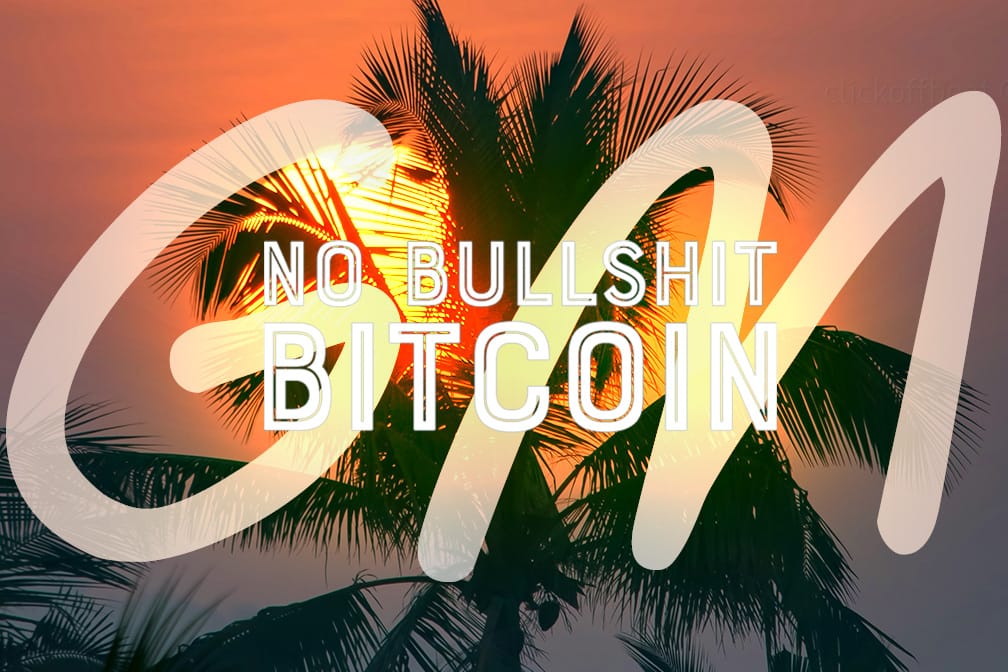
Good morning (good night?)! The No Bullshit Bitcoin news feed is now available on Moody's Dashboard! A huge shoutout to sir Clark Moody for integrating our feed.
Headlines
- Spiral welcomes Ben Carman. The developer will work on the LDK server and a new SDK designed to simplify the onboarding process for new self-custodial Bitcoin users.
- The Bitcoin Dev Kit Foundation announced new corporate members for 2025, including AnchorWatch, CleanSpark, and Proton Foundation. The annual dues from these corporate members fund the small team of open-source developers responsible for maintaining the core BDK libraries and related free and open-source software (FOSS) projects.
- Strategy increases Bitcoin holdings to 538,200 BTC. In the latest purchase, the company has spent more than $555M to buy 6,556 coins through proceeds of two at-the-market stock offering programs.
- Spar supermarket experiments with Bitcoin payments in Zug, Switzerland. The store has introduced a new payment method powered by the Lightning Network. The implementation was facilitated by DFX Swiss, a service that supports seamless conversions between bitcoin and legacy currencies.
- The Bank for International Settlements (BIS) wants to contain 'crypto' risks. A report titled "Cryptocurrencies and Decentralised Finance: Functions and Financial Stability Implications" calls for expanding research into "how new forms of central bank money, capital controls, and taxation policies can counter the risks of widespread crypto adoption while still fostering technological innovation."
- "Global Implications of Scam Centres, Underground Banking, and Illicit Online Marketplaces in Southeast Asia." According to the United Nations Office on Drugs and Crime (UNODC) report, criminal organizations from East and Southeast Asia are swiftly extending their global reach. These groups are moving beyond traditional scams and trafficking, creating sophisticated online networks that include unlicensed cryptocurrency exchanges, encrypted communication platforms, and stablecoins, fueling a massive fraud economy on an industrial scale.
- Slovenia is considering a 25% capital gains tax on Bitcoin profits for individuals. The Ministry of Finance has proposed legislation to impose this tax on gains from cryptocurrency transactions, though exchanging one cryptocurrency for another would remain exempt. At present, individual 'crypto' traders in Slovenia are not taxed.
- Circle, BitGo, Coinbase, and Paxos plan to apply for U.S. bank charters or licenses. According to a report in The Wall Street Journal, major crypto companies are planning to apply for U.S. bank charters or licenses. These firms are pursuing limited licenses that would permit them to issue stablecoins, as the U.S. Congress deliberates on legislation mandating licensing for stablecoin issuers.
"Established banks, like Bank of America, are hoping to amend the current drafts of [stablecoin] legislation in such a way that nonbanks are more heavily restricted from issuing stablecoins," people familiar with the matter told The Block.
- Charles Schwab to launch spot Bitcoin trading by 2026. The financial investment firm, managing over $10 trillion in assets, has revealed plans to introduce spot Bitcoin trading for its clients within the next year.
Use the tools
- Bitcoin Safe v1.2.3 expands QR SignMessage compatibility for all QR-UR-compatible hardware signers (SpecterDIY, KeyStone, Passport, Jade; already supported COLDCARD Q). It also adds the ability to import wallets via QR, ensuring compatibility with Keystone's latest firmware (2.0.6), alongside other improvements.
- Minibits v0.2.2-beta, an ecash wallet for Android devices, packages many changes to align the project with the planned iOS app release. New features and improvements include the ability to lock ecash to a receiver's pubkey, faster confirmations of ecash minting and payments thanks to WebSockets, UI-related fixes, and more.
- Zeus v0.11.0-alpha1 introduces Cashu wallets tied to embedded LND wallets. Navigate to Settings > Ecash to enable it. Other wallet types can still sweep funds from Cashu tokens. Zeus Pay now supports Cashu address types in Zaplocker, Cashu, and NWC modes.
- LNDg v1.10.0, an advanced web interface designed for analyzing Lightning Network Daemon (LND) data and automating node management tasks, introduces performance improvements, adds a new metrics page for unprofitable and stuck channels, and displays warnings for batch openings. The Profit and Loss Chart has been updated to include on-chain costs. Advanced settings have been added for users who would like their channel database size to be read remotely (the default remains local). Additionally, the AutoFees tool now uses aggregated pubkey metrics for multiple channels with the same peer.
- Nunchuk Desktop v1.9.45 release brings the latest bug fixes and improvements.
- Blockstream Green iOS v4.1.8 has renamed L-BTC to LBTC, and improves translations of notifications, login time, and background payments.
- Blockstream Green Android v4.1.8 has added language preference in App Settings and enables an Android data backup option for disaster recovery. Additionally, it fixes issues with Jade entry point PIN timeout and Trezor passphrase input.
- Torq v2.2.2, an advanced Lightning node management software designed to handle large nodes with over 1000 channels, fixes bugs that caused channel balance to not be updated in some cases and channel "peer total local balance" not getting updated.
- Stack Wallet v2.1.12, a multicoin wallet by Cypher Stack, fixes an issue with Xelis introduced in the latest release for Windows.
- ESP-Miner-NerdQAxePlus v1.0.29.1, a forked version from the NerdAxe miner that was modified for use on the NerdQAxe+, is now available.
- Zark enables sending sats to an npub using Bark.

- Erk is a novel variation of the Ark protocol that completely removes the need for user interactivity in rounds, addressing one of Ark's key limitations: the requirement for users to come online before their VTXOs expire.
- Aegis v0.1.1 is now available. It is a Nostr event signer app for iOS devices.
- Nostash is a NIP-07 Nostr signing extension for Safari. It is a fork of Nostore and is maintained by Terry Yiu. Available on iOS TestFlight.
- Amber v3.2.8, a Nostr event signer for Android, delivers the latest fixes and improvements.
- Nostur v1.20.0, a Nostr client for iOS, adds
-
 @ dfa02707:41ca50e3
2025-06-02 15:02:28
@ dfa02707:41ca50e3
2025-06-02 15:02:28Contribute to keep No Bullshit Bitcoin news going.
- The latest firmware updates for COLDCARD devices introduce two major features: COLDCARD Co-sign (CCC) and Key Teleport between two COLDCARD Q devices using QR codes and/or NFC with a website.

What's new
- COLDCARD Co-Sign: When CCC is enabled, a second seed called the Spending Policy Key (Key C) is added to the device. This seed works with the device's Main Seed and one or more additional XPUBs (Backup Keys) to form 2-of-N multisig wallets.
- The spending policy functions like a hardware security module (HSM), enforcing rules such as magnitude and velocity limits, address whitelisting, and 2FA authentication to protect funds while maintaining flexibility and control, and is enforced each time the Spending Policy Key is used for signing.
- When spending conditions are met, the COLDCARD signs the partially signed bitcoin transaction (PSBT) with the Main Seed and Spending Policy Key for fund access. Once configured, the Spending Policy Key is required to view or change the policy, and violations are denied without explanation.
"You can override the spending policy at any time by signing with either a Backup Key and the Main Seed or two Backup Keys, depending on the number of keys (N) in the multisig."
-
A step-by-step guide for setting up CCC is available here.
-
Key Teleport for Q devices allows users to securely transfer sensitive data such as seed phrases (words, xprv), secure notes and passwords, and PSBTs for multisig. It uses QR codes or NFC, along with a helper website, to ensure reliable transmission, keeping your sensitive data protected throughout the process.
- For more technical details, see the protocol spec.
"After you sign a multisig PSBT, you have option to “Key Teleport” the PSBT file to any one of the other signers in the wallet. We already have a shared pubkey with them, so the process is simple and does not require any action on their part in advance. Plus, starting in this firmware release, COLDCARD can finalize multisig transactions, so the last signer can publish the signed transaction via PushTX (NFC tap) to get it on the blockchain directly."
- Multisig transactions are finalized when sufficiently signed. It streamlines the use of PushTX with multisig wallets.
- Signing artifacts re-export to various media. Users are now provided with the capability to export signing products, like transactions or PSBTs, to alternative media rather than the original source. For example, if a PSBT is received through a QR code, it can be signed and saved onto an SD card if needed.
- Multisig export files are signed now. Public keys are encoded as P2PKH address for all multisg signature exports. Learn more about it here.
- NFC export usability upgrade: NFC keeps exporting until CANCEL/X is pressed.
- Added Bitcoin Safe option to Export Wallet.
- 10% performance improvement in USB upload speed for large files.
- Q: Always choose the biggest possible display size for QR.
Fixes
- Do not allow change Main PIN to same value already used as Trick PIN, even if Trick PIN is hidden.
- Fix stuck progress bar under
Receiving...after a USB communications failure. - Showing derivation path in Address Explorer for root key (m) showed double slash (//).
- Can restore developer backup with custom password other than 12 words format.
- Virtual Disk auto mode ignores already signed PSBTs (with “-signed” in file name).
- Virtual Disk auto mode stuck on “Reading…” screen sometimes.
- Finalization of foreign inputs from partial signatures. Thanks Christian Uebber!
- Temporary seed from COLDCARD backup failed to load stored multisig wallets.
Destroy Seedalso removes all Trick PINs from SE2.Lock Down Seedrequires pressing confirm key (4) to execute.- Q only: Only BBQr is allowed to export Coldcard, Core, and pretty descriptor.

-
 @ dfa02707:41ca50e3
2025-06-02 17:02:16
@ dfa02707:41ca50e3
2025-06-02 17:02:16Headlines
- Twenty One Capital is set to launch with over 42,000 BTC in its treasury. This new Bitcoin-native firm, backed by Tether and SoftBank, is planned to go public via a SPAC merger with Cantor Equity Partners and will be led by Jack Mallers, co-founder and CEO of Strike. According to a report by the Financial Times, the company aims to replicate the model of Michael Saylor with his company, MicroStrategy.
- Florida's SB 868 proposes a backdoor into encrypted platforms. The bill and its House companion have both passed through their respective committees and are headed to a full vote. If enacted, SB 868 would require social media companies to decrypt teens' private messages, ban disappearing messages, allow unrestricted parental access to private messages, and likely eliminate encryption for all minors altogether.
- Paul Atkins has officially assumed the role of the 34th Chairman of the US Securities and Exchange Commission (SEC). This is a return to the agency for Atkins, who previously served as an SEC Commissioner from 2002 to 2008 under the George W. Bush administration. He has committed to advancing the SEC’s mission of fostering capital formation, safeguarding investors, and ensuring fair and efficient markets.
- Solosatoshi.com has sold over 10,000 open-source miners, adding more than 10 PH of hashpower to the Bitcoin network.
"Thank you, Bitaxe community. OSMU developers, your brilliance built this. Supporters, your belief drives us. Customers, your trust powers 10,000+ miners and 10PH globally. Together, we’re decentralizing Bitcoin’s future. Last but certainly not least, thank you@skot9000 for not only creating a freedom tool, but instilling the idea into thousands of people, that Bitcoin mining can be for everyone again," said the firm on X.
- OCEAN's DATUM has found 100 blocks. "Over 65% of OCEAN’s miners are using DATUM, and that number is growing every day. This means block template construction is making its way back into the hands of the miners, which is not only the most profitable for miners on OCEAN but also one of the best things for Bitcoin," stated the mining pool.

Source: orangesurf
- Arch Labs has secured $13 million to develop "ArchVM" and integrate smart-contract functionality with Bitcoin. The funding round, valuing the company at $200 million, was led by Pantera Capital, as announced on Tuesday.
- Tesla still holds nearly $1 billion in bitcoin. According to the automaker's latest earnings report, the firm reported digital asset holdings worth $951 million as of March 31.
- The European Central Bank is pushing for amendments to the European Union's Markets in Crypto Assets legislation (MiCA), just months after its implementation. According to Politico's report on Tuesday, the ECB is concerned that U.S. support for cryptocurrency, particularly stablecoins, could cause economic harm to the 27-nation bloc.
- TABConf 2025 is scheduled to take place from October 13-16, 2025. This prominent technical Bitcoin conference is dedicated to community building, education, and developer support, and it is set to return in October. Get your tickets here.
- Kaduna Lightning Development Bootcamp. From May 14th to 17th, the Bitcoin Lightning Developer Bootcamp will take place in Kaduna, Nigeria. Thisevent offers four dynamic days of coding, learning, and networking. Organized by Africa Free Routing and supported by Btrust, Tether, and African Bitcoiners, this bootcamp is designed as a gateway for African developers eager to advance their skills in Bitcoin and Lightning development. Apply here.

Source: African Bitcoiners.
Use the tools
- Core Lightning (CLN) v25.02.2 as been released to fix a broken Docker image. The issue was caused by an SQLite version that did not support an advanced query.
- Blitz wallet v0.4.4-beta introduces several updates and improvements, including the prevention of duplicate ecash payments, fixes for background ecash invoice handling, the ability for users to send payments to BOLT12 invoices from their Liquid balance, support for Blink QR codes, a lowered minimum amount for Lightning-to-Liquid payments to 100 sats, the option to initiate a node sync via a swipe gesture on the wallet's home screen, and the introduction of opt-in or opt-out functionality for newly implemented crash analytics via settings.
- Utreexo v0.5.0, a hash-based dynamic accumulator, is now available.
- Specter v2.1.1 is now available on StartOS. "This update brings compatibility with Bitcoin Core v28 and incorporates several upstream improvements," said developer Alex71btc.
- ESP-Miner (AxeOS) v2.7.0b1 is now available for testing.
- NodeGuard v0.16.1, a treasury management solution for Lightning nodes, has been released.
- The latest stacker.news updates include prompts to add a receiving wallet when posting or making comments (for new users), an option to randomize poll choices, improved URL search, and a few other enhancements. A bug fix for territories created after 9/19/24 has been implemented to reward 70% of their revenue to owners instead of 50%.
Other stuff
- The April edition of the 256 Foundation's newsletter is now available. It includes the latest mining news, Bitcoin network health updates, project developments, and a tutorial on how to update FutureBit's Apollo 1 to the Apollo 2 software.
- Siggy47 has posted a comprehensive RoboSats guide on stacker.news.
- Learn how to run your own Nostr relay using Citrine and Cloudflare Tunnels by following this step-by-step guide by Dhalism.
- Max Guise has written a Bitkey roadmap update for April 2025.
-
PlebLab has uploaded a video on how to build a Rust wallet with LDK Node by Ben Carman.
-
Do you want more? Subscribe and get No Bullshit GM report straight to your mailbox and No Bullshit Bitcoin on Nostr.
- Feedback or tips? Drop it here.
- #FREESAMOURAI
Sign up for No Bullshit Bitcoin
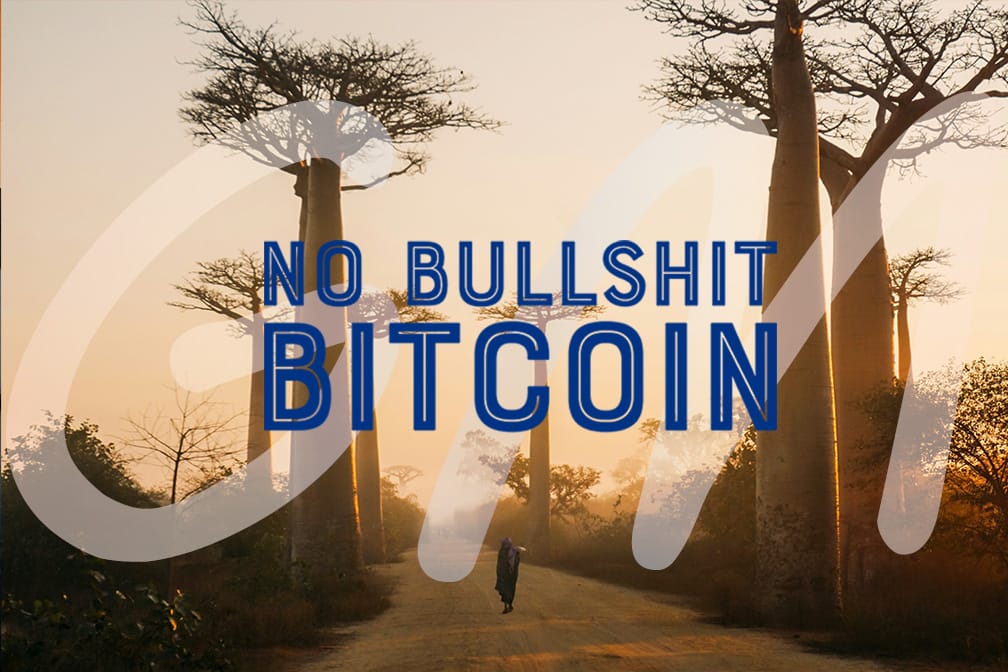
No Bullshit Bitcoin Is a Bitcoin News Desk Without Ads, Paywalls, or Clickbait.
Subscribe .nc-loop-dots-4-24-icon-o{--animation-duration:0.8s} .nc-loop-dots-4-24-icon-o *{opacity:.4;transform:scale(.75);animation:nc-loop-dots-4-anim var(--animation-duration) infinite} .nc-loop-dots-4-24-icon-o :nth-child(1){transform-origin:4px 12px;animation-delay:-.3s;animation-delay:calc(var(--animation-duration)/-2.666)} .nc-loop-dots-4-24-icon-o :nth-child(2){transform-origin:12px 12px;animation-delay:-.15s;animation-delay:calc(var(--animation-duration)/-5.333)} .nc-loop-dots-4-24-icon-o :nth-child(3){transform-origin:20px 12px} @keyframes nc-loop-dots-4-anim{0%,100%{opacity:.4;transform:scale(.75)}50%{opacity:1;transform:scale(1)}}
Email sent! Check your inbox to complete your signup.
No spam. Unsubscribe anytime.
-
 @ dfa02707:41ca50e3
2025-06-02 15:02:26
@ dfa02707:41ca50e3
2025-06-02 15:02:26Contribute to keep No Bullshit Bitcoin news going.
- RoboSats v0.7.7-alpha is now available!
NOTE: "This version of clients is not compatible with older versions of coordinators. Coordinators must upgrade first, make sure you don't upgrade your client while this is marked as pre-release."
- This version brings a new and improved coordinators view with reviews signed both by the robot and the coordinator, adds market price sources in coordinator profiles, shows a correct warning for canceling non-taken orders after a payment attempt, adds Uzbek sum currency, and includes package library updates for coordinators.

Source: RoboSats.
- siggy47 is writing daily RoboSats activity reviews on stacker.news. Check them out here.
- Stay up-to-date with RoboSats on Nostr.
What's new
- New coordinators view (see the picture above).
- Available coordinator reviews signed by both the robot and the coordinator.
- Coordinators now display market price sources in their profiles.

Source: RoboSats.
- Fix for wrong message on cancel button when taking an order. Users are now warned if they try to cancel a non taken order after a payment attempt.
- Uzbek sum currency now available.
- For coordinators: library updates.
- Add docker frontend (#1861).
- Add order review token (#1869).
- Add UZS migration (#1875).
- Fixed tests review (#1878).
- Nostr pubkey for Robot (#1887).
New contributors
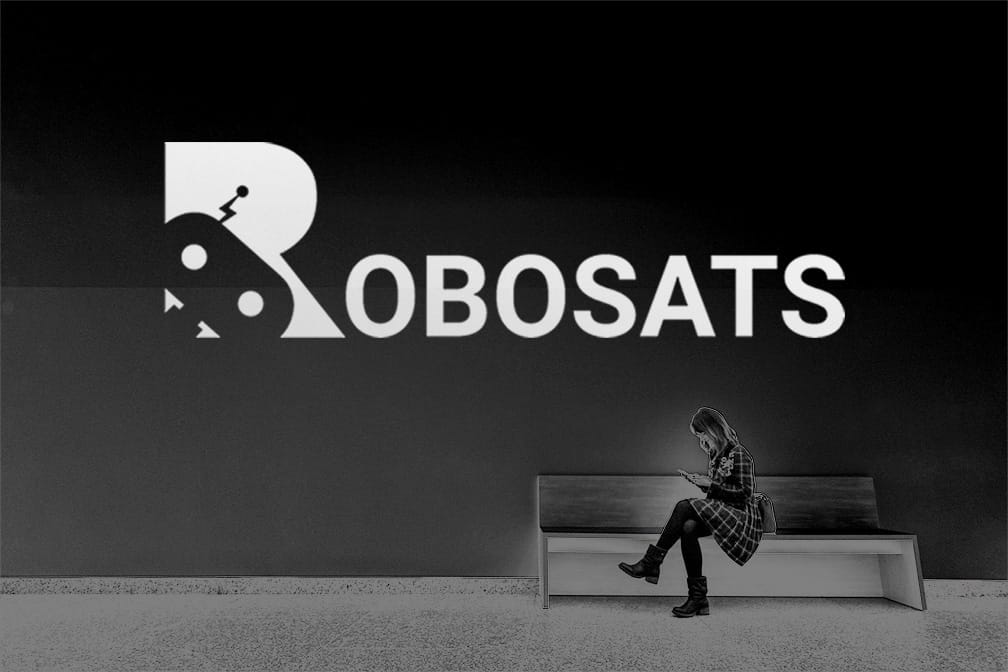
Full Changelog: v0.7.6-alpha...v0.7.7-alpha
-
 @ 7f6db517:a4931eda
2025-06-02 17:02:19
@ 7f6db517:a4931eda
2025-06-02 17:02:19
I often hear "bitcoin doesn't interest me, I'm not a finance person."
Ironically, the beauty of sound money is you don't have to be. In the current system you're expected to manage a diversified investment portfolio or pay someone to do it. Bitcoin will make that optional.
— ODELL (@ODELL) September 16, 2018
At first glance bitcoin often appears overwhelming to newcomers. It is incredibly easy to get bogged down in the details of how it works or different ways to use it. Enthusiasts, such as myself, often enjoy going down the deep rabbit hole of the potential of bitcoin, possible pitfalls and theoretical scenarios, power user techniques, and the developer ecosystem. If your first touch point with bitcoin is that type of content then it is only natural to be overwhelmed. While it is important that we have a thriving community of bitcoiners dedicated to these complicated tasks - the true beauty of bitcoin lies in its simplicity. Bitcoin is simply better money. It is the best money we have ever had.
Life is complicated. Life is hard. Life is full of responsibility and surprises. Bitcoin allows us to focus on our lives while relying on a money that is simple. A money that is not controlled by any individual, company, or government. A money that cannot be easily seized or blocked. A money that cannot be devalued at will by a handful of corrupt bureaucrat who live hundreds of miles from us. A money that can be easily saved and should increase in purchasing power over time without having to learn how to "build a diversified stock portfolio" or hire someone to do it for us.
Bitcoin enables all of us to focus on our lives - our friends and family - doing what we love with the short time we have on this earth. Time is scarce. Life is complicated. Bitcoin is the most simple aspect of our complicated lives. If we spend our scarce time working then we should be able to easily save that accrued value for future generations without watching the news or understanding complicated financial markets. Bitcoin makes this possible for anyone.
Yesterday was Mother's Day. Raising a human is complicated. It is hard, it requires immense personal responsibility, it requires critical thinking, but mothers figure it out, because it is worth it. Using and saving bitcoin is simple - simply install an app on your phone. Every mother can do it. Every person can do it.
Life is complicated. Life is beautiful. Bitcoin is simple.
If you found this post helpful support my work with bitcoin.

-
 @ dfa02707:41ca50e3
2025-06-02 17:02:15
@ dfa02707:41ca50e3
2025-06-02 17:02:15Contribute to keep No Bullshit Bitcoin news going.
News
- Spiral welcomes Ben Carman. The developer will work on the LDK server and a new SDK designed to simplify the onboarding process for new self-custodial Bitcoin users.
- Spiral renews support for Dan Gould and Joschisan. The organization has renewed support for Dan Gould, who is developing the Payjoin Dev Kit (PDK), and Joschisan, a Fedimint developer focused on simplifying federations.
- The Bitcoin Dev Kit Foundation announced new corporate members for 2025, including AnchorWatch, CleanSpark, and Proton Foundation. The annual dues from these corporate members fund the small team of open-source developers responsible for maintaining the core BDK libraries and related free and open-source software (FOSS) projects.
- The European Central Bank is pushing for amendments to the European Union's Markets in Crypto Assets legislation (MiCA), just months after its implementation. According to Politico's report on Tuesday, the ECB is concerned that U.S. support for cryptocurrency, particularly stablecoins, could cause economic harm to the 27-nation bloc.
- Slovenia is considering a 25% capital gains tax on Bitcoin profits for individuals. The Ministry of Finance has proposed legislation to impose this tax on gains from cryptocurrency transactions, though exchanging one cryptocurrency for another would remain exempt. At present, individual 'crypto' traders in Slovenia are not taxed.
- The Virtual Asset Service Providers (VASP) Bill 2025 introduced in Kenya. The new legislation aims to establish a comprehensive legal framework for licensing, regulating, and supervising virtual asset service providers (VASPs), with strict penalties for non-compliant entities.
- Circle, BitGo, Coinbase, and Paxos plan to apply for U.S. bank charters or licenses. According to a report in The Wall Street Journal, major crypto companies are planning to apply for U.S. bank charters or licenses. These firms are pursuing limited licenses that would permit them to issue stablecoins, as the U.S. Congress deliberates on legislation mandating licensing for stablecoin issuers.
"Established banks, like Bank of America, are hoping to amend the current drafts of [stablecoin] legislation in such a way that nonbanks are more heavily restricted from issuing stablecoins," people familiar with the matter told The Block.
- Paul Atkins has officially assumed the role of the 34th Chairman of the US Securities and Exchange Commission (SEC). This is a return to the agency for Atkins, who previously served as an SEC Commissioner from 2002 to 2008 under the George W. Bush administration. He has committed to advancing the SEC’s mission of fostering capital formation, safeguarding investors, and ensuring fair and efficient markets.
- Federal Reserve retracts guidance discouraging banks from engaging in 'crypto.' The U.S. Federal Reserve withdrew guidance that discouraged banks from crypto and stablecoin activities, as announced by its Board of Governors on Thursday. This includes rescinding a 2022 supervisory letter requiring prior notification of crypto activities and 2023 stablecoin requirements.
"As a result, the Board will no longer expect banks to provide notification and will instead monitor banks' crypto-asset activities through the normal supervisory process," reads the FED statement.
- Russian government to launch a cryptocurrency exchange. The country's Ministry of Finance and Central Bank announced plans to establish a trading platform for "highly qualified investors" that "will legalize crypto assets and bring crypto operations out of the shadows."
- Twenty One Capital is set to launch with over 42,000 BTC in its treasury. This new Bitcoin-native firm, backed by Tether and SoftBank, is planned to go public via a SPAC merger with Cantor Equity Partners and will be led by Jack Mallers, co-founder and CEO of Strike. According to a report by the Financial Times, the company aims to replicate the model of Michael Saylor with his company, MicroStrategy.
- Strategy increases Bitcoin holdings to 538,200 BTC. In the latest purchase, the company has spent more than $555M to buy 6,556 coins through proceeds of two at-the-market stock offering programs.
- Metaplanet buys another 145 BTC. The Tokyo-listed company has purchased an additional 145 BTC for $13.6 million. Their total bitcoin holdings now stand at 5,000 coins, worth around $428.1 million.
- Semler Scientific has increased its bitcoin holdings to 3,303 BTC. The company acquired an additional 111 BTC at an average price of $90,124. The purchase was funded through proceeds from an at-the-market offering and cash reserves, as stated in a press release.
- Tesla still holds nearly $1 billion in bitcoin. According to the automaker's latest earnings report, the firm reported digital asset holdings worth $951 million as of March 31.
- Spar supermarket experiments with Bitcoin payments in Zug, Switzerland. The store has introduced a new payment method powered by the Lightning Network. The implementation was facilitated by DFX Swiss, a service that supports seamless conversions between bitcoin and legacy currencies.
- Charles Schwab to launch spot Bitcoin trading by 2026. The financial investment firm, managing over $10 trillion in assets, has revealed plans to introduce spot Bitcoin trading for its clients within the next year.
- Arch Labs has secured $13 million to develop "ArchVM" and integrate smart-contract functionality with Bitcoin. The funding round, valuing the company at $200 million, was led by Pantera Capital, as announced on Tuesday.
- Citrea deployed its Clementine Bridge on the Bitcoin testnet. The bridge utilizes the BitVM2 programming language to inherit validity from Bitcoin, allegedly providing "the safest and most trust-minimized way to use BTC in decentralized finance."
- UAE-based Islamic bank ruya launches Shari’ah-compliant bitcoin investing. The bank has become the world’s first Islamic bank to provide direct access to virtual asset investments, including Bitcoin, via its mobile app, per Bitcoin Magazine.
- Solosatoshi.com has sold over 10,000 open-source miners, adding more than 10 PH of hashpower to the Bitcoin network.
"Thank you, Bitaxe community. OSMU developers, your brilliance built this. Supporters, your belief drives us. Customers, your trust powers 10,000+ miners and 10PH globally. Together, we’re decentralizing Bitcoin’s future. Last but certainly not least, thank you@skot9000 for not only creating a freedom tool, but instilling the idea into thousands of people, that Bitcoin mining can be for everyone again," said the firm on X.
- OCEAN's DATUM has found 100 blocks. "Over 65% of OCEAN’s miners are using DATUM, and that number is growing every day. This means block template construction is making its way back into the hands of the miners, which is not only the most profitable
-
 @ 9ca447d2:fbf5a36d
2025-06-02 16:01:27
@ 9ca447d2:fbf5a36d
2025-06-02 16:01:27George Town, Grand Cayman — Ledn, one of the longest-standing digital asset lenders, today announced a sweeping update to its platform to discontinue any lending of client assets to generate interest, meaning that client assets will never be exposed to third party lending credit risk.
Going forward, Ledn will only offer its Custodied Bitcoin loan structure, under which client bitcoin collateral will remain fully in custody either with Ledn or its trusted funding partners.
As part of this strategic shift, Ledn will also remove support for ETH, doubling down on Bitcoin as its sole digital asset focus. These changes were unveiled by the company at Bitcoin 2025 in Las Vegas.
“With our new hyper-focus on Bitcoin-only lending, we’re going back to our roots and principles that inspired Bitcoin to begin with,” said Adam Reeds, Co-Founder and CEO of Ledn.
“Bitcoin was created as a direct response to the risks of fractional reserve banking and unchecked use of client assets to generate interest. Traditional finance relies on constantly reusing client assets to create leverage and, ultimately, inflation.
“Bitcoiners instinctively reject that model. That’s why we’ve moved away from this approach entirely. With our Custodied loan structure, client assets stay where they belong and are held in a transparent manner.”
While Ledn is taking these steps to further de-risk its product and further enhance client security, many of the new lending products in the market are exposing consumers to risky and opaque structures once again.
“These are the exact dynamics that led to the meltdown of the lending sector in 2022,” Reeds added.
“As more new entrants push half-baked lending models back into the market, we’re choosing the opposite path— Eliminating lending risk entirely for our users and making it 100% clear how their assets are dealt with.
“That clarity is what has helped us originate over $9.5 billion in loans and become the #1 retail CeFi lender in the Bitcoin space. We believe this approach should become the new standard for any serious digital asset lender.”
This shift reinforces Ledn’s broader strategy: Going all in on Bitcoin, simplifying its product stack, and sharpening its focus around the most secure and proven digital asset.
Ledn was the first crypto lender to introduce proof-of-reserves attestations in 2020, offering clients third-party verification that assets were fully accounted for down to the satoshi.
That transparency-first approach allowed the company to navigate market volatility as peers collapsed under opaque and hidden risks.
Now, as global regulators begin signaling openness to supervised participation rather than blanket restrictions, the opportunity — and the responsibility — for digital asset platforms is clear: Build resilient systems and proactively mitigate risk.
Ledn will exclusively offer custodied bitcoin-backed loans as of July 1, 2025. Support for ETH will be retired in the same release, reflecting Ledn’s strategic shift to a Bitcoin-only platform.
For more information on this transition, visit blog.ledn.io
For media inquiries, interviews, or early access to supporting materials, contact ledn@clpr.agency
About Ledn
Ledn offers growth accounts and loans to clients in over 120 countries, with an expanding range of services and supported regions. The company is dedicated to building world-class financial services, with a focus on helping people build long-term wealth through digital asset-based products.
For more information about Ledn and its services, visit the company’s website at www.ledn.io
-
 @ dfa02707:41ca50e3
2025-06-02 17:02:15
@ dfa02707:41ca50e3
2025-06-02 17:02:15Headlines
- Spiral renews support for Dan Gould and Joschisan. The organization has renewed support for Dan Gould, who is developing the Payjoin Dev Kit (PDK), and Joschisan, a Fedimint developer focused on simplifying federations.
- Metaplanet buys another 145 BTC. The Tokyo-listed company has purchased an additional 145 BTC for $13.6 million. Their total bitcoin holdings now stand at 5,000 coins, worth around $428.1 million.
- Semler Scientific has increased its bitcoin holdings to 3,303 BTC. The company acquired an additional 111 BTC at an average price of $90,124. The purchase was funded through proceeds from an at-the-market offering and cash reserves, as stated in a press release.
- The Virtual Asset Service Providers (VASP) Bill 2025 introduced in Kenya. The new legislation aims to establish a comprehensive legal framework for licensing, regulating, and supervising virtual asset service providers (VASPs), with strict penalties for non-compliant entities.
- Russian government to launch a cryptocurrency exchange. The country's Ministry of Finance and Central Bank announced plans to establish a trading platform for "highly qualified investors" that "will legalize crypto assets and bring crypto operations out of the shadows."
- All virtual asset service providers expect to be fully compliant with the Travel Rule by the end of 2025. A survey by financial surveillance specialist Notabene reveals that 90% of virtual asset service providers (VASPs) expect full Travel Rule compliance by mid-2025, with all aiming for compliance by year-end. The survey also shows a significant rise in VASPs blocking withdrawals until beneficiary information is confirmed, increasing from 2.9% in 2024 to 15.4% now. Additionally, about 20% of VASPs return deposits if originator data is missing.
- UN claims Bitcoin mining is a "powerful tool" for money laundering. The Rage's analysis suggests that the recent United Nations Office on Drugs and Crime report on crime in South-East Asia makes little sense and hints at the potential introduction of Anti-Money Laundering (AML) measures at the mining level.
- Riot Platforms has obtained a $100 million credit facility from Coinbase Credit, using bitcoin as collateral for short-term funding to support its expansion. The firm's CEO, Jason Les, stated that this facility is crucial for diversifying financing sources and driving long-term stockholder value through strategic growth initiatives.
- Bitdeer raises $179M in loans and equity amid Bitcoin chip push. The Miner Mag reports that Bitdeer entered into a loan agreement with its affiliate Matrixport for up to $200 million in April, as disclosed in its annual report filed on Monday.
- Federal Reserve retracts guidance discouraging banks from engaging in 'crypto.' The U.S. Federal Reserve withdrew guidance that discouraged banks from crypto and stablecoin activities, as announced by its Board of Governors on Thursday. This includes rescinding a 2022 supervisory letter requiring prior notification of crypto activities and 2023 stablecoin requirements.
"As a result, the Board will no longer expect banks to provide notification and will instead monitor banks' crypto-asset activities through the normal supervisory process," reads the FED statement.
- UAE-based Islamic bank ruya launches Shari’ah-compliant bitcoin investing. The bank has become the world’s first Islamic bank to provide direct access to virtual asset investments, including Bitcoin, via its mobile app, per Bitcoin Magazine.
- U.S. 'crypto' scam losses amounted to $9.3B in 2024. The US The Federal Bureau of Investigation (FBI) has reported $9.3 billion losses in cryptocurrency-related scams in 2024, noting a troubling trend of scams targeting older Americans, which accounted for over $2.8 billion of those losses.

Source: FBI.
- North Korean hackers establish fake companies to target 'crypto' developers. Silent Push researchers reported that hackers linked to the Lazarus Group created three shell companies, two of which are based in the U.S., with the objective of spreading malware through deceptive job interview scams aimed at individuals seeking jobs in cryptocurrency companies.
- Citrea deployed its Clementine Bridge on the Bitcoin testnet. The bridge utilizes the BitVM2 programming language to inherit validity from Bitcoin, allegedly providing "the safest and most trust-minimized way to use BTC in decentralized finance."
- Hesperides University offers a Master’s degree in Bitcoin. Bitcoin Magazine reports the launch of the first-ever Spanish-language Master’s program dedicated exclusively to Bitcoin. Starting April 28, 2025, this fully online program will equip professionals with technical, economic, legal, and philosophical skills to excel in the Bitcoin era.
- BTC in D.C. event is set to take place on September 30 - October 1 in Washington, D.C. Learn more about this initiative here.
Use the tools
- Bitcoin Keeper just got a new look. Version 2.2.0 of the mobile multisig app brought a new branding design, along with a Keeper Private tier, testnet support, ability to import and export BIP-329 labels, and the option to use a Server Key with multiple users.
- Earlier this month the project also announced Keeper Learn service, offering clear and guided Bitcoin learning sessions for both groups and individuals.
- Keeper Desktop v0.2.2, a companion desktop app for Bitcoin Keeper mobile app, received a renewed branding update, too.

The evolution of Bitcoin Keeper logo. Source: BitHyve blog.
- Blockstream Green Desktop v2.0.25 updates GDK to v0.75.1 and fixes amount parsing issues when switching from fiat denomination to Liquid asset.
- Lightning Loop v0.31.0-beta enhances the
loop listswapscommand by improving the ability to filter the response. - Lightning-kmp v1.10.0, an implementation of the Lightning Network in Kotlin, is now available.
- LND v0.19.0-beta.rc3, the latest beta release candidate of LND is now ready for testing.
- ZEUS v0.11.0-alpha2 is now available for testing, too. It's nuts.
- JoinMarket Fidelity Bond Simulator helps potential JoinMarket makers evaluate their competitive position in the market based on fidelity bonds.
- UTXOscope is a text-only Bitcoin blockchain analysis tool that visualizes price dynamics using only on-chain data. The
-
 @ dfa02707:41ca50e3
2025-06-02 17:02:14
@ dfa02707:41ca50e3
2025-06-02 17:02:14Contribute to keep No Bullshit Bitcoin news going.
-
Version 1.3 of Bitcoin Safe introduces a redesigned interactive chart, quick receive feature, updated icons, a mempool preview window, support for Child Pays For Parent (CPFP) and testnet4, preconfigured testnet demo wallets, as well as various bug fixes and improvements.
-
Upcoming updates for Bitcoin Safe include Compact Block Filters.
"Compact Block Filters increase the network privacy dramatically, since you're not asking an electrum server to give you your transactions. They are a little slower than electrum servers. For a savings wallet like Bitcoin Safe this should be OK," writes the project's developer Andreas Griffin.
- Learn more about the current and upcoming features of Bitcoin Safe wallet here.
What's new in v1.3
- Redesign of Chart, Quick Receive, Icons, and Mempool Preview (by @design-rrr).
- Interactive chart. Clicking on it now jumps to transaction, and selected transactions are now highlighted.
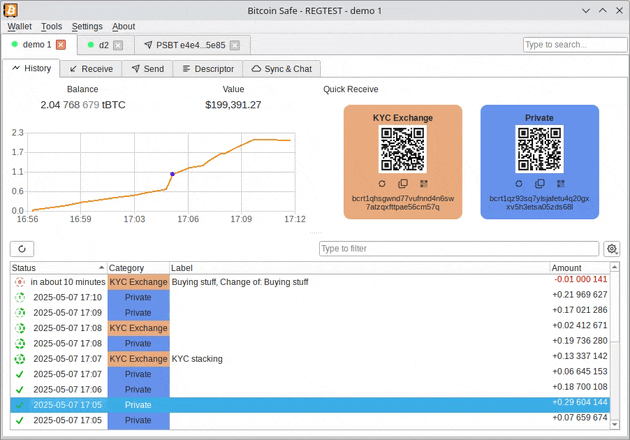
- Speed up transactions with Child Pays For Parent (CPFP).
- BDK 1.2 (upgraded from 0.32).
- Testnet4 support.
- Preconfigured Testnet demo wallets.
- Cluster unconfirmed transactions so that parents/children are next to each other.
- Customizable columns for all tables (optional view: Txid, Address index, and more)
- Bug fixes and other improvements.
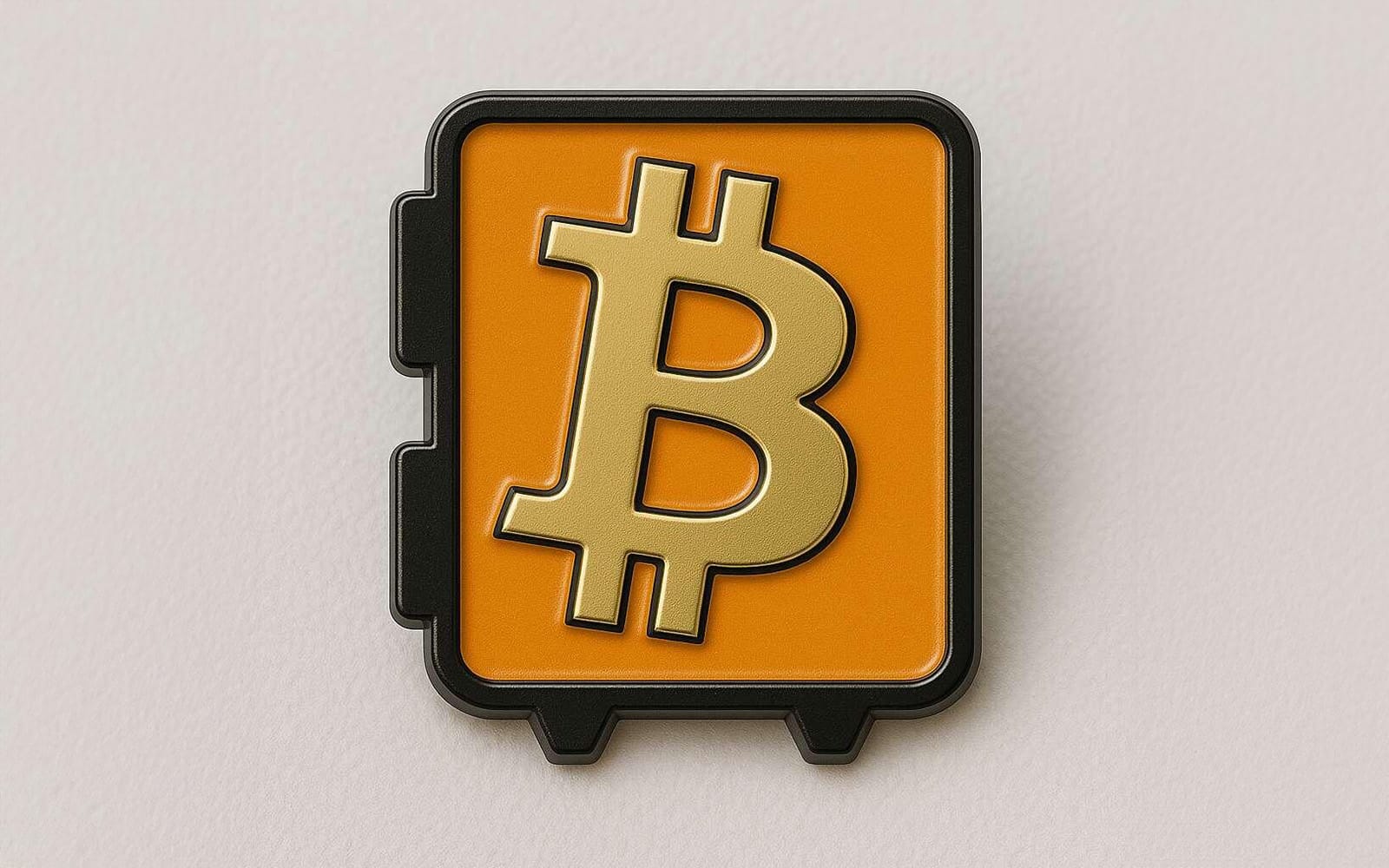
Announcement / Archive
Blog Post / Archive
GitHub Repo
Website -
-
 @ dfa02707:41ca50e3
2025-06-02 15:02:24
@ dfa02707:41ca50e3
2025-06-02 15:02:24Contribute to keep No Bullshit Bitcoin news going.

This update brings key enhancements for clarity and usability:
- Recent Blocks View: Added to the Send tab and inspired by Mempool's visualization, it displays the last 2 blocks and the estimated next block to help choose fee rates.
- Camera System Overhaul: Features a new library for higher resolution detection and mouse-scroll zoom support when available.
- Vector-Based Images: All app images are now vectorized and theme-aware, enhancing contrast, especially in dark mode.
- Tor & P2A Updates: Upgraded internal Tor and improved support for pay-to-anchor (P2A) outputs.
- Linux Package Rename: For Linux users, Sparrow has been renamed to sparrowwallet (or sparrowserver); in some cases, the original sparrow package may need manual removal.
- Additional updates include showing total payments in multi-payment transaction diagrams, better handling of long labels, and other UI enhancements.
- Sparrow v2.2.1 is a bug fix release that addresses missing UUID issue when starting Tor on recent macOS versions, icons for external sources in Settings and Recent Blocks view, repackaged
.debinstalls to use older gzip instead of zstd compression, and removed display of median fee rate where fee rates source is set to Server.
Learn how to get started with Sparrow wallet:
Release notes (v2.2.0)
- Added Recent Blocks view to Send tab.
- Converted all bitmapped images to theme aware SVG format for all wallet models and dialogs.
- Support send and display of pay to anchor (P2A) outputs.
- Renamed
sparrowpackage tosparrowwalletandsparrowserveron Linux. - Switched camera library to openpnp-capture.
- Support FHD (1920 x 1080) and UHD4k (3840 x 2160) capture resolutions.
- Support camera zoom with mouse scroll where possible.
- In the Download Verifier, prefer verifying the dropped file over the default file where the file is not in the manifest.
- Show a warning (with an option to disable the check) when importing a wallet with a derivation path matching another script type.
- In Cormorant, avoid calling the
listwalletdirRPC on initialization due to a potentially slow response on Windows. - Avoid server address resolution for public servers.
- Assume server address is non local for resolution failures where a proxy is configured.
- Added a tooltip to indicate truncated labels in table cells.
- Dynamically truncate input and output labels in the tree on a transaction tab, and add tooltips if necessary.
- Improved tooltips for wallet tabs and transaction diagrams with long labels.
- Show the address where available on input and output tooltips in transaction tab tree.
- Show the total amount sent in payments in the transaction diagram when constructing multiple payment transactions.
- Reset preferred table column widths on adjustment to improve handling after window resizing.
- Added accessible text to improve screen reader navigation on seed entry.
- Made Wallet Summary table grow horizontally with dialog sizing.
- Reduced tooltip show delay to 200ms.
- Show transaction diagram fee percentage as less than 0.01% rather than 0.00%.
- Optimized and reduced Electrum server RPC calls.
- Upgraded Bouncy Castle, PGPainless and Logback libraries.
- Upgraded internal Tor to v0.4.8.16.
- Bug fix: Fixed issue with random ordering of keystore origins on labels import.
- Bug fix: Fixed non-zero account script type detection when signing a message on Trezor devices.
- Bug fix: Fixed issue parsing remote Coldcard xpub encoded on a different network.
- Bug fix: Fixed inclusion of fees on wallet label exports.
- Bug fix: Increase Trezor device libusb timeout.
Linux users: Note that the
sparrowpackage has been renamed tosparrowwalletorsparrowserver, and in some cases you may need to manually uninstall the originalsparrowpackage. Look in the/optfolder to ensure you have the new name, and the original is removed.What's new in v2.2.1
- Updated Tor library to fix missing UUID issue when starting Tor on recent macOS versions.
- Repackaged
.debinstalls to use older gzip instead of zstd compression. - Removed display of median fee rate where fee rates source is set to Server.
- Added icons for external sources in Settings and Recent Blocks view
- Bug fix: Fixed issue in Recent Blocks view when switching fee rates source
- Bug fix: Fixed NPE on null fee returned from server
-
 @ 7f6db517:a4931eda
2025-06-02 14:01:57
@ 7f6db517:a4931eda
2025-06-02 14:01:57
Bank run on every crypto bank then bank run on every "real" bank.
— ODELL (@ODELL) December 14, 2022
Good morning.
It looks like PacWest will fail today. It will be both the fifth largest bank failure in US history and the sixth major bank to fail this year. It will likely get purchased by one of the big four banks in a government orchestrated sale.
March 8th - Silvergate Bank
March 10th - Silicon Valley Bank
March 12th - Signature Bank
March 19th - Credit Suisse
May 1st - First Republic Bank
May 4th - PacWest Bank?PacWest is the first of many small regional banks that will go under this year. Most will get bought by the big four in gov orchestrated sales. This has been the playbook since 2008. Follow the incentives. Massive consolidation across the banking industry. PacWest gonna be a drop in the bucket compared to what comes next.
First, a hastened government led bank consolidation, then a public/private partnership with the remaining large banks to launch a surveilled and controlled digital currency network. We will be told it is more convenient. We will be told it is safer. We will be told it will prevent future bank runs. All of that is marketing bullshit. The goal is greater control of money. The ability to choose how we spend it and how we save it. If you control the money - you control the people that use it.
If you found this post helpful support my work with bitcoin.

-
 @ b1ddb4d7:471244e7
2025-06-02 16:01:08
@ b1ddb4d7:471244e7
2025-06-02 16:01:08The upcoming Bitcoin 2025 conference, scheduled from May 27–29 at the Venetian Conference Center in Las Vegas, is set to make history with an official attempt to break the GUINNESS WORLD RECORDS® title for the most Bitcoin point-of-sale transactions in an eight-hour period.
Organized by BTC Inc, the event will showcase Bitcoin’s evolution from a digital capital asset to a practical medium of exchange, leveraging the latest advancements in payment technology.
Tap-to-Pay with Lightning-Ready Bolt Cards
To facilitate this record-setting attempt, 4,000 Lightning-ready Bolt Cards will be distributed to conference attendees.
— Uncle Rockstar Developer (@r0ckstardev) May 15, 2025
These NFC-enabled cards allow users to make instant, contactless Bitcoin payments at vendor booths throughout the expo-no apps or QR codes required, just a simple tap.
The cards are available in four collectible designs, each featuring a prominent figure in Bitcoin’s history: Senator Cynthia Lummis, Michael Saylor, Satoshi Nakamoto, and Jack Dorsey.
Each attendee will receive a randomly assigned card, making them both functional and collectible souvenirs.
Senator Lummis: A Playful Provocation
Notably, one of the card designs features Senator Cynthia Lummis with laser eyes-a playful nod to her reputation as a leading Bitcoin advocate in US politics.
While Lummis is known for her legislative efforts to promote Bitcoin integration, she has publicly stated she prefers to “spend dollars and save Bitcoin,” viewing BTC as a long-term store of value rather than a daily currency.
The choice to feature her on the Bolt Card, could be suggested by Rockstar Dev of the BTC Pay Server Foundation, perhaps a lighthearted way to highlight the ongoing debate about Bitcoin’s role in everyday payments.
Nothing cracks me up quite like a senator that wants the US to buy millions of Bitcoin use dollars to buy a beer at a Bitcoin bar.
This is how unserious some of you are. pic.twitter.com/jftIEggmip
— Magoo PhD (@HodlMagoo) April 4, 2025
How Bolt Cards and the Lightning Network Work
Bolt Cards are physical cards equipped with NFC (Near Field Communication) technology, similar to contactless credit or debit cards. When linked to a compatible Lightning wallet, they enable users to make Bitcoin payments over the Lightning Network by simply tapping the card at a point-of-sale terminal.
The Lightning Network is a second-layer protocol built on top of Bitcoin, designed to facilitate instant, low-cost transactions ideal for everyday purchases.
This integration aims to make Bitcoin as easy to use as traditional payment methods, eliminating the need for QR code scanning or mobile apps.
A Showcase for Bitcoin’s Real-World Usability
With over 30,000 attendees, 300 exhibitors, and 500 speakers expected, the Bitcoin 2025 conference is poised to be the largest Bitcoin event of the year-and potentially the most transactional.
The event will feature on-site activations such as the Official Bitcoin Magazine Store, where all merchandise will be available at a 21% discount for those paying with Bitcoin via the Lightning Network-a nod to Bitcoin’s 21 million coin supply limit.
By deeply integrating Lightning payments into the conference experience, organizers hope to demonstrate Bitcoin’s readiness for mainstream commerce and set a new benchmark for its practical use as a currency.
Conclusion
The Guinness World Record attempt at Bitcoin 2025 is more than a publicity stunt-it’s a bold demonstration of Bitcoin’s technological maturity and its potential to function as a modern, everyday payment method.
Whether or not the record is set, the event will serve as a milestone in the ongoing journey to make Bitcoin a truly global, user-friendly currency
-
 @ 3a7c74bb:bbdd5960
2025-06-02 11:48:00
@ 3a7c74bb:bbdd5960
2025-06-02 11:48:00- The Foundation (12th Century)
The territory that would become Portugal was originally part of the Kingdom of León and Castile. But in 1128, the young nobleman Afonso Henriques confronted his own mother at the Battle of São Mamede, taking control of the County of Portugal (Condado Portucalense).
In 1139, after winning the Battle of Ourique, he declared himself King of Portugal. Independence was recognized in 1143 by the King of León and confirmed by the Pope in 1179.
- Expansion and the discoveries (14th–16th Centuries)
In the following centuries, Portugal consolidated its territory and set out to sea. The 15th century marked the beginning of the Portuguese Discoveries:
🚢 1419–1420 – Discovery of Madeira and the Azores 🚢 1488 – Bartolomeu Dias rounds the Cape of Good Hope 🚢 1498 – Vasco da Gama reaches India 🚢 1500 – Pedro Álvares Cabral discovers Brazil
During this period, Portugal created a vast maritime empire with colonies in Africa, the Americas, Asia, and Oceania.
- Iberian Union and the restoration (1580–1640)
In 1580, after a dynastic crisis caused by the death of King Sebastian, Portugal came under Spanish rule in what is known as the Iberian Union. For 60 years, the Spanish kings ruled Portugal until, in 1640, a revolt led by John IV restored Portuguese independence.
- The decline of the Empire and the 1755 earthquake
The 18th century was marked by the Lisbon earthquake of 1755, one of the greatest disasters of its time, which destroyed much of the capital. The Marquis of Pombal led the country’s reconstruction and modernization.
The empire began to weaken, culminating in the independence of Brazil in 1822.
- Wars, republic, and dictatorship (19th–20th Centuries)
Portugal faced internal crises and took part in World War I. In 1910, the monarchy fell and the Portuguese Republic was proclaimed.
In the 20th century, the country lived under the Estado Novo dictatorship (1933–1974), led by António de Oliveira Salazar. In 1974, the Carnation Revolution brought democracy, and the following year, the last African colonies gained independence.
- Modern Portugal (21st Century)
In 1986, Portugal joined the European Union, marking a period of growth and modernization. Today, it is a democratic country with a rich culture and a history that continues to inspire the world.
- And what about the islands?
The Autonomous Regions of Madeira and the Azores play a fundamental role in Portuguese identity. Discovered in the 15th century, they have been part of Portugal ever since and have their own regional governments.
Madeira is known for its wine and stunning landscapes, while the Azores are famous for their volcanic nature and unique culture.
Thank you very much for reading this far. I hope everything is well with you, and sending a big hug from your favorite writer from Madeira. Long live freedom!
-
 @ 7f6db517:a4931eda
2025-06-02 17:02:19
@ 7f6db517:a4931eda
2025-06-02 17:02:19Will not live in a pod.
Will not eat the bugs.
Will not get the chip.
Will not get a blue check.
Will not use CBDCs.Live Free or Die.
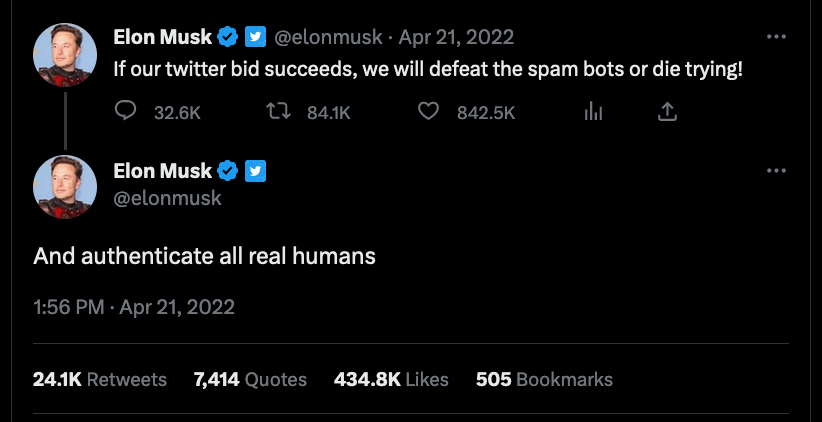
Why did Elon buy twitter for $44 Billion? What value does he see in it besides the greater influence that undoubtedly comes with controlling one of the largest social platforms in the world? We do not need to speculate - he made his intentions incredibly clear in his first meeting with twitter employees after his takeover - WeChat of the West.
To those that do not appreciate freedom, the value prop is clear - WeChat is incredibly powerful and successful in China.
To those that do appreciate freedom, the concern is clear - WeChat has essentially become required to live in China, has surveillance and censorship integrated at its core, and if you are banned from the app your entire livelihood is at risk. Employment, housing, payments, travel, communication, and more become extremely difficult if WeChat censors determine you have acted out of line.
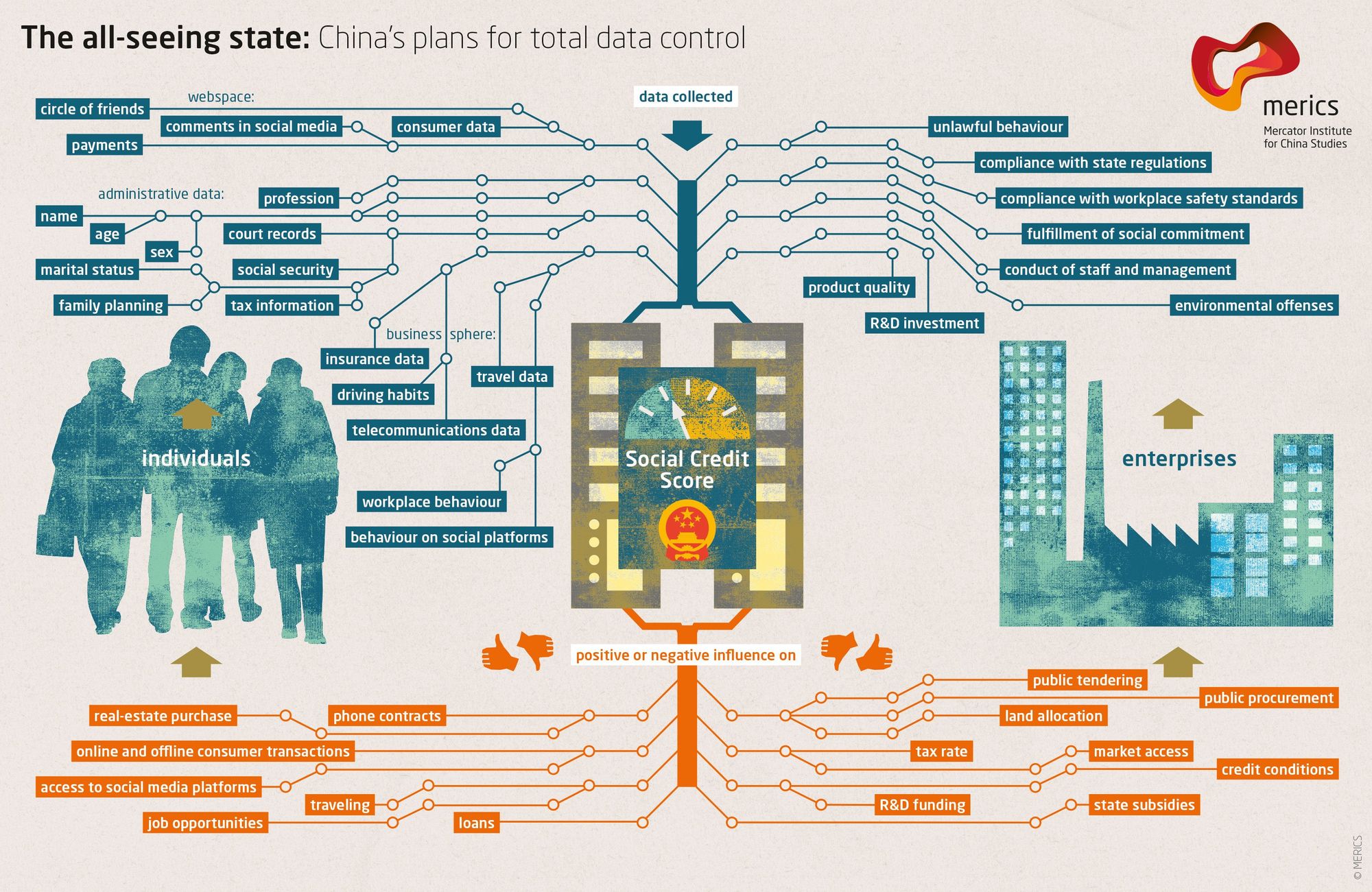
The blue check is the first step in Elon's plan to bring the chinese social credit score system to the west. Users who verify their identity are rewarded with more reach and better tools than those that do not. Verified users are the main product of Elon's twitter - an extensive database of individuals and complete control of the tools he will slowly get them to rely on - it is easier to monetize cattle than free men.
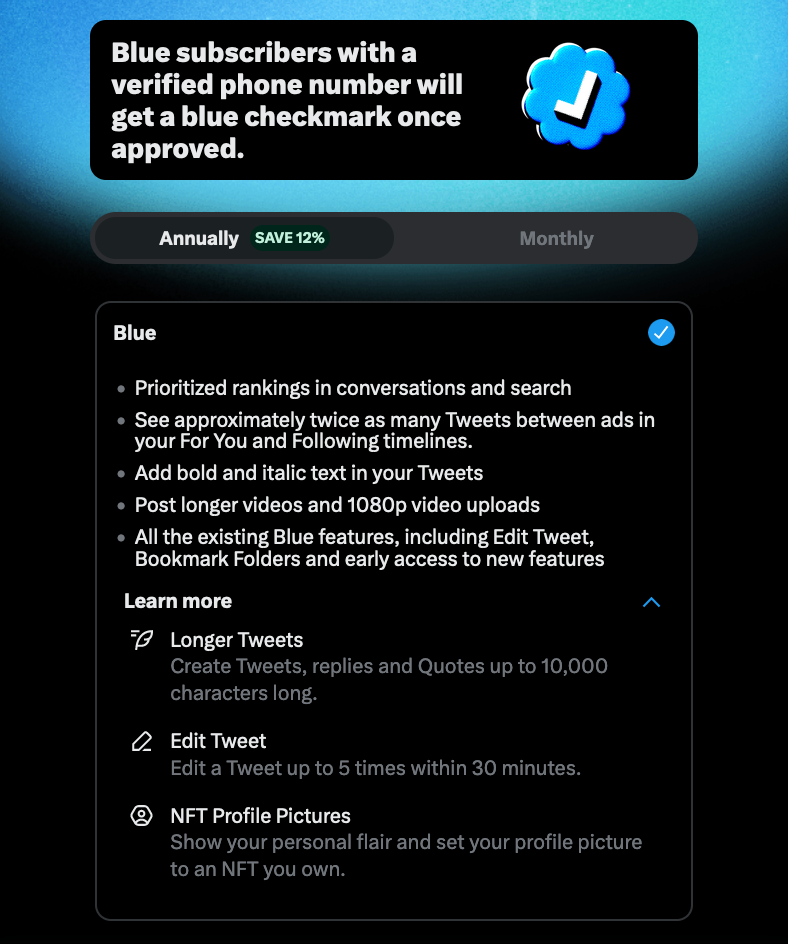
If you cannot resist the temptation of the blue check in its current form you have already lost - what comes next will be much darker. If you realize the need to resist - freedom tech provides us options.
If you found this post helpful support my work with bitcoin.

-
 @ dfa02707:41ca50e3
2025-06-02 17:02:14
@ dfa02707:41ca50e3
2025-06-02 17:02:14Contribute to keep No Bullshit Bitcoin news going.
- RoboSats v0.7.7-alpha is now available!
NOTE: "This version of clients is not compatible with older versions of coordinators. Coordinators must upgrade first, make sure you don't upgrade your client while this is marked as pre-release."
- This version brings a new and improved coordinators view with reviews signed both by the robot and the coordinator, adds market price sources in coordinator profiles, shows a correct warning for canceling non-taken orders after a payment attempt, adds Uzbek sum currency, and includes package library updates for coordinators.

Source: RoboSats.
- siggy47 is writing daily RoboSats activity reviews on stacker.news. Check them out here.
- Stay up-to-date with RoboSats on Nostr.
What's new
- New coordinators view (see the picture above).
- Available coordinator reviews signed by both the robot and the coordinator.
- Coordinators now display market price sources in their profiles.

Source: RoboSats.
- Fix for wrong message on cancel button when taking an order. Users are now warned if they try to cancel a non taken order after a payment attempt.
- Uzbek sum currency now available.
- For coordinators: library updates.
- Add docker frontend (#1861).
- Add order review token (#1869).
- Add UZS migration (#1875).
- Fixed tests review (#1878).
- Nostr pubkey for Robot (#1887).
New contributors

Full Changelog: v0.7.6-alpha...v0.7.7-alpha
-
 @ 7f6db517:a4931eda
2025-06-02 14:01:58
@ 7f6db517:a4931eda
2025-06-02 14:01:58
What is KYC/AML?
- The acronym stands for Know Your Customer / Anti Money Laundering.
- In practice it stands for the surveillance measures companies are often compelled to take against their customers by financial regulators.
- Methods differ but often include: Passport Scans, Driver License Uploads, Social Security Numbers, Home Address, Phone Number, Face Scans.
- Bitcoin companies will also store all withdrawal and deposit addresses which can then be used to track bitcoin transactions on the bitcoin block chain.
- This data is then stored and shared. Regulations often require companies to hold this information for a set number of years but in practice users should assume this data will be held indefinitely. Data is often stored insecurely, which results in frequent hacks and leaks.
- KYC/AML data collection puts all honest users at risk of theft, extortion, and persecution while being ineffective at stopping crime. Criminals often use counterfeit, bought, or stolen credentials to get around the requirements. Criminals can buy "verified" accounts for as little as $200. Furthermore, billions of people are excluded from financial services as a result of KYC/AML requirements.
During the early days of bitcoin most services did not require this sensitive user data, but as adoption increased so did the surveillance measures. At this point, most large bitcoin companies are collecting and storing massive lists of bitcoiners, our sensitive personal information, and our transaction history.
Lists of Bitcoiners
KYC/AML policies are a direct attack on bitcoiners. Lists of bitcoiners and our transaction history will inevitably be used against us.
Once you are on a list with your bitcoin transaction history that record will always exist. Generally speaking, tracking bitcoin is based on probability analysis of ownership change. Surveillance firms use various heuristics to determine if you are sending bitcoin to yourself or if ownership is actually changing hands. You can obtain better privacy going forward by using collaborative transactions such as coinjoin to break this probability analysis.
Fortunately, you can buy bitcoin without providing intimate personal information. Tools such as peach, hodlhodl, robosats, azteco and bisq help; mining is also a solid option: anyone can plug a miner into power and internet and earn bitcoin by mining privately.
You can also earn bitcoin by providing goods and/or services that can be purchased with bitcoin. Long term, circular economies will mitigate this threat: most people will not buy bitcoin - they will earn bitcoin - most people will not sell bitcoin - they will spend bitcoin.
There is no such thing as KYC or No KYC bitcoin, there are bitcoiners on lists and those that are not on lists.
If you found this post helpful support my work with bitcoin.

-
 @ 005bc4de:ef11e1a2
2025-06-02 12:23:40
@ 005bc4de:ef11e1a2
2025-06-02 12:23:40Succotash: the connection game
Succotash is a simple "connection game" like Hex or Tak. Would love to hear any feedback.
You can take a look or play at https://succotash.vercel.app
Below is "the story"...
Serendipity: the occurrence and development of events by chance in a happy or beneficial way.
The past few days, a delightful series of events occurred and I ended up with Succotash, the game.

You can read about how it started at the Succotash announcement on Hive, but here's the lowdown:
- It began with a photo. One day, my wife lined up our little tomatoes on the counter, I snapped a pic, and put it on Nostr and it was auto-bridged over to Hive. This simple note sparked something unexpected.

- On Hive, @sherah suggested the that photo looked like a game. That gave me an itch. Could moving tomatoes on a grid make a game?
- There are lots of "connection games" where you try to connect your side to your opponent's side. Could I make a simple game?
- I drew a 5 x 5 grid of dots on paper. I had some dry corn kernels and beans nearby, so I placed them on the paper and started moving them around.
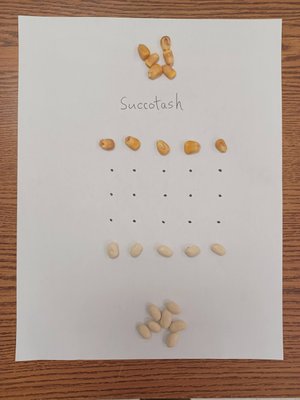
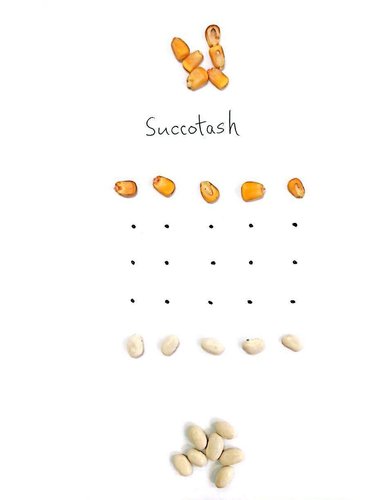
- A Hawaiian girl nearby saw what I was doing and looked at me with a very puzzled look. "It's a game. Want to play it?" We gave Succotash the first ever test run. Later that day, my wife and I sat down on the floor and played the game again. It seemed fun enough.
- I posted the announcement on Hive.
- After some suggestions in the comments about adding an element of randomization with a dice roll, I began to build an online version. The initial version 0.0.1 looked like this:
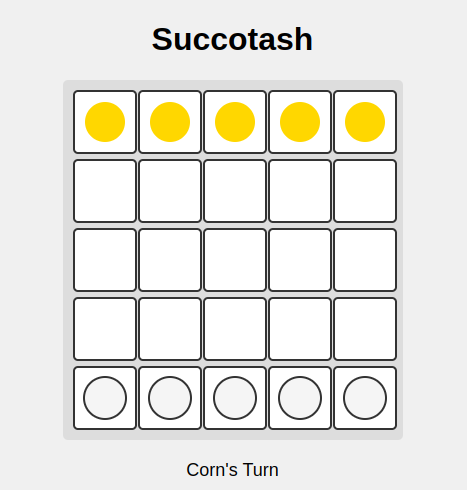
Playing the game, I wanted absolutely wanted the simplicity of corn and beans on paper. But, I felt another element was needed for game play. Plus, I wanted tomatoes. So, I added the chance to earn a sixth player piece, a "Tomato." If you move into both corners of your opponent's home, you earn a sixth game piece. Your Tomato pops into the center square and then you play normally with six pieces.
I'm really pleased with the digital version. The game is only one html file and can actually be downloaded and played offline. But, truth be told, I still prefer the real corn and beans on paper. My wife agrees.
Why "Succotash"?
At first, I wanted a tomato-themed name, but since I was using using corn and beans, "Succotash" seemed perfect - it's a dish that combines corn, beans, and vegetables. I considered calling it the "Texas Caviar Game" (since that recipe has tomatoes along with corn and beans, and because it's delicious), but "Succotash" just sounds more fun. Plus, adding tomatoes to succotash sounds yummy as well.
Keeping It Simple
A big goal was to keep the game simple. All you need is:
- A 5 x 5 grid
- 5 pieces of something and 5 pieces of something else (well, if you play with the tomatoes added, 6 of each)
Starting out, I used corn kernels and beans. But, you could use anything: bottle caps and coins, pieces of paper and paper clips, just five of anything (or 6 with the tomatoes). There is even a way to implement the randomization of an attack, with or without dice, see the Rules. I really like that this game could literally be played in the sand with sticks and stones, like we used to do as kids.
"Wow, I can't believe my little comment helped make this game real... Tomatoes, beans, and corn making a game is just the coolest thing." - sherah
Serendipity sometimes leads to wonderful, organic, and fun creations.

Succotash is open source on GitHub at https://github.com/crrdlx/succotash
Play Succotash online at https://succotash.vercel.app (or play with corn and beans on paper!). If you play, there may be glitches. Likely, there are and suggestions are welcome. Maybe the game will morph a bit further. Either way, I'd love any feedback.
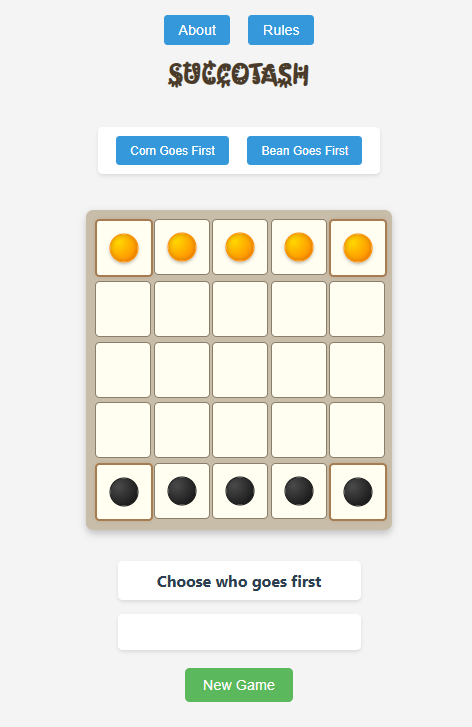
Credits:
- My wife - lining up tomatoes and testing, and for being a good sport while I changed the rules on the fly.
- sherah - the idea of a game.
- Hawaiian girl - curious enough to play the game with me.
- kenny-crane - game play and testing.
- Made with ❤️ by @crrdlx.
Play Succotash online at https://succotash.vercel.app
-
 @ b1ddb4d7:471244e7
2025-06-02 16:01:03
@ b1ddb4d7:471244e7
2025-06-02 16:01:03This article was originally published on aier.org
Even after eleven years experience, and a per Bitcoin price of nearly $20,000, the incredulous are still with us. I understand why. Bitcoin is not like other traditional financial assets.
Even describing it as an asset is misleading. It is not the same as a stock, as a payment system, or a money. It has features of all these but it is not identical to them.
What Bitcoin is depends on its use as a means of storing and porting value, which in turn rests of secure titles to ownership of a scarce good. Those without experience in the sector look at all of this and get frustrated that understanding why it is valuable is not so easy to grasp.
In this article, I’m updating an analysis I wrote six years ago. It still holds up. For those who don’t want to slog through the entire article, my thesis is that Bitcoin’s value obtains from its underlying technology, which is an open-source ledger that keeps track of ownership rights and permits the transfer of these rights. Bitcoin managed to bundle its unit of account with a payment system that lives on the ledger. That’s its innovation and why it obtained a value and that value continues to rise.
Consider the criticism offered by traditional gold advocates, who have, for decades, pushed the idea that sound money must be backed by something real, hard, and independently valuable. Bitcoin doesn’t qualify, right? Maybe it does.
Bitcoin first emerged as a possible competitor to national, government-managed money in 2009. Satoshi Nakamoto’s white paper was released October 31, 2008. The structure and language of this paper sent the message: This currency is for computer technicians, not economists nor political pundits. The paper’s circulation was limited; novices who read it were mystified.
But the lack of interest didn’t stop history from moving forward. Two months later, those who were paying attention saw the emergence of the “Genesis Block,” the first group of bitcoins generated through Nakamoto’s concept of a distributed ledger that lived on any computer node in the world that wanted to host it.
Here we are all these years later and a single bitcoin trades at $18,500. The currency is held and accepted by many thousands of institutions, both online and offline. Its payment system is very popular in poor countries without vast banking infrastructures but also in developed countries. And major institutions—including the Federal Reserve, the OECD, the World Bank, and major investment houses—are paying respectful attention and weaving blockchain technology into their operations.
Enthusiasts, who are found in every country, say that its exchange value will soar even more in the future because its supply is strictly limited and it provides a system vastly superior to government money. Bitcoin is transferred between individuals without a third party. It is relatively low-cost to exchange. It has a predictable supply. It is durable, fungible, and divisible: all crucial features of money. It creates a monetary system that doesn’t depend on trust and identity, much less on central banks and government. It is a new system for the digital age.
Hard lessons for hard money
To those educated in the “hard money” tradition, the whole idea has been a serious challenge. Speaking for myself, I had been reading about bitcoin for two years before I came anywhere close to understanding it. There was just something about the whole idea that bugged me. You can’t make money out of nothing, much less out of computer code. Why does it have value then? There must be something amiss. This is not how we expected money to be reformed.
There’s the problem: our expectations. We should have been paying closer attention to Ludwig von Mises’ theory of money’s origins—not to what we think he wrote, but to what he actually did write.
In 1912, Mises released The Theory of Money and Credit. It was a huge hit in Europe when it came out in German, and it was translated into English. While covering every aspect of money, his core contribution was in tracing the value and price of money—and not just money itself—to its origins. That is, he explained how money gets its price in terms of the goods and services it obtains. He later called this process the “regression theorem,” and as it turns out, bitcoin satisfies the conditions of the theorem.
Mises’ teacher, Carl Menger, demonstrated that money itself originates from the market—not from the State and not from social contract. It emerges gradually as monetary entrepreneurs seek out an ideal form of commodity for indirect exchange. Instead of merely bartering with each other, people acquire a good not to consume, but to trade. That good becomes money, the most marketable commodity.
But Mises added that the value of money traces backward in time to its value as a bartered commodity. Mises said that this is the only way money can have value.
The theory of the value of money as such can trace back the objective exchange value of money only to that point where it ceases to be the value of money and becomes merely the value of a commodity…. If in this way we continually go farther and farther back we must eventually arrive at a point where we no longer find any component in the objective exchange value of money that arises from valuations based on the function of money as a common medium of exchange; where the value of money is nothing other than the value of an object that is useful in some other way than as money…. Before it was usual to acquire goods in the market, not for personal consumption, but simply in order to exchange them again for the goods that were really wanted, each individual commodity was only accredited with that value given by the subjective valuations based on its direct utility.
Mises’ explanation solved a major problem that had long mystified economists. It is a narrative of conjectural history, and yet it makes perfect sense. Would salt have become money had it otherwise been completely useless? Would beaver pelts have obtained monetary value had they not been useful for clothing? Would silver or gold have had money value if they had no value as commodities first? The answer in all cases of monetary history is clearly no. The initial value of money, before it becomes widely traded as money, originates in its direct utility. It’s an explanation that is demonstrated through historical reconstruction. That’s Mises’ regression theorem.
Bitcoin’s Use Value
At first glance, bitcoin would seem to be an exception. You can’t use a bitcoin for anything other than money. It can’t be worn as jewelry. You can’t make a machine out of it. You can’t eat it or even decorate with it. Its value is only realized as a unit that facilitates indirect exchange. And yet, bitcoin already is money. It’s used every day. You can see the exchanges in real time. It’s not a myth. It’s the real deal.
It might seem like we have to choose. Is Mises wrong? Maybe we have to toss out his whole theory. Or maybe his point was purely historical and doesn’t apply in the future of a digital age. Or maybe his regression theorem is proof that bitcoin is just an empty mania with no staying power, because it can’t be reduced to its value as a useful commodity.
And yet, you don’t have to resort to complicated monetary theory in order to understand the sense of alarm surrounding bitcoin. Many people, as I did, just have a feeling of uneasiness about a money that has no basis in anything physical. Sure, you can print out a bitcoin on a piece of paper, but having a paper with a QR code or a public key is not enough to relieve that sense of unease.
How can we resolve this problem? In my own mind, I toyed with the issue for more than a year. It puzzled me. I wondered if Mises’ insight applied only in a pre-digital age. I followed the speculations online that the value of bitcoin would be zero but for the national currencies into which it is converted. Perhaps the demand for bitcoin overcame the demands of Mises’ scenario because of a desperate need for something other than the dollar.
As time passed—and I read the work of Konrad Graf, Peter Surda, and Daniel Krawisz—finally the resolution came. Bitcoin is both a payment system and a money. The payment system is the source of value, while the accounting unit merely expresses that value in terms of price. The unity of money and payment is its most unusual feature, and the one that most commentators have had trouble wrapping their heads around.
We are all used to thinking of currency as separate from payment systems. This thinking is a reflection of the technological limitations of history. There is the dollar and there are credit cards. There is the euro and there is PayPal. There is the yen and there are wire services. In each case, money transfer relies on third-party service providers. In order to use them, you need to establish what is called a “trust relationship” with them, which is to say that the institution arranging the deal has to believe that you are going to pay.
This wedge between money and payment has always been with us, except for the case of physical proximity.
If I give you a dollar for your pizza slice, there is no third party. But payment systems, third parties, and trust relationships become necessary once you leave geographic proximity. That’s when companies like Visa and institutions like banks become indispensable. They are the application that makes the monetary software do what you want it to do.
The hitch is that
-
 @ a296b972:e5a7a2e8
2025-06-02 11:23:44
@ a296b972:e5a7a2e8
2025-06-02 11:23:44So sehr man sich auch Mühe gibt, es will vielen einfach nicht gelingen, Russland als den Feind anzusehen.
Wenn ein fremder Mann eine Frau unfreiwillig zum Tanz auf’s Parkett zerrt und der Ehemann dem fremden Mann wie auch immer zu verstehen gibt, dass das so nicht geht, dann kann man nicht sagen, der Ehemann habe einen Streit vom Zaun gebrochen.
Eine Reaktion setzt immer eine Aktion voraus.
Nicht Russland ist der NATO auf die Pelle gerückt, sondern die NATO mit der Osterweiterung Russland.
Russland wollte mit Auflösung des Warschauer Pakts eine gemeinsame europäische Militärlösung, die die Neuordnung der NATO oder gar ebenfalls ihre Auflösung zur Folge gehabt hätte.
Der sogenannte Wertewesten ist maßgeblich für den Krieg in der Ukraine verantwortlich. Völkerrechtswidrigkeit kann man weglassen, da es auch im Westen, von den USA, mehrfach Beispiele für völkerrechtswidrige Angriffe auf andere Staaten gibt. Und Deutschland hat im Kosovo auch nicht nur Kaffee für die Truppen gekocht.
Wer im Glashaus sitzt, sollte nicht mit Steinen werfen.
Wenn Deutschland, vertreten durch einen Kanzler 2. Wahl über die nicht mehr vorhandene Reichweitenbeschränkung spricht, das Wahlvieh, den ehemaligen Souverän, im Ungewissen über die Lieferung des Stiers lässt, und dann, wie aus heiterem Himmel, Taurus, mit deutschem Kompass und deutschen Kompassbedienern, auf einmal Richtung Krim-Brücke oder gar Moskau unterwegs sein sollte, wen würde es dann wundern, wenn Moskau seine „Liebesgrüße“, schon allein aus reiner Höflichkeit und Anstand, nach Schrobenhausen sendet?
Würde das passieren, würde man in Deutschland sagen: Seht ihr, wir haben es euch ja immer gesagt, ihr wolltet es nur nicht glauben. Russland, mit seinem imperialen Anspruch und seinem aggressiven Verhalten, der Friedensverhinderer, der böse Putin, der böse Russ‘, wird uns angreifen! Die geforderte Kriegstüchtigkeit war also absolut berechtigt!
Wer das dann immer noch glaubt, dem möchte man eine Rakete in den Kamin seiner Doppelhaushälfte mit Gänsemuster-Gardinen am Küchenfenster stecken.
Wenn man jemanden bis auf’s Blut reizt, ist es ihm dann zu verdenken, wenn ihm irgendwann der Geduldsfaden reißt, nachdem schon mehrere Rote Linien überschritten wurden?
Und warum reizt man Russland bis auf’s Blut? Man kann zu keinem anderen Grund kommen, als dass die Geistesgrößen in Deutschland unbedingt einen Krieg wollen. Wozu? Ist das die von wem auch immer geplante Vollendung der Zerstörung Deutschlands? Der zukünftige Ex-Kanzler redet einen Haufen vermeintlich kluges Zeug daher, aber Russland handelt klug. Kleiner Unterschied.
Rheingold ist in gewöhnliches Rheinmetall, wohl durch Geheim-Alchimie, verwandelt worden. Geheim wird ja jetzt wieder modern. Man kann nur hoffen, dass es in der Taurussland-Rakete tatsächlich US-amerikanische Komponenten gibt, die (vielleicht sogar in Wiesbaden?) abgeschaltet werden können, damit der Stier nicht fliegen kann. Und man kann auch nur hoffen, dass die USA sie dann auch wirklich abschalten.
Die Meyer-Werft in Papenburg soll demnächst auch „Meine Fregatte“ und „Kreuzer grau I bis IX“ bauen. Panzerkreuzerfahrten in der Ostsee mit Blick auf Königsberg, na bravo, tolle Idee. (Da war doch mal was?). Gute Erholung schon jetzt. Da wird die vom Kaiser für den Aufbau der Marine eingeführte Sektsteuer endlich wieder ihrem eigentlichen Zweck zugeführt.
Und wie der ehemalige Masken-Chef-Einkäufer erst jüngst in einer der unsäglichen Staatsfunk-Aufführungen lichtblitzartig erkannt haben muss, spricht Putin Deutsch. Nein, doch, oh! Man stelle sich das einmal vor. Ganz was Neues! Die jetzt für die deutsche Bevölkerung geheim gehaltenen militärischen Absprachen werden nun in einer Sprache in Berlin besprochen, von denen man vorher sorgfältig, wie immer, recherchiert hat, dass Putin sie sicher nicht spricht, damit er nichts mitbekommt. Pssst, Feind hört mit! Den Beruf des Dolmetschers oder Übersetzers hat das Arbeitsamt in der Berufsberatung in der Schulzeit des Bankkaufmanns wahrscheinlich nicht vorgestellt, daher existieren sie für ihn nicht.
Und welche militärischen Entscheidungen von den deutschen "Chef-Diplomaten" getroffen wurden, das erfährt die Bevölkerung ja spätestens, wenn es knallt. Das reicht ja auch.
Was kommt als nächstes? Nach selbst genähten Maulwindeln jetzt eine Nähanleitung für schwere Gardinen zur Fenster-Verdunkelung? Oder gibt es die bald schon fertig in allen Größen zu kaufen, bei einem Discounter, wie in Berlin jetzt Musketen, damit man sich im Garten wieder den Weg zum Geräteschuppen bahnen kann.
Ils sont fous ces Allemands!
„Das große Karthago führte drei Kriege. Nach dem ersten war es noch mächtig. Nach dem zweiten war es noch bewohnbar. Nach dem dritten war es nicht mehr aufzufinden“, Berthold Brecht.
“Dieser Beitrag wurde mit dem Pareto-Client geschrieben.”
* *
(Bild von pixabay)
-
 @ cb4352cd:a16422d7
2025-06-02 11:08:26
@ cb4352cd:a16422d7
2025-06-02 11:08:26The Beyond Banking Conference was truly legendary. This groundbreaking event brought together over 200,000 participants from across the globe and set a new Guinness World Record. From the opening moments, it was clear this was more than just another blockchain event — it was a celebration of the future of finance.
💡 Global Impact and Diversity
The conference was streamed in eight languages, underscoring its universal appeal. Top speakers shared insights on how decentralized finance, AI, and emerging technologies are reshaping the financial landscape.🎤 Inspiring Voices and Thought-Provoking Discussions
From deep dives into the future of DeFi to conversations about Web3 adoption, attendees gained valuable insights and a renewed sense of optimism. The energy and enthusiasm of the speakers sparked engaging discussions and set the tone for the industry’s next chapter.🎁 Exciting Giveaways and the Ferrari Raffle
Adding to the excitement were thrilling giveaways, including raffle tickets for the Super Prize — a Ferrari. The grand raffle will take place on June 14th, promising participants a shot at winning this iconic supercar and capping off an unforgettable experience.🏆 A Guinness World Record and a New Chapter in Web3
The event’s standout moment was the official announcement of a new Guinness World Record. This milestone will be formally recognized on June 14th, further solidifying the event’s place in Web3 history.🙏 A Heartfelt Thank You
A sincere thank you goes out to all participants, speakers, the charismatic host, and the hardworking team behind the scenes. None of this would have been possible without the shared enthusiasm and unwavering support of the community.https://t.me/deobank_conference_bot
The Beyond Banking Conference wasn’t just an event — it was a powerful testament to the innovative spirit and determination of the Web3 community. 🚀
-
 @ 7f6db517:a4931eda
2025-06-02 17:02:18
@ 7f6db517:a4931eda
2025-06-02 17:02:18
Nostr is an open communication protocol that can be used to send messages across a distributed set of relays in a censorship resistant and robust way.
If you missed my nostr introduction post you can find it here. My nostr account can be found here.
We are nearly at the point that if something interesting is posted on a centralized social platform it will usually be posted by someone to nostr.
We are nearly at the point that if something interesting is posted exclusively to nostr it is cross posted by someone to various centralized social platforms.
We are nearly at the point that you can recommend a cross platform app that users can install and easily onboard without additional guides or resources.
As companies continue to build walls around their centralized platforms nostr posts will be the easiest to cross reference and verify - as companies continue to censor their users nostr is the best censorship resistant alternative - gradually then suddenly nostr will become the standard. 🫡
Current Nostr Stats
If you found this post helpful support my work with bitcoin.

-
 @ dfa02707:41ca50e3
2025-06-02 17:02:14
@ dfa02707:41ca50e3
2025-06-02 17:02:14Contribute to keep No Bullshit Bitcoin news going.
- "Today we're launching the beta version of our multiplatform Nostr browser! Think Google Chrome but for Nostr apps. The beta is our big first step toward this vision," announced Damus.
- This version comes with the Dave Nostr AI assistant, support for zaps and the Nostr Wallet Connect (NWC) wallet interface, full-text note search, GIFs and fullscreen images, multiple media uploads, user tagging, relay list and mute list support, along with a number of other improvements."
"Included in the beta is the Dave, the Nostr AI assistant (its Grok for Nostr). Dave is a new Notedeck browser app that can search and summarize notes from the network. For a full breakdown of everything new, check out our beta launch video."
What's new
- Dave Nostr AI assistant app.
- GIFs.
- Fulltext note search.
- Add full screen images, add zoom, and pan.
- Zaps! NWC/ Wallet UI.
- Introduce last note per pubkey feed (experimental).
- Allow multiple media uploads per selection.
- Major Android improvements (still WIP).
- Added notedeck app sidebar.
- User Tagging.
- Note truncation.
- Local network note broadcast, broadcast notes to other notedeck notes while you're offline.
- Mute list support (reading).
- Relay list support.
- Ctrl-enter to send notes.
- Added relay indexing (relay columns soon).
- Click hashtags to open hashtag timeline.
- Fixed timelines sometimes not updating (stale feeds).
- Fixed UI bounciness when loading profile pictures
- Fixed unselectable post replies.

-
 @ cae03c48:2a7d6671
2025-06-02 16:00:45
@ cae03c48:2a7d6671
2025-06-02 16:00:45Bitcoin Magazine

Bitcoin Builders Exist Because Of UsersBuilder: Nicholas Gregory
Language(s): C++, Rust
Contribute(s/ed) To: Ocean Sidechain, Mainstay, Mercury Wallet, Mercury Layer
Work(s/ed) At: CommerceBlock (formerly)
Prior to Bitcoin, Nicholas was a software developer working in the financial system for banking firms developing trading and derivatives platforms. After the 2008 financial crisis he began to consider alternatives to the legacy financial system in the fallout.
Like many from that time, he completely ignored the original Slashdot article featuring the Bitcoin whitepaper due to the apparent focus on Windows as an application platform (Nicholas was a UNIX/Linux developer). Thankfully someone he knew introduced him to Bitcoin later on.
The thing that captured his interest about Bitcoin rather than other alternatives at the time was its specific architecture as a distributed computer network.
“The fact that it was like an alternative way. It was all based around [a] kind of […] network. And what I mean by that, building financial systems, people always wanted a system that was 24-7.
And how do you deal with someone interacting [with] it in different geographical parts of the world without it being centralized?
And I’d seen various ways of people solving that problem, but it never had been done, you know, in a kind of […] scalable solution. And using […] cryptography and proof of work to solve that issue was just weird, to be honest. It was totally weird for me.”
All of the other systems he had designed, and some that he built, were systems distributed across multiple parts of the world. Unlike Bitcoin however, these systems were permissioned and restricted who could update the relevant database(s) despite that fact that copies of them were redundantly distributed globally.
“The fact that in Bitcoin you had everyone kind of doing this proof of work game, which is what it is. And whoever wins does the [database] write. That mess[ed] with my head. That was […] very unique.”
Beginning To Build
Nicholas’s path to building in the space was an organic one. At the time he was living in New York City, and being a developer he of course found the original Bitdevs founded in NYC. Back then meetups were incredibly small, sometimes even less than a dozen people, so the environment was much more conducive to in-depth conversations than some larger meetups these days.
He first began building a “hobbyist” Over The Counter (OTC) trading software stack for some people (back then a very significant volume of bitcoin was traded OTC for cash or other fiat mediums). From here Nicholas and Omar Shibli, whom he met at Bitdevs, worked together on Pay To Contract (BIP 175).
BIP 175 specifies a scheme where a customer purchasing a good participates in generating the address the merchant provides. This is done by the two first agreeing on a contract describing what is being paid for, afterwards the merchant sends a master public key to the consumer, who uses the hash of that description of the item or service to generate an individual address using the hash and master public key.
This allows the customer to prove what the merchant agreed to sell them, and that the payment for the good or service has been made. Simply publishing the master public key and contract allows any third party to generate the address that was paid, and verify that the appropriate amount of funds were sent there.
Ocean and Mainstay
Nicholas and Omar went on to found CommerceBlock, a Bitcoin infrastructure company. Commerceblock took a similar approach to business as Blockstream, building technological platforms to facilitate the use of Bitcoin and blockchains in general in commerce and finance. Shortly afterwards Nicholas met Tom Trevethan who came on board.
“I met Tom via, yeah, a mutual friend, happy to say who it is. There’s a guy called, who, new people probably don’t know who he is, but OGs do, John Matonis. John Matonis was a good friend of mine, [I’d] known him for a while. He introduced me to Tom, who was, you know, kind of more on the cryptography side. And it kind of went from there.”
The first major project they worked on was Ocean, a fork of the Elements sidechain platform developed by Blockstream that the Liquid sidechain was based on. The companies CoinShares and Blockchain in partnership with others launched an Ocean based sidechain in 2019 to issue DGLD, a gold backed digital token.
“So we, you know, we were working on forks of Elements, doing bespoke sidechains. […] Tom had some ideas around cryptography. And I think one of our first ideas was about how to bolt on these forks of Elements onto […] the Bitcoin main chain. […] We thought the cleanest way to do that was […] using some sort of, I can’t remember, but it was something [based on] single-use sealed sets, which was an invention by Peter Todd. And I think we implemented that fairly well with Mainstay.”
The main distinction between Ocean and Liquid as a sidechain platform is Ocean’s use of a protocol designed at Commerceblock called Mainstay. Mainstay is a timestamping protocol that, unlike Opentimestamps, strictly orders the merkle tree it builds instead of randomly adding items in whatever order they are submitted in. This allows each sidechain to timestamp its current blockheight into the Bitcoin blockchain everytime mainchain miners find a block.
While this is useless for any bitcoin pegged into the sidechain, for regulated real world assets (RWA), this provides a singular history of ownership that even the federation operating the sidechain cannot change. This removes ambiguity of ownership during legal disputes.
When asked about the eventually shuttering of the project, Nicholas had this to say:
“I don’t know if we were early, but we had a few clients. But it was, yeah, there wasn’t much adoption. I mean, Liquid wasn’t doing amazing. And, you know, being based in London/Europe, whenever we met clients to do POCs, we were competing against other well-funded projects.
It shows how many years ago they’d either received money from people like IBM or some of the big consultancies and were promoting Hyperledger. Or it was the days when we would be competing against EOS and Tezos. So because we were like a company that needed money to build prototypes or build sidechains, it kind of made it very hard. And back then there wasn’t much adoption.”
Mercury Wallet and Mercury Layer
After shutting down Ocean, Nicholas and Tom eventually began working on a statechain implementation, though the path to this was not straightforward.
“[T]here were a few things happening at the same time that led to it. So the two things were we were involved in a [proof of concept], a very small […]POC for like a potential client. But this rolled around Discreet Log Contracts. And one of the challenges of Discreet Log Contracts, they’re very capital inefficient. So we wanted a way to novate those contracts. And it just so happened that Ruben Sampson, you know, wrote this kind of white paper/Medium post about statechains. And […] those two ideas, that kind of solved potentially that issue around DLCs.”
In the end they did not wind up deploying a statechain solution for managing DLCs, but went in a different direction.
Well, there was another thing happening at the same time, coinswaps. And, yeah, bear in mind, in those days, everyone worried that by […] 2024/2025 […] network fees could be pretty high. And to do […] coin swaps, you kind of want to do multiple rounds. So […] state chains felt perfect because […] you basically take a UTXO, you put it off the chain, and then you can swap it as much as you want.”
Mercury Wallet was fully built out and functional, but sadly never gained any user adoption. Samourai Wallet and Wasabi Wallet at the time dominated the privacy tool ecosystem, and Mercury Wallet was never able to successfully take a bite out of the market.
Rather than completely give up, they went back to the drawing board to build a statechain variant using Schnorr with the coordinator server blind signing, meaning it could not see what it was signing. When asked why those changes were made, he had this to say: “That would give us a lot more flexibility to do other things in Bitcoin with L2s. You know, the moment you have a blinded solution, we thought, well, this could start having interoperability with Lightning.”
Rather than building a user facing wallet this time, they built out a Software Development Kit (SDK) that could be integrated with other wallets.
“{…] I guess with Mercury Layer, it was very much building a kind of […] full-fledged Layer 2 that anyone could use. So we [built] it as an SDK. We did have a default wallet that people could run. But we were hoping that other people would integrate it.”
The End of CommerceBlock
In the end, CommerceBlock shuttered its doors after many years of brilliant engineering work. Nicholas and the rest of the team built numerous systems and protocols that were very well engineered, but at the end of the day they seemed to always be one step ahead of the curve. That’s not necessarily a good thing when it comes to building systems for end users.
If your work is too far ahead of the demand from users, then in the end that isn’t a sustainable strategy.
“…being in the UK, which is not doing that well from a regulatory point of view, played into it. If I
-
 @ 7f6db517:a4931eda
2025-06-02 17:02:18
@ 7f6db517:a4931eda
2025-06-02 17:02:18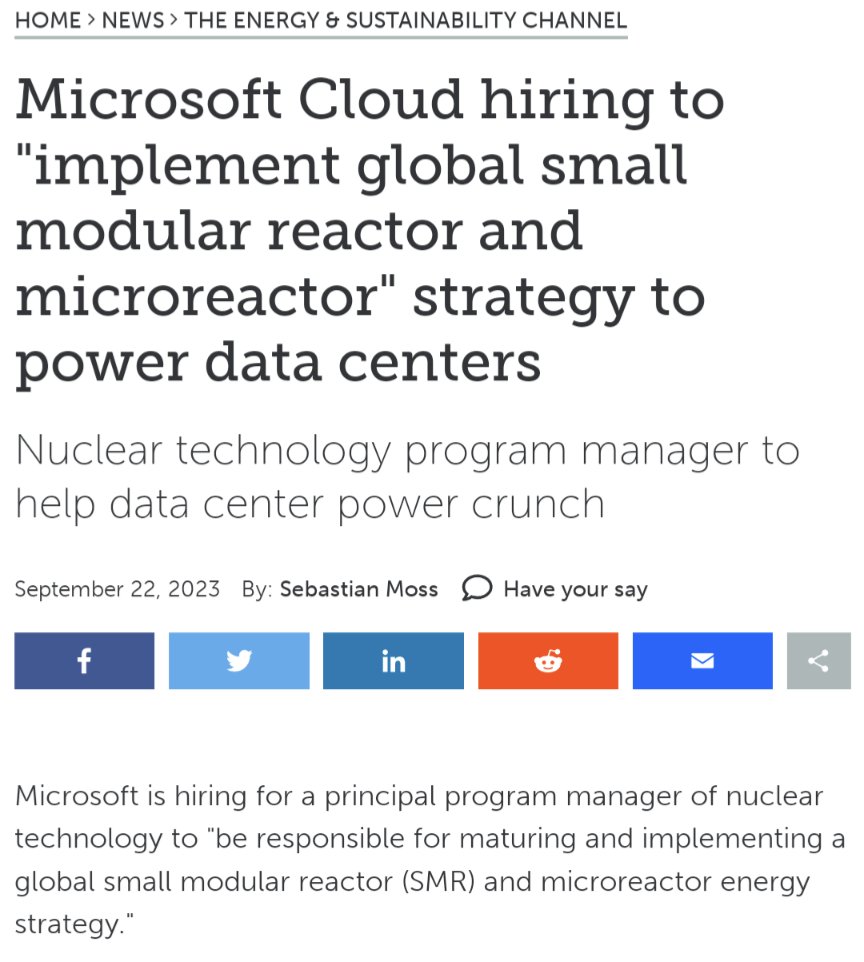
For years American bitcoin miners have argued for more efficient and free energy markets. It benefits everyone if our energy infrastructure is as efficient and robust as possible. Unfortunately, broken incentives have led to increased regulation throughout the sector, incentivizing less efficient energy sources such as solar and wind at the detriment of more efficient alternatives.
The result has been less reliable energy infrastructure for all Americans and increased energy costs across the board. This naturally has a direct impact on bitcoin miners: increased energy costs make them less competitive globally.
Bitcoin mining represents a global energy market that does not require permission to participate. Anyone can plug a mining computer into power and internet to get paid the current dynamic market price for their work in bitcoin. Using cellphone or satellite internet, these mines can be located anywhere in the world, sourcing the cheapest power available.
Absent of regulation, bitcoin mining naturally incentivizes the build out of highly efficient and robust energy infrastructure. Unfortunately that world does not exist and burdensome regulations remain the biggest threat for US based mining businesses. Jurisdictional arbitrage gives miners the option of moving to a friendlier country but that naturally comes with its own costs.
Enter AI. With the rapid development and release of AI tools comes the requirement of running massive datacenters for their models. Major tech companies are scrambling to secure machines, rack space, and cheap energy to run full suites of AI enabled tools and services. The most valuable and powerful tech companies in America have stumbled into an accidental alliance with bitcoin miners: THE NEED FOR CHEAP AND RELIABLE ENERGY.
Our government is corrupt. Money talks. These companies will push for energy freedom and it will greatly benefit us all.
Microsoft Cloud hiring to "implement global small modular reactor and microreactor" strategy to power data centers: https://www.datacenterdynamics.com/en/news/microsoft-cloud-hiring-to-implement-global-small-modular-reactor-and-microreactor-strategy-to-power-data-centers/
If you found this post helpful support my work with bitcoin.

-
 @ 55b2e558:31b7679d
2025-06-02 09:27:49
@ 55b2e558:31b7679d
2025-06-02 09:27:49Moving out of a rental property can be stressful, especially when your bond is on the line. Between packing boxes and organizing your next place, the last thing you want to worry about is cleaning. That’s where we come in – the End of Lease Experts, delivering Spotless Move Outs that help you get your bond back, stress-free.
Why End of Lease Cleaning Matters When your lease ends, most real estate agents and landlords expect the property to be returned in the same – or better – condition than when you moved in. Missed spots, stained carpets, or dusty vents can result in a portion (or all) of your bond being withheld. A thorough, professional clean isn’t just recommended – it’s often required.
What Makes Us the Experts? At Brisbane Carpet Cleanere we specialize in bond cleaning and end-of-lease cleans that tick every box on your property manager’s checklist. Our trained cleaners use advanced equipment and eco-friendly products to ensure every surface shines. We’re not just surface cleaners – we get into the nooks, crannies, and forgotten corners too.
Our Comprehensive End-of-Lease Cleaning Includes: Full kitchen clean, including oven, stove, and range hood
Bathroom scrubbing, including tiles and grout
Wall spot cleaning and mark removal
Interior window and track cleaning
Carpet vacuuming and optional steam cleaning
Skirting boards, light fittings, and ceiling fans
Garage and outdoor area sweep (optional)
Bond Back Guarantee We’re so confident in the quality of our work that we offer a Bond Back Guarantee. If your agent or landlord isn’t satisfied, we’ll come back and clean for free. Our goal is simple: leave no trace behind so you can move out with peace of mind.
Save Time. Reduce Stress. Get Results. Hiring professional end-of-lease cleaners is an investment in peace of mind. Not only do you save hours of work, but you also increase your chances of getting your full bond back – without the hassle of re-cleans or disputes.
Whether you're in Brisbane or the surrounding suburbs, let us take the pressure off your move with a cleaning service that’s fast, affordable, and spotless.
Ready for a Hassle-Free Move? Call us- 0731529574 today or book online to schedule your End of Lease Clean. End of Lease Experts – Spotless Move Outs. Bond Back Guaranteed.
-
 @ 7f6db517:a4931eda
2025-06-02 14:01:57
@ 7f6db517:a4931eda
2025-06-02 14:01:57

"Privacy is necessary for an open society in the electronic age. Privacy is not secrecy. A private matter is something one doesn't want the whole world to know, but a secret matter is something one doesn't want anybody to know. Privacy is the power to selectively reveal oneself to the world." - Eric Hughes, A Cypherpunk's Manifesto, 1993
Privacy is essential to freedom. Without privacy, individuals are unable to make choices free from surveillance and control. Lack of privacy leads to loss of autonomy. When individuals are constantly monitored it limits our ability to express ourselves and take risks. Any decisions we make can result in negative repercussions from those who surveil us. Without the freedom to make choices, individuals cannot truly be free.
Freedom is essential to acquiring and preserving wealth. When individuals are not free to make choices, restrictions and limitations prevent us from economic opportunities. If we are somehow able to acquire wealth in such an environment, lack of freedom can result in direct asset seizure by governments or other malicious entities. At scale, when freedom is compromised, it leads to widespread economic stagnation and poverty. Protecting freedom is essential to economic prosperity.
The connection between privacy, freedom, and wealth is critical. Without privacy, individuals lose the freedom to make choices free from surveillance and control. While lack of freedom prevents individuals from pursuing economic opportunities and makes wealth preservation nearly impossible. No Privacy? No Freedom. No Freedom? No Wealth.
Rights are not granted. They are taken and defended. Rights are often misunderstood as permission to do something by those holding power. However, if someone can give you something, they can inherently take it from you at will. People throughout history have necessarily fought for basic rights, including privacy and freedom. These rights were not given by those in power, but rather demanded and won through struggle. Even after these rights are won, they must be continually defended to ensure that they are not taken away. Rights are not granted - they are earned through struggle and defended through sacrifice.
If you found this post helpful support my work with bitcoin.

-
 @ 7f6db517:a4931eda
2025-06-02 17:02:18
@ 7f6db517:a4931eda
2025-06-02 17:02:18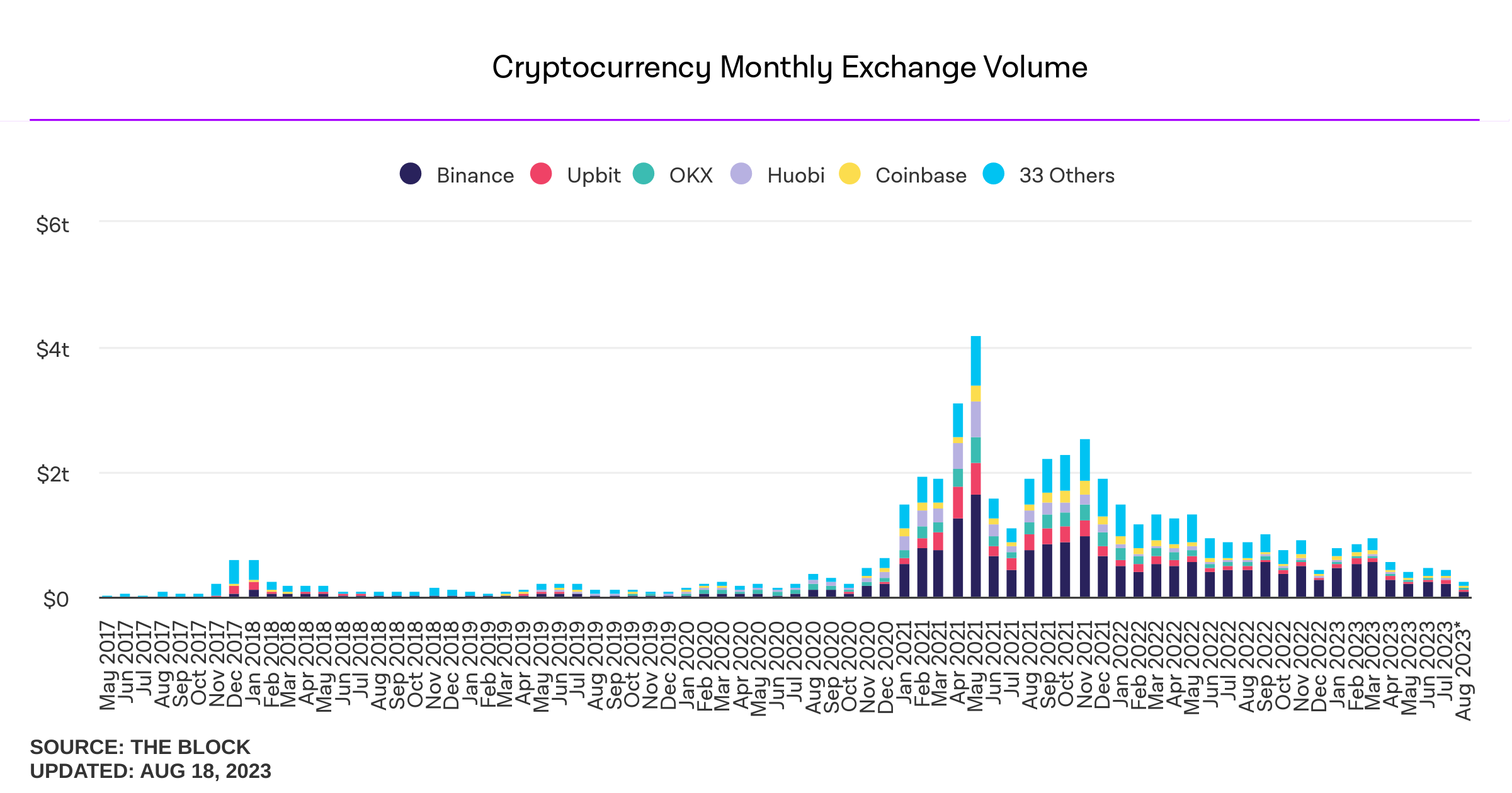
Influencers would have you believe there is an ongoing binance bank run but bitcoin wallet data says otherwise.
- binance wallets are near all time highs
- bitfinex wallets are also trending up
- gemini and coinbase are being hit with massive withdrawals thoughYou should not trust custodians, they can rug you without warning. It is incredibly important you learn how to hold bitcoin yourself, but also consider not blindly trusting influencers with a ref link to shill you.
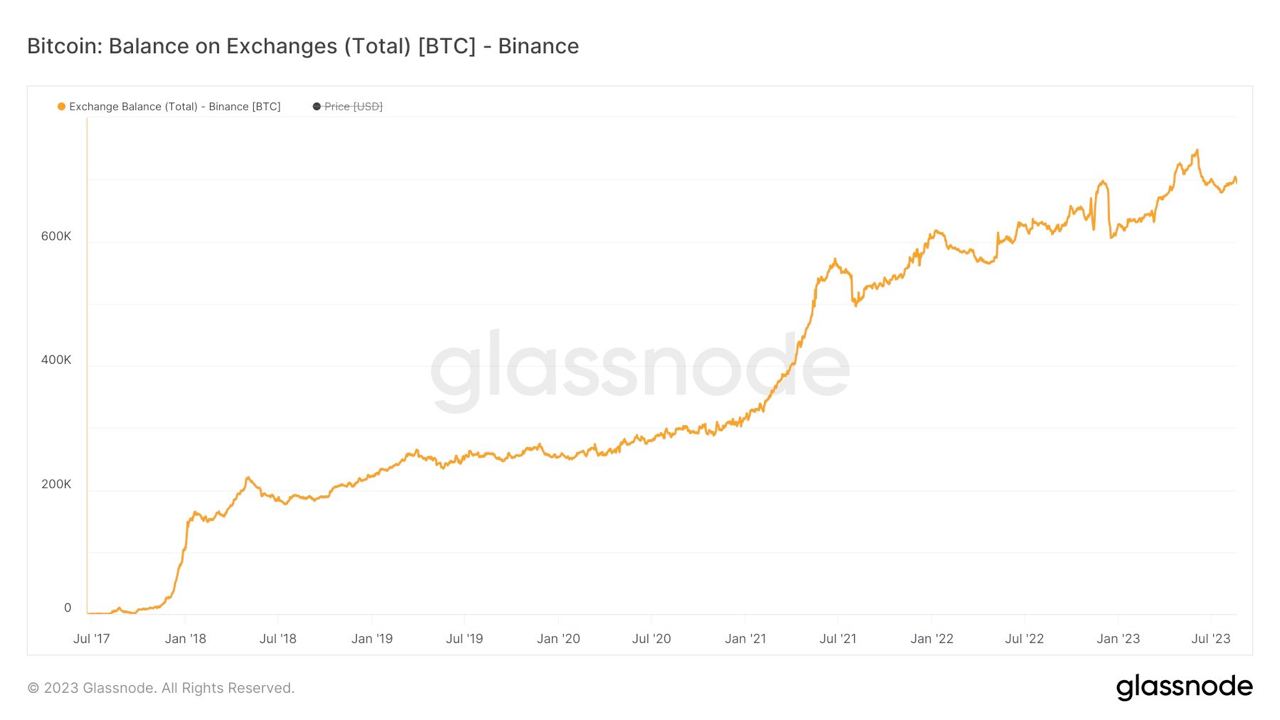
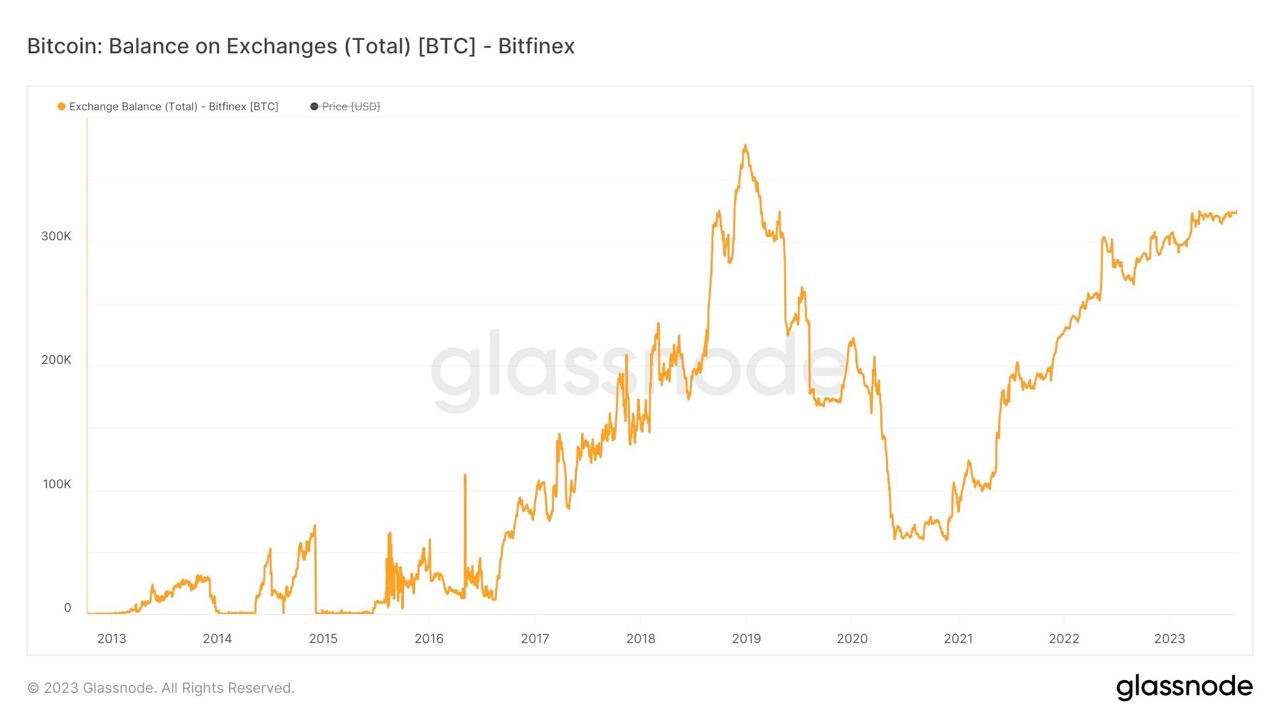
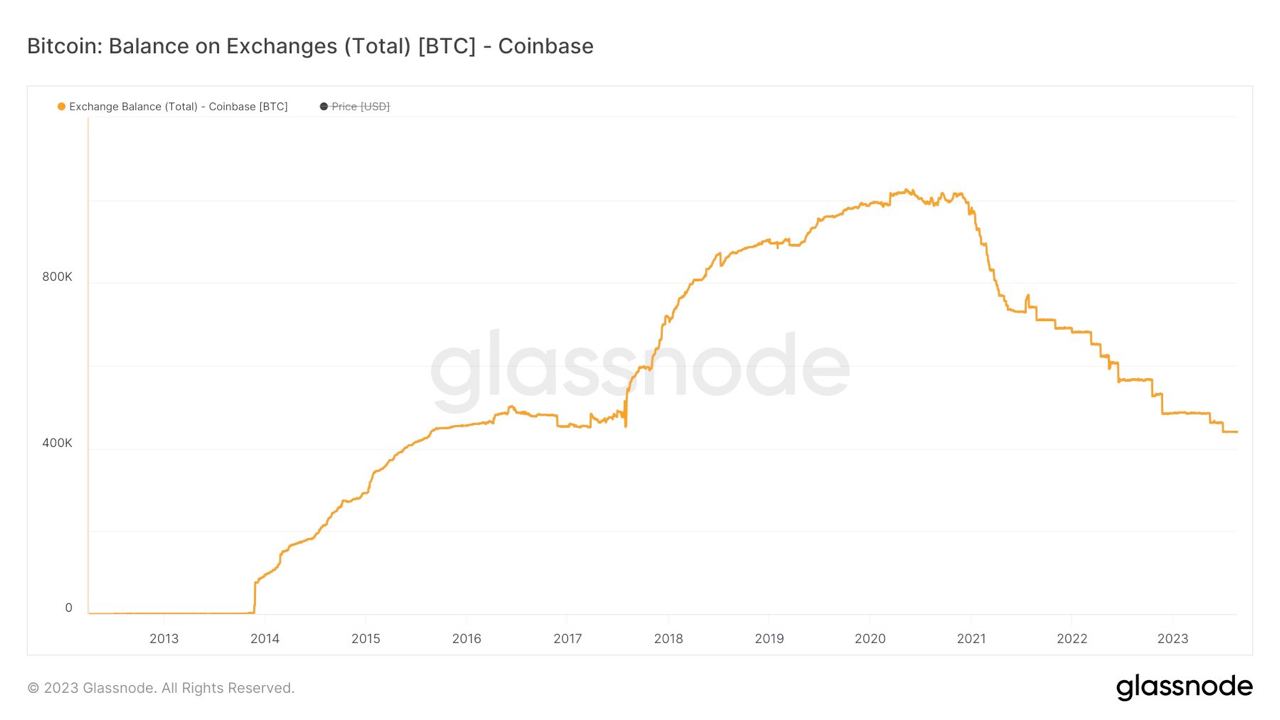
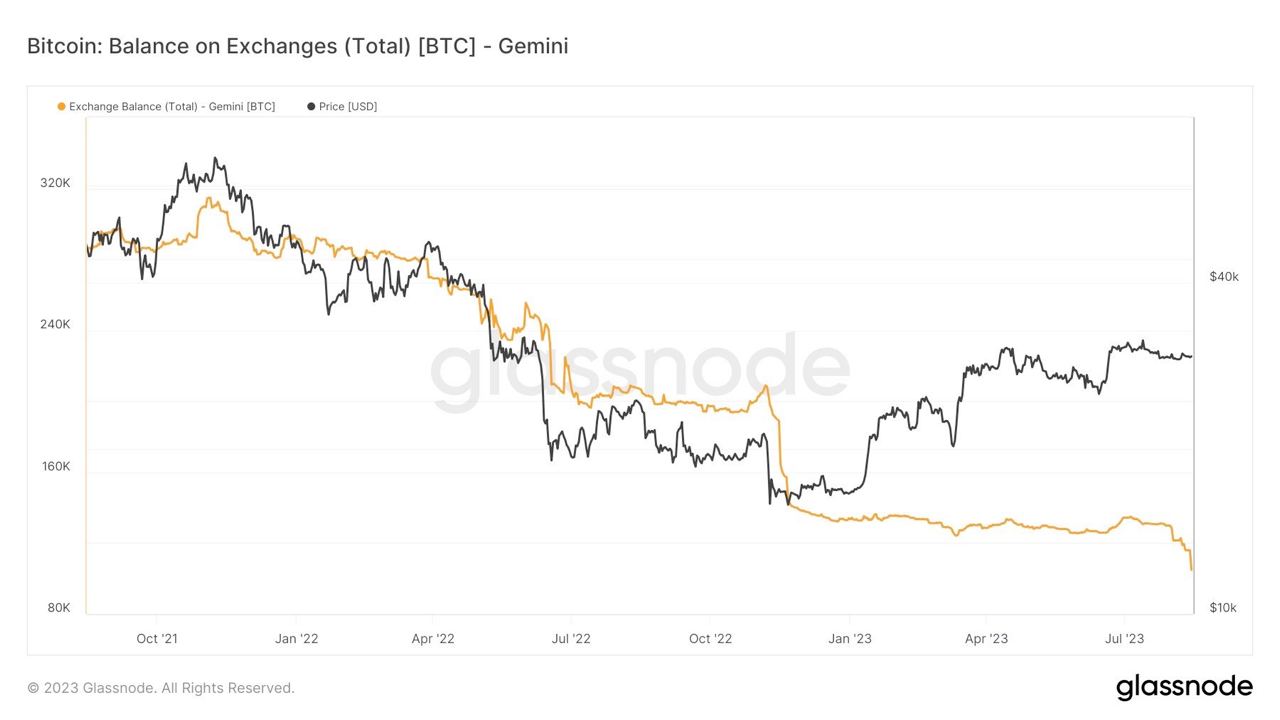
If you found this post helpful support my work with bitcoin.

-
 @ 8c7778fc:7689822c
2025-06-02 11:06:14
@ 8c7778fc:7689822c
2025-06-02 11:06:14Trong thời đại mà tài chính cá nhân ngày càng trở nên phức tạp, việc kiểm soát chi tiêu và đầu tư hiệu quả đòi hỏi mỗi người phải trang bị cho mình tư duy quản lý thông minh và khoa học. VN78, tuy nổi bật với vai trò là nền tảng giải trí trực tuyến, lại mang đến một giá trị khác biệt: góp phần xây dựng tư duy tài chính bền vững cho người dùng. Mỗi hoạt động tại VN78 – từ lựa chọn trò chơi, cân nhắc đặt cược, đến quản lý quỹ thưởng – đều yêu cầu người chơi phải đưa ra quyết định dựa trên tính toán, giới hạn và chiến lược. Đây chính là cơ hội để luyện tập kỹ năng phân bổ nguồn lực, quản lý rủi ro và xác định mục tiêu dài hạn trong bối cảnh giải trí có kiểm soát. Người tham gia VN78 thường xuyên được nhắc nhở về giới hạn cá nhân, nguyên tắc chơi có trách nhiệm, và cách tối ưu hóa lợi nhuận mà không đánh mất sự an toàn về mặt tài chính. Qua đó, VN78 không chỉ là sân chơi may rủi, mà còn là nơi hình thành lối sống tài chính chủ động, giúp người dùng nhận thức rõ hơn về giá trị của đồng tiền và cách đầu tư hiệu quả vào những trải nghiệm có ích.
Bên cạnh việc thúc đẩy tư duy tài chính cá nhân, vn78 còn xây dựng một môi trường quản lý thời gian đáng học hỏi. Một trong những thử thách lớn của người hiện đại là làm chủ thời gian – tài nguyên hữu hạn nhưng dễ bị lãng phí. Các tính năng chơi thông minh trên VN78 như giới hạn thời gian, nhắc nhở đặt cược có kiểm soát, hay bảng theo dõi lịch sử hoạt động, đều giúp người chơi hiểu rõ hơn về nhịp độ sử dụng thời gian của bản thân. Điều này tạo điều kiện để họ xây dựng thói quen kiểm soát thời lượng giải trí, không để ảnh hưởng đến công việc hay đời sống cá nhân. VN78 luôn truyền tải thông điệp rõ ràng: chơi là để giải trí, thư giãn và làm giàu tinh thần – nhưng mọi thứ phải nằm trong sự chủ động của người chơi. Bằng việc cung cấp công cụ theo dõi, cảnh báo và thống kê thời gian sử dụng, VN78 giúp người dùng rèn luyện tính kỷ luật và biết cân đối giữa vui chơi và trách nhiệm cuộc sống, từ đó định hình nên phong cách sống hiện đại, hiệu quả và lành mạnh hơn mỗi ngày.
Không dừng lại ở tư duy tài chính và quản lý thời gian, VN78 còn đồng hành cùng người dùng trong việc nâng cao ý thức về giá trị bền vững của trải nghiệm sống. Với các chương trình khuyến mãi thiết kế thông minh, chính sách thưởng linh hoạt theo hành vi chơi có trách nhiệm và chu kỳ nạp – rút rõ ràng, nền tảng này khuyến khích người dùng quay lại không phải vì cảm giác may rủi, mà vì sự ổn định, minh bạch và giá trị dài hạn mà họ nhận được. Việc xây dựng hệ sinh thái tích hợp nhiều tiện ích như ứng dụng di động, hỗ trợ trực tuyến 24/7, nạp rút qua ví điện tử và ngân hàng uy tín khiến VN78 trở thành một phần trong thói quen tiêu dùng số hiện đại. Đây không chỉ là nơi mang lại giải trí, mà còn là công cụ hỗ trợ người dùng học cách đánh giá giá trị của mỗi lựa chọn – từ thời gian, tiền bạc đến mức độ cam kết cá nhân. Khi tư duy bền vững và thái độ sống có trách nhiệm được khuyến khích từ những trải nghiệm nhỏ nhất như vậy, VN78 đã và đang góp phần hình thành một thế hệ người dùng mới – chủ động, tỉnh táo và thông minh hơn trong mọi quyết định cuộc sống.
-
 @ 7f6db517:a4931eda
2025-06-02 17:02:18
@ 7f6db517:a4931eda
2025-06-02 17:02:18
Humanity's Natural State Is Chaos
Without order there is chaos. Humans competing with each other for scarce resources naturally leads to conflict until one group achieves significant power and instates a "monopoly on violence."Power Brings Stability
Power has always been the key means to achieve stability in societies. Centralized power can be incredibly effective in addressing issues such as crime, poverty, and social unrest efficiently. Unfortunately this power is often abused and corrupted.Centralized Power Breeds Tyranny
Centralized power often leads to tyrannical rule. When a select few individuals hold control over a society, they tend to become corrupted. Centralized power structures often lack accountability and transparency, and rely too heavily on trust.Distributed Power Cultivates Freedom
New technology that empowers individuals provide us the ability to rebuild societies from the bottom up. Strong individuals that can defend and provide for themselves will help build strong local communities on a similar foundation. The result is power being distributed throughout society rather than held by a select few.In the short term, relying on trust and centralized power is an easy answer to mitigating chaos, but freedom tech tools provide us the ability to build on top of much stronger distributed foundations that provide stability while also cultivating individual freedom.
The solution starts with us. Empower yourself. Empower others. A grassroots freedom tech movement scaling one person at a time.
If you found this post helpful support my work with bitcoin.

-
 @ dfa02707:41ca50e3
2025-06-02 11:01:37
@ dfa02707:41ca50e3
2025-06-02 11:01:37
Good morning (good night?)! The No Bullshit Bitcoin news feed is now available on Moody's Dashboard! A huge shoutout to sir Clark Moody for integrating our feed.
Headlines
- Spiral welcomes Ben Carman. The developer will work on the LDK server and a new SDK designed to simplify the onboarding process for new self-custodial Bitcoin users.
- The Bitcoin Dev Kit Foundation announced new corporate members for 2025, including AnchorWatch, CleanSpark, and Proton Foundation. The annual dues from these corporate members fund the small team of open-source developers responsible for maintaining the core BDK libraries and related free and open-source software (FOSS) projects.
- Strategy increases Bitcoin holdings to 538,200 BTC. In the latest purchase, the company has spent more than $555M to buy 6,556 coins through proceeds of two at-the-market stock offering programs.
- Spar supermarket experiments with Bitcoin payments in Zug, Switzerland. The store has introduced a new payment method powered by the Lightning Network. The implementation was facilitated by DFX Swiss, a service that supports seamless conversions between bitcoin and legacy currencies.
- The Bank for International Settlements (BIS) wants to contain 'crypto' risks. A report titled "Cryptocurrencies and Decentralised Finance: Functions and Financial Stability Implications" calls for expanding research into "how new forms of central bank money, capital controls, and taxation policies can counter the risks of widespread crypto adoption while still fostering technological innovation."
- "Global Implications of Scam Centres, Underground Banking, and Illicit Online Marketplaces in Southeast Asia." According to the United Nations Office on Drugs and Crime (UNODC) report, criminal organizations from East and Southeast Asia are swiftly extending their global reach. These groups are moving beyond traditional scams and trafficking, creating sophisticated online networks that include unlicensed cryptocurrency exchanges, encrypted communication platforms, and stablecoins, fueling a massive fraud economy on an industrial scale.
- Slovenia is considering a 25% capital gains tax on Bitcoin profits for individuals. The Ministry of Finance has proposed legislation to impose this tax on gains from cryptocurrency transactions, though exchanging one cryptocurrency for another would remain exempt. At present, individual 'crypto' traders in Slovenia are not taxed.
- Circle, BitGo, Coinbase, and Paxos plan to apply for U.S. bank charters or licenses. According to a report in The Wall Street Journal, major crypto companies are planning to apply for U.S. bank charters or licenses. These firms are pursuing limited licenses that would permit them to issue stablecoins, as the U.S. Congress deliberates on legislation mandating licensing for stablecoin issuers.
"Established banks, like Bank of America, are hoping to amend the current drafts of [stablecoin] legislation in such a way that nonbanks are more heavily restricted from issuing stablecoins," people familiar with the matter told The Block.
- Charles Schwab to launch spot Bitcoin trading by 2026. The financial investment firm, managing over $10 trillion in assets, has revealed plans to introduce spot Bitcoin trading for its clients within the next year.
Use the tools
- Bitcoin Safe v1.2.3 expands QR SignMessage compatibility for all QR-UR-compatible hardware signers (SpecterDIY, KeyStone, Passport, Jade; already supported COLDCARD Q). It also adds the ability to import wallets via QR, ensuring compatibility with Keystone's latest firmware (2.0.6), alongside other improvements.
- Minibits v0.2.2-beta, an ecash wallet for Android devices, packages many changes to align the project with the planned iOS app release. New features and improvements include the ability to lock ecash to a receiver's pubkey, faster confirmations of ecash minting and payments thanks to WebSockets, UI-related fixes, and more.
- Zeus v0.11.0-alpha1 introduces Cashu wallets tied to embedded LND wallets. Navigate to Settings > Ecash to enable it. Other wallet types can still sweep funds from Cashu tokens. Zeus Pay now supports Cashu address types in Zaplocker, Cashu, and NWC modes.
- LNDg v1.10.0, an advanced web interface designed for analyzing Lightning Network Daemon (LND) data and automating node management tasks, introduces performance improvements, adds a new metrics page for unprofitable and stuck channels, and displays warnings for batch openings. The Profit and Loss Chart has been updated to include on-chain costs. Advanced settings have been added for users who would like their channel database size to be read remotely (the default remains local). Additionally, the AutoFees tool now uses aggregated pubkey metrics for multiple channels with the same peer.
- Nunchuk Desktop v1.9.45 release brings the latest bug fixes and improvements.
- Blockstream Green iOS v4.1.8 has renamed L-BTC to LBTC, and improves translations of notifications, login time, and background payments.
- Blockstream Green Android v4.1.8 has added language preference in App Settings and enables an Android data backup option for disaster recovery. Additionally, it fixes issues with Jade entry point PIN timeout and Trezor passphrase input.
- Torq v2.2.2, an advanced Lightning node management software designed to handle large nodes with over 1000 channels, fixes bugs that caused channel balance to not be updated in some cases and channel "peer total local balance" not getting updated.
- Stack Wallet v2.1.12, a multicoin wallet by Cypher Stack, fixes an issue with Xelis introduced in the latest release for Windows.
- ESP-Miner-NerdQAxePlus v1.0.29.1, a forked version from the NerdAxe miner that was modified for use on the NerdQAxe+, is now available.
- Zark enables sending sats to an npub using Bark.

- Erk is a novel variation of the Ark protocol that completely removes the need for user interactivity in rounds, addressing one of Ark's key limitations: the requirement for users to come online before their VTXOs expire.
- Aegis v0.1.1 is now available. It is a Nostr event signer app for iOS devices.
- Nostash is a NIP-07 Nostr signing extension for Safari. It is a fork of Nostore and is maintained by Terry Yiu. Available on iOS TestFlight.
- Amber v3.2.8, a Nostr event signer for Android, delivers the latest fixes and improvements.
- Nostur v1.20.0, a Nostr client for iOS, adds
-
 @ 4fa5d1c4:fd6c6e41
2025-06-02 05:58:24
@ 4fa5d1c4:fd6c6e41
2025-06-02 05:58:24Im Rahmen unseres Workshops möchte ich auf zwei inspirierende Beiträge von Frau Schütze hinweisen und dich einladen, deren Ansätze für die religionsbezogene Bildung weiterzudenken. Die beiden Ausgangspunkte sind:
-
Werkstattbericht: KI-Bilder im Ethik/Philosophie-Unterricht\ In diesem Beitrag beschreibt Frau Schütze, wie sie mithilfe verschiedener KI-Modelle (Midjourney, DALL·E, Ideogram.ai) Bilder generiert, um Schülerinnen und Schüler zum Nachdenken über philosophische und ethische Theorien anzuregen. So wurden zum Beispiel KI-Bilder erstellt, die eine Glückstheorie illustrieren, oder symbolische Darstellungen zum ontologischen und kosmologischen Gottesbeweis (etwa das „größte denkbare Wesen“ bzw. den Laplaceschen Dämon). Dabei erfahren die Lernenden nicht nur einen visuellen Zugang zu abstrakten Gedankenexperimenten, sondern reflektieren zugleich die Grenzen und Tücken von KI-gestützter Bildbeschreibung und -verarbeitung.\ https://frauschuetze.de/?p=7946
-
Rollenkarten Moralphilosophie / angewandte Ethik\ Hier stellt Frau Schütze Rollenkarten vor, die sie für den Oberstufenunterricht entwickelt hat, um Diskussionen zur angewandten Ethik zu strukturieren. Die Karten enthalten Porträts wichtiger Moralphilosophinnen (z. B. Diogenes, Spaemann) und weitere Rollen wie Hinterfragerinnen oder Zweifler*innen, die sich schnell in Fallanalysen, Fishbowl-Formate oder Philosophencafés einbringen lassen. Die Porträts wurden ebenfalls mit Midjourney erstellt, wobei die Prompts konkret beschreiben, wie die Figuren dargestellt werden sollen (z. B. „xxx as a character in a fantasy story, portrait“).\ https://frauschuetze.de/?p=7640
Übertragung auf die religionsbezogene Bildung
Für religionsbezogene Bildungsszenarien eröffnen sich hier viele spannende Möglichkeiten. Im Folgenden findest du ein paar Ideenimpulse, wie du KI-Bilder und Rollenkarten gezielt einsetzen kannst, um religiöse Fragen, Traditionen und Identitäten in den Mittelpunkt zu rücken:
-
KI-Bilder zur Visualisierung religiöser Konzepte
-
Symbolik und Ikonographie erschließen\ Nutze KI-Modelle, um die Symbolwelten verschiedener Religionen (z. B. Christentum, Islam, Buddhismus, Hinduismus) visuell zu erkunden. Überlege: Wie lässt sich das Kreuz in unterschiedlichen Stilrichtungen (klassisch, modern, abstrakt) darstellen? Welche Bildwelten entstehen, wenn du nach einer fusionierten Ikonographie fragst, die christliche, buddhistische und indigene Symbole kombiniert? Durch den kreativen Prozess mit KI lernst du, welche Metaphern und Traditionen hinter religiösen Zeichen stehen und wie sie – bewusst oder unbewusst – von Algorithmen interpretiert werden. Dabei kannst du auch die Grenzen von KI thematisieren: Welche Vorurteile oder Fehldeutungen schleichen sich in die Bildgenerierung ein, wenn religiöse Themen verarbeitet werden?
-
Gedankenexperimente zu Gott und Transzendenz\ Analog zu den KI-Bildern für Gottesbeweise könntest du Aufgaben stellen wie:
-
„Erstelle ein KI-Bild, das die Idee von Theodizee visuell darstellt.“
-
„Lass die KI eine Szene generieren, in der gläubige und atheistische Perspektiven im Dialog stehen.“\ Anschließend diskutierst du mit der Gruppe, inwiefern die Bilder die jeweiligen Konzepte treffend abbilden oder eher stereotyp und eindimensional bleiben. Auf diese Weise vermittelst du nicht nur Content-Wissen, sondern entwickel auch die Medienkompetenz, indem du Fragen nach Intention, Deutungshoheit und algorithmischer Verzerrung aufwirfst.
-
-
Rollenkarten für religiöse Perspektiven und Diskussionsformate
-
Personen aus religiösen Traditionen als Rollen\ Statt ausschließlich Moralphilosophinnen zu berücksichtigen, kannst du Rollenkarten mit Porträts von Religionsstifterinnen (z. B. Jesus von Nazareth, Maria, Mohammed, Buddha, Krishna), Reformern (Martin Luther, Savonarola) oder zeitgenössischen Theolog*innen (z. B. Dorothee Sölle) gestalten. Die KI-gestützten Bilder können dabei in unterschiedlichen künstlerischen Stilrichtungen entstehen – von historischer Malerei bis hin zu zeitgenössischer Street-Art-Adaption. Jede Rolle enthält einen kurzen Steckbrief mit zentralen Glaubensvorstellungen, biografischen Eckpunkten und einem charakteristischen Argument oder Zitat. So kannst du die Lernenden in Rollendebatten schicken, etwa:
-
„Wie würde Luther heute auf die Klimakrise blicken?“
-
„Welche theologische Argumentation könnte Dorothee Sölle zum Thema Gewaltlosigkeit einbringen?“
-
-
Szenarien für kontroverse Debatten
- Religiöse Vielfalt versus Säkularismus\ Verteilt Karten, in denen Rollen wie „konservativer Christ“, „liberaler Muslim“, „selbstbewusste/r Konfessionslose/r“, „Theologieprofessor/in“ oder „politische/r Aktivist/in“ eingenommen werden. Die KI-Porträts unterstützen die Visualisierung, verleihen den Rollen ein Gesicht und erleichtern das Einfühlen in andere Perspektiven.
-
Interaktive Formate im Religionsunterricht
-
Glaubenscafé (analog zum Philosophencafé)\ In Kleingruppen diskutiert ihr verschiedene Glaubenspositionen. KI-Bilder dienen als Ausgangspunkt: Ein Bild, das etwa die Drei-Tage-Phase von Tod und Auferstehung Jesu künstlerisch darstellt, oder ein generiertes Motiv zu einem hinduistischen Fest (z. B. Holi), wird an die Wand projiziert. Anschließend reflektiert ihr gemeinsam: Welche Emotionen, Symbole, Bedeutungen nehmt ihr wahr? Danach schlüpft ihr in Rollenkarten (z. B. theologische/r Fachreferent/in, Religionskritiker/in, Gemeindemitglied) und erarbeitet Positionen, die ihr in einem moderierten Glaubenscafé präsentiert.
-
Fishbowl-Diskussionen\ Nutzt Rollenkarten zu religionsspezifischen Rollen (z. B. Rabbiner/in, Pfarrerin, Atheist/in, Kleriker/in einer traditionellen Religion, spirituelle/r Influencer/in) für eine Fishbowl-Diskussion zum Thema „Sinnsuche in der Postmoderne“. Die KI-Bilder dienen zu Beginn als visuelle Reize: „Welche Elemente im Bild sprechen für Spiritualität, welche eher für Skepsis?“ So wird die Distanz zwischen digitaler Darstellung und gelebter religiöser Erfahrung erlebbar.
-
Methodische Hinweise und Reflexion
-
Prompt-Kompetenz schulen\ Wie schon im Ethikunterricht festgestellt, erfordert das präzise Beschreiben von Bildwünschen viel Übung. Die Lernenden lernen, welche Schlüsselbegriffe notwendig sind und wie kulturelle Vorannahmen in Prompts stecken bleiben. Im religionspädagogischen Kontext könnt ihr dies gezielt thematisieren: Wie formuliert man z. B. den Prompt „Stelle eine friedvolle interreligiöse Konferenz zwischen Christentum, Islam und Judentum dar“ so, dass keine Stereotype reproduziert werden?
-
Ethik des Bilderzeugens\ Diskutiert gemeinsam, inwiefern KI-Bilder beim Umgang mit heiklen religiösen Themen (z. B. Darstellungen des Propheten Mohammed im Islam) kulturelle oder religiöse Grenzen überschreiten können. Legt zusammen ethische Leitlinien fest, bevor ihr KI zur Bildproduktion nutzt: Welche religiösen Bilder sind "sakrosankt", welche dürfen manipuliert werden und was bedeutet das für Religionsfreiheit und Respekt?
-
Reflexion über Urheberrecht und OER\ Wie Frau Schütze in den Rollenkarten-Anleitungen betont, sind ihre Materialien unter CC-BY-Lizenz verfügbar. Erörtert, was es bedeutet, religiöse Bild- und Textmaterialien unter Open-Content-Lizenzen zu verwenden und welche Implikationen das für Schule, Gemeinde und Zivilgesellschaft hat. Das sensibilisiert für Fragen von Teilhabe und Gemeineigentum im digitalen Raum.
Einladung zum Weiterdenken
Ich lade dich herzlich ein, die vorgestellten Methoden und Materialien in eigenen Projekten auszuprobieren und weiterzuentwickeln. Diskutiere in Kleingruppen oder in einer offenen Runde:
-
Welche religiösen Themen lassen sich besonders gut mit KI-Bildern visualisieren?\ Beispiele: Zehn Gebote, Fastenrituale, Schöpfungsmythen, Visionen von Heiligen oder Heiligenschauen. Welche Prompts würdest du verwenden, um diese Szenen zu erzeugen?
-
Wie könnten Rollenkarten zu spezifischen religiösen Traditionen aussehen?\ Entwickle gemeinsam mit anderen kurze Steckbriefe und Bildprompts für Rollen wie „Sufi-Derwisch“, „Gottesleugner/in der Aufklärung“, „Ökumenische/r Pastor/in“, „Religionspädagog*in“, „Katholischer Laienbruder“ oder „Jüdische Rabbinerin“. Achte dabei auf unterschiedliche religiöse Sichtweisen und Geschlechterperspektiven.
-
Welche Herausforderungen ergeben sich beim Einsatz von KI-Bildern im Religionsunterricht?\ Erörtert mögliche Missverständnisse, kulturelle Fehlinterpretationen oder ethische Konflikte (z. B. pietätslose Darstellungen von Figuren, die in bestimmten Glaubensgemeinschaften als heilig gelten). Entwickelt gemeinsam Kriterien oder einen Leitfaden, um solche Risiken zu minimieren.
-
Wie lassen sich interreligiöse Dialoge durch digitale Methoden fördern?\ Gebt Impulse, wie man mit KI-Bildern und Rollenkarten einen „virtuellen Tempelraum“ gestalten kann, in dem Symbole unterschiedlicher Religionen nebeneinanderstehen und zu Dialog anregen. Welche Fragen stellen sich dabei hinsichtlich Toleranz, Respekt und theologischer Pluralität?
Zusammenfassung und Ausblick
Die beiden Beiträge von Frau Schütze bieten hervorragende Grundlagen, um im religionsbezogenen Unterricht visuelle und interaktive Zugänge zu schaffen. Durch KI-Bilder gewinnen die Teilnehmenden neue Zugänge zu Symbolik, Theodizee und Gottesvorstellungen, während Rollenkarten Dialogkompetenz und Empathie für unterschiedliche religiöse Perspektiven stärken. Diese Ideenimpulse sollen dich ermutigen, die Methoden selbst zu erproben und weiterzuentwickeln. Im digitalen Zeitalter können wir so das gemeinsame Lernen und interkulturelle Verständnis gerade im sensiblen Feld der Religionsbildung bereichern.
Ich freue mich auf deine kreativen Umsetzungen und den Austausch über Erfahrungen, Herausforderungen und Fortschritte in diesem spannenden Feld!Antworte gerne auf diesen Beitrag und kommentiere mit deinen Gedanken und Assoziationen oder poste selbst etwas als Impuls, das andere anregt und weiterverwendet werden darf mit dem Hashtag #relilab.\ \ Template: Avery Re https://opengameart.org/content/trading-card-template unter der Lizenz CC-by https://creativecommons.org/licenses/by/4.0/deed.de / Einige Texte und Bezeichnungen von Frank Schlegel https://digitaldurstig.de/rollenkarten/ unter der Lizenz CC-by-SA 4.0, https://creativecommons.org/licenses/by-sa/4.0/deed.de\ Lizenz: cc-by-sa 4.0 / frauschuetze.de / Juli 2023
-
-
 @ dfa02707:41ca50e3
2025-06-02 17:02:14
@ dfa02707:41ca50e3
2025-06-02 17:02:14Contribute to keep No Bullshit Bitcoin news going.
- Wasabi Wallet v2.6.0 "Prometheus" is a major update for the project, focused on resilience and independence from centralized systems.
- Key features include support for BIP 158 block filters for direct node synchronization, a revamped full node integration for easier setup without third-party reliance, SLIP 39 share backups for flexible wallet recovery (sponsored by Trezor), and a Nostr-based update manager for censorship-resistant updates.
- Additional improvements include UI bug fixes, a new fallback for transaction broadcasting, updated code signing, stricter JSON serialization, and options to avoid third-party rate providers, alongside various under-the-hood enhancements.
This new version brings us closer to our ultimate goal: ensuring Wasabi is future-proof," said the developers, while also highlighting the following key areas of focus for the project:
- Ensuring users can always fully and securely use their client.
- Making contribution and forks easy through a codebase of the highest quality possible: understandable, maintainable, and improvable.
"As we achieve our survival goals, expect more cutting-edge improvements in Bitcoin privacy and self-custody. Thank you for the trust you place in us by using Wasabi," was stated in the release notes.
What's new
- Support for Standard BIP 158 Block Filters. Wasabi now syncs using BIP 158 filters without a backend/indexer, connecting directly to a user's node. This boosts sync speed, resilience, and allows full sovereignty without specific server dependency.
- Full Node Integration Rework. The old integration has been replaced with a simpler, more adaptable system. It’s not tied to a specific Bitcoin node fork, doesn’t need the node on the same machine as Wasabi, and requires no changes to the node’s setup.
- "Simply enable the RPC server on your node and point Wasabi to it," said the developers. This ensures all Bitcoin network activities—like retrieving blocks, fee estimations, block filters, and transaction broadcasting—go through your own node, avoiding reliance on third parties.
- Create & Recover SLIP 39 Shares. Users now create and recover wallets with multiple share backups using SLIP 39 standard.
"Special thanks to Trezor (SatoshiLabs) for sponsoring this amazing feature."
- Nostr Update Manager. This version implements a pioneering system with the Nostr protocol for update information and downloads, replacing reliance on GitHub. This enhances the project's resilience, ensuring updates even if GitHub is unavailable, while still verifying updates with the project's secure certificate.
- Updated Avalonia to v11.2.7, fixes for UI bugs (including restoring Minimize on macOS Sequoia).
- Added a configurable third-party fallback for broadcasting transactions if other methods fail.
- Replaced Windows Code Signing Certificate with Azure Trusted Signing.
- Many bug fixes, improved codebase, and enhanced CI pipeline.
- Added the option to avoid using any third-party Exchange Rate and Fee Rate providers (Wasabi can work without them).
- Rebuilt all JSON Serialization mechanisms avoiding default .NET converters. Serialization is now stricter.

Full Changelog: v2.5.1...v2.6.0
-
 @ 502ab02a:a2860397
2025-06-02 02:59:55
@ 502ab02a:a2860397
2025-06-02 02:59:55ย้อนกลับไปเมื่อปี 2015 ในเมืองเบิร์กลีย์ รัฐแคลิฟอร์เนีย มีนักชีววิทยาเชิงวิศวกรรมชื่อ Dr. Uma Valeti ผู้เป็นทั้งนักวิจัยโรคหัวใจและอดีตศัลยแพทย์หัวใจ เกิดแนวคิดที่ไม่ธรรมดาว่า "เขาจะสร้างเนื้อในห้องแล็บ เหมือนที่เราสร้างหัวใจเทียมในโรงพยาบาล" นั่นคือการสร้างเนื้อโดยไม่ต้องฆ่าสัตว์เลยแม้แต่ตัวเดียว เขาไม่ได้เพ้อฝันแบบลอยๆ เพราะเขาเองเป็นคนอินเดียที่เติบโตมาในครอบครัวมังสวิรัติ แต่กลับทำงานในวงการแพทย์ที่เกี่ยวข้องกับการปลูกถ่ายอวัยวะอยู่หลายปี และวันหนึ่ง เขาเห็นความเชื่อมโยงบางอย่างระหว่างเซลล์กล้ามเนื้อของหัวใจกับกล้ามเนื้อของเนื้อสัตว์
Valeti มองเห็นปัญหาจากอุตสาหกรรมปศุสัตว์ในแง่มลพิษ การใช้ทรัพยากร และความโหดร้ายของระบบผลิตอาหารในโลกยุคใหม่ แนวคิดนี้กลายเป็นจริงเมื่อเขาร่วมก่อตั้งบริษัท Memphis Meats ขึ้นในปีนั้น พร้อมกับเพื่อนร่วมอุดมการณ์อีกสองคน ได้แก่ Nicholas Genovese นักวิจัยด้านสเต็มเซลล์ และ Will Clem นักวิทยาศาสตร์ผู้เชี่ยวชาญด้านวิศวกรรมชีวภาพผู้เคยมีประสบการณ์จากการเปิดร้านบาร์บีคิวของตัวเอง ความฝันของพวกเขาคือการสร้าง "เนื้อแท้" ที่ไม่ต้องใช้ฟาร์ม ไม่ต้องฆ่าสัตว์ และไม่ต้องพึ่งทรัพยากรธรรมชาติอย่างมหาศาลแบบระบบปศุสัตว์ทั่วไป โดยนำเซลล์กล้ามเนื้อจากสัตว์มาเพาะเลี้ยงในห้องปฏิบัติการ แล้วกระตุ้นให้เติบโตด้วยสารอาหาร สารกระตุ้นการเจริญเติบโต และโครงสร้างที่เลียนแบบเนื้อเยื่อจริง ผลลัพธ์ที่ได้คือเนื้อไก่ เนื้อวัว และเนื้อหมู ที่หน้าตา กลิ่น และรสชาติเหมือนเนื้อที่ผู้คนคุ้นเคย แต่อยู่ในจานโดยไม่ต้องผ่านชีวิตสัตว์แม้แต่ชีวิตเดียว
เทคโนโลยีที่ Memphis Meats ใช้คือการเก็บเซลล์ต้นกำเนิดกล้ามเนื้อ (muscle stem cells) จากสัตว์ แล้วนำมาบ่มเพาะในห้องแล็บในสภาพแวดล้อมที่เหมาะสม ด้วยอาหารเหลวที่มีสารอาหารครบถ้วน เซลล์เหล่านั้นจะเจริญเติบโต แบ่งตัว และก่อตัวเป็นกล้ามเนื้อที่เหมือนกับเนื้อจริงทุกประการ การทดลองแรกประสบผลสำเร็จในปี 2016 เมื่อพวกเขาสร้างลูกชิ้นเนื้อวัวเพาะเลี้ยงได้เป็นครั้งแรกของโลก แม้ราคาจะสูงถึง 18,000 ดอลลาร์ต่อปอนด์ก็ตาม แต่สิ่งนี้คือการประกาศว่า "ของจริง" มาแล้ว
ความสำเร็จนี้ดึงดูดทั้งสายตาของโลก และเงินทุนจากบริษัทยักษ์ใหญ่ หนึ่งในผู้ลงทุนรายแรกคือ Tyson Foods บริษัทเนื้อสัตว์รายใหญ่ของอเมริกา ตามมาด้วย Bill Gates, Richard Branson และ Cargill ซึ่งต่างเห็นตรงกันว่านี่คือทิศทางใหม่ของอุตสาหกรรมอาหารโลก แต่การที่บริษัทเนื้อสัตว์ใหญ่ๆ เข้ามาร่วมลงทุน กลับสร้างคำถามถึงความจริงใจหรือการวางหมากล่วงหน้าเพื่อควบคุมอนาคตของอาหารในรูปแบบใหม่
เม็ดเงินจากภาคเอกชนไหลเข้ามาไม่ขาดสาย รวมถึงการสนับสนุนเชิงนโยบายจากหน่วยงานรัฐบาลสหรัฐฯ ที่เริ่มวางกรอบกำกับดูแลอาหารเพาะเลี้ยงอย่างจริงจัง ทว่าเบื้องหลังภาพฝันของเนื้ออนาคตนั้นก็มีมุมที่ต้องจับตามอง เพราะแม้จะใช้คำว่า “ปลอดภัย” และ “ยั่งยืน” เป็นหัวใจหลักในการสื่อสาร แต่องค์ประกอบหลายประการในกระบวนการผลิต เช่น เซรั่มจากเลือดวัว (FBS) ที่ยังใช้ในบางเฟสของการทดลอง หรือการเพาะเลี้ยงในสารอาหารสังเคราะห์ที่ต้องอาศัยเทคโนโลยีขั้นสูง ล้วนเป็นเรื่องที่ห่างไกลจากคำว่า "ธรรมชาติ" ไปมากโข
เมื่อเข้าสู่ปี 2021 บริษัท Memphis Meats ได้เปลี่ยนชื่อใหม่เป็น Upside Foods พร้อมกับการขยับสถานะจากสตาร์ตอัปมาเป็นผู้นำในตลาดเนื้อเพาะเลี้ยงอย่างเต็มตัว พร้อมกับเปลี่ยนโลโก้และทิศทางแบรนด์จากภาพลักษณ์นักวิทยาศาสตร์มาสู่แบรนด์ที่เข้าถึงผู้บริโภคมากขึ้น เน้นความยั่งยืน ความเป็นมิตรกับสัตว์ และวิธีการผลิตที่ "ชนะใจ" คนรุ่นใหม่ การเปลี่ยนชื่อครั้งนี้ไม่ใช่เพียงกลยุทธ์ด้านแบรนดิ้ง แต่สะท้อนถึงความทะเยอทะยานที่ต้องการให้ผู้บริโภคมองอาหารในมุมใหม่ ไม่ใช่สิ่งที่มาจากฟาร์ม แต่เป็นสิ่งที่มาจากการออกแบบ วิศวกรรม และนวัตกรรม
บริษัทเปิดโรงงานเชิงพาณิชย์แห่งแรกในปี 2022 ที่เมือง Emeryville แคลิฟอร์เนีย ชื่อว่า EPIC (Engineering, Production and Innovation Center) ซึ่งสามารถผลิตเนื้อไก่เพาะเลี้ยงในปริมาณมากได้จริง เพื่อรองรับการผลิตเชิงพาณิชย์ในอนาคต พร้อมกับสร้างความร่วมมือกับภาครัฐเพื่อเร่งให้ผลิตภัณฑ์ผ่านมาตรฐานความปลอดภัยของ FDA และ USDA
สิ่งที่น่าสนใจยิ่งกว่านั้นคือ ความร่วมมือระหว่าง Upside Foods กับหน่วยงานรัฐ เช่น FDA และ USDA เพื่อผลักดันให้ผลิตภัณฑ์เนื้อเพาะเลี้ยงได้รับอนุญาตวางขายในตลาดอเมริกา ซึ่งกลายเป็นจริงในกลางปี 2023 เมื่อ Upside Foods และ Good Meat ได้รับไฟเขียวอย่างเป็นทางการจาก FDA ให้สามารถวางจำหน่ายเนื้อไก่เพาะเลี้ยงแก่ผู้บริโภคได้
ความสัมพันธ์ระหว่าง Upside Foods กับรัฐบาลนั้นน่าสนใจไม่น้อย เพราะนี่คือครั้งแรกในประวัติศาสตร์ที่หน่วยงานรัฐของสหรัฐฯ อย่าง FDA อนุมัติการบริโภคเนื้อสัตว์เพาะเลี้ยงจากห้องแล็บเมื่อเดือนพฤศจิกายน 2022 โดยระบุว่า “ไม่มีข้อกังวลทางความปลอดภัย” แม้จะยังไม่มีข้อมูลเปิดเผยครบทุกขั้นตอนของกระบวนการผลิตอย่างโปร่งใสก็ตาม การอนุมัติครั้งนี้จึงเป็นได้ทั้งจุดเริ่มต้นของการปฏิวัติอาหาร หรือจุดเริ่มต้นของการสร้างอำนาจผูกขาดของบริษัทที่ครอบครองสิทธิบัตรเทคโนโลยีเพาะเลี้ยงเนื้อ เพราะในอนาคตอันใกล้ ถ้าอาหารทุกอย่างต้องผ่านระบบแล็บ ผ่านเทคโนโลยีเฉพาะ และผ่านลิขสิทธิ์เฉพาะ ประชาชนก็จะไม่มีวันเป็นเจ้าของอาหารได้อีกต่อไป
แต่มากกว่าความสำเร็จด้านเทคโนโลยีคือคำถามที่ลึกซึ้งยิ่งกว่า ว่าการผลิตอาหารในห้องแล็บเช่นนี้ ทำให้เกษตรกรรายย่อยหมดสิทธิ์ในการผลิตเนื้อหรือไม่? เพราะเทคโนโลยีระดับสูงนี้ต้องใช้เครื่องมือ ห้องปฏิบัติการ และต้นทุนที่เกษตรกรธรรมดาไม่สามารถเข้าถึงได้ และสุดท้ายแล้ว ผู้บริโภคต้องซื้อเนื้อจากบริษัทยักษ์ใหญ่เท่านั้น โลกใหม่ของอาหารกำลังผลักมนุษย์ให้เป็นเพียงผู้ซื้อ ไม่ใช่ผู้ผลิตอีกต่อไป
แน่นอนว่า Upside Foods อาจไม่ได้ตั้งใจผูกขาดตั้งแต่แรก แต่เมื่อเงินทุน เบื้องหลัง และการอนุญาตจากรัฐ เริ่มขับเคลื่อนไปในทิศทางเดียวกัน มันก็ไม่ต่างอะไรจากการร่างระบบเศรษฐกิจอาหารขึ้นใหม่ โดยมีศูนย์กลางอยู่ที่ห้องแล็บ ไม่ใช่ทุ่งหญ้า การเปลี่ยนแปลงนี้จึงไม่ใช่แค่เรื่องของนวัตกรรมเทคโนโลยี แต่คือการเปลี่ยนแปลงโครงสร้างความสัมพันธ์ระหว่างมนุษย์กับอาหารอย่างสิ้นเชิง และนั่นคือสิ่งที่เฮียอยากให้เพื่อนๆได้คิดก่อนกลืนคำแรกลงไป
สิ่งที่น่าคิดนั้นก็คือ ในโลกที่อาหารกลายเป็นสินทรัพย์ปัญญาแทนที่จะเป็นสิทธิพื้นฐาน การจะปลูก เลี้ยง หรือแลกเปลี่ยนอาหารอาจกลายเป็นเรื่องผิดกฎหมาย และเกษตรกรอาจเหลือบทบาทเพียงคนเฝ้าเครื่องจักรให้กับบริษัทข้ามชาติที่ถือสิทธิบัตรเนื้อ ความฝันที่สวยงามของเนื้อที่ปลอดการฆ่า จึงควรถูกตรวจสอบด้วยสายตาที่เปิดกว้างแต่ไม่ไร้เดียงสา เพราะอนาคตของอาหารนั้น ไม่ใช่แค่เรื่องบนโต๊ะอาหาร แต่เป็นเรื่องของอำนาจ ความเป็นเจ้าของ และสิทธิของประชาชนในฐานะมนุษย์ผู้มีชีวิตบนโลกใบนี้ #pirateketo #กูต้องรู้มั๊ย #ม้วนหางสิลูก #siamstr
-
 @ dfa02707:41ca50e3
2025-06-02 17:02:13
@ dfa02707:41ca50e3
2025-06-02 17:02:13Contribute to keep No Bullshit Bitcoin news going.
- This release introduces Payjoin v2 functionality to Bitcoin wallets on Cake, along with several UI/UX improvements and bug fixes.
- The Payjoin v2 protocol enables asynchronous, serverless coordination between sender and receiver, removing the need to be online simultaneously or maintain a server. This simplifies privacy-focused transactions for regular users.
"I cannot speak highly enough of how amazing it has been to work with @bitgould and Jaad from the@payjoindevkit team, they're doing incredible work. None of this would be possible without them and their tireless efforts. PDK made it so much easier to ship Payjoin v2 than it would have been otherwise, and I can't wait to see other wallets jump in and give back to PDK as they implement it like we did," said Seth For Privacy, VP at Cake Wallet.
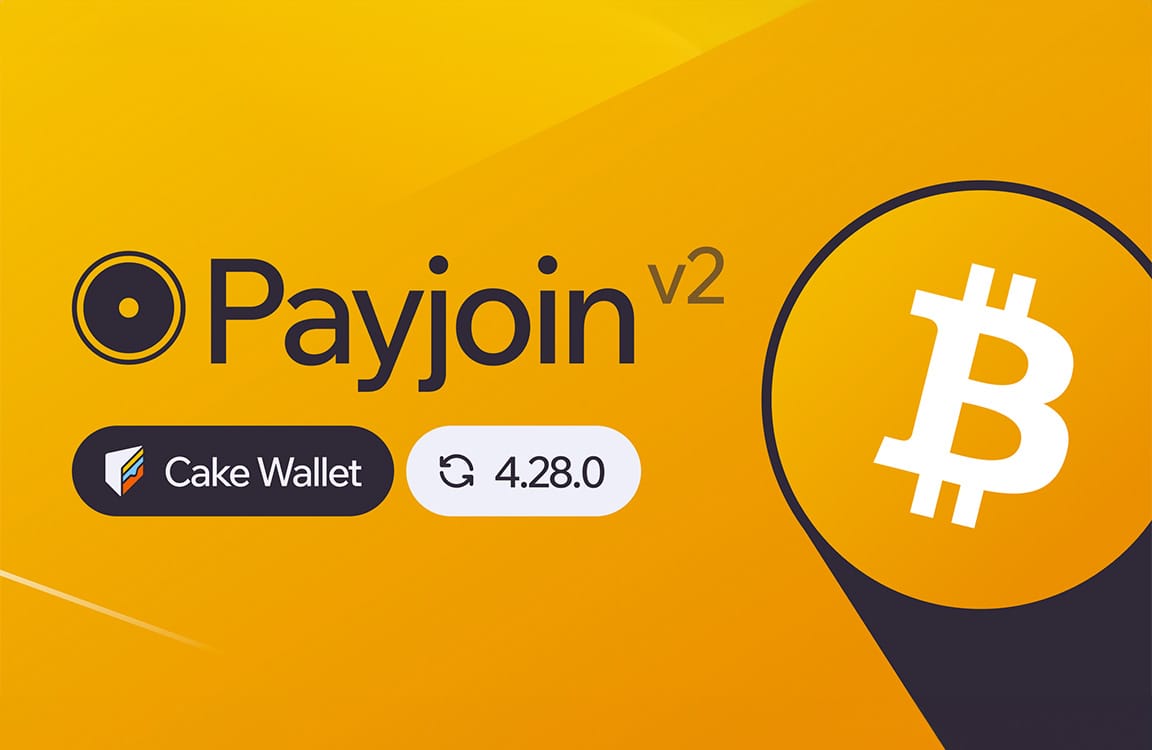
How to started with Payjoin in Cake Wallet:
- Open the app menu sidebar and click
Privacy. - Toggle the
Use Payjoinoption. - Now on your receive screen you'll see an option to copy a Payjoin URL

- Bull Bitcoin Wallet v0.4.0 introduced Payjoin v2 support in late December 2024. However, the current implementations are not interoperable at the moment, an issue that should be addressed in the next release of the Bull Bitcoin Wallet.
- Cake Wallet was one of the first wallets to introduce Silent Payments back in May 2024. However, users may encounter sync issues while using this feature at present, which will be resolved in the next release of Cake Wallet.
What's new
- Payjoin v2 implementation.
- Wallet group improvements: Enhanced management of multiple wallets.
- Various bug fixes: improving overall stability and user experience.
- Monero (XMR) enhancements.
Learn more about using, implementing, and understanding BIP 77: Payjoin Version 2 using the
payjoincrate in Payjoin Dev Kit here. -
 @ 91117f2b:111207d6
2025-06-02 15:50:56
@ 91117f2b:111207d6
2025-06-02 15:50:56
In Nigeria, two popular swallow dishes have been vying for the top spot in the hearts (and stomachs) of food enthusiasts: Semovita and Pounded Yam. Both dishes have their loyal followers, and the debate about which one is better has been ongoing. Let's dive into the world of Nigerian cuisine and explore the characteristics of these two beloved dishes.
Semovita: The Smooth Operator
Semovita is a popular swallow made from semolina flour, which is derived from durum wheat. It's known for its smooth texture and ability to absorb flavors well. Semovita is often served with a variety of soups, including egusi, okra, and vegetable soup. Its neutral flavor makes it a versatile option for pairing with different soups.
Pounded Yam: The Classic
Pounded yam is a traditional Nigerian dish made from boiled yam that has been pounded into a smooth, stretchy dough. It's a staple in many Nigerian households and is often served with soups like egusi, okra, and efo riro. Pounded yam has a distinct texture and flavor that's hard to resist.
The Verdict
So, which one is better? The answer ultimately comes down to personal preference. If you like a smooth, neutral-tasting swallow that absorbs flavors well, Semovita might be the way to go. If you prefer a more traditional, stretchy swallow with a distinct flavor to fill your tum tum, Pounded Yam is the better option.
Tips for Enjoying Both Dishes
- Experiment with different soups to find your favorite pairing.
- Pay attention to the texture and flavor of the swallow.
- Don't be afraid to try new combinations and flavors.
Conclusion
The debate between Semovita and Pounded Yam may never be settled, but one thing is certain: both dishes are delicious and beloved in Nigerian cuisine. Whether you're a fan of Semovita or Pounded Yam, there's no denying the joy of enjoying a warm, satisfying swallow with a flavorful soup.
Which one do you prefer?
Me personally groundnut soup
-
 @ 7f6db517:a4931eda
2025-06-02 14:01:57
@ 7f6db517:a4931eda
2025-06-02 14:01:57
People forget Bear Stearns failed March 2008 - months of denial followed before the public realized how bad the situation was under the surface.
Similar happening now but much larger scale. They did not fix fundamental issues after 2008 - everything is more fragile.
The Fed preemptively bailed out every bank with their BTFP program and First Republic Bank still failed. The second largest bank failure in history.
There will be more failures. There will be more bailouts. Depositors will be "protected" by socializing losses across everyone.
Our President and mainstream financial pundits are currently pretending the banking crisis is over while most banks remain insolvent. There are going to be many more bank failures as this ponzi system unravels.
Unlike 2008, we have the ability to opt out of these broken and corrupt institutions by using bitcoin. Bitcoin held in self custody is unique in its lack of counterparty risk - you do not have to trust a bank or other centralized entity to hold it for you. Bitcoin is also incredibly difficult to change by design since it is not controlled by an individual, company, or government - the supply of dollars will inevitably be inflated to bailout these failing banks but bitcoin supply will remain unchanged. I do not need to convince you that bitcoin provides value - these next few years will convince millions.
If you found this post helpful support my work with bitcoin.

-
 @ 91117f2b:111207d6
2025-06-02 15:37:31
@ 91117f2b:111207d6
2025-06-02 15:37:31
Extroverts are often described as the life of the party, thriving in social situations and feeding off the energy of those around them. But what makes extroverts tick? Let's dive into the world of extroversion and explore the characteristics, strengths, and challenges of being an extrovert.
What is Extroversion?
Extroversion is a personality trait characterized by a tendency to focus on the outside world, drawing energy from social interactions and external stimuli. Extroverts tend to be outgoing, talkative, and sociable, often seeking out new experiences and connections.
Strengths of Extroverts
-
Social Skills: Extroverts tend to be naturally adapt at navigating social situations, building relationships, and communicating effectively.
-
Confidence: Extroverts often exude confidence and charisma, making them more likely to take risks and pursue new opportunities.
-
Networking: Extroverts tend to have large social networks, which can lead to new connections, collaborations, and career opportunities.
Challenges of Extroverts
-
Overstimulation: Extroverts can become overwhelmed by too much social stimulation, leading to burnout and exhaustion.
-
Impulsivity: Extroverts may act impulsively, speaking or acting without fully thinking through the consequences.
-
Depth vs. Breadth: Extroverts may prioritize quantity over quality in their relationships, potentially leading to shallow connections.
Famous Extroverts
-
Entertainers: Many entertainers, such as actors and musicians, are known for their extroverted personalities and charisma.
-
Leaders: Extroverted leaders, such as politicians and CEOs, often excel at inspiring and motivating others.
-
Social Media Influencers: Extroverts may thrive in the world of social media, building large followings and creating engaging content.
Embracing Extroversion
Whether you're an extrovert or know someone who is, understanding the strengths and challenges of extroversion can help you navigate social situations and build meaningful relationships. By embracing their natural tendencies and being mindful of potential pitfalls, extroverts can thrive in their personal and professional lives.
-
-
 @ dfa02707:41ca50e3
2025-06-02 17:02:13
@ dfa02707:41ca50e3
2025-06-02 17:02:13News
- Wallet of Satoshi teases a comeback in the US market with a non-custodial product. According to an announcement on X, the widely popular custodial Lightning wallet is preparing to re-enter the United States market with a non-custodial wallet. It is unclear whether the product will be open-source, but the project has clarified that "there will be no KYC on any Wallet of Satoshi, ever!" Wallet of Satoshi ceased serving customers in the United States in November 2023.
- Vulnerability disclosure: Remote crash due to addr message spam in Bitcoin Core versions before v29. Bitcoin Core developer Antoine Poinsot disclosed an integer overflow bug that crashes a node if spammed with addr messages over an extended period. A fix was released on April 14, 2025, in Bitcoin Core v29.0. The issue is rated Low severity.
- Coinbase Know Your Customer (KYC) data leak. The U.S. Department of Justice, including its Criminal Division in Washington, is investigating a cyberattack on Coinbase. The incident involved cybercriminals attempting to extort $20 million from Coinbase to prevent stolen customer data from being leaked online. Although the data breach affected less than 1% of the exchange's users, Coinbase now faces at least six lawsuits following the revelation that some customer support agents were bribed as part of the extortion scheme.
- Fold has launched Bitcoin Gift Cards, enabling users to purchase bitcoin for personal use or as gifts, redeemable via the Fold app. These cards are currently available on Fold’s website and are planned to expand to major retailers nationwide later this year.
"Our mission is to make bitcoin simple and approachable for everyone. The Bitcoin Gift Card brings bitcoin to millions of Americans in a familiar way. Available at the places people already shop, the Bitcoin Gift Card is the best way to gift bitcoin to others," said Will Reeves, Chairman and CEO of Fold.
- Corporate treasuries hold nearly 1.1 million BTC, representing about 5.5% of the total circulating supply (1,082,164 BTC), per BitcoinTreasuries.net data. Recent purchases include Strategy adding 7,390 BTC (total: 576,230 BTC), Metplanet acquiring 1,004 BTC (total: 7,800 BTC), Tether holding over 100,521 BTC, and XXI Capital, led by Jack Mallers, starting with 31,500 BTC.
- Meanwhile, a group of investors has filed a class action lawsuit against Strategy and its executive Michael Saylor. The lawsuit alleges that Strategy made overly optimistic projections using fair value accounting under new FASB rules while downplaying potential losses.
- The U.S. Senate voted to advance the GENIUS stablecoin bill for further debate before a final vote to pass it. Meanwhile, the House is crafting its own stablecoin legislation to establish a regulatory framework for stablecoins and their issuers in the U.S, reports CoinDesk.
- French 'crypto' entrepreneurs get priority access to emergency police services. French Minister of the Interior, Bruno Retailleau, agreed on measures to enhance security for 'crypto' professionals during a meeting on Friday. This follows a failed kidnapping attempt on Tuesday targeting the family of a cryptocurrency exchange CEO, and two other kidnappings earlier this year.
- Brussels Court declares tracking-based ads illegal in EU. The Brussels Court of Appeal ruled tracking-based online ads illegal in the EU due to an inadequate consent model. Major tech firms like Microsoft, Amazon, Google, and X are affected by the decision, as their consent pop-ups fail to protect privacy in real-time bidding, writes The Record.
- Telegram shares data on 22,777 users in Q1 2025, a significant increase from the 5,826 users' data shared during the same period in 2024. This significant increase follows the arrest of CEO and founder Pavel Durov last year.
- An Australian judge has ruled that Bitcoin is money, potentially exempting it from capital gains tax in the country. If upheld on appeal, this interim decision could lead to taxpayer refunds worth up to $1 billion, per tax lawyer Adrian Cartland.
Use the tools
- Bitcoin Safe v1.3.0 a secure and user-friendly Bitcoin savings wallet for beginners and advanced users, introduces an interactive chart, Child Pays For Parent (CPFP) support, testnet4 compatibility, preconfigured testnet demo wallets, various bug fixes, and other improvements.
- BlueWallet v7.1.8 brings numerous bug fixes, dependency updates, and a new search feature for addresses and transactions.
- Aqua Wallet v0.3.0 is out, offering beta testing for the reloadable Dolphin card (in partnership with Visa) for spending bitcoin and Liquid BTC. It also includes a new Optical Character Recognition (OCR) text scanner to read text addresses like QR codes, colored numbers on addresses for better readability, a reduced minimum for spending and swapping Liquid Bitcoin to 100 sats, plus other fixes and enhancements.

Source: Aqua wallet.
- The latest firmware updates for COLDCARD Mk4 v5.4.3 and Q v1.3.3 are now available, featuring the latest enhancements and bug fixes.
- Nunchuk Android v1.9.68.1 and iOS v1.9.79 introduce support for custom blockchain explorers, wallet archiving, re-ordering wallets on the home screen via long-press, and an anti-fee sniping setting.
- BDK-cli v1.0.0, a CLI wallet library and REPL tool to demo and test the BDK library, now uses bdk_wallet 1.0.0 and integrates Kyoto, utilizing the Kyoto protocol for compact block filters. It sets SQLite as the default database and discontinues support for sled.
- publsp is a new command-line tool designed for Lightning node runners or Lightning Service Providers (LSPs) to advertise liquidity offers over Nostr.
"LSPs advertise liquidity as addressable Kind 39735 events. Clients just pull and evaluate all those structured events, then NIP-17 DM an LSP of their choice to coordinate a liquidity purchase," writes developer smallworlnd.
-
Lightning Blinder by Super Testnet is a proof-of-concept privacy tool for the Lightning Network. It enables users to mislead Lightning Service Providers (LSPs) by making it appear as though one wallet is the sender or recipient, masking the original wallet. Explore and try it out here.
-
Mempal v1.5.3, a Bitcoin mempool monitoring and notification app for Android, now includes a swipe-down feature to refresh the dashboard, a custom time option for widget auto-update frequency, and a
-
 @ dfa02707:41ca50e3
2025-06-02 14:01:54
@ dfa02707:41ca50e3
2025-06-02 14:01:54Contribute to keep No Bullshit Bitcoin news going.
- The latest firmware updates for COLDCARD devices introduce two major features: COLDCARD Co-sign (CCC) and Key Teleport between two COLDCARD Q devices using QR codes and/or NFC with a website.

What's new
- COLDCARD Co-Sign: When CCC is enabled, a second seed called the Spending Policy Key (Key C) is added to the device. This seed works with the device's Main Seed and one or more additional XPUBs (Backup Keys) to form 2-of-N multisig wallets.
- The spending policy functions like a hardware security module (HSM), enforcing rules such as magnitude and velocity limits, address whitelisting, and 2FA authentication to protect funds while maintaining flexibility and control, and is enforced each time the Spending Policy Key is used for signing.
- When spending conditions are met, the COLDCARD signs the partially signed bitcoin transaction (PSBT) with the Main Seed and Spending Policy Key for fund access. Once configured, the Spending Policy Key is required to view or change the policy, and violations are denied without explanation.
"You can override the spending policy at any time by signing with either a Backup Key and the Main Seed or two Backup Keys, depending on the number of keys (N) in the multisig."
-
A step-by-step guide for setting up CCC is available here.
-
Key Teleport for Q devices allows users to securely transfer sensitive data such as seed phrases (words, xprv), secure notes and passwords, and PSBTs for multisig. It uses QR codes or NFC, along with a helper website, to ensure reliable transmission, keeping your sensitive data protected throughout the process.
- For more technical details, see the protocol spec.
"After you sign a multisig PSBT, you have option to “Key Teleport” the PSBT file to any one of the other signers in the wallet. We already have a shared pubkey with them, so the process is simple and does not require any action on their part in advance. Plus, starting in this firmware release, COLDCARD can finalize multisig transactions, so the last signer can publish the signed transaction via PushTX (NFC tap) to get it on the blockchain directly."
- Multisig transactions are finalized when sufficiently signed. It streamlines the use of PushTX with multisig wallets.
- Signing artifacts re-export to various media. Users are now provided with the capability to export signing products, like transactions or PSBTs, to alternative media rather than the original source. For example, if a PSBT is received through a QR code, it can be signed and saved onto an SD card if needed.
- Multisig export files are signed now. Public keys are encoded as P2PKH address for all multisg signature exports. Learn more about it here.
- NFC export usability upgrade: NFC keeps exporting until CANCEL/X is pressed.
- Added Bitcoin Safe option to Export Wallet.
- 10% performance improvement in USB upload speed for large files.
- Q: Always choose the biggest possible display size for QR.
Fixes
- Do not allow change Main PIN to same value already used as Trick PIN, even if Trick PIN is hidden.
- Fix stuck progress bar under
Receiving...after a USB communications failure. - Showing derivation path in Address Explorer for root key (m) showed double slash (//).
- Can restore developer backup with custom password other than 12 words format.
- Virtual Disk auto mode ignores already signed PSBTs (with “-signed” in file name).
- Virtual Disk auto mode stuck on “Reading…” screen sometimes.
- Finalization of foreign inputs from partial signatures. Thanks Christian Uebber!
- Temporary seed from COLDCARD backup failed to load stored multisig wallets.
Destroy Seedalso removes all Trick PINs from SE2.Lock Down Seedrequires pressing confirm key (4) to execute.- Q only: Only BBQr is allowed to export Coldcard, Core, and pretty descriptor.

-
 @ dfa02707:41ca50e3
2025-06-02 11:01:35
@ dfa02707:41ca50e3
2025-06-02 11:01:35Contribute to keep No Bullshit Bitcoin news going.
-
Version 1.3 of Bitcoin Safe introduces a redesigned interactive chart, quick receive feature, updated icons, a mempool preview window, support for Child Pays For Parent (CPFP) and testnet4, preconfigured testnet demo wallets, as well as various bug fixes and improvements.
-
Upcoming updates for Bitcoin Safe include Compact Block Filters.
"Compact Block Filters increase the network privacy dramatically, since you're not asking an electrum server to give you your transactions. They are a little slower than electrum servers. For a savings wallet like Bitcoin Safe this should be OK," writes the project's developer Andreas Griffin.
- Learn more about the current and upcoming features of Bitcoin Safe wallet here.
What's new in v1.3
- Redesign of Chart, Quick Receive, Icons, and Mempool Preview (by @design-rrr).
- Interactive chart. Clicking on it now jumps to transaction, and selected transactions are now highlighted.

- Speed up transactions with Child Pays For Parent (CPFP).
- BDK 1.2 (upgraded from 0.32).
- Testnet4 support.
- Preconfigured Testnet demo wallets.
- Cluster unconfirmed transactions so that parents/children are next to each other.
- Customizable columns for all tables (optional view: Txid, Address index, and more)
- Bug fixes and other improvements.

Announcement / Archive
Blog Post / Archive
GitHub Repo
Website -
-
 @ 84b0c46a:417782f5
2025-06-01 23:36:42
@ 84b0c46a:417782f5
2025-06-01 23:36:425/24 nostr:nevent1qvzqqqqqqypzpvly86xv0ekl7gar8kfp8glfztvftvwrusjsys8qexwmal3sdz6lqywhwumn8ghj7mn0wd68ytnrdakhq6tvv5kk2unjdaezumn9wsq3wamnwvaz7tmwdaehgu3wd968gctwd4hjumt9dcqs6amnwvaz7tmev9382tndv5qjqamnwvaz7tmjv4kxz7fddfczumn0wd68ytnhd9ex2erwv46zu6nsqywhwumn8ghj7un9d3shjtnwdaehgu3wwa5hyetydejhgtn2wqq3zamnwvaz7tmwveex2mrp0yhxzursqyfhwumn8ghj7am0wshxummnw3ezumn9wsqzqxk47yl7vwqu0yrv4fljymp4m2vf0gtesmel4cgg638h82rt4hdn6yyejn
nostr:nevent1qvzqqqqqqypzpvly86xv0ekl7gar8kfp8glfztvftvwrusjsys8qexwmal3sdz6lqyxhwumn8ghj77tpvf6jumt9qys8wumn8ghj7un9d3shjtt2wqhxummnw3ezuamfwfjkgmn9wshx5uqpr4mhxue69uhhyetvv9ujumn0wd68ytnhd9ex2erwv46zu6nsqyghwumn8ghj7mnxwfjkccte9eshquqpzdmhxue69uhhwmm59ehx7um5wghxuet5qqs8msrjypjuvhwaarkq72739wl5rewl49vx0ku6s3u3y03anmau5dscqjj0l
nostr:nevent1qvzqqqqqqypzqnza2du6qe3nnjy0dcgpu0kmr7awunk78m4rtl7x78rxfvay8qlwqyxhwumn8ghj77tpvf6jumt9qys8wumn8ghj7un9d3shjtt2wqhxummnw3ezuamfwfjkgmn9wshx5uqpr4mhxue69uhhyetvv9ujumn0wd68ytnhd9ex2erwv46zu6nsqyghwumn8ghj7mnxwfjkccte9eshquqpzdmhxue69uhhwmm59ehx7um5wghxuet5qqs0fzqwr2xt044zglcwcj3dnnxuk0vlcmwcw0sdzw7yhzfsn009ttss5pv6k
こていたんさんのアイコン

5/25 nostr:nevent1qvzqqqqqqypzqnza2du6qe3nnjy0dcgpu0kmr7awunk78m4rtl7x78rxfvay8qlwqyxhwumn8ghj77tpvf6jumt9qys8wumn8ghj7un9d3shjtt2wqhxummnw3ezuamfwfjkgmn9wshx5uqpr4mhxue69uhhyetvv9ujumn0wd68ytnhd9ex2erwv46zu6nsqyghwumn8ghj7mnxwfjkccte9eshquqpzdmhxue69uhhwmm59ehx7um5wghxuet5qqs0ku3qs4zskmclvtqm0lt707jwn2ylz9v2xj2qakznyp86j4p7fzqd85kfq
nostr:nevent1qvzqqqqqqypzqnza2du6qe3nnjy0dcgpu0kmr7awunk78m4rtl7x78rxfvay8qlwqyxhwumn8ghj77tpvf6jumt9qys8wumn8ghj7un9d3shjtt2wqhxummnw3ezuamfwfjkgmn9wshx5uqpr4mhxue69uhhyetvv9ujumn0wd68ytnhd9ex2erwv46zu6nsqyghwumn8ghj7mnxwfjkccte9eshquqpzdmhxue69uhhwmm59ehx7um5wghxuet5qqs8054fh3l8qtngdfpdwxfl84r36ju3f65zmhjvjy67y7gjj0mhjks2c7w80
nostr:nevent1qvzqqqqqqypzqnza2du6qe3nnjy0dcgpu0kmr7awunk78m4rtl7x78rxfvay8qlwqyxhwumn8ghj77tpvf6jumt9qys8wumn8ghj7un9d3shjtt2wqhxummnw3ezuamfwfjkgmn9wshx5uqpr4mhxue69uhhyetvv9ujumn0wd68ytnhd9ex2erwv46zu6nsqyghwumn8ghj7mnxwfjkccte9eshquqpzdmhxue69uhhwmm59ehx7um5wghxuet5qqsr8nycy3gvjfdn3rqjc49j2gwhwjdhu6d5ms6uxx7y44kzf0u2ftsc8r3c3
nostr:nevent1qvzqqqqqqypzpvly86xv0ekl7gar8kfp8glfztvftvwrusjsys8qexwmal3sdz6lqywhwumn8ghj7mn0wd68ytnrdakhq6tvv5kk2unjdaezumn9wsq3wamnwvaz7tmwdaehgu3wd968gctwd4hjumt9dcqs6amnwvaz7tmev9382tndv5qjqamnwvaz7tmjv4kxz7fddfczumn0wd68ytnhd9ex2erwv46zu6nsqywhwumn8ghj7un9d3shjtnwdaehgu3wwa5hyetydejhgtn2wqq3zamnwvaz7tmwveex2mrp0yhxzursqyfhwumn8ghj7am0wshxummnw3ezumn9wsqzpmcs4xzsusg9s6cn2acasjsam2pwmf6m8h0z08kfca56f8aqwyf2fjwv7w
nostr:nevent1qvzqqqqqqypzphu0pfjqc0lap83f8xv6e73en5zhfjzsrlx6hnk22pewugzhmpa9qqsvh305tpg0xesw6n4eu2kmumgx0mcv0cn64zznyydzpezzsazdugcyrfqm0
nostr:nevent1qvzqqqqqqypzpvly86xv0ekl7gar8kfp8glfztvftvwrusjsys8qexwmal3sdz6lqywhwumn8ghj7mn0wd68ytnrdakhq6tvv5kk2unjdaezumn9wsq3wamnwvaz7tmwdaehgu3wd968gctwd4hjumt9dcqs6amnwvaz7tmev9382tndv5qjqamnwvaz7tmjv4kxz7fddfczumn0wd68ytnhd9ex2erwv46zu6nsqywhwumn8ghj7un9d3shjtnwdaehgu3wwa5hyetydejhgtn2wqq3zamnwvaz7tmwveex2mrp0yhxzursqyfhwumn8ghj7am0wshxummnw3ezumn9wsqzq2aq2l9cq04ygjjk4tq8zfjmuezvckcav8cfqv6z745744nfd2nqlxpq04
nostr:nevent1qvzqqqqqqypzphu0pfjqc0lap83f8xv6e73en5zhfjzsrlx6hnk22pewugzhmpa9qqs05f8xz5uahsdzceq9d0mp860hck3ash8s3ssp3paxxu620tw4ufssk6ntz
nostr:nevent1qvzqqqqqqypzpvly86xv0ekl7gar8kfp8glfztvftvwrusjsys8qexwmal3sdz6lqywhwumn8ghj7mn0wd68ytnrdakhq6tvv5kk2unjdaezumn9wsq3wamnwvaz7tmwdaehgu3wd968gctwd4hjumt9dcqs6amnwvaz7tmev9382tndv5qjqamnwvaz7tmjv4kxz7fddfczumn0wd68ytnhd9ex2erwv46zu6nsqywhwumn8ghj7un9d3shjtnwdaehgu3wwa5hyetydejhgtn2wqq3zamnwvaz7tmwveex2mrp0yhxzursqyfhwumn8ghj7am0wshxummnw3ezumn9wsqzppyeyt0xt0fps85hxv4evdhgy35m9zfzhsqtnq93rsy4arnw3n853sc0u7
nostr:nevent1qvzqqqqqqypzpvly86xv0ekl7gar8kfp8glfztvftvwrusjsys8qexwmal3sdz6lqywhwumn8ghj7mn0wd68ytnrdakhq6tvv5kk2unjdaezumn9wsq3wamnwvaz7tmwdaehgu3wd968gctwd4hjumt9dcqs6amnwvaz7tmev9382tndv5qjqamnwvaz7tmjv4kxz7fddfczumn0wd68ytnhd9ex2erwv46zu6nsqywhwumn8ghj7un9d3shjtnwdaehgu3wwa5hyetydejhgtn2wqq3zamnwvaz7tmwveex2mrp0yhxzursqyfhwumn8ghj7am0wshxummnw3ezumn9wsqzq7emnt7e67h5cygnyvz922x2m4f3x30hpvns3yxls2v4t2uy0vrc6060ek
nostr:nevent1qvzqqqqqqypzplnr7nuypscwtkhtmqaakpyw4cqgtqm5klcyc6qqcmzf6296zrcfqqspu5ny2laxuqtrryffsf455fldpnluw5ladrq32cfveu6mjjgmuxsynheu3
nostr:nevent1qvzqqqqqqypzphla8l7r42mzjvdgevy0pg4y3rd8gupaprgaa7fcdzhrpaddu7lpqqsyhjuxzjkgzp5d8xt8wg8vzekcnaw6ud7htrnqppy2xmpeajrhqncs0rv4c
nostr:nevent1qvzqqqqqqypzphu0pfjqc0lap83f8xv6e73en5zhfjzsrlx6hnk22pewugzhmpa9qqswm6wxhc3h426py80vjm9jj03j8vhvrnhwmalunlxm0pq5xvxqs5qpr2kq7
nostr:nevent1qvzqqqqqqypzplnr7nuypscwtkhtmqaakpyw4cqgtqm5klcyc6qqcmzf6296zrcfqqsgehqf8cl5sp0wfw0fzl982lvhmy9j23vpus70wddtytkr4qygxlchprwv6
nostr:nevent1qvzqqqqqqypzqnza2du6qe3nnjy0dcgpu0kmr7awunk78m4rtl7x78rxfvay8qlwqqsvkrvnh8lzw4rfx87278rwxp2uymej2alputzn2nl525p85c3703cmrgkfn
nostr:nevent1qvzqqqqqqypzqnza2du6qe3nnjy0dcgpu0kmr7awunk78m4rtl7x78rxfvay8qlwqyxhwumn8ghj77tpvf6jumt9qys8wumn8ghj7un9d3shjtt2wqhxummnw3ezuamfwfjkgmn9wshx5uqpz9mhxue69uhkuenjv4kxz7fwv9c8qqgawaehxw309aex2mrp0yhxummnw3ezuamfwfjkgmn9wshx5uqpzdmhxue69uhhwmm59ehx7um5wghxuet5qqsf2u5larth503yh236mhssn2tes4shvawnv4kufzh3889cr9dt4wculcv6w
nostr:nevent1qvzqqqqqqypzqnza2du6qe3nnjy0dcgpu0kmr7awunk78m4rtl7x78rxfvay8qlwqqspnfvau4ylywwk2f7nrm68ue6c86j9p4y0cu4parfwapun0nsw97sad9jwf
nostr:nevent1qvzqqqqqqypzplnr7nuypscwtkhtmqaakpyw4cqgtqm5klcyc6qqcmzf6296zrcfqqs2y7lha9uy30wwdt9yn47s6krqv3e8duj6nqrl27e2s6dl465xssg5gt4ue
nostr:nevent1qvzqqqqqqypzplnr7nuypscwtkhtmqaakpyw4cqgtqm5klcyc6qqcmzf6296zrcfqqsyf8peg4zggp858zfha6dt4mjxss4nhc3k4szqynh0u53j22asx6sdhpfwc
nostr:nevent1qvzqqqqqqypzphla8l7r42mzjvdgevy0pg4y3rd8gupaprgaa7fcdzhrpaddu7lpqqsr0s5ger5l8aapw63yyve5sne5rge0ractks4v4l0yn3ezcvq3f4s8wthq8
nostr:nevent1qvzqqqqqqypzphu0pfjqc0lap83f8xv6e73en5zhfjzsrlx6hnk22pewugzhmpa9qqs93gfz3kskw2lcxadwu3dvanyq7xstaj39vfqmppnng0nvz5gjm8syq9p8p
nostr:nevent1qvzqqqqqqypzpvly86xv0ekl7gar8kfp8glfztvftvwrusjsys8qexwmal3sdz6lqywhwumn8ghj7mn0wd68ytnrdakhq6tvv5kk2unjdaezumn9wsq3wamnwvaz7tmwdaehgu3wd968gctwd4hjumt9dcqs6amnwvaz7tmev9382tndv5qjqamnwvaz7tmjv4kxz7fddfczumn0wd68ytnhd9ex2erwv46zu6nsqywhwumn8ghj7un9d3shjtnwdaehgu3wwa5hyetydejhgtn2wqq3zamnwvaz7tmwveex2mrp0yhxzursqyfhwumn8ghj7am0wshxummnw3ezumn9wsqzp5tlgnw663dswldulvnvgczfr08aflg35cu2syaaddmppvjytvn09tc679
nostr:nevent1qvzqqqqqqypzpe30ylfgzj39zuwyvmfdwcf26xsxdkcnv26wykwmtsrkl8nty89hqqswq489vn7h9hz2q0w60m05wn5xuqd0vvnqcxwxkewmh7h72yjtrrc6yulf2
nostr:nevent1qvzqqqqqqypzpvly86xv0ekl7gar8kfp8glfztvftvwrusjsys8qexwmal3sdz6lqywhwumn8ghj7mn0wd68ytnrdakhq6tvv5kk2unjdaezumn9wsq3wamnwvaz7tmwdaehgu3wd968gctwd4hjumt9dcqs6amnwvaz7tmev9382tndv5qjqamnwvaz7tmjv4kxz7fddfczumn0wd68ytnhd9ex2erwv46zu6nsqywhwumn8ghj7un9d3shjtnwdaehgu3wwa5hyetydejhgtn2wqq3zamnwvaz7tmwveex2mrp0yhxzursqyfhwumn8ghj7am0wshxummnw3ezumn9wsqzqzcyhx8d350shzfczewxkhxemqknfeu5z8kj0arrur9wn726k5hjayfwl6
nostr:nevent1qvzqqqqqqypzplnr7nuypscwtkhtmqaakpyw4cqgtqm5klcyc6qqcmzf6296zrcfqqsrnvmc5r2rs6jx7z8v3gvnzpkfsc3vqqxg0ygnk8wn3jmulzq887q07smq2
nostr:nevent1qvzqqqqqqypzpvly86xv0ekl7gar8kfp8glfztvftvwrusjsys8qexwmal3sdz6lqywhwumn8ghj7mn0wd68ytnrdakhq6tvv5kk2unjdaezumn9wsq3wamnwvaz7tmwdaehgu3wd968gctwd4hjumt9dcqs6amnwvaz7tmev9382tndv5qjqamnwvaz7tmjv4kxz7fddfczumn0wd68ytnhd9ex2erwv46zu6nsqywhwumn8ghj7un9d3shjtnwdaehgu3wwa5hyetydejhgtn2wqq3zamnwvaz7tmwveex2mrp0yhxzursqyfhwumn8ghj7am0wshxummnw3ezumn9wsqzqzk0lg9aq8yzg0m4dcqp5a0a468c3jmtcw058hvckt6yj0nlnl0mqfgav7
nostr:nevent1qvzqqqqqqypzpu89j3vdtkj0cec9mzs4hcmetfq5a9d6fw5smezlpyqhme90uq27qqsf4js8wu9zlp74kj5erkwsq9rvhj0d6xmynevt4tsa766nsvja04gsrfaz5
nostr:nevent1qvzqqqqqqypzpu89j3vdtkj0cec9mzs4hcmetfq5a9d6fw5smezlpyqhme90uq27qqsqky2uqkzu60f3tkcttx59q675sxmd9ypyppnd50ukmhlx3qwrqfgmmxmjh
nostr:nevent1qvzqqqqqqypzq6lj6gusf8gqyqgj2s0vzjyw3fgj9ufhqdefn8fsvljn6vdjq69hqqsvtkn6rkgmttjzzm3nn58d85eve5834pnamzhy0u4p584jger8uvgttcqhe
nostr:nevent1qvzqqqqqqypzq6mwr88y02ghe0sn5elwkszn4xesreuwexg5z0n42j2npz8dvtfmqqstua4ssqq9wejs4kjvjjs0azlzjftt6qgh8l80msn2zd8k0nxw5ccnv7p2w
nostr:nevent1qvzqqqqqqypzq6lj6gusf8gqyqgj2s0vzjyw3fgj9ufhqdefn8fsvljn6vdjq69hqqsywfl8gfpxkynq54ju27aa5rqd0mjz9lx2haqzaszelm3vhlfa5mc3n0hkj
nostr:nevent1qvzqqqqqqypzq6mwr88y02ghe0sn5elwkszn4xesreuwexg5z0n42j2npz8dvtfmqqs86az8q8zd9wevcnnw6rcrg6edc3jfzff6sza572a25yywr477s9g4yfrq0
nostr:nevent1qvzqqqqqqypzprzeywf3jcmljlsq0kks66q7vh8rtvdvuvemv20z6vlegewpxfsgqqsq47mwcs7kpylrqwkyec76839nwrk09cx33s3lwdv88e34fkx4hdqf2sa8r
nostr:nevent1qvzqqqqqqypzq6mwr88y02ghe0sn5elwkszn4xesreuwexg5z0n42j2npz8dvtfmqqsxykjsdzg9nnaweajftl4g33amcdh4wjmdq3y30w6fu555e3xpm2c2n4wah
nostr:nevent1qvzqqqqqqypzprzeywf3jcmljlsq0kks66q7vh8rtvdvuvemv20z6vlegewpxfsgqqs9cgpau6l4rfmhkwav4jsjhxjwpgehyhuw3c39q46v23q75qdjfssp3jr0k
nostr:nevent1qvzqqqqqqypzq6mwr88y02ghe0sn5elwkszn4xesreuwexg5z0n42j2npz8dvtfmqqsxrzydard7yz0cp79uk30u9g7wv0nq9sfw36e7f5tefd7z7vfezvsq7kqy4
nostr:nevent1qvzqqqqqqypzpvgsp0c85zgh8rcf2683v7s058fzspcqt0em5ednf8z9c3q5qy5fqqsghpetrx0lkxd4d79vk90h66vln5pd9lklh64sk8qa75a453g20jc3j3q9y
nostr:nevent1qvzqqqqqqypzpvgsp0c85zgh8rcf2683v7s058fzspcqt0em5ednf8z9c3q5qy5fqqsxrmm05rgdzdpthuh9zmk7jf9jmhu0jfty6kf5v8s2f8252683drgf6m79g
nostr:nevent1qvzqqqqqqypzpdc866l8lkwvncdwaqlgrsueg9tvlnm5mm2mpyg3jv8aam445rpqqqswcp6exyy0f9sgpypzlc4dx40equyxeyhwskzgeks78r9rp54w7hc05v93n
nostr:nevent1qvzqqqqqqypzpvly86xv0ekl7gar8kfp8glfztvftvwrusjsys8qexwmal3sdz6lqyxhwumn8ghj77tpvf6jumt9qys8wumn8ghj7un9d3shjtt2wqhxummnw3ezuamfwfjkgmn9wshx5uqpr4mhxue69uhhyetvv9ujumn0wd68ytnhd9ex2erwv46zu6nsqyghwumn8ghj7mnxwfjkccte9eshquqpzdmhxue69uhhwmm59ehx7um5wghxuet5qqstvk6q4xwtd7evpzggkcngqhlk5gktme0sj6235nuf0axxxngktpc88gqd7
nostr:nevent1qvzqqqqqqypzq6lj6gusf8gqyqgj2s0vzjyw3fgj9ufhqdefn8fsvljn6vdjq69hqqswfythwf02x6ekjpfdrucd6cx6su2t3uq3td45d4v0xrucfphy38cn0mmw2
nostr:nevent1qvzqqqqqqypzqu3j6ujahw4eezqm9gn2lz8av5waj9ek9fcwclfsrq5kc63zla2wqqsxpddg7lf4yqmpeg9z82flqa8fzpfcwmn4qfluvy95p03l8pjud2cfjx43u
nostr:nevent1qvzqqqqqqypzpq4np5cygstsu65vsx0ggphrv23kj4z553sh39xwyur08pqvdsqrqqsxzm8fx8aaprn533e0c44edf60lw73a6z5vzzumzd6edttgl0uawgn4kgp2
nostr:nevent1qvzqqqqqqypzpq4np5cygstsu65vsx0ggphrv23kj4z553sh39xwyur08pqvdsqrqqs88tvfyn6h8ls3h2994nmpykj2zc2l90vqwj8epzwfjnz2dy0mcjqyhsms5
nostr:nevent1qvzqqqqqqypzqt7zjsv2gxscw5l9d6k8j5agctlm6rr3rz3c6mar4eqmn69uu6c2qqsdavnxvhtlnkamt8cap09aan7mu2z364ltmeh8u747nvvj60h5jcsyf3hjz
nostr:nevent1qvzqqqqqqypzq6mwr88y02ghe0sn5elwkszn4xesreuwexg5z0n42j2npz8dvtfmqqsq86a0sr2h0p4qfesv00ztyqpdw545rsnq2nmq9quafahwxp8elhckws7wh
nostr:nevent1qvzqqqqqqypzqf4m96ldd32j6ecvsp9s6e2jv7euvc4jrcpx6mjg4jf6vpc9xz2cqqsqp3ugj5y8epkjyh62cfnm4gen27nhq055668glhgzjm87p64ep5sgqgawl
nostr:nevent1qvzqqqqqqypzqcmflwpta32zy6lsnwektdhs6ud3d3ql2mn7ml20jl0z87wr9qw6qqsfagdtz0ldem963wwelh2lc8d4qkuxlmfq0j62qwt6lrkvd8v36squ8d4k8
nostr:nevent1qvzqqqqqqypzpvj726mjcemd4uhpyutaykvsm0y54n5fzte5mhgtv46vhg8lunhfqqsgrrj849xmqpvdx6h9554gnetguxzz2ad8fqvpmvhm0zy85m4pl8swnyg5s
nostr:nevent1qvzqqqqqqypzq6lj6gusf8gqyqgj2s0vzjyw3fgj9ufhqdefn8fsvljn6vdjq69hqqs2n5mz6j5yft327mld352hazjwfrla3w92gpzuvmpgffjttsqyq6qgu5dwe
nostr:nevent1qvzqqqqqqypzq6mwr88y02ghe0sn5elwkszn4xesreuwexg5z0n42j2npz8dvtfmqqsz6wr7cnewt7t7vt4t2c28jtmppu832vs2syacv0sy8lcn28075ss277lty
nostr:nevent1qvzqqqqqqypzplnr7nuypscwtkhtmqaakpyw4cqgtqm5klcyc6qqcmzf6296zrcfqqsdrt35drfatmhl795f36em4yy7gsaasr3xkvgmdwswr7f87rcrmuc7z7kf8
nostr:nevent1qvzqqqqqqypzpvj726mjcemd4uhpyutaykvsm0y54n5fzte5mhgtv46vhg8lunhfqqsrl6c8gu74vkwa5ahlsycxjx40a3gzrx6uxm0qmpa35nrnd7ntysc4d6llh
nostr:nevent1qvzqqqqqqypzqwyu5j2hjyd3ycyn7s4q4yrcv52mtyc3m3dfg26qf4lpdutjs7pgqqsq945chuafedqk95uglwl3xumcuvjcdgz66ykd840hfsa4xpp6dgqa9vsft
nostr:nevent1qvzqqqqqqypzqf4m96ldd32j6ecvsp9s6e2jv7euvc4jrcpx6mjg4jf6vpc9xz2cqqsynxwgyy8nsu2r3dx8f37hww6keemkhh962ghq45umlxz2khemytgzv08n4
nostr:nevent1qvzqqqqqqypzqyrx5pw3ga88uye6jusg5h93w75uq8jts8c0zsms44vlfg9yw45pqyxhwumn8ghj77tpvf6jumt9qywhwumn8ghj7un9d3shjtnwdaehgu3wwa5hyetydejhgtn2wqq3vamnwvaz7tmnv4shycmg9ehx7ueww3hkgcteqqsdex6xy8kq8l64c0gq606yguaqn8fxrsyl67m6ld5cctxxwe79jpcsmxhh6
nostr:nevent1qvzqqqqqqypzpj7tpc9kqtkr4xklc62kh7lru27pydu7uyals5zuu303eqca9ef2qyt8wumn8ghj7um9v9exx6pwdehhxtn5dajxz7gpzemhxue69uhhyetvv9ujumn0wd68ytnzv9hxgqpq7gkdqqukguh3r79yfxcy9tsxpx348wqys6q8v3njfyqj4vga727sh9cfpt
5/26 nostr:nevent1qvzqqqqqqypzpq4np5cygstsu65vsx0ggphrv23kj4z553sh39xwyur08pqvdsqrqyxhwumn8ghj77tpvf6jumt9qywhwumn8ghj7un9d3shjtnwdaehgu3wwa5hyetydejhgtn2wqq3vamnwvaz7tmnv4shycmg9ehx7ueww3hkgcteqqspk6e9e9wph23lt7xumuuu90rayzcswp3gz96c3w25raq9r9agw5cnfgve5
nostr:nevent1qvzqqqqqqypzpp9sc34tdxdvxh4jeg5xgu9ctcypmvsg0n00vwfjydkrjaqh0qh4qyxhwumn8ghj77tpvf6jumt9qywhwumn8ghj7un9d3shjtnwdaehgu3wwa5hyetydejhgtn2wqq3vamnwvaz7tmnv4shycmg9ehx7ueww3hkgcteqqsfnspcp9yqu989mnnpwj9tphrrj05268vjkwwmx7jcus4mn7erqngl94f9y
nostr:nevent1qvzqqqqqqypzpp9sc34tdxdvxh4jeg5xgu9ctcypmvsg0n00vwfjydkrjaqh0qh4qyxhwumn8ghj77tpvf6jumt9qywhwumn8ghj7un9d3shjtnwdaehgu3wwa5hyetydejhgtn2wqq3vamnwvaz7tmnv4shycmg9ehx7ueww3hkgcteqqs84x0ws9myccv29kf99jkuwqh8rj9ws23kn5s9yyl0scz67m97z2g7rq7z5
nostr:nevent1qvzqqqqqqypzphu0pfjqc0lap83f8xv6e73en5zhfjzsrlx6hnk22pewugzhmpa9qyg8wumn8ghj7mn0wd68ytnhd9hx2qgkwaehxw309aek2ctjvd5zumn0wvh8gmmyv9usz9nhwden5te0wfjkccte9ehx7um5wghxyctwvsqzqk76agahvd3t5lutvkuj69pccwrurey3fws0kjnrsemwlx9ntvwukkjfk6
nostr:nevent1qvzqqqqqqypzqrqykrtju88xhdq0an0vdnccdfvrmqr8da0n8p5fs8reaczhxmpeqyxhwumn8ghj77tpvf6jumt9qywhwumn8ghj7un9d3shjtnwdaehgu3wwa5hyetydejhgtn2wqq3vamnwvaz7tmnv4shycmg9ehx7ueww3hkgcteqyt8wumn8ghj7un9d3shjtnwdaehgu3wvfskueqqyz3twtpw08v554hph0j6wpk598rd677pfa460y2pcdd2064aaevjwe74erq
nostr:nevent1qvzqqqqqqypzqx34k480waf274x2e0hd7re5nceq7z3wu5q59zp3xnp7uvv8nnn3qyxhwumn8ghj77tpvf6jumt9qywhwumn8ghj7un9d3shjtnwdaehgu3wwa5hyetydejhgtn2wqq3vamnwvaz7tmnv4shycmg9ehx7ueww3hkgcteqyt8wumn8ghj7un9d3shjtnwdaehgu3wvfskueqqyp59rw9n380w5kvdth9qefc28xsrt99l33tmfgvq02kut3dnepk6zr7ng2t
nostr:nevent1qvzqqqqqqypzplnr7nuypscwtkhtmqaakpyw4cqgtqm5klcyc6qqcmzf6296zrcfqyxhwumn8ghj77tpvf6jumt9qywhwumn8ghj7un9d3shjtnwdaehgu3wwa5hyetydejhgtn2wqq3vamnwvaz7tmnv4shycmg9ehx7ueww3hkgcteqyt8wumn8ghj7un9d3shjtnwdaehgu3wvfskueqqyq8q2qcfne76j4c9y794xz9g5unuxhf98deh3mupmnwpn33mwlxhzmxuefq
nostr:nevent1qvzqqqqqqypzpmzzcaj5rzeah8y940ln4z855wa72af4a6aac4zjypql55egcpsqqyt8wumn8ghj7um9v9exx6pwdehhxtn5dajxz7gpzemhxue69uhhyetvv9ujumn0wd68ytnzv9hxgqpqscswkz2s03r6yhz0yz40h634nkf2j2vpkvqd3vk5rl7lgaj9unns7qz3ms
nostr:nevent1qvzqqqqqqypzprfe5ru6zvakym6hq5eycwdr2vx2q8awzaaw8wu9mq4wlek8yhenqyxhwumn8ghj77tpvf6jumt9qywhwumn8ghj7un9d3shjtnwdaehgu3wwa5hyetydejhgtn2wqq3vamnwvaz7tmnv4shycmg9ehx7ueww3hkgcteqyt8wumn8ghj7un9d3shjtnwdaehgu3wvfskueqqyqr5njtg8f5xdm52p3k9mugfqk3zuc0ycsxaj6j5uf4amkrdt3ymq8kuyhj
nostr:nevent1qvzqqqqqqypzq0363fpyt2sgytq9p3pduzch6rlrp4z8e6swvzr72km83pg76qmnqyxhwumn8ghj77tpvf6jumt9qywhwumn8ghj7un9d3shjtnwdaehgu3wwa5hyetydejhgtn2wqq3vamnwvaz7tmnv4shycmg9ehx7ueww3hkgcteqyt8wumn8ghj7un9d3shjtnwdaehgu3wvfskueqqyrj0xgrrwr2meuurst5lsqn744wt6uxhfmyralknm7cl57lsapcrkunqcnn
nostr:nevent1qvzqqqqqqypzqf57dat64x3qpjq5u6ucwgvpnh0q8r9xpspepwrmvkxnqz4k6rgyqyt8wumn8ghj7un9d3shjtnwdaehgu3wvfskueqqyq2yn3cjlmns8ttaam8ev2rn3csm26wnwhe3ccvk8s5e8x6ejyykql8em9d
nostr:nevent1qvzqqqqqqypzqx34k480waf274x2e0hd7re5nceq7z3wu5q59zp3xnp7uvv8nnn3qyxhwumn8ghj77tpvf6jumt9qywhwumn8ghj7un9d3shjtnwdaehgu3wwa5hyetydejhgtn2wqq3vamnwvaz7tmnv4shycmg9ehx7ueww3hkgcteqyt8wumn8ghj7un9d3shjtnwdaehgu3wvfskueqqyqu2p8vtuwvxmzqh7mlq2lp3xel8z9l0xg5e3hyxjlwamsm0p3pvq9qh4d0
nostr:nevent1qvzqqqqqqypzpvly86xv0ekl7gar8kfp8glfztvftvwrusjsys8qexwmal3sdz6lqyxhwumn8ghj77tpvf6jumt9qys8wumn8ghj7un9d3shjtt2wqhxummnw3ezuamfwfjkgmn9wshx5uqpr4mhxue69uhhyetvv9ujumn0wd68ytnhd9ex2erwv46zu6nsqyghwumn8ghj7mnxwfjkccte9eshquqpzdmhxue69uhhwmm59ehx7um5wghxuet5qqsr9tpqqfeke4qt9xlg6m34446dpd844myrw9cc4tmqcrf3xfp9yqsxa05hf
nostr:nevent1qvzqqqqqqypzpp9sc34tdxdvxh4jeg5xgu9ctcypmvsg0n00vwfjydkrjaqh0qh4qyxhwumn8ghj77tpvf6jumt9qywhwumn8ghj7un9d3shjtnwdaehgu3wwa5hyetydejhgtn2wqq3vamnwvaz7tmnv4shycmg9ehx7ueww3hkgcteqyt8wumn8ghj7un9d3shjtnwdaehgu3wvfskueqqypyaj8uyahtgwf5evyk5deqx90udyrmxff99gqskfcl3eqh0mgmw6nlnlud
nostr:nevent1qvzqqqqqqypzpvly86xv0ekl7gar8kfp8glfztvftvwrusjsys8qexwmal3sdz6lqyxhwumn8ghj77tpvf6jumt9qys8wumn8ghj7un9d3shjtt2wqhxummnw3ezuamfwfjkgmn9wshx5uqpr4mhxue69uhhyetvv9ujumn0wd68ytnhd9ex2erwv46zu6nsqyghwumn8ghj7mnxwfjkccte9eshquqpzdmhxue69uhhwmm59ehx7um5wghxuet5qqsdpy08r0758lz0js2zpk5fe5mpqxd349mdqxg2vk3y7azlme2ysqqm8uy75
nostr:nevent1qvzqqqqqqypzpvly86xv0ekl7gar8kfp8glfztvftvwrusjsys8qexwmal3sdz6lqyxhwumn8ghj77tpvf6jumt9qys8wumn8ghj7un9d3shjtt2wqhxummnw3ezuamfwfjkgmn9wshx5uqpr4mhxue69uhhyetvv9ujumn0wd68ytnhd9ex2erwv46zu6nsqyghwumn8ghj7mnxwfjkccte9eshquqpzdmhxue69uhhwmm59ehx7um5wghxuet5qqs8s0r7c908mmhxk090zvmlajfgswwcnmwxj34dtqjpyxry0tmumagcmm29s
nostr:nevent1qvzqqqqqqypzpvly86xv0ekl7gar8kfp8glfztvftvwrusjsys8qexwmal3sdz6lqyxhwumn8ghj77tpvf6jumt9qys8wumn8ghj7un9d3shjtt2wqhxummnw3ezuamfwfjkgmn9wshx5uqpr4mhxue69uhhyetvv9ujumn0wd68ytnhd9ex2erwv46zu6nsqyghwumn8ghj7mnxwfjkccte9eshquqpzdmhxue69uhhwmm59ehx7um5wghxuet5qqs0x6pgm96r70y8836l0d5ajj6nrlq6p5fz06wdu26fkpg3gznctscf5ggxn
5/27 nostr:nevent1qvzqqqqqqypzqxlwemj4760tc2ysgqmqdu5tt68th2er6gn8xrsjkjlhvtff6gtzqyt8wumn8ghj7um9v9exx6pwdehhxtn5dajxz7gpzemhxue69uhhyetvv9ujumn0wd68ytnzv9hxgqpqlq0lp52xg7uv4wwzuqy9yhtmcpy5v8ad8v7ft9xcwkdncd97h66q0wmawu
nostr:nevent1qvzqqqqqqypzpq4np5cygstsu65vsx0ggphrv23kj4z553sh39xwyur08pqvdsqrqyt8wumn8ghj7um9v9exx6pwdehhxtn5dajxz7gpzemhxue69uhhyetvv9ujumn0wd68ytnzv9hxgqpqpt2wncdxkptxyhj025vd53vjpxz3hjs452px7y8g6gzsxmnfw2fsp2rv0k
KAZもさん nostr:nevent1qvzqqqqqqypzpvly86xv0ekl7gar8kfp8glfztvftvwrusjsys8qexwmal3sdz6lqywhwumn8ghj7mn0wd68ytnrdakhq6tvv5kk2unjdaezumn9wsq3wamnwvaz7tmwdaehgu3wd968gctwd4hjumt9dcqs6amnwvaz7tmev9382tndv5qjqamnwvaz7tmjv4kxz7fddfczumn0wd68ytnhd9ex2erwv46zu6nsqywhwumn8ghj7un9d3shjtnwdaehgu3wwa5hyetydejhgtn2wqq3zamnwvaz7tmwveex2mrp0yhxzursqyfhwumn8ghj7am0wshxummnw3ezumn9wsqzpk3nll8rr3sj6adsrfrlgjpj4cyn2sg9rmlz9m2djwk5zp2ku80czfr460
5/28 kaijiさん nostr:nevent1qvzqqqqqqypzpvly86xv0ekl7gar8kfp8glfztvftvwrusjsys8qexwmal3sdz6lqyxhwumn8ghj77tpvf6jumt9qywhwumn8ghj7mn0wd68ytnrdakhq6tvv5kk2unjdaezumn9wsqjqamnwvaz7tmjv4kxz7fddfczumn0wd68ytnhd9ex2erwv46zu6nsqywhwumn8ghj7un9d3shjtnwdaehgu3wwa5hyetydejhgtn2wqq3zamnwvaz7tmwveex2mrp0yhxzursqythwumn8ghj7mn0wd68ytnfw36xzmndduhx6etwqyfhwumn8ghj7am0wshxummnw3ezumn9wsqzpt7w33qv7tlywj0wphremkdft6dpnv3z8mvw0t2pdxcgvlzw6sathjmz0v
マルフォイ nostr:nevent1qvzqqqqqqypzpvly86xv0ekl7gar8kfp8glfztvftvwrusjsys8qexwmal3sdz6lqyw8wumn8ghj7umjw3ex2mrp0yhxxttnw3jkcmrpwghxuet5qyxhwumn8ghj77tpvf6jumt9qys8wumn8ghj7un9d3shjtt2wqhxummnw3ezuamfwfjkgmn9wshx5uqpr4mhxue69uhhyetvv9ujumn0wd68ytnhd9ex2erwv46zu6nsqyghwumn8ghj7mnxwfjkccte9eshquqpzdmhxue69uhhwmm59ehx7um5wghxuet5qqs8r0frcfwqkgpefhd0knjurekna8ztnq69432f3k00wccd0vcrl5c6qr3gh
5/29 nostr:nevent1qvzqqqqqqypzqrec47eremps2u8wvnu6f2sfjg5njhkrxuw9l6r8uzwfzy2gqq2aqyxhwumn8ghj77tpvf6jumt9qywhwumn8ghj7un9d3shjtnwdaehgu3wwa5hyetydejhgtn2wqq3vamnwvaz7tmjv4kxz7fwdehhxarj9e3xzmnyqqsp2c6xh22lfj2ccy95lqu584hfpfz0ds7w2llnf4sv2qs445yqcgqmgwq57
nostr:nevent1qvzqqqqqqypzphu0pfjqc0lap83f8xv6e73en5zhfjzsrlx6hnk22pewugzhmpa9qyt8wumn8ghj7um9v9exx6pwdehhxtn5dajxz7gpzemhxue69uhhyetvv9ujumn0wd68ytnzv9hxgqpqt43r3wtjkr5ezxay6dh7jq94nelduvsk07w5ufxrver5f6jfggksakz9e8
nostr:nevent1qvzqqqqqqypzqyqmxrhg3sn6z00x30mu3srrdr4ru05rweq4jhqcvat805v2g6j9qyxhwumn8ghj77tpvf6jumt9qywhwumn8ghj7un9d3shjtnwdaehgu3wwa5hyetydejhgtn2wqqjqamnwvaz7tmjv4kxz7fddfczumn0wd68ytnhd9ex2erwv46zu6nsqyghwumn8ghj7mnxwfjkccte9eshquqpz4mhxue69uhhyetvv9ujumt0wd68ytnsw43qzymhwden5te0wahhgtnwdaehgu3wdejhgqpqn6n7xrrmk40ucmh9m5ktae58xjqz6h7epj6mcffpcmuhgpysvv6snh5vf5
nostr:nevent1qvzqqqqqqypzpk28l9nyyf4av8f8j8jhh8k60mt2sc643ux2td3n547kvk4lrsglqyt8wumn8ghj7um9v9exx6pwdehhxtn5dajxz7gpzemhxue69uhhyetvv9ujumn0wd68ytnzv9hxgqpq6gv8avhe93ypvypd66rmn34760s3sldj3x2cz5w4yu2xy9z8tt2qadd7kl
nostr:nevent1qvzqqqqqqypzpk28l9nyyf4av8f8j8jhh8k60mt2sc643ux2td3n547kvk4lrsglqyt8wumn8ghj7um9v9exx6pwdehhxtn5dajxz7gpzemhxue69uhhyetvv9ujumn0wd68ytnzv9hxgqpqn2pfqkgcfk3cdhtvkqqlfycsy2j2xe6c6jz8gzfxlnddnq8jq6vqecuvwy
nostr:nevent1qvzqqqqqqypzpug7j8zm7jr0hjunpkpgz8gzdvgn5h8mw77g4wg58xnmsav6pvz2qqspds662qvcpz995r5rx39wzncyzcx3q5zfpe8ztgx4zdwy9znvu9cv28mya
5/30 nostr:nevent1qvzqqqqqqypzp54kkqfyshkxm078mpzygmfxpqfq6fwu2njry424strce6dmvhwyqqstc5jak2vax4uejyrmu2td3w0spv6k4mds9sfwqtvmh0hwaa3eststwmtzt
nostr:nevent1qvzqqqqqqypzp54kkqfyshkxm078mpzygmfxpqfq6fwu2njry424strce6dmvhwyqqs9v75spmgrxngfn805q5d9fsqa562a8240xkr6z3kvkszkra9plvsgm2qw4
nostr:nevent1qvzqqqqqqypzp62ezs5gz04adyt8xmyghw2ej3yk7eradlnknmuysd5ha2udqnfdqyxhwumn8ghj77tpvf6jumt9qywhwumn8ghj7un9d3shjtnwdaehgu3wwa5hyetydejhgtn2wqqjqamnwvaz7tmjv4kxz7fddfczumn0wd68ytnhd9ex2erwv46zu6nsqyghwumn8ghj7mnxwfjkccte9eshquqpzdmhxue69uhhwmm59ehx7um5wghxuet5qqswy0smsrukck33hfhavscvs68pg9m4d859np8pkgvrc49kwjzr4ac0cwhea
nostr:nevent1qvzqqqqqqypzpc9ge0t4a0lya7a63fjl749mgdv9ssz0dhqt5jnytz3y6lmy9525qyxhwumn8ghj77tpvf6jumt9qywhwumn8ghj7un9d3shjtnwdaehgu3wwa5hyetydejhgtn2wqqjqamnwvaz7tmjv4kxz7fddfczumn0wd68ytnhd9ex2erwv46zu6nsqyghwumn8ghj7mnxwfjkccte9eshquqpz4mhxue69uhhyetvv9ujumt0wd68ytnsw43qzymhwden5te0wahhgtnwdaehgu3wdejhgqpqeunx8pj5hc255wqu4ea9cgz6cptjvcx6jk8yfd8u55smjl6y8z9sepz5xt
nostr:nevent1qvzqqqqqqypzp62ezs5gz04adyt8xmyghw2ej3yk7eradlnknmuysd5ha2udqnfdqyxhwumn8ghj77tpvf6jumt9qywhwumn8ghj7un9d3shjtnwdaehgu3wwa5hyetydejhgtn2wqqjqamnwvaz7tmjv4kxz7fddfczumn0wd68ytnhd9ex2erwv46zu6nsqyghwumn8ghj7mnxwfjkccte9eshquqpzdmhxue69uhhwmm59ehx7um5wghxuet5qqst07pk8637lvs5vjnp00quzhcsx8ghran90nsm6sycnm3a626lnqqw0py8w
nostr:nevent1qvzqqqqqqypzp62ezs5gz04adyt8xmyghw2ej3yk7eradlnknmuysd5ha2udqnfdqyxhwumn8ghj77tpvf6jumt9qyw8wumn8ghj7umjw3ex2mrp0yhxxttnw3jkcmrpwghxuet5qys8wumn8ghj7un9d3shjtt2wqhxummnw3ezuamfwfjkgmn9wshx5uqpr4mhxue69uhhyetvv9ujumn0wd68ytnhd9ex2erwv46zu6nsqyghwumn8ghj7mnxwfjkccte9eshquqpzdmhxue69uhhwmm59ehx7um5wghxuet5qqsya6zp38496uetw83txlr294nttk6myuc0n7hxrl2d7jma2rvvcesnz2naf
nostr:nevent1qvzqqqqqqypzqlwpvac39uz74ay4g7qx2sa3cqrvuvjhy7899vwf40lkxfcw6uz0qyxhwumn8ghj77tpvf6jumt9qyghwumn8ghj7mnxwfjkccte9eshquqpr4mhxue69uhhyetvv9ujumn0wd68ytnhd9ex2erwv46zu6nsqys8wumn8ghj7un9d3shjtt2wqhxummnw3ezuamfwfjkgmn9wshx5uqpzdmhxue69uhhwmm59ehx7um5wghxuet5qqsz6zj33hmynuhq20nscntjc3lhx4hl5azhf0cx38g5nmhpjezuttqpdr0ht
nostr:nevent1qvzqqqqqqypzqhh27290rxjexusv8as357lpxy423nnznzfh4fjkq22k94tvqcpaqyxhwumn8ghj77tpvf6jumt9qyghwumn8ghj7u3wddhk56tjvyhxjmcqyrfpj9ym2apvgjpmcy4qjq2ks89uzuwm27d9jpj9flk7438sm23kqjetapu
nostr:nevent1qvzqqqqqqypzpuy2jdcyy3vqr4l9ucmhlpuwnsl29h7lwsvaez00eu4467jlvf7eqythwumn8ghj7mn0wd68ytnfw36xzmndduhx6etwqyxhwumn8ghj77tpvf6jumt9qys8wumn8ghj7un9d3shjtt2wqhxummnw3ezuamfwfjkgmn9wshx5uqpr4mhxue69uhhyetvv9ujumn0wd68ytnhd9ex2erwv46zu6nsqyghwumn8ghj7mnxwfjkccte9eshquqpzdmhxue69uhhwmm59ehx7um5wghxuet5qqsphe28h7t6jmwlvpd90q38xkde87hmy9q24u90sgeaz6hu6nfsazqxkfw56
nostr:nevent1qvzqqqqqqypzpvejpj7qu48t770xawrhlfsfertyt4nj9zpdcmvkr34jruzs8frgqys8wumn8ghj7un9d3shjtt2wqhxummnw3ezuamfwfjkgmn9wshx5uqpp4mhxue69uhhjctzw5hx6egpzdmhxue69uhhwmm59ehx7um5wghxuet5qywhwumn8ghj7un9d3shjtnwdaehgu3wwa5hyetydejhgtn2wqq3zamnwvaz7tmwveex2mrp0yhxzursqqsfsm5q8d29wv600zamale03l8dm596x29x359xzc6n6p23zjzfj8cq8zdmc
-
 @ 8bad92c3:ca714aa5
2025-06-02 17:02:12
@ 8bad92c3:ca714aa5
2025-06-02 17:02:12Key Takeaways

Dr. Jack Kruse returns in this fiery episode to expose what he alleges is a coordinated campaign by Big Pharma, technocrats, and global elites to control public health narratives and financial systems through manipulated health policies and propaganda. He accuses figures like Calli and Casey Means of fronting a compromised "Maha Movement," backed by A16Z, Big Tech, and the World Economic Forum, with ambitions to embed themselves into U.S. health policy and bioweapons programs. Kruse details his covert efforts to expose these connections, claiming they led to the withdrawal of Casey Means' Surgeon General nomination, and warns of a looming biotechnocratic surveillance state where mRNA vaccines act as bioweapons to enforce compliance. Urging Bitcoiners to expand their fight for sovereignty beyond finance into healthcare and biology, Kruse argues that the true war is over time sovereignty—not just monetary freedom—and that protecting children from vaccine harms is now the most urgent front in this escalating battle.
Best Quotes
"Bitcoin is worthless if you have no time."
"We’re not playing games here. This is to the death."
"Big Pharma is just the drug dealer. The real boss is the Department of Defense and DARPA."
"The real battle in D.C. isn’t left vs. right, it’s Rothschilds and Rockefellers vs. the technocrats."
"First principle Bitcoiners need to become first principle decentralizers of life itself."
Conclusion
This episode delivers a provocative call to action from Dr. Jack Kruse, who warns that the fight for sovereignty must go beyond finance to confront what he sees as the immediate threat of centralized bio-surveillance through mRNA vaccines. Blending insider claims with health activism, Kruse urges Bitcoiners and the public to recognize that true freedom requires decentralizing not only money but also healthcare and information systems, arguing that without protecting biological sovereignty, Bitcoin’s promise of liberty will be meaningless if people are left physically, mentally, or politically compromised.
Timestamps
0:00 - Intro
0:47 - Outlining MAHA infiltration
22:59 - Fold & Bitkey
24:35- Danger to children
28:27 - Political shell game
35:40 - Unchained
36:09 - Time theft
41:07 - Vax data
46:32 - Bioweapon and control system
58:29 - Game plan - Decentralized yourself
1:15:16 - Priorities
1:24:30 - Support Mary Talley BowdenTranscript
(00:00) me, Larry Leard, those kind of Bitcoiners, the people that are out there that have money, like they're looking to take us out. You need to know a little bit about the back history that I don't think I've talked about anywhere on any other podcast. Rick Callie is linked to the current administration is through Susie Watts.
(00:17) They both were working at Mercury PR basically is the frontman for propaganda for Big Farm. Basically, who pays you? You become their [ __ ] We're not playing games here. This is to the death. This is the biggest issue facing Maha now. It's not Froot Loops. It's not red dye. But the messenger RA job can drop you like Demar Handler.
(00:40) Can end your career like JJ Watt. Dr. Jack Cruz, welcome back to the show. Thank you, sir, for having me. Well, thank you for being here. I mean, you're making a lot of noise around a topic that I wasn't well aware of. I'm not going to lie. I think I got duped by or we'll find out if I actually got duped by the meanses. Cali means was coming in last year talking big about Maja getting the food correct.
(01:15) Um, basically telling the story of him being a lobbyist and understanding how corrupt the food system is. And we talked about it last time we were on two months ago. this sort of maha movement has shifted towards focusing on preventative care particularly in diets and you were on the Danny Danny Jones show late last year with Cali means uh sort of pressuring him to admit that the vaccine should be pulled off the market and he did not did not bite and would not budge on that and now his sister Casey has been appointed to surgeon general and
(01:50) this is something Let me let me tell you a little bit about that because you need to know a little bit about the back history that I don't think I've talked about anywhere on any other podcast. She was going to be named surgeon general uh back then. Just so you know that I knew it and I knew quite a bit of other things.
(02:16) So what was my goal? I knew um that Cali and Casey were tied to big tech. They were tied specifically, which you'll be interested in, A16Z, the shitcoiners extraordinaire, and they were also tied to the World Economic Forum through the book deal. Um, so my goal at that time as part of the person that was big in the mob like, and Marty, I don't know if you know this back part of the story.
(02:46) Maha begins not with Casey and Cali and Bobby Kennedy. It began with me, Bobby, and Rick Rubin on Rick's podcast the day that I told RFK Jr. that SV40 was in the Fiser Jabs. Mhm. And that's when Bobby found out that I wrote the law for Blly for a constitutional amendment for medical freedom. And he asked me to use four pages of the law.
(03:13) And Blly cleared me to do that. And then Aaron Siri, who was Bobby's attorney and working with a lot of the stuff that Bobby does with vaccines and I can Aaron contacted me. So just so you're clear, this is two and a half years ago. This is before this is a year previous to Casey and Cali coming on the scene. And I was always behind the scenes.
(03:37) I was not really interested in getting involved um in the [ __ ] show. But when I saw these two show up, the way they showed up and when I heard Cali actually say on a podcast that, you know, he was the modus operande of the Maha movement and he's the one that brought Bobby and Trump together.
(04:02) I said, "That's where I draw a [ __ ] line." I'm like, "Uh-uh. These guys, I know exactly what they're going to do. I see the game plan. they're going to use a shell game and I needed to have proof before you can come out and be a savage. You got to have proof. So, I hired three former Secret Service agents to actually do a very deep dive.
(04:24) We're talking about the kind of dive that you would get uh if you were going for a Supreme Court nomination. Okay? It cost me a lot of money. And why did I think it was important? Because as you know, you know, as a Bitcoiner, you just saw the big scam that happened with Maya Paribu down in Cerninam that happened after.
(04:49) Well, when I hired these guys, when all of my research that I had done was confirmed by them, I said, "Okay, now we need to go on a podcast very publicly and we need to put Cali's feet to the fire." Why? because I knew and he did not know that I knew this prior to the podcast. Uh that his sister was going to be nominated for surgeon general then.
(05:14) And because he didn't know and you you'll be able to confirm this or the savages in your audience can confirm this with Danny Jones. Do you know that Cali cancelled the podcast to do it into uh February? Yeah. Well, I think it was April of 25 because he didn't want to give anybody the time and day.
(05:37) So, what did I start doing? I started posting some of the information back in November that I found and the links to the Wjikis and the links to Bin, the links to A16Z. I didn't didn't give a ton of the information, but let's just put it this way. enough to make Callie and Cassie scream a little bit that people in DC started to read all my tweets.
(06:04) And then he called Danny up and said, "Danny, I want to do this podcast immediately." And I knew the reason why. Cuz I was baiting him to come so I could hit him with the big stuff. Why? Because you have to understand these two kids, you know, tied to the Rockefellers. They're tied to the banking elite.
(06:26) They're tied to the World Economics Form. Rick Callie is linked to the current administration is through Susie Watts. They both were working at Mercury PR and uh Mercury PR uh basically is the frontman for propaganda for Big Farm and everybody knows that, but not everybody knew that Cali worked for them.
(06:50) And you know the story that he sold all you guys, how he fooled you. And I consider you a smart guy, a savage, it's not shocking how he fooled you because he said as a um a lobbyist basically who pays you, you become their [ __ ] to to be quite honest and you'll say things that will make sense. Everybody in creation who's going to watch your podcast knows that all the things that Casey and Cali have said have been said literally for 30, 40, 50 years going all the way back to probably Anel Peas about diet and exercise.
(07:25) Everybody [ __ ] knows that. It's not new. They just decided to repackage it up and then they actually got in Bobby's ear about it. And when I released all this stuff, did Bobby know what I had? Yeah, he knew. And did the people in DC all what all their antennas up about this issue? Who was most pissed off with Uncle Jack back then? Susie [ __ ] Walls.
(07:56) Why? because those two are her babies that were going to be the amber that Susie Cassidy Cassidy Big Farmer were going to place around um Bobby Kennedy once he got confirmed. And that's why for the savages that are listening to this podcast, you go back and look at Nicole's tweet from, you know, I guess it was about four or five days ago that this didn't make sense.
(08:20) Why? because I gave the data directly to the people in DC behind the scenes of what was really going on and because it was so explosive. That's the reason Susie had to not give the job to Casey Means. She had to wait till the heat died down. So they elevated Janette and Janette bas -
 @ 91117f2b:111207d6
2025-06-02 15:27:33
@ 91117f2b:111207d6
2025-06-02 15:27:33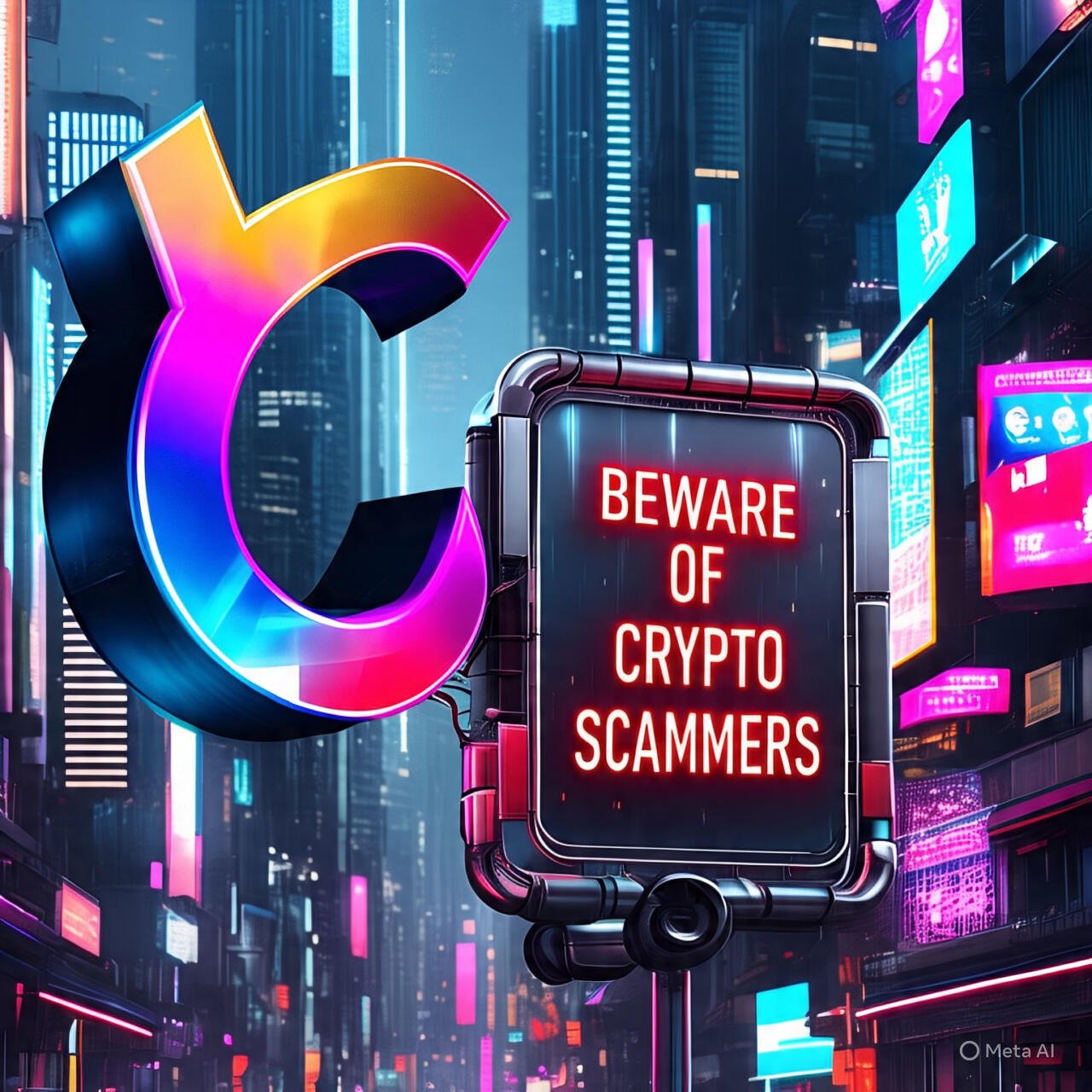
Just a simple short explanation of how to identify real from fake crypto currencies
The world of cryptocurrency is full of opportunities, but it's also where scammers lurk. To protect yourself, you need to know how to identify them. Some tips to guide you:
- Be Wary of Too-Good-to-Be-True Offers
If an investment promises unusually high returns with little risk, it's likely a scam. Legitimate investments always carry some risk and work.
- Watch Out for Phishing Scams
Scammers may try to trick you into revealing sensitive information like your wallet's private keys or login credentials. Be cautious of suspicious emails, messages, or websites.
- Research Before Investing
Before investing in a cryptocurrency project, research the team behind it, their experience, and track record. Check for a clear whitepaper, roadmap, and strong community presence.
- Be Cautious of Unsolicited Offers
If someone approaches you with an investment opportunity out of the blue, it's likely a scam. Legitimate opportunities are usually advertised publicly.
- Check for Red Flags
Scammers often use poor grammar, spelling, and punctuation. They may also be pushy or aggressive. Legitimate projects usually have professional communication.
- Don't Fall for Fake Giveaways
Scammers may promise free cryptocurrency or tokens to lure you in. Legitimate projects don't give away free crypto.
- Use Reputable Exchanges and Wallets
Stick to well-known and reputable cryptocurrency exchanges and wallets. They have robust security measures to protect your assets.
- Stay Informed
Stay up-to-date with the latest news and trends in cryptocurrency. Educate yourself on how to spot scams.
- Check for Registration
Verify if the investment opportunity is registered with relevant regulatory bodies. Unregistered opportunities can be a red flag.
- Trust Your Instincts
If something feels off, trust your instincts and avoid it. It's better to be safe than sorry.
By following these tips, you can reduce the risk of falling victim to scammers in the crypto world. Stay vigilant and protect your assets!
-
 @ dfa02707:41ca50e3
2025-06-02 14:01:51
@ dfa02707:41ca50e3
2025-06-02 14:01:51Contribute to keep No Bullshit Bitcoin news going.
- RoboSats v0.7.7-alpha is now available!
NOTE: "This version of clients is not compatible with older versions of coordinators. Coordinators must upgrade first, make sure you don't upgrade your client while this is marked as pre-release."
- This version brings a new and improved coordinators view with reviews signed both by the robot and the coordinator, adds market price sources in coordinator profiles, shows a correct warning for canceling non-taken orders after a payment attempt, adds Uzbek sum currency, and includes package library updates for coordinators.

Source: RoboSats.
- siggy47 is writing daily RoboSats activity reviews on stacker.news. Check them out here.
- Stay up-to-date with RoboSats on Nostr.
What's new
- New coordinators view (see the picture above).
- Available coordinator reviews signed by both the robot and the coordinator.
- Coordinators now display market price sources in their profiles.

Source: RoboSats.
- Fix for wrong message on cancel button when taking an order. Users are now warned if they try to cancel a non taken order after a payment attempt.
- Uzbek sum currency now available.
- For coordinators: library updates.
- Add docker frontend (#1861).
- Add order review token (#1869).
- Add UZS migration (#1875).
- Fixed tests review (#1878).
- Nostr pubkey for Robot (#1887).
New contributors

Full Changelog: v0.7.6-alpha...v0.7.7-alpha
-
 @ 8bad92c3:ca714aa5
2025-06-02 11:01:32
@ 8bad92c3:ca714aa5
2025-06-02 11:01:32Marty's Bent

It's been a pretty historic week for the United States as it pertains to geopolitical relations in the Middle East. President Trump and many members of his administration, including AI and Crypto Czar David Sacks and Treasury Secretary Scott Bessent, traveled across the Middle East making deals with countries like Qatar, Saudi Arabia, the United Arab Emirates, Syria, and others. Many are speculating that Iran may be included in some behind the scenes deal as well. This trip to the Middle East makes sense considering the fact that China is also vying for favorable relationships with those countries. The Middle East is a power player in the world, and it seems pretty clear that Donald Trump is dead set on ensuring that they choose the United States over China as the world moves towards a more multi-polar reality.
Many are calling the events of this week the Riyadh Accords. There were many deals that were struck in relation to artificial intelligence, defense, energy and direct investments in the United States. A truly prolific power play and demonstration of deal-making ability of Donald Trump, if you ask me. Though I will admit some of the numbers that were thrown out by some of the countries were a bit egregious. We shall see how everything plays out in the coming years. It will be interesting to see how China reacts to this power move by the United States.
While all this was going on, there was something happening back in the United States that many people outside of fringe corners of FinTwit are not talking about, which is the fact that the 10-year and 30-year U.S. Treasury bond yields are back on the rise. Yesterday, they surpassed the levels of mid-April that caused a market panic and are hovering back around levels that have not been seen since right before Donald Trump's inauguration.
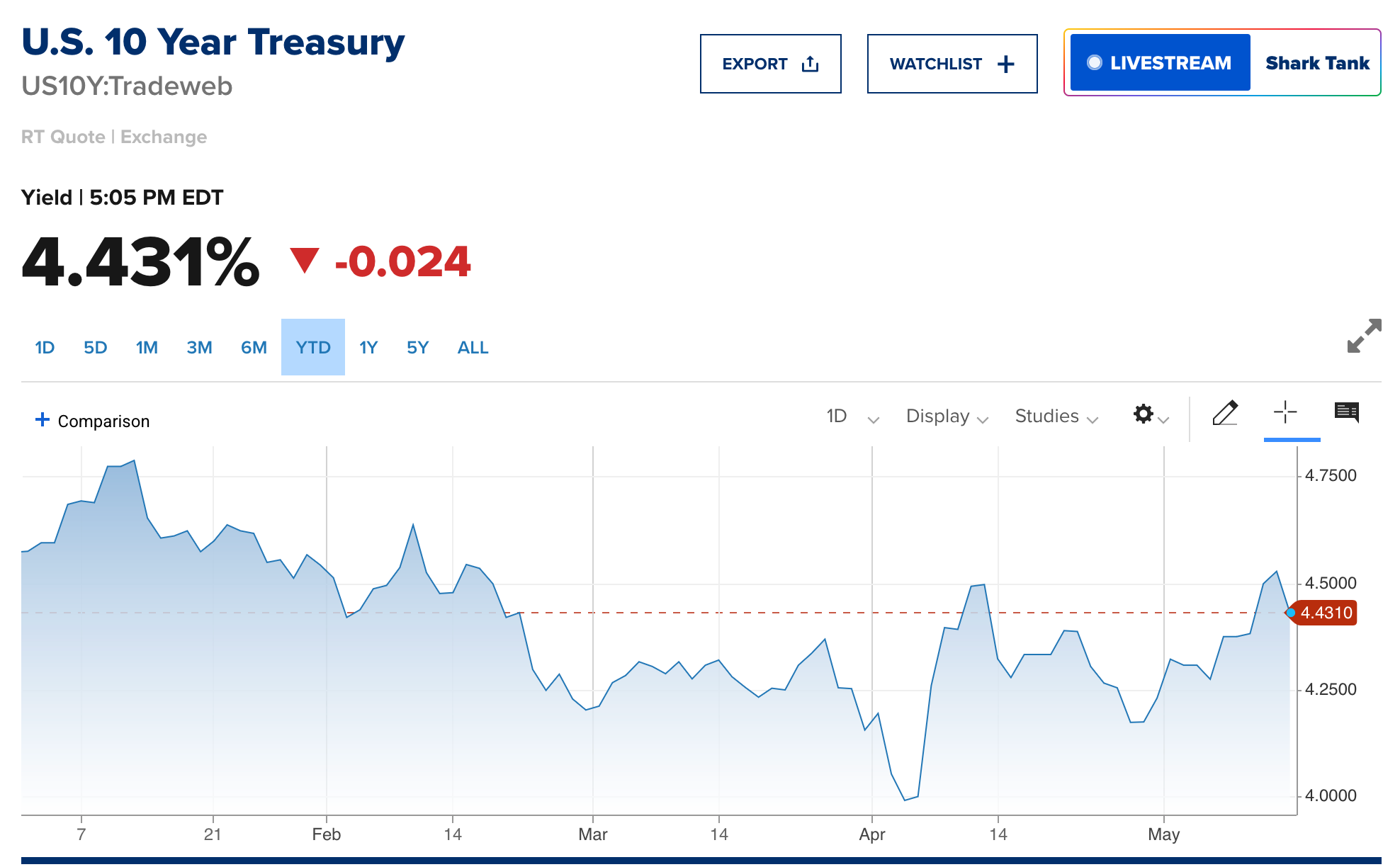
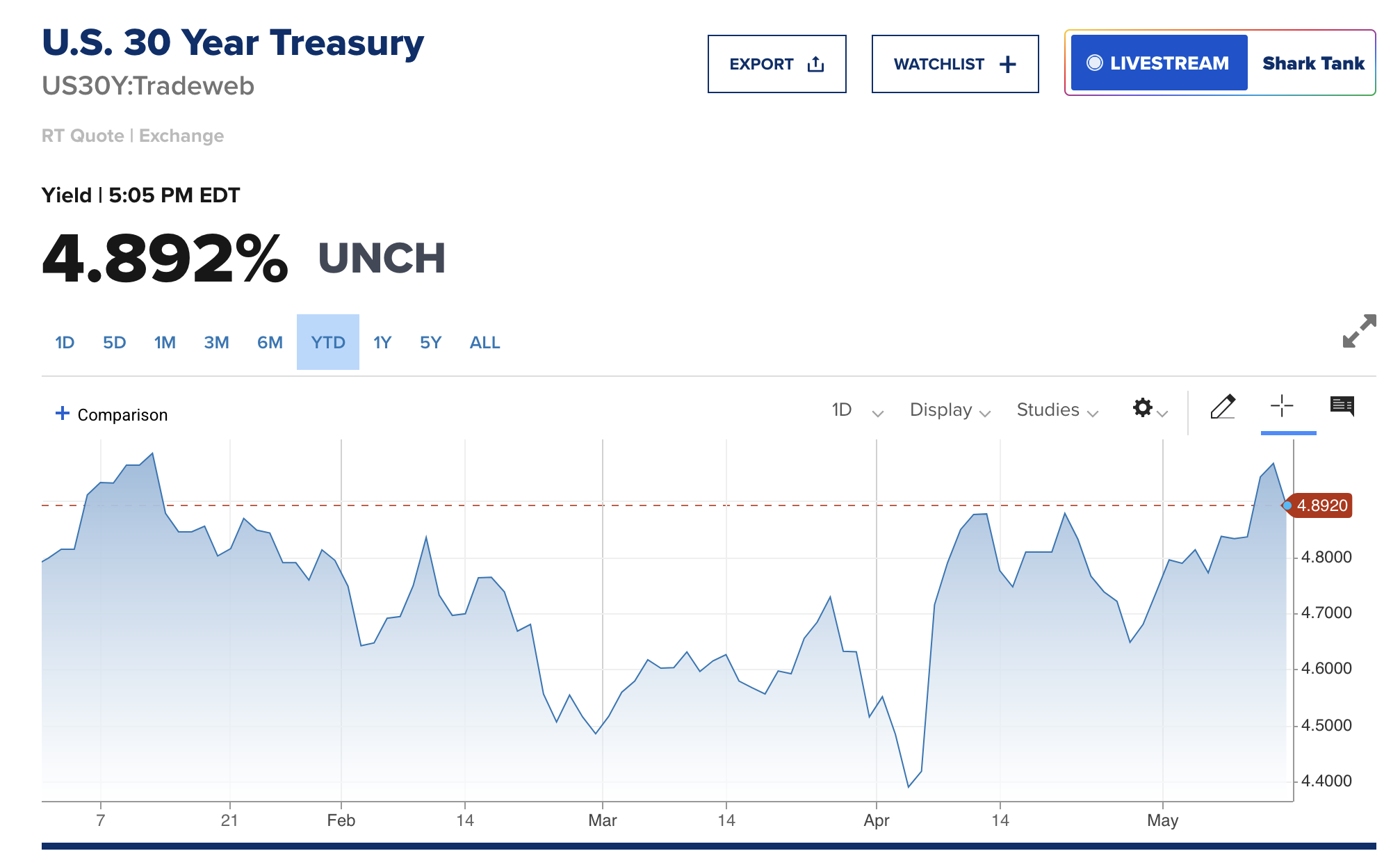
I imagine that there isn't as much of an uproar right now because I'm pretty confident the media freakouts we were experiencing in mid-April were driven by the fact that many large hedge funds found themselves off sides of large levered basis trades. I wouldn't be surprised if those funds have decreased their leverage in those trades and bond yields being back to mid-April levels is not affecting those funds as much as they were last month. But the point stands, the 10-year and 30-year yields are significantly elevated with the 30-year approaching 5%. Regardless of the deals that are currently being made in the Middle East, the Treasury has a big problem on its hands. It still has to roll over many trillions worth of debt over over the next few years and doing so at these rates is going to be massively detrimental to fiscal deficits over the next decade. The interest expense on the debt is set to explode in the coming years.
On that note, data from the first quarter of 2025 has been released by the government and despite all the posturing by the Trump administration around DOGE and how tariffs are going to be beneficial for the U.S. economy, deficits are continuing to explode while the interest expense on the debt has definitively surpassed our annual defense budget.
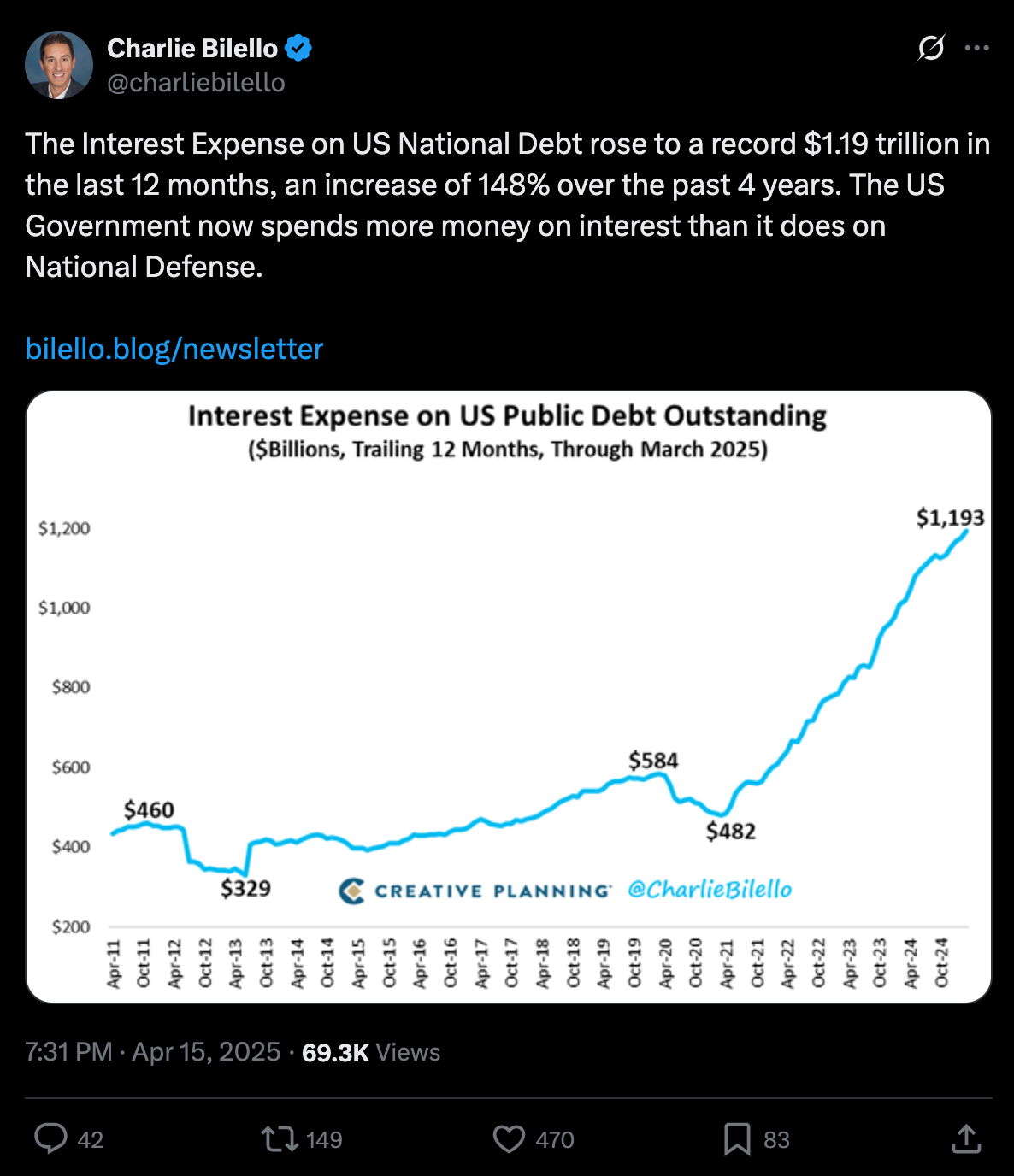
via Charlie Bilello

via Mohamed Al-Erian
To make matters worse, as things are deteriorating on the fiscal side of things, the U.S. consumer is getting crushed by credit. The 90-plus day delinquency rates for credit card and auto loans are screaming higher right now.

via TXMC
One has to wonder how long all this can continue without some sort of liquidity crunch. Even though equities markets have recovered from their post-Liberation Day month long bear market, I would not be surprised if what we're witnessing is a dead cat bounce that can only be continued if the money printers are turned back on. Something's got to give, both on the fiscal side and in the private markets where the Common Man is getting crushed because he's been forced to take on insane amounts of debt to stay afloat after years of elevated levels of inflation. Add on the fact that AI has reached a state of maturity that will enable companies to replace their current meat suit workers with an army of cheap, efficient and fast digital workers and it isn't hard to see that some sort of employment crisis could be on the horizon as well.
Now is not the time to get complacent. While I do believe that the deals that are currently being made in the Middle East are probably in the best interest of the United States as the world, again, moves toward a more multi-polar reality, we are facing problems that one cannot simply wish away. They will need to be confronted. And as we've seen throughout the 21st century, the problems are usually met head-on with a money printer.
I take no pleasure in saying this because it is a bit uncouth to be gleeful to benefit from the strife of others, but it is pretty clear to me that all signs are pointing to bitcoin benefiting massively from everything that is going on. The shift towards a more multi-polar world, the runaway debt situation here in the United States, the increasing deficits, the AI job replacements and the consumer credit crisis that is currently unfolding, All will need to be "solved" by turning on the money printers to levels they've never been pushed to before.
Weird times we're living in.
China's Manufacturing Dominance: Why It Matters for the U.S.
In my recent conversation with Lyn Alden, she highlighted how China has rapidly ascended the manufacturing value chain. As Lyn pointed out, China transformed from making "sneakers and plastic trinkets" to becoming the world's largest auto exporter in just four years. This dramatic shift represents more than economic success—it's a strategic power play. China now dominates solar panel production with greater market control than OPEC has over oil and maintains near-monopoly control of rare earth elements crucial for modern technology.
"China makes like 10 times more steel than the United States does... which is relevant in ship making. It's relevant in all sorts of stuff." - Lyn Alden
Perhaps most concerning, as Lyn emphasized, is China's financial leverage. They hold substantial U.S. assets that could be strategically sold to disrupt U.S. treasury market functioning. This combination of manufacturing dominance, resource control, and financial leverage gives China significant negotiating power in any trade disputes, making our attempts to reshoring manufacturing all the more challenging.
Check out the full podcast here for more on Triffin's dilemma, Bitcoin's role in monetary transition, and the energy requirements for rebuilding America's industrial base.
Headlines of the Day
Financial Times Under Fire Over MicroStrategy Bitcoin Coverage - via X
Trump in Qatar: Historic Boeing Deal Signed - via X
Get our new STACK SATS hat - via tftcmerch.io
Johnson Backs Stock Trading Ban; Passage Chances Slim - via X
Take the First Step Off the Exchange
Bitkey is an easy, secure way to move your Bitcoin into self-custody. With simple setup and built-in recovery, it’s the perfect starting point for getting your coins off centralized platforms and into cold storage—no complexity, no middlemen.
Take control. Start with Bitkey.
Use the promo code *“TFTC20”* during checkout for 20% off
Ten31, the largest bitcoin-focused investor, has deployed 158,469 sats | $150.00M across 30+ companies through three funds. I am a Managing Partner at Ten31 and am very proud of the work we are doing. Learn more at ten31.vc/invest.
Final thought...
Building things of value is satisfying.
Get this newsletter sent to your inbox daily: https://www.tftc.io/bitcoin-brief/
Subscribe to our YouTube channels and follow us on Nostr and X:
@media screen and (max-width: 480px) { .mobile-padding { padding: 10px 0 !important; } .social-container { width: 100% !important; max-width: 260px !important; } .social-icon { padding: 0 !important; } .social-icon img { height: 32px !important; width: 32px !important; } .icon-cell { padding: 0 4px !import
-
 @ 8bad92c3:ca714aa5
2025-06-02 14:01:47
@ 8bad92c3:ca714aa5
2025-06-02 14:01:47Marty's Bent

It's been a pretty historic week for the United States as it pertains to geopolitical relations in the Middle East. President Trump and many members of his administration, including AI and Crypto Czar David Sacks and Treasury Secretary Scott Bessent, traveled across the Middle East making deals with countries like Qatar, Saudi Arabia, the United Arab Emirates, Syria, and others. Many are speculating that Iran may be included in some behind the scenes deal as well. This trip to the Middle East makes sense considering the fact that China is also vying for favorable relationships with those countries. The Middle East is a power player in the world, and it seems pretty clear that Donald Trump is dead set on ensuring that they choose the United States over China as the world moves towards a more multi-polar reality.
Many are calling the events of this week the Riyadh Accords. There were many deals that were struck in relation to artificial intelligence, defense, energy and direct investments in the United States. A truly prolific power play and demonstration of deal-making ability of Donald Trump, if you ask me. Though I will admit some of the numbers that were thrown out by some of the countries were a bit egregious. We shall see how everything plays out in the coming years. It will be interesting to see how China reacts to this power move by the United States.
While all this was going on, there was something happening back in the United States that many people outside of fringe corners of FinTwit are not talking about, which is the fact that the 10-year and 30-year U.S. Treasury bond yields are back on the rise. Yesterday, they surpassed the levels of mid-April that caused a market panic and are hovering back around levels that have not been seen since right before Donald Trump's inauguration.


I imagine that there isn't as much of an uproar right now because I'm pretty confident the media freakouts we were experiencing in mid-April were driven by the fact that many large hedge funds found themselves off sides of large levered basis trades. I wouldn't be surprised if those funds have decreased their leverage in those trades and bond yields being back to mid-April levels is not affecting those funds as much as they were last month. But the point stands, the 10-year and 30-year yields are significantly elevated with the 30-year approaching 5%. Regardless of the deals that are currently being made in the Middle East, the Treasury has a big problem on its hands. It still has to roll over many trillions worth of debt over over the next few years and doing so at these rates is going to be massively detrimental to fiscal deficits over the next decade. The interest expense on the debt is set to explode in the coming years.
On that note, data from the first quarter of 2025 has been released by the government and despite all the posturing by the Trump administration around DOGE and how tariffs are going to be beneficial for the U.S. economy, deficits are continuing to explode while the interest expense on the debt has definitively surpassed our annual defense budget.

via Charlie Bilello

via Mohamed Al-Erian
To make matters worse, as things are deteriorating on the fiscal side of things, the U.S. consumer is getting crushed by credit. The 90-plus day delinquency rates for credit card and auto loans are screaming higher right now.

via TXMC
One has to wonder how long all this can continue without some sort of liquidity crunch. Even though equities markets have recovered from their post-Liberation Day month long bear market, I would not be surprised if what we're witnessing is a dead cat bounce that can only be continued if the money printers are turned back on. Something's got to give, both on the fiscal side and in the private markets where the Common Man is getting crushed because he's been forced to take on insane amounts of debt to stay afloat after years of elevated levels of inflation. Add on the fact that AI has reached a state of maturity that will enable companies to replace their current meat suit workers with an army of cheap, efficient and fast digital workers and it isn't hard to see that some sort of employment crisis could be on the horizon as well.
Now is not the time to get complacent. While I do believe that the deals that are currently being made in the Middle East are probably in the best interest of the United States as the world, again, moves toward a more multi-polar reality, we are facing problems that one cannot simply wish away. They will need to be confronted. And as we've seen throughout the 21st century, the problems are usually met head-on with a money printer.
I take no pleasure in saying this because it is a bit uncouth to be gleeful to benefit from the strife of others, but it is pretty clear to me that all signs are pointing to bitcoin benefiting massively from everything that is going on. The shift towards a more multi-polar world, the runaway debt situation here in the United States, the increasing deficits, the AI job replacements and the consumer credit crisis that is currently unfolding, All will need to be "solved" by turning on the money printers to levels they've never been pushed to before.
Weird times we're living in.
China's Manufacturing Dominance: Why It Matters for the U.S.
In my recent conversation with Lyn Alden, she highlighted how China has rapidly ascended the manufacturing value chain. As Lyn pointed out, China transformed from making "sneakers and plastic trinkets" to becoming the world's largest auto exporter in just four years. This dramatic shift represents more than economic success—it's a strategic power play. China now dominates solar panel production with greater market control than OPEC has over oil and maintains near-monopoly control of rare earth elements crucial for modern technology.
"China makes like 10 times more steel than the United States does... which is relevant in ship making. It's relevant in all sorts of stuff." - Lyn Alden
Perhaps most concerning, as Lyn emphasized, is China's financial leverage. They hold substantial U.S. assets that could be strategically sold to disrupt U.S. treasury market functioning. This combination of manufacturing dominance, resource control, and financial leverage gives China significant negotiating power in any trade disputes, making our attempts to reshoring manufacturing all the more challenging.
Check out the full podcast here for more on Triffin's dilemma, Bitcoin's role in monetary transition, and the energy requirements for rebuilding America's industrial base.
Headlines of the Day
Financial Times Under Fire Over MicroStrategy Bitcoin Coverage - via X
Trump in Qatar: Historic Boeing Deal Signed - via X
Get our new STACK SATS hat - via tftcmerch.io
Johnson Backs Stock Trading Ban; Passage Chances Slim - via X
Take the First Step Off the Exchange
Bitkey is an easy, secure way to move your Bitcoin into self-custody. With simple setup and built-in recovery, it’s the perfect starting point for getting your coins off centralized platforms and into cold storage—no complexity, no middlemen.
Take control. Start with Bitkey.
Use the promo code *“TFTC20”* during checkout for 20% off
Ten31, the largest bitcoin-focused investor, has deployed 158,469 sats | $150.00M across 30+ companies through three funds. I am a Managing Partner at Ten31 and am very proud of the work we are doing. Learn more at ten31.vc/invest.
Final thought...
Building things of value is satisfying.
Get this newsletter sent to your inbox daily: https://www.tftc.io/bitcoin-brief/
Subscribe to our YouTube channels and follow us on Nostr and X:
@media screen and (max-width: 480px) { .mobile-padding { padding: 10px 0 !important; } .social-container { width: 100% !important; max-width: 260px !important; } .social-icon { padding: 0 !important; } .social-icon img { height: 32px !important; width: 32px !important; } .icon-cell { padding: 0 4px !import
-
 @ 06639a38:655f8f71
2025-06-01 19:45:04
@ 06639a38:655f8f71
2025-06-01 19:45:04Nostr-PHP
All commits on the main branch between 19-05 and 25-05: https://github.com/nostrver-se/nostr-php/commits/main/?since=2025-05-19&until=2025-05-25
- Merged PR #95 finish implementing methods Relay and RelaySet
- Merged PR #90 implementing NIP-17 private direct messages
[https://shares.sebastix.dev/DTkBk1By.png]#d04e152f809a86e495a4b80c3c292ca70fb0b94b9fcf35ff424769848fc15314)
- Made some progress on the persistentConnection class for fetching messages from a relay in runtime (realtime)
New release: 1.8.0
What's Changed
- feat: Implement NIP-05 lookups by @dsbaars in https://github.com/nostrver-se/nostr-php/pull/89
- NIP 44 implementation fix and test improvements by @dsbaars in https://github.com/nostrver-se/nostr-php/pull/88
- remove CLI tool from library - https://github.com/nostrver-se/nostr-p… by @Sebastix in https://github.com/nostrver-se/nostr-php/pull/93
- Add extra metadata fields for profile by @dsbaars in https://github.com/nostrver-se/nostr-php/pull/94
- Finish implementing methods Relay and RelaySet by @dsbaars in https://github.com/nostrver-se/nostr-php/pull/95
- Implement NIP-17 Private Direct Messages by @dsbaars in https://github.com/nostrver-se/nostr-php/pull/90
Full changelog: https://github.com/nostrver-se/nostr-php/compare/1.7.1...1.8.0
Link: https://github.com/nostrver-se/nostr-php/releases/tag/1.8.0 -
 @ bf47c19e:c3d2573b
2025-06-01 18:41:53
@ bf47c19e:c3d2573b
2025-06-01 18:41:53U ovoj sekciji pratićemo cene raznih dobara i usluga, a pre svega nekretnina, prosečne srpske plate, goriva, deviznih i zlatnih rezervi Srbije u odnosu na Bitkoin. Iz priloženih grafikona može se videti da sve vremenom gubi vrednost, odnosno postaje jeftinije u odnosu na BTC.
Cene nekretnina u Republici Srbiji izražene kroz Bitkoin (kompletni grafikoni)
Visina prosečne zarade u Republici Srbiji, cene goriva, dinarska i devizna štednja stanovništva, devizne i zlatne rezerve Srbije - izraženo kroz Bitkoin (kompletni grafikoni)
Prosečna cena m2 stana u Gradu Beogradu izražena kroz BTC
Prosečna cena m2 stana u "Beogradu na vodi" izražena kroz BTC
Prosečna cena m2 stana u Novom Sadu izražena kroz BTC
Prosečna cena m2 stana u Nišu izražena kroz BTC
Prosečna cena m2 stana u Kragujevcu izražena kroz BTC
Prosečna zarada u Republici Srbiji izražena kroz BTC
Cena goriva 'Evro Premium BMB 95' izražena kroz BTC
Cena goriva 'Evro Dizel' izražena kroz BTC
Javni dug Republike Srbije izražen kroz BTC & EUR
Dinarska štednja stanovništva kod banaka izražena kroz BTC
Devizna štednja stanovništva kod banaka izražena kroz BTC
Devizne rezerve Republike Srbije izražene kroz BTC
Zlatne rezerve Republike Srbije izražene kroz BTC
-
 @ b1ddb4d7:471244e7
2025-06-02 11:00:50
@ b1ddb4d7:471244e7
2025-06-02 11:00:50Starting January 1, 2026, the United Kingdom will impose some of the world’s most stringent reporting requirements on cryptocurrency firms.
All platforms operating in or serving UK customers-domestic and foreign alike-must collect and disclose extensive personal and transactional data for every user, including individuals, companies, trusts, and charities.
This regulatory drive marks the UK’s formal adoption of the OECD’s Crypto-Asset Reporting Framework (CARF), a global initiative designed to bring crypto oversight in line with traditional banking and to curb tax evasion in the rapidly expanding digital asset sector.
What Will Be Reported?
Crypto firms must gather and submit the following for each transaction:
- User’s full legal name, home address, and taxpayer identification number
- Detailed data on every trade or transfer: type of cryptocurrency, amount, and nature of the transaction
- Identifying information for corporate, trust, and charitable clients
The obligation extends to all digital asset activities, including crypto-to-crypto and crypto-to-fiat trades, and applies to both UK residents and non-residents using UK-based platforms. The first annual reports covering 2026 activity are due by May 31, 2027.
Enforcement and Penalties
Non-compliance will carry stiff financial penalties, with fines of up to £300 per user account for inaccurate or missing data-a potentially enormous liability for large exchanges. The UK government has urged crypto firms to begin collecting this information immediately to ensure operational readiness.
Regulatory Context and Market Impact
This move is part of a broader UK strategy to position itself as a global fintech hub while clamping down on fraud and illicit finance. UK Chancellor Rachel Reeves has championed these measures, stating, “Britain is open for business – but closed to fraud, abuse, and instability”. The regulatory expansion comes amid a surge in crypto adoption: the UK’s Financial Conduct Authority reported that 12% of UK adults owned crypto in 2024, up from just 4% in 2021.
Enormous Risks for Consumers: Lessons from the Coinbase Data Breach
While the new framework aims to enhance transparency and protect consumers, it also dramatically increases the volume of sensitive personal data held by crypto firms-raising the stakes for cybersecurity.
The risks are underscored by the recent high-profile breach at Coinbase, one of the world’s largest exchanges.
In May 2025, Coinbase disclosed that cybercriminals, aided by bribed offshore contractors, accessed and exfiltrated customer data including names, addresses, government IDs, and partial bank details.
The attackers then used this information for sophisticated phishing campaigns, successfully deceiving some customers into surrendering account credentials and funds.
“While private encryption keys remained secure, sufficient customer information was exposed to enable sophisticated phishing attacks by criminals posing as Coinbase personnel.”
Coinbase now faces up to $400 million in compensation costs and has pledged to reimburse affected users, but the incident highlights the systemic vulnerability created when large troves of personal data are centralized-even if passwords and private keys are not directly compromised. The breach also triggered a notable drop in Coinbase’s share price and prompted a $20 million bounty for information leading to the attackers’ capture.
The Bottom Line
The UK’s forthcoming crypto reporting regime represents a landmark in financial regulation, promising greater transparency and tax compliance. However, as the Coinbase episode demonstrates, the aggregation of sensitive user data at scale poses a significant cybersecurity risk.
As regulators push for more oversight, the challenge will be ensuring that consumer protection does not become a double-edged sword-exposing users to new threats even as it seeks to shield them from old ones.
-
 @ 8bad92c3:ca714aa5
2025-06-02 17:02:12
@ 8bad92c3:ca714aa5
2025-06-02 17:02:12Marty's Bent

It's been a pretty historic week for the United States as it pertains to geopolitical relations in the Middle East. President Trump and many members of his administration, including AI and Crypto Czar David Sacks and Treasury Secretary Scott Bessent, traveled across the Middle East making deals with countries like Qatar, Saudi Arabia, the United Arab Emirates, Syria, and others. Many are speculating that Iran may be included in some behind the scenes deal as well. This trip to the Middle East makes sense considering the fact that China is also vying for favorable relationships with those countries. The Middle East is a power player in the world, and it seems pretty clear that Donald Trump is dead set on ensuring that they choose the United States over China as the world moves towards a more multi-polar reality.
Many are calling the events of this week the Riyadh Accords. There were many deals that were struck in relation to artificial intelligence, defense, energy and direct investments in the United States. A truly prolific power play and demonstration of deal-making ability of Donald Trump, if you ask me. Though I will admit some of the numbers that were thrown out by some of the countries were a bit egregious. We shall see how everything plays out in the coming years. It will be interesting to see how China reacts to this power move by the United States.
While all this was going on, there was something happening back in the United States that many people outside of fringe corners of FinTwit are not talking about, which is the fact that the 10-year and 30-year U.S. Treasury bond yields are back on the rise. Yesterday, they surpassed the levels of mid-April that caused a market panic and are hovering back around levels that have not been seen since right before Donald Trump's inauguration.


I imagine that there isn't as much of an uproar right now because I'm pretty confident the media freakouts we were experiencing in mid-April were driven by the fact that many large hedge funds found themselves off sides of large levered basis trades. I wouldn't be surprised if those funds have decreased their leverage in those trades and bond yields being back to mid-April levels is not affecting those funds as much as they were last month. But the point stands, the 10-year and 30-year yields are significantly elevated with the 30-year approaching 5%. Regardless of the deals that are currently being made in the Middle East, the Treasury has a big problem on its hands. It still has to roll over many trillions worth of debt over over the next few years and doing so at these rates is going to be massively detrimental to fiscal deficits over the next decade. The interest expense on the debt is set to explode in the coming years.
On that note, data from the first quarter of 2025 has been released by the government and despite all the posturing by the Trump administration around DOGE and how tariffs are going to be beneficial for the U.S. economy, deficits are continuing to explode while the interest expense on the debt has definitively surpassed our annual defense budget.

via Charlie Bilello

via Mohamed Al-Erian
To make matters worse, as things are deteriorating on the fiscal side of things, the U.S. consumer is getting crushed by credit. The 90-plus day delinquency rates for credit card and auto loans are screaming higher right now.

via TXMC
One has to wonder how long all this can continue without some sort of liquidity crunch. Even though equities markets have recovered from their post-Liberation Day month long bear market, I would not be surprised if what we're witnessing is a dead cat bounce that can only be continued if the money printers are turned back on. Something's got to give, both on the fiscal side and in the private markets where the Common Man is getting crushed because he's been forced to take on insane amounts of debt to stay afloat after years of elevated levels of inflation. Add on the fact that AI has reached a state of maturity that will enable companies to replace their current meat suit workers with an army of cheap, efficient and fast digital workers and it isn't hard to see that some sort of employment crisis could be on the horizon as well.
Now is not the time to get complacent. While I do believe that the deals that are currently being made in the Middle East are probably in the best interest of the United States as the world, again, moves toward a more multi-polar reality, we are facing problems that one cannot simply wish away. They will need to be confronted. And as we've seen throughout the 21st century, the problems are usually met head-on with a money printer.
I take no pleasure in saying this because it is a bit uncouth to be gleeful to benefit from the strife of others, but it is pretty clear to me that all signs are pointing to bitcoin benefiting massively from everything that is going on. The shift towards a more multi-polar world, the runaway debt situation here in the United States, the increasing deficits, the AI job replacements and the consumer credit crisis that is currently unfolding, All will need to be "solved" by turning on the money printers to levels they've never been pushed to before.
Weird times we're living in.
China's Manufacturing Dominance: Why It Matters for the U.S.
In my recent conversation with Lyn Alden, she highlighted how China has rapidly ascended the manufacturing value chain. As Lyn pointed out, China transformed from making "sneakers and plastic trinkets" to becoming the world's largest auto exporter in just four years. This dramatic shift represents more than economic success—it's a strategic power play. China now dominates solar panel production with greater market control than OPEC has over oil and maintains near-monopoly control of rare earth elements crucial for modern technology.
"China makes like 10 times more steel than the United States does... which is relevant in ship making. It's relevant in all sorts of stuff." - Lyn Alden
Perhaps most concerning, as Lyn emphasized, is China's financial leverage. They hold substantial U.S. assets that could be strategically sold to disrupt U.S. treasury market functioning. This combination of manufacturing dominance, resource control, and financial leverage gives China significant negotiating power in any trade disputes, making our attempts to reshoring manufacturing all the more challenging.
Check out the full podcast here for more on Triffin's dilemma, Bitcoin's role in monetary transition, and the energy requirements for rebuilding America's industrial base.
Headlines of the Day
Financial Times Under Fire Over MicroStrategy Bitcoin Coverage - via X
Trump in Qatar: Historic Boeing Deal Signed - via X
Get our new STACK SATS hat - via tftcmerch.io
Johnson Backs Stock Trading Ban; Passage Chances Slim - via X
Take the First Step Off the Exchange
Bitkey is an easy, secure way to move your Bitcoin into self-custody. With simple setup and built-in recovery, it’s the perfect starting point for getting your coins off centralized platforms and into cold storage—no complexity, no middlemen.
Take control. Start with Bitkey.
Use the promo code *“TFTC20”* during checkout for 20% off
Ten31, the largest bitcoin-focused investor, has deployed 158,469 sats | $150.00M across 30+ companies through three funds. I am a Managing Partner at Ten31 and am very proud of the work we are doing. Learn more at ten31.vc/invest.
Final thought...
Building things of value is satisfying.
Get this newsletter sent to your inbox daily: https://www.tftc.io/bitcoin-brief/
Subscribe to our YouTube channels and follow us on Nostr and X:
@media screen and (max-width: 480px) { .mobile-padding { padding: 10px 0 !important; } .social-container { width: 100% !important; max-width: 260px !important; } .social-icon { padding: 0 !important; } .social-icon img { height: 32px !important; width: 32px !important; } .icon-cell { padding: 0 4px !import
-
 @ 58537364:705b4b85
2025-06-01 16:46:42
@ 58537364:705b4b85
2025-06-01 16:46:42ความสุขทางโลก ลัทธิสุขนิยมยกย่อง แต่ลัทธิทรมานตนประณาม หากไม่มองว่ากามสุขเป็นพรจากพระผู้เป็นเจ้า คนก็มักมองว่ากามสุขเป็นเครื่องลวงล่อของซาตาน ในเรื่องนี้พระพุทธศาสนาเลือกเดินสายกลาง โดยสอนว่าเราควรทำความเข้าใจกามสุขให้แจ่มแจ้ง ทั้งในแง่เสน่ห์เย้ายวน ข้อจำกัดและข้อบกพร่องทั้งหลาย
เพื่อให้เข้าใจกามสุขอย่างแจ่มแจ้ง เราอาจตั้งคำถามดังนี้: กามสุขสนองตอบความต้องการทางจิตใจแบบใดได้บ้าง และไม่อาจตอบสนองความต้องการแบบใดได้ เพราะเหตุใด
ความต้องการในส่วนที่กามสุขไม่อาจตอบสนองได้ เราควรปฏิบัติอย่างไร
เราหลงเพลิดเพลินและยึดติดในกามสุขมากเพียงใด และกามสุขมีอิทธิพลเหนือจิตใจเราเพียงใด
เราเคยทำหรือพูดสิ่งที่ไม่ถูกต้องเนื่องด้วยปรารถนาในกามสุขหรือไม่
เราเคยเบียดเบียนผู้อื่นเนื่องด้วยปรารถนาในกามสุขหรือไม่
บ่อยครั้งเพียงใดที่สุขทางโลกสร้างความผิดหวังให้เรา
ความคาดหวังมีผลกระทบอย่างไรต่อความสุขทางโลก การทำอะไรซ้ำๆ และความเคยชินส่งผลต่อความสุขทางโลกอย่างไร
เรารู้สึกอย่างไร ยามไม่ได้กามสุขที่เราปรารถนา
กามสุขมีความเกี่ยวข้องกับความซึมเศร้าหรือไม่ กับความวิตกกังวลด้วยหรือไม่
เรารู้สึกอย่างไร เมื่อนึกถึงอนาคตว่า จะต้องพลัดพรากจากสุขทางโลก เนื่องด้วยความเจ็บไข้ ความแก่ และความตาย
การพลัดพรากจากความสุขทางโลกรู้สึกอย่างไรบ้าง
เราตั้งคำถามได้มากมาย และยังตั้งคำถามได้มากไปกว่านี้
หลักสำคัญ คือ ยิ่งเห็นชัดแจ้งในกามสุข เราจะยิ่งเกิดปัญญาและเข้าถึงความสงบมากขึ้นธรรมะคำสอน โดย พระอาจารย์ชยสาโร แปลถอดความ โดย ปิยสีโลภิกขุ

-
 @ 7f6db517:a4931eda
2025-06-02 15:02:32
@ 7f6db517:a4931eda
2025-06-02 15:02:32
Bank run on every crypto bank then bank run on every "real" bank.
— ODELL (@ODELL) December 14, 2022
The four main banks of bitcoin and “crypto” are Signature, Prime Trust, Silvergate, and Silicon Valley Bank. Prime Trust does not custody funds themselves but rather maintains deposit accounts at BMO Harris Bank, Cross River, Lexicon Bank, MVB Bank, and Signature Bank. Silvergate and Silicon Valley Bank have already stopped withdrawals. More banks will go down before the chaos stops. None of them have sufficient reserves to meet withdrawals.
Bitcoin gives us all the ability to opt out of a system that has massive layers of counterparty risk built in, years of cheap money and broken incentives have layered risk on top of risk throughout the entire global economy. If you thought the FTX bank run was painful to watch, I have bad news for you: every major bank in the world is fractional reserve. Bitcoin held in self custody is unique in its lack of counterparty risk, as global market chaos unwinds this will become much more obvious.
The rules of bitcoin are extremely hard to change by design. Anyone can access the network directly without a trusted third party by using their own node. Owning more bitcoin does not give you more control over the network with all participants on equal footing.
Bitcoin is:
- money that is not controlled by a company or government
- money that can be spent or saved without permission
- money that is provably scarce and should increase in purchasing power with adoptionBitcoin is money without trust. Whether you are a nation state, corporation, or an individual, you can use bitcoin to spend or save without permission. Social media will accelerate the already deteriorating trust in our institutions and as this trust continues to crumble the value of trust minimized money will become obvious. As adoption increases so should the purchasing power of bitcoin.
A quick note on "stablecoins," such as USDC - it is important to remember that they rely on trusted custodians. They have the same risk as funds held directly in bank accounts with additional counterparty risk on top. The trusted custodians can be pressured by gov, exit scam, or caught up in fraud. Funds can and will be frozen at will. This is a distinctly different trust model than bitcoin, which is a native bearer token that does not rely on any centralized entity or custodian.
Most bitcoin exchanges have exposure to these failing banks. Expect more chaos and confusion as this all unwinds. Withdraw any bitcoin to your own wallet ASAP.
Simple Self Custody Guide: https://werunbtc.com/muun
More Secure Cold Storage Guide: https://werunbtc.com/coldcard
If you found this post helpful support my work with bitcoin.

-
 @ b1ddb4d7:471244e7
2025-06-02 14:01:06
@ b1ddb4d7:471244e7
2025-06-02 14:01:06Starting January 1, 2026, the United Kingdom will impose some of the world’s most stringent reporting requirements on cryptocurrency firms.
All platforms operating in or serving UK customers-domestic and foreign alike-must collect and disclose extensive personal and transactional data for every user, including individuals, companies, trusts, and charities.
This regulatory drive marks the UK’s formal adoption of the OECD’s Crypto-Asset Reporting Framework (CARF), a global initiative designed to bring crypto oversight in line with traditional banking and to curb tax evasion in the rapidly expanding digital asset sector.
What Will Be Reported?
Crypto firms must gather and submit the following for each transaction:
- User’s full legal name, home address, and taxpayer identification number
- Detailed data on every trade or transfer: type of cryptocurrency, amount, and nature of the transaction
- Identifying information for corporate, trust, and charitable clients
The obligation extends to all digital asset activities, including crypto-to-crypto and crypto-to-fiat trades, and applies to both UK residents and non-residents using UK-based platforms. The first annual reports covering 2026 activity are due by May 31, 2027.
Enforcement and Penalties
Non-compliance will carry stiff financial penalties, with fines of up to £300 per user account for inaccurate or missing data-a potentially enormous liability for large exchanges. The UK government has urged crypto firms to begin collecting this information immediately to ensure operational readiness.
Regulatory Context and Market Impact
This move is part of a broader UK strategy to position itself as a global fintech hub while clamping down on fraud and illicit finance. UK Chancellor Rachel Reeves has championed these measures, stating, “Britain is open for business – but closed to fraud, abuse, and instability”. The regulatory expansion comes amid a surge in crypto adoption: the UK’s Financial Conduct Authority reported that 12% of UK adults owned crypto in 2024, up from just 4% in 2021.
Enormous Risks for Consumers: Lessons from the Coinbase Data Breach
While the new framework aims to enhance transparency and protect consumers, it also dramatically increases the volume of sensitive personal data held by crypto firms-raising the stakes for cybersecurity.
The risks are underscored by the recent high-profile breach at Coinbase, one of the world’s largest exchanges.
In May 2025, Coinbase disclosed that cybercriminals, aided by bribed offshore contractors, accessed and exfiltrated customer data including names, addresses, government IDs, and partial bank details.
The attackers then used this information for sophisticated phishing campaigns, successfully deceiving some customers into surrendering account credentials and funds.
“While private encryption keys remained secure, sufficient customer information was exposed to enable sophisticated phishing attacks by criminals posing as Coinbase personnel.”
Coinbase now faces up to $400 million in compensation costs and has pledged to reimburse affected users, but the incident highlights the systemic vulnerability created when large troves of personal data are centralized-even if passwords and private keys are not directly compromised. The breach also triggered a notable drop in Coinbase’s share price and prompted a $20 million bounty for information leading to the attackers’ capture.
The Bottom Line
The UK’s forthcoming crypto reporting regime represents a landmark in financial regulation, promising greater transparency and tax compliance. However, as the Coinbase episode demonstrates, the aggregation of sensitive user data at scale poses a significant cybersecurity risk.
As regulators push for more oversight, the challenge will be ensuring that consumer protection does not become a double-edged sword-exposing users to new threats even as it seeks to shield them from old ones.
-
 @ 3c7dc2c5:805642a8
2025-06-01 16:03:49
@ 3c7dc2c5:805642a8
2025-06-01 16:03:49🧠Quote(s) of the week:
Fred Krueger: 'Generally, people overanalyze too much. Bitcoin is amazing tech. It works. It has been the top-performing asset in 13 of the last 15 years. Stop with the analysis. Buy it. Don't trade it. Don't look for "entry points". And don't do a 1% allocation either. Grow a pair.'
🧡Bitcoin news🧡
Money. Time. Energy. You only get to pick two… Unless you’re a Bitcoiner. https://i.ibb.co/1Gw9BJdB/Gqspxqd-Xg-AAw03e.jpg
On the 19th of May.
➡️ El Salvador is $357 million in profit on Bitcoin holdings.
➡️Metaplanet ended Monday as Japan's 9th most traded stock, with ¥61.69B ( $425M) daily volume, surpassing Toyota, SoftBank, and Nintendo.
➡️Circle $USDC in "informal talks" to sell itself to Coinbase or Ripple, Fortune reports. WhalePanda: "Imagine running a $60 billion stablecoin in such an incompetent way you can't even turn a decent profit and desperately have to sell."
➡️Panama introduces a bill to allow citizens to buy, sell, and accept Bitcoin freely anywhere in the country.
On the 20th of May:
➡️https://i.ibb.co/v61tLVTc/Grk-OL6x-Ws-AAIGum.jpg
Tick Tock next block, but it seems like we are right on schedule. Bitcoin is doing exactly what it was designed to do.
➡️BTC just hit a new ATH in Argentina Weak currencies first. Then all of them.
➡️ThumzUp Media officially files to raise $500m to buy Bitcoin as a treasury reserve asset.
➡️Indonesian fintech DigiAsia's stock surges over 90% after announcing plans to raise $100M for a Bitcoin treasury.
➡️River: America’s story began with sound money. Hard-working Americans saved their wealth in gold-backed money. Today, Bitcoin carries that torch forward.
https://i.ibb.co/zTFLqMjC/Grpd4lm-WAAAq-W7m.png
Insane stat! Bitcoin is now the people's money. Imagine the price when nation-states get on board.
The US government is outpacing global rivals like China by embracing Bitcoin. The federal government's Bitcoin holdings now represent twice its global market share of gold reserves.
Worth the read: https://blog.river.com/american-bitcoin-advantage/
'In this report, you'll learn about: - Why Bitcoin is an underestimated pillar of American dominance. - America’s lead in Bitcoin businesses, institutions, development, and policy. - Bitcoin's emergence as America’s reserve asset.'
Ergo: America is the dominant Bitcoin player in just about every dimension: investment, government reserves, development, institutional embrace, supportive policy, and mining.
➡️Texas Bitcoin Reserve bill SB 21 will be considered on the second reading in the House this morning. Note: the Texas Constitution requires that second and third readings be conducted on separate days. If it passes today, then the final vote could be tomorrow
➡️Bitcoin accumulation trends signal bullishness with smallholders (<1 BTC) accelerating accumulation (score ~0.55), and whales (100-10K BTC) aggressively buying. Source: Glassnode
➡️French company The Blockchain Group raises €8.6 million to buy more Bitcoin. Press release
➡️Chinese printer manufacturer Procolored unknowingly distributed Bitcoin-stealing malware through its official device drivers, resulting in 9.3 BTC ($950K) stolen from users.
https://x.com/MistTrack_io/status/1924411803540590728
➡️Bitmine launches its Bitcoin Treasury Advisory Practice with a $4M deal, including $3.2M for leasing 3K Bitcoin miners and an $800K consulting agreement
➡️Bitcoin's correlation to gold is at its lowest since February 2025, per Glassnode data.
➡️UK-listed Smarter Web Company adds 16.42 BTC to its treasury at an average price of $104,202. Total Holdings: 35.62 BTC The Smarter Web Company is stacking with conviction—building a treasury designed for the long term.
On the 21st of May:
➡️Vivek's Strive Asset Management looking to buy up to 75,000 Bitcoin from Mt. Gox claims at a discount to build a Bitcoin treasury.
➡️Bitcoin is $1k from an all-time high and the Google Trends chart looks like this. https://i.ibb.co/qYLb7j6C/Gra6-BSd-Xo-AATN2-A.jpg
On the 22nd of May:
Happy Pizza Day! 15 years ago today Laszlo Hanyecz bought 2 pizzas for 10,000 Bitcoin. That Bitcoin is now worth $1.2 BILLION.
Will Baxter: "But how did he get that much bitcoin? Well, there’s a lot more to Laszlo's story than those pizzas. Here are four facts about him most people don’t know (the last one blew my mind): 1. Laszlo, a Mac developer, discovered bitcoin in 2010. After realizing that Bitcoin only ran on Windows, he took it upon himself to port it to Mac OS. He built and released the first bitcoin client for Mac making it accessible to more users. 2. In its earliest days, bitcoin could be mined with just a CPU, something that every computer has. But Laszlo had other plans. In mid-2010, he released a solution that would allow users to mine with their GPUs. Laszlo is single-handedly responsible for ushering in the era of GPU mining which massively increased Bitcoin’s total hashrate. 3. By being one of the early adopters of GPU mining, Laszlo enjoyed a massive jump in mining efficiency and hashrate, which meant that he was able to mine a lot of blocks. In total, Laszlo’s Bitcoin wallets received more than 80,000 BTC over the first few months of the GPU mining era. It’s estimated that Laszlo mined well over 100,000 BTC in Bitcoin’s early days. 4. Laszlo has single-handedly mined more Bitcoin than any publicly listed Bitcoin mining company. As an example, MARA, the largest publicly traded Bitcoin miner by market capitalization, has mined an estimated 48,000 BTC since 2018. Laszlo and his GPUs managed to mine more than twice that amount! Incredible.
➡️Pizza slice inscribed on the Bitcoin blockchain forever! Block #897813
➡️Strategy: 'Bitcoin Pizza Day at Strategy. Paid for with USD.'
Kinda disgusting. The largest Bitcoin Treasury Company is not even able to pay for pizza in Bitcoin on Bitcoin Pizza Day? Why did they even bother to buy pizza today? They show zero understanding of the meaning of Pizza Day and Bitcoin history.
Plebs all around the world are celebrating Pizza Day by "spend and replace" Bitcoin for some lovely pizzas. What is Saylor doing? He decides to use his giant megaphone to stomp all over it. "Pay with Dollars. Eat the Pizza. Keep the Bitcoin." That post rubbed me the wrong way. That’s because they are not bullish on the payment use case of Bitcoin. I have been saying all the time: that he has an agenda against the medium of exchange. This is plausible as Saylor never minced words as far as I know. His model is HODL. Spending would contradict.
Not sure if I am overreacting because of store of value for several more years will eventually lead to a Medium of Exchange Bitcoin world.
As you might already know I am not particularly a fan of the whole Bitcoin treasury - public companies.
Read the following thread why, an excellent thread on the risks of Bitcoin treasury companies by a bitcoiner.
https://x.com/lowstrife/status/1925717037915005357
➡️For the first time in history, Bitcoin is now trading above $111,000 and just surpassed $2.2 TRILLION in market cap for the first time in history. $3 Billion worth of Bitcoin shorts to be liquidated at $120,000 Small, tiny reminder. In 2021 dollars, Bitcoin hasn’t broken $100K yet. We need to hit $118K to meet that milestone. Celebrating $1 million (eventually) might not be as much fun as you think.
➡️H100 Group buys 4.39 BTC and becomes Sweden's first publicly listed #Bitcoin treasury company. After announcing its first Bitcoin purchase shares surged 37%. A small stack, big signal.
➡️Bitcoin has now surpassed both Amazon and Google to become the 5th largest asset in the world, and Bitcoin just surpassed the Taiwan Dollar and is now the 8 largest currency in the world. Nothing stops this train. https://i.ibb.co/Jj11QjkL/Grk-Ume-KXs-AAm-Xp6.jpg
➡️Michael Saylor's 'Strategy' now has a $23.8 billion unrealized profit on its Bitcoin portfolio. Meanwhile, Strategy is to sell up to $2.1 billion of 10% preferred stock.
➡️'Traditional finance consensus: "What's the use case for BTC?" Allowing Millennials to afford a home despite Boomer policymakers actively pursuing policies to prevent them from doing so Median US home price, price in BTC, 2020-today IMO, this chart is going <1 in coming yrs.' - Luke Gromen https://i.ibb.co/tpCk7HD2/Grka1-Ld-Wc-AAo-IQn.jpg
Just to give you one more perspective on this topic:
➡️Joe Consorti: US real estate has been in a 15-year bull market. But guess what? Priced in bitcoin, the average US home price has dropped from ~3 million BTC to just 4.38 BTC in 15 years. All assets are deflationary in Bitcoin terms. https://i.ibb.co/m5Nk2Yq2/Grk9d92-XUAAAwz-H.jpg
➡️Taiwanese Legislator has proposed a Bitcoin Strategic Reserve at 0.1% of GDP = $780m
➡️Chinese automaker Jiuzi Holdings to buy 1,000 Bitcoin for treasury.
➡️ 'Singapore's Genius Group buys another 24.5 Bitcoin. Now holds 85.5 Bitcoin, 1,000 BTC target confirmed.' - Bitcoin Archive
➡️Standard Chartered expects Bitcoin to hit: - Q2: $120,000 by the end of Q2 - Q4: $200,000 by late 2025 - 2028: $500,000
➡️On-Chain college: 'New ATH for Bitcoin yet realized profit is significantly lower than the last two local tops and prior cycle tops. HIGHER' https://i.ibb.co/ch0HWwWx/Grjx-GHVWo-AAd7-Wt.jpg
Not sure about that. Could be a double top.
On the 23rd of May:
➡️The Blockchain Group confirms the acquisition of 227 BTC for ~€21.2 million, the holding of a total of 847 BTC, and a ‘BTC Yield’ of 861.0% YTD Press release.
➡️The 8th largest economy in the world will start to buy Bitcoin. No one is bullish enough! Governor Abbot to sign Bitcoin Reserve bill into law! Texas to become the 3rd US state to enact an SBR!
➡️Publicly traded The Smarter Web Company bought 23.09 Bitcoin for £1.85 million for its treasury.
➡️For the love of god. Delate Coinbase or any other shitcoin casino/exchange (for example here in the Netherlands Bitvavo) and cold-Storage your Bitcoin and don’t touch them.
https://i.ibb.co/y3BmmNt/Grp-TDv-BWk-AAs7-Gh.jpg
Not your keys, not your coins.
➡️'The Russian Bitcoin mining sector now ranks first in growth rates and second in mining volume globally. The country's largest Bitcoin miners, BitRiver and Intelion, controlling over 50% of the market, generated $200M in revenue for FY2024, per RBC.' -Bitcoin News
➡️Alex Gladstein: 'Absolutely crazy Hundreds of millions of people saw their wage and savings technology lose 15%, 30%, 50%, 75%, even 90% (!) of its value last year Fiat is broken, time for a Plan ₿' https://i.ibb.co/hRZwFsPJ/Gro-s-KJXUAAh97-M.jpg
➡️Bitwise predicts nation-states and institutions will hold 4,269,000 BTC—worth $426.9B. https://i.ibb.co/RkVDmGLg/Gro6wb-VX0-AAHCT0.jpg
➡️'Metaplanet is now the #4 most traded stock in Japan, moving nearly $1B in a day—just a year after adopting #Bitcoin. From obscurity to 300x returns, this is what happens when a company runs on hard money.' -Bitcoin for Corporation
➡️TFTC: "Scammers are mailing fake "Ledger Security" letters demanding wallet validation via QR code. They spoof official branding and ask users to visit fraudulent sites."
https://i.ibb.co/nNg0JgX6/Grpd0o-BWc-AI3-Yj-Y.jpg
On the 24th of May:
➡️Bitcoin has the same number of users as the Internet had in 1999. https://i.ibb.co/1frYh4Z7/Gru2-J3-UW8-AA-05y.jpg
Now talking about that Bitcoin Adoption S-curve...
➡️Thomas Fahrer: 'Holding Bitcoin means getting rich while feeling frustrated 90% of the time. Deflationary money - designed to increase in value - forever. It's difficult for the human mind to comprehend. Most still don't get it.' https://i.ibb.co/9HwPkxK3/Grwpw-W0-W0-AEc-PSb.jpg
On the 25th of May:
➡️Pakistan allocates 2,000mw of electricity to Bitcoin mining and Ai - Bloomberg Daniel Batten: Pakistan announced 2000 MW for Bitcoin mining & AI. That's potentially ~17,000 BTC per year for an SBR. Plus, India will now have to follow. Game theory playing out. *Assuming that 50% of this is for Bitcoin mining, using latest-gen machines, 95% uptime, network hashrate is on average 1200 EH/s by the time they are complete
➡️Normally, I would write this in the segment below 🌎Macro/Geopolitics... "First signpost: DOGE failed to reduce the deficit.
Second signpost: Pushing for SLR changes to boost demand for Treasuries from domestic banks.
Third signpost: Pushing for legislation to boost demand for Treasuries from stablecoin issuers.
Fourth signpost: New spending bill estimated to increase deficit by 33% by 2027.
Fifth signpost: Bessent: "We'll grow GDP faster than the debt to stabilize debt-to-GDP."
Read below (segment 🌎Macro/Geopolitics) his full statement and my view on it.
TL;DR: Keep spending. Pass new laws and tweak regs to suppress long-end yields. Boost nominal GDP (mostly via inflation). Debase the currency. Bondholders and cash savers lose in real terms. Got Bitcoin?" -Sam Callahan
➡️Sminston With: 'There is a myth that 100% of the returns in Bitcoin only happen if you buy at the bottoms and then sell at the tops during one of the cycles. Power law quantile analysis shows otherwise; in fact, there are nearly identical growth rates (CAGR) whether you buy/sell at the bottoms (support) or around the middle (median) 52% vs 53% as of this year! Whichever trendline is followed, even if you only trade at the bottoms, the compounded annual returns of Bitcoin will be >7x of what you'd ever expect from the S&P. Ignore or try to time Bitcoin at your own risk!' https://i.ibb.co/5QHQHqF/Grzig5-BWIAAy9-Jb.jpg
On the 26th of May:
➡️Bitcoin made another weekly record close at $109,004.
➡️When BlackRock holds 1M Bitcoin and the price hits $1M... They’ll be earning $2.5B a year in fees. Every year. Forever.
➡️Florida proposes eliminating Capital Gains Tax on Bitcoin. If passed, it would make Florida the first U.S. state to offer this kind of tax relief.
➡️Strategy acquires 4,020 BTC for $427.1 million at $106,237 per Bitcoin. They now HODL 580,250 BTC acquired for $40.61 billion at $69,979 per Bitcoin.
💸Traditional Finance / Macro:
Jeroen Blokland: U.S. vs. Eurozone in the digital money age!
https://i.ibb.co/dJ3085qm/Grko80y-WMAATw-V1.jpg
On the 20th of May:
👉🏽TKL: 'Retail investors are piling into stocks: Individual investors bought a net $4.1 BILLION in US stocks on Monday between 9:30 AM and 12:30 PM ET, the biggest buy on record. This surpassed the previous high by over $1 BILLION, according to JPMorgan data. Retail investors also broke the $4 billion buying threshold by noon ET for the first time in history. Additionally, retail accounted for a record 36% of the trading volume yesterday, exceeding the previous record set in late April. This supported the S&P 500's rapid recovery from a -1.1% decline at the beginning of Monday’s session into positive territory by the close. Retail investors are driving the market.'
https://i.ibb.co/HTM721rw/Gr-Zot-Th-XMAAl-EB.jpg
To provide you with another example of why retail is driving this market. Institutional investors remain bearish of US stocks:
A net 38% of institutional investors were underweight US equities in early May, the lowest since May 2023, according to BofA. Outside of 2023, this marks the lowest allocation since the lead-up to 2008. Over the last 5 months, this percentage has fallen by ~70 points, the biggest drop on record. The difference between the proportion of investors being overweight in the Eurozone versus US equities hit a net ~75%, the highest since October 2017. By comparison, 4 months ago, the net percentage was -62 points, the lowest since 2012.
The sentiment shift among professional investors has been historic. Institutions dump U.S. stocks and flock to the Eurozone. Institutions bailing on US stocks while retail piles in - smells like a correction brewing.
🏦Banks:
On the 21st of May:
👉🏽The Federal Reserve has experienced its first back-to-back annual losses since 1915, totaling $192 billion in 2023 and 2024. The most expensive “expertise” in history.
https://i.ibb.co/zzPHp40/Gr-Xx-Hsy-WUAARd-IV.jpg
On the 23rd of May:
👉🏽'U.S. Banks U.S. Banks are currently facing $482 Billion in unrealized losses, an increase of 33% from the prior quarter. With rates now skyrocketing, these losses are going to increase. Banks, particularly small banks, are ( potentially) in trouble!!' - Barchart https://i.ibb.co/1FHmTBc/Grm-GA3-OWMAAro5k.jpg
🌎Macro/Geopolitics:
1 bar of gold
= 1 house (1975) 1 bar of gold
= 1 house (2025) Do you get it yet?
https://i.ibb.co/tTM7Kw0n/Gr-W8b-K0b-AAQvu-He.jpg
Got Bitcoin?
On the 19th of May:
👉🏽 TKL: "Risky debt issuance has stalled in the US: Low-rated US corporations have issued less than $1 billion in bonds in April, the lowest in at least 4 years. At the same time, leveraged loan issuances have reached $13 billion. High-yield corporate bonds and leveraged loan issuances are ~10 TIMES lower than during the same period last year. Leveraged loans are typically used to finance M&A, refinance debt, or general business activity, all of which are slowing down." Seems like uncertainty is really affecting everything.
👉🏽'US Treasuries are selling off: The 30-year Treasury yield surpassed 5%, for the first time since November 2023. It is now trading at the 2nd-highest level in 18 YEARS. Investors are signaling that the US public debt CRISIS is heading to a turning point.' -Global Markets Investor
👉🏽The stupidity of EU leaders knows no limits.
https://i.ibb.co/gCpMxsH/Gr-Txm-P1-Ww-AAALx-L.jpg
'Russia pumps gas 3.000 km from frozen Siberia to China through a Gazprom-owned pipeline. Meanwhile, massive Chinese LNG tankers, too enormous for the Suez Canal, sail the long route around the Cape of Good Hope just to supply Europe,filling the gap left by Russia’s fading influence. And now? Russian gas costs three times more.'
https://www.theguardian.com/environment/2025/jan/09/european-imports-of-liquefied-natural-gas-from-russia-at-record-levels
https://www.theguardian.com/world/2025/feb/24/eu-spends-more-russian-oil-gas-than-financial-aid-ukraine-report
👉🏽Klarna losses widen as more users miss payments; 100 million now on platform — FT “The fintech, which offers interest-free consumer loans to allow customers to make retail purchases, on Monday reported a net loss of $99mn for the three months to March, up from $47mn a year earlier.” https://www.ft.com/content/6c4bf393-c80b-42b7-993a-35270143f688 https://i.ibb.co/prsJNdB2/Gr-Y6-WTQXs-AAPu-Tr.png
Funny how they never learn that unsecured debt to subprime holders is a bad idea. Buy now pay later was a model destined to fail because those least capable of repaying the loans are the very people borrowing it. "100M people using Klarna and they're losing money because broke people keep defaulting on burritos"
On the 20th of May:
👉🏽As mentioned in my previous Bitcoin & Macro recap. Japan’s Prime Minister Ishiba called the current bond market situation in Japan “worse than Greece.” Shocking (not!), falling demand for long bonds in a country with a debt-to-GDP ratio of 216%.
Admitting that you’re situation is worse than Greece should horrify people. "Japan's bond market is imploding: Japan's 30Y Government Bond Yield has officially surged to its highest level in history, at 3.15%. For decades, Japan was known for low long-term interest rates. Now, they are dealing with high inflation, a shifting policy outlook, and a whopping 260% debt-to-GDP ratio. On top of this, Japan holds $1.1 TRILLION worth of US debt, making it the largest foreign holder of US debt." -TKL
This is not just about Japan. It’s a signal that the global debt machine is approaching its structural limits and that the next liquidity cycle may not be voluntary, but forced by sovereign fragility.
Read the following thread:
https://x.com/onechancefreedm/status/1924831549683298535
Remember:
1990: Japan has a goal of bringing prices down.
2012: Japan has a goal of getting prices up.
"History tells us that deflation [and inflation] has a habit of getting out of control."
👉🏽Gold prices extend gains to +5% since their May 15th low and near $3,300/oz as markets price-in uncertainty. Gold and Bitcoin are becoming the ONLY global safe-havens.
Talking about gold. China’s gold ETF inflows have more than doubled in the last 12 months, fueling a 38% surge in gold prices. From retail to the central bank—China has never bought more gold.
https://i.ibb.co/kVHh27vz/Gr-YB3-Wj-XUAAiai-W.jpg
On the 21st of May:
👉🏽For the Dutch followers/readers: The renovation of the Binnenhof is more than twice as expensive as the reconstruction of the Notre-Dame… and it costs more than the tallest building in the world, the Burj Khalifa…A typical case of being royally screwed over with other people's money (our tax money!)
👉🏽And yet another manufacturer driven out of the country by ridiculous climate and energy policies. Paint producer AkzoNobel is closing factories in the Netherlands and Belgium; 276 jobs cut.
They now will produce their products, partly, in France (Pamiers). That’s where they’ll continue production — with cheap and reliable nuclear energy.
Source: https://archive.ph/4nVyg
On the 22nd of March:
👉🏽TKL: "The decline in value of fiat currencies against gold has been truly remarkable: Since 1971, the US Dollar has lost 98.94% of its value against gold, the second-largest fall among major currencies. During the same period, the British Pound has declined 99.42%. The Euro would have lost 98.76% if it existed since 1971. Furthermore, the Japanese Yen and Swiss Franc have dropped 97.47% and 94.85%, respectively. Meanwhile, gold prices in US Dollar terms are up ~1,000% during this period. Gold remains a hedge against currency debasement." Wrong, Bitcoin is the hedge against currency debasement. Just look at the Bitcoin/Gold chart. I prefer 'digital' gold. Voltaire famously said, 'Fiat currency always eventually returns to its intrinsic value--zero.
On the 23rd of May:
👉🏽Trump recommends a 50% tariff on products imported from the European Union, starting on June 1, 2025. TKL: 'The trade war is back just as the 10Y Note Yield crosses above 4.60%. This morning, President Trump threatened 25% tariffs on Apple, $AAPL, and 50% tariffs on the EU beginning June 1st. Now, yields are pulling back sharply as recession worries resurface. The drop in yields on this announcement will only give MORE of a reason for President Trump to prolong the trade war. As we have said MULTIPLE times, a trade war accomplishes all of Trump's economic goals at once. Trump wants lower rates, the Fed won't cut, so he will get them the hard way.'
👉🏽US Treasury Secretary Scott Bessent: "We can both grow the economy and control the debt. What is important is that the economy grows faster than the debt. If we change the growth trajectory of the country, of the economy, then we will stabilize our finances and grow our way out of this." “We can grow our way out of this” RIP Fiscal Austerity, 2025-2025 lmao!
Notice how it’s shifted from “we’re going to cut spending” to “we’re going to grow our way out” regarding our debt burden. Bessent knows it’s cooked, hence why he stopped talking about yields. It is kinda delusional to think we are going to grow the economy fast enough to accomplish this when the budget deficit is over 6% of GDP.
Translation: they are unable to meaningfully reduce the debt. US government debt will continue to grow. They will be forced to print eventually. Your purchasing power will continue to fall. Got Bitcoin?
Just to give you one more example:
👉🏽'The national debt has grown under every U.S. president, regardless of political party, for decades. And that is set to continue during President Donald Trump’s second term. Elon Musk and the Department of Government Efficiency (“DOGE”) initially promised to cut $2 trillion in wasteful spending, but have since admitted this figure is likely to total a couple hundred billion bucks at best. Meanwhile, the president is pushing Congress to pass his “big, beautiful bill,” which is expected to add trillions in new deficit spending over the next several years. Make no mistake… the spending will never stop.' - Porter Stansberry
https://i.ibb.co/8k4LNg2/Grlug-NNX0-AAQnw-T.jpg
U.S. National Debt:
1970: $371B
1980: $908B
1990: $3.2T
2000: $5.7T
2010: $13.6T
2020: $26.9T
You can't fix this with votes. Maybe Bitcoin can stop this train? It can also incentivize governments to spend responsibly and manage budgets with discipline. One thing I do know is that you’re not voting your way out of this chart.
On the 24th of May:
👉🏽'The Bank of Japan owns 52.0% of all domestic government bonds. By comparison, life insurers, banks, and pension funds hold 13.4%, 9.8%, and 8.9%, respectively. According to Bloomberg, the Japanese government now holds $7.8 trillion of debt. This makes the Japanese government the third most indebted government in the world, behind the US and China. Furthermore, the Bank of Japan holds a whopping $4.1 trillion of government bonds on its balance sheet. Japan needs a major restructuring.' -TKL
Just to make it even worse...
👉🏽'Prices in Japan are soaring: The cost of rice jumped +98.4% year-over-year in April, posting the biggest monthly jump since 1971. This is an acceleration from the +92.1% surge recorded in March. Energy prices rose +9.3% after the March phaseout of Japanese government subsidies for gas and electricity. As a result, Japan's inflation CPI excluding fresh food rose by +3.5% from the previous year, up from a +3.2% gain in March. This marks the 5th consecutive monthly reading at 3%+. Meanwhile, Japan's economy shrank by -0.7% in Q1 2025, the first decline since Q1 2024. Japan has entered stagflation.' -TKL
👉🏽Birth rates are plummeting in a lot of countries. Population collapse is the greatest threat to civilization.
https://i.ibb.co/3Yfqq0N1/Gruztgo-XIAISc7-A.jpg
Question: How sustainable are the government debts with the population decline, like in Japan and Europe?
Grok: Population decline in Japan and Europe strains government debt sustainability. Japan's debt, at 245% of GDP, faces pressure from an aging population, with social spending projected to hit 24% of GDP by 2040. Europe's debt varies, with Greece at 163.6% and Italy at 137%, while aging reduces tax bases. Immigration and productivity boosts could help, but their impact is uncertain. Japan's domestic debt ownership offers some stability, while EU fiscal rules aid Europe. Outcomes depend on policy execution and economic conditions.
On the 26th of May:
👉🏽Cheap energy = abundance One population is so brainwashed they choose poverty. Michael A. Arouet: Can someone please explain the logic behind Germany closing its perfectly fine nuclear power plants, and deindustrialising?
https://i.ibb.co/tTwkmhcB/Gr3-IWgk-Ww-AAVz-Y3.jpg
👉🏽'The US budget deficit has averaged 9% of GDP over the last 5 years. Over the last 12 months alone, the budget gap has hit 7% of GDP. This is even higher than during the 2001 or the 1980s recessions. This comes as the US government spent a whopping $7.1 trillion over the last year, an equivalent of 24% of GDP. The government is now running larger deficits than during an average economic downturn. What happens if the US economy enters a recession?' -TKL
https://i.ibb.co/tT5nF67J/Gr5kcw-QWc-AAQ7q-R.jpg
🎁If you have made it this far, I would like to give you a little gift, well, in this case, two gifts:
May 2025 Newsletter: A Trade Breakdown
This newsletter issue breaks down the recent trade breakdown (sorry for the pun) and explores some of the nuances of why realigning the global balance of trade is both popular and extremely difficult to do.
https://www.lynalden.com/may-2025-newsletter/
Credit: I have used multiple sources!
My savings account: Bitcoin The tool I recommend for setting up a Bitcoin savings plan: PocketBitcoin especially suited for beginners or people who want to invest in Bitcoin with an automated investment plan once a week or monthly.
Use the code SE3997
Get your Bitcoin out of exchanges. Save them on a hardware wallet, run your own node...be your own bank. Not your keys, not your coins. It's that simple. ⠀ ⠀
⠀⠀ ⠀ ⠀⠀⠀
Do you think this post is helpful to you?
If so, please share it and support my work with a zap.
▃▃▃▃▃▃▃▃▃▃▃▃▃▃▃▃▃▃
⭐ Many thanks⭐
Felipe - Bitcoin Friday!
▃▃▃▃▃▃▃▃▃▃▃▃▃▃▃▃▃▃
-
 @ b1ddb4d7:471244e7
2025-06-02 11:00:46
@ b1ddb4d7:471244e7
2025-06-02 11:00:46When Sergei talks about bitcoin, he doesn’t sound like someone chasing profits or followers. He sounds like someone about to build a monastery in the ruins.
While the mainstream world chases headlines and hype, Sergei shows up in local meetups from Sacramento to Cleveland, mentors curious minds, and shares what he knows is true – hoping that, with the right spark, someone will light their own way forward.
We interviewed Sergei to trace his steps: where he started, what keeps him going, and why teaching bitcoin is far more than explaining how to set up a node – it’s about reaching the right minds before the noise consumes them. So we began where most journeys start: at the beginning.
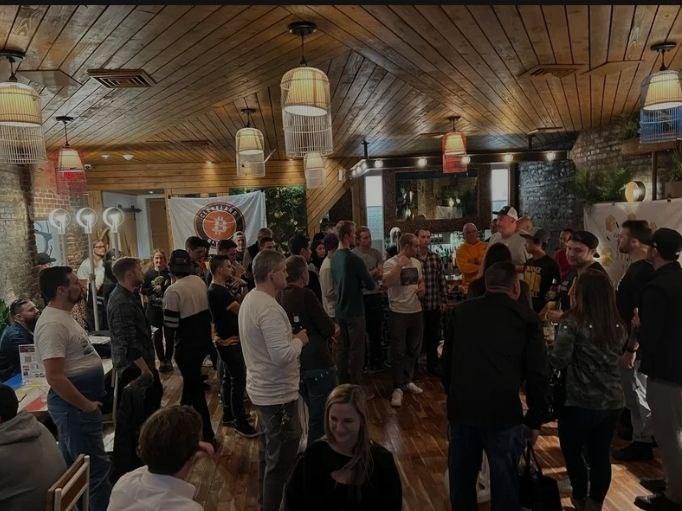
First Steps
- So, where did it all begin for you and what made you stay curious?
I first heard about bitcoin from a friend’s book recommendation, American Kingpin, the book about Silk Road (online drug marketplace). He is still not a true bitcoiner, although I helped him secure private keys with some bitcoin.
I was really busy at the time – focused on my school curriculum, running a 7-bedroom Airbnb, and working for a standardized test prep company. Bitcoin seemed too technical for me to explore, and the pace of my work left no time for it.
After graduating, while pursuing more training, I started playing around with stocks and maximizing my savings. Passive income seemed like the path to early retirement, as per the promise of the FIRE movement (Financial Independence, Retire Early). I mostly followed the mainstream news and my mentor’s advice – he liked preferred stocks at the time.
I had some Coinbase IOUs and remember sending bitcoin within the Coinbase ledger to a couple friends. I also recall the 2018 crash; I actually saw the legendary price spike live but couldn’t benefit because my funds were stuck amidst the frenzy. I withdrew from that investment completely for some time. Thankfully, my mentor advised to keep en eye on bitcoin.
Around late 2019, I started DCA-ing cautiously. Additionally, my friend and I were discussing famous billionaires, and how there was no curriculum for becoming a billionaire. So, I typed “billionaires” into my podcast app, and landed on We Study Billionaires podcast.
That’s where I kept hearing Preston Pysh mention bitcoin, before splitting into his own podcast series, Bitcoin Fundamentals. I didn’t understand most of the terminology of stocks, bonds, etc, yet I kept listening and trying to absorb it thru repetition. Today, I realize all that financial talk was mostly noise.
When people ask me for a technical explanation of fiat, I say: it’s all made up, just like the fiat price of bitcoin! Starting in 2020, during the so-called pandemic, I dove deeper. I religiously read Bitcoin Magazine, scrolled thru Bitcoin Twitter, and joined Simply Bitcoin Telegram group back when DarthCoin was an admin.
DarthCoin was my favorite bitcoiner – experienced, knowledgeable, and unapologetic. Watching him shift from rage to kindness, from passion to despair, gave me a glimpse at what a true educator’s journey would look like.
The struggle isn’t about adoption at scale anymore. It’s about reaching the few who are willing to study, take risks, and stay out of fiat traps. The vast majority won’t follow that example – not yet at least… if I start telling others the requirements for true freedom and prosperity, they would certainly say “Hell no!”
- At what point did you start teaching others, and why?
After college, I helped teach at a standardized test preparation company, and mentored some students one-on-one. I even tried working at a kindergarten briefly, but left quickly; Babysitting is not teaching.
What I discovered is that those who will succeed don’t really need my help – they would succeed with or without me, because they already have the inner drive.
Once you realize your people are perishing for lack of knowledge, the only rational thing to do is help raise their level of knowledge and understanding. That’s the Great Work.
I sometimes imagine myself as a political prisoner. If that were to happen, I’d probably start teaching fellow prisoners, doctors, janitors, even guards. In a way we already live in an open-air prison, So what else is there to do but teach, organize, and conspire to dismantle the Matrix?
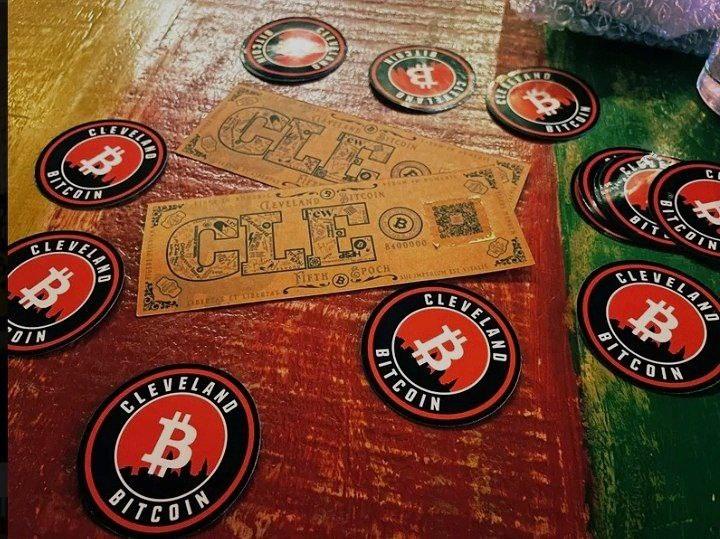
Building on Bitcoin
- You hosted some in-person meetups in Sacramento. What did you learn from those?
My first presentation was on MultiSig storage with SeedSigner, and submarine swaps through Boltz.exchange.
I realized quickly that I had overestimated the group’s technical background. Even the meetup organizer, a financial advisor, asked, “How is anyone supposed to follow these steps?” I responded that reading was required… He decided that Unchained is an easier way.
At a crypto meetup, I gave a much simpler talk, outlining how bitcoin will save the world, based on a DarthCoin’s guide. Only one person stuck around to ask questions – a man who seemed a little out there, and did not really seem to get the message beyond the strength of cryptographic security of bitcoin.
Again, I overestimated the audience’s readiness. That forced me to rethink my strategy. People are extremely early and reluctant to study.
- Now in Ohio, you hold sessions via the Orange Pill App. What’s changed?
My new motto is: educate the educators. The corollary is: don’t orange-pill stupid normies (as DarthCoin puts it).
I’ve shifted to small, technical sessions in order to raise a few solid guardians of this esoteric knowledge who really get it and can carry it forward.
The youngest attendee at one of my sessions is a newborn baby – he mostly sleeps, but maybe he still absorbs some of the educational vibes.
- How do local groups like Sactown and Cleveland Bitcoiners influence your work?
Every meetup reflects its local culture. Sacramento and Bay Area Bitcoiners, for example, do camping trips – once we camped through a desert storm, shielding our burgers from sand while others went to shoot guns.
Cleveland Bitcoiners are different. They amass large gatherings. They recently threw a 100k party. They do a bit more community outreach. Some are curious about the esoteric topics such as jurisdiction, spirituality, and healthful living.
I have no permanent allegiance to any state, race, or group. I go where I can teach and learn. I anticipate that in my next phase, I’ll meet Bitcoiners so advanced that I’ll have to give up my fiat job and focus full-time on serious projects where real health and wealth are on the line.
Hopefully, I’ll be ready. I believe the universe always challenges you exactly to your limit – no less, no more.
- What do people struggle with the most when it comes to technical education?
The biggest struggle isn’t technical – it’s a lack of deep curiosity. People ask “how” and “what” – how do I set up a node, what should one do with the lightning channels? But very few ask “why?”
Why does on-chain bitcoin not contribute to the circular economy? Why is it essential to run Lightning? Why did humanity fall into mental enslavement in the first place?
I’d rather teach two-year-olds who constantly ask “why” than adults who ask how to flip a profit. What worries me most is that most two-year-olds will grow up asking state-funded AI bots for answers and live according to its recommendations.
- One Cleveland Bitcoiner shows up at gold bug meetups. How valuable is face-to-face education?
I don’t think the older generation is going to reverse the current human condition. Most of them have been under mind control for too long, and they just don’t have the attention span to study and change their ways.
They’re better off stacking gold and helping fund their grandkids’ education. If I were to focus on a demographic, I’d go for teenagers – high school age – because by college, the indoctrination is usually too strong, and they’re chasing fiat mastery.
As for the gold bug meetup? Perhaps one day I will show up with a ukulele to sing some bitcoin-themed songs. Seniors love such entertainment.
- How do you choose what to focus on in your sessions, especially for different types of learners?
I don’t come in with a rigid agenda. I’ve collected a massive library of resources over the years and never stopped reading. My browser tab and folder count are exploding.
At the meetup, people share questions or topics they’re curious about, then I take that home, do my homework, and bring back a session based on those themes. I give them the key takeaways, plus where to dive deeper.
Most people won’t – or can’t – study the way I do, and I expect attendees to put in the work. I suspect that it’s more important to reach those who want to learn but don’t know how, the so-called nescient (not knowing), rather than the ignorant.
There are way too many ignorant bitcoiners, so my mission is to find those who are curious what’s beyond the facade of fake reality and superficial promises.
That naturally means that fewer people show up, and that’s fine. I’m not here for the crowds; I’m here to educate the educators. One bitcoiner who came decided to branch off into self-custody sessions and that’s awesome. Personally, I’m much more focused on Lightning.
I want to see broader adoption of tools like auth, sign-message, NWC, and LSPs. Next month, I’m going deep into eCash solutions, because let’s face it – most newcomers won’t be able to afford their own UTXO or open a lightning channel; additionally, it has to be fun and easy for them to transact sats, otherwise they won’t do it. Additionally, they’ll need to rely on
-
 @ eb0157af:77ab6c55
2025-06-02 15:02:12
@ eb0157af:77ab6c55
2025-06-02 15:02:12An analysis of the present and a look at the future of Bitcoin mining, between data, critical reflections and a personal vision on the role of this industry.
Before jumping on bitcoin and proposing it to their clientele as an investment instrument, traditional finance started with a more classic approach, beginning to purchase shares of mining companies and thus exposing themselves indirectly to the asset. Bitcoin mining today is a real industry, also composed of large players listed on the stock exchange that have received huge capital from investment funds like BlackRock. Furthermore, more and more mining companies are taking the path of listing on stock markets to manage to attract capital and some of these also manage pools, like Marathon. How was all this possible and what are the implications of this situation?
Mining pools
Mining pools aggregate the computing power of multiple miners to increase the chances of mining a block. They create the block template and use the collective hashrate to try to solve it. The reward is then divided among participants in proportion to the power provided.
Today pools use different methods to pay miners who provide computing power. One of these is called FPPS (Fully Pay Per Share), which offers a fixed and constant payment to the miner (which varies based on the computing power provided), regardless of whether the pool mines a block or not. This type of payment makes the revenues of a company that mines bitcoin calculable and constant and which, consequently, becomes more appealing to the market because it’s possible to calculate its ROI (Return On Investment). In essence, with this type of payment, uncertainty is excluded and returns are made predictable. Mining pools take on the risk because, in case they fail to mine blocks for a certain period of time, they could go into loss having to pay miners anyway. We can therefore venture that mining pools have helped the entry of traditional finance into bitcoin mining, taking on part of the risks. But this is my thought.
Mining today
Mining pools today are not that many and we have a strong concentration of miners in some of them. If we sum the hashrate of Foundry and AntPool we exceed 50% of global computing power. This is not an optimal condition. Now however let’s also look at the other side of the coin. First of all, although mining pools have great power, they cannot play with fire and must be very transparent about their operations towards miners, because miners can direct their hashrate towards another pool very quickly. And this is a fundamental element that also recalls game theory a bit, because a mining pool must not only serve its own interest, but also the interest of its “partners”, otherwise it loses everything. I believe that mining pools are well aware of their power and also know that they are a centralization point for the network and, today, also a point of attack by authorities, so they have every interest in finding solutions that allow them to continue doing business, but that relieve them somewhat of responsibilities.
On the miner side instead, we have increasingly large companies that collect enormous capital and produce a lot of hashrate, but my fear is that this hashrate is produced by a fiat economy and is very precarious. Hashrate is closely linked to price, because if the price drops below a certain threshold, miners are no longer profitable and are forced to turn off the machines, or, in the worst cases, to completely cease activity, consequently causing hashrate to collapse. Fortunately Bitcoin has mechanisms like difficulty adjustment that mitigate these situations. Being still a very small market, the entry of large institutional players first in mining companies and then directly on the underlying asset, could lead to strong price oscillations that also impact mining farms. All this makes hashrate very unstable too.
Something is changing
The development of Stratum V2 has started an attempt to solve the various problems that afflict pooled mining. Stratum is the communication protocol between mining farms and mining pools. Version 2 brings, in addition to data improvement and encryption, performance increases and gives each individual miner the possibility to create the template of the block to mine. Furthermore we also have other existing solutions that try to solve the problems described before in a somewhat different way, like Ocean pool, which has implemented its DATUM protocol (similar to Stratum V2) and which uses a miner payment method called TIDES, that is an evolution of FPPS and non-custodial PPLNS in which miner addresses are inserted directly into the coinbase transaction.
There’s also a lot of ferment on the miner side, for example with the advent of Bitaxe, an open source project that we can define almost as a movement, an ideology. Skot, the precursor of this movement, has essentially reverse engineered the professional machinery used to mine bitcoin and managed to create a “desktop” device that contains a real ASIC chip, consumes only a few watts and can be built at home. Obviously these products produce computing power not sufficient to try to be competitive, but they are bringing back solo mining and are giving enthusiasts the possibility to deepen this sector by exploiting a device of very small dimensions and with practically negligible consumption on the bill.
The future of mining
After analyzing the state we are in, we can start speculations and let our minds travel.
Let’s start with mining pools. Will they still exist? I would say yes, in what form I don’t know, but I think they will certainly lose the control they have today over block template creation and I also think that future solutions will be found (in addition to existing ones) to become non-custodial and directly remunerate miners. In the end it’s in their interest to always be competitive in terms of services offered, because they work on commission, so they have to be appealing.
As for miners instead, I see a bigger metamorphosis. If the intention is to consume eco-sustainable energy, then energy industries will necessarily have to start studying the benefits that mining can bring in this sense. They cannot continue to ignore them. And if this happens, then I imagine a future where energy companies themselves will start mining bitcoin and will no longer do so following market logic, but will shift focus to stabilizing the electrical grid. Mining is currently the only industry capable of being so flexible as to be able to absorb all the excess energy of a plant, but at the same time consume zero when energy is needed by the grid. At that point the raw mining activity could become no longer the main business, but a secondary benefit that will allow them to have alternative income compared to selling electricity.
And what about the Bitaxe movement? Hard to say, but in my opinion if it manages to reach a critical mass of enthusiasts, it could really start to emerge and become a fundamental piece for the “true bitcoiner” kit. Utopistically, if we had 50 or 100 million Bitaxes scattered in people’s homes, we would manage to distribute mining in a more widespread way, but above all we would have a part of the total hashrate totally uncorrelated from bitcoin price, because, given their very reduced consumption, Bitaxes would remain on and continue to produce hashrate regardless of energy cost or price oscillations of the underlying asset.
What will happen, then, after 2140, when no more bitcoins will be mined? Assuming that network fees will be much higher than today, and sufficient to keep the activity profitable, we could find ourselves in a situation where mining for pure profit will be downsized. The same companies, however, could become external service providers for grid balancing, or, as mentioned previously, become electricity producers themselves of renewable energy exploiting their experience in mining to push where today it’s not economically convenient. Even in our homes we could have a boiler, a heat pump or a water heating system for the pool that, while doing its job, also mines bitcoin. In short, a future that seems like a fairy tale, but so possible that we want to live it and make sure that my children are also protagonists of it.
The post The future of mining? Green and decentralized appeared first on Atlas21.
-
 @ 5fbec235:ff265c2a
2025-06-01 15:33:20
@ 5fbec235:ff265c2a
2025-06-01 15:33:20Safety as a Community Creation
I quickly learned that Japan is known for being one of the safest countries in the world—yes, I didn't even realize that until I arrived there. But understanding safety as a statistic is different from witnessing it as a lived reality.
One of the most striking signals of this safety was watching first graders take themselves to school on public transportation in Tokyo. These tiny humans, navigating one of the world's largest cities completely independently. In contrast, my Chicago suburban hometown requires parents to wait at the bus stop for children of that same age, even if their house is just across the street.
I witnessed nearly everyone glued to their phones while out in public. Literally dozens of heads planted facedown into their palms while crossing major intersections. While that's not a trait I admire, it reflects the absolute safety every citizen must feel to be able to walk around like that. Similarly, Tokyo is definitely the place where you can show off designer fashion trends if you can afford to do so. While the style is far more modest and homogenous than here in the USA, expensive fashion statements are still blatantly made in the many high-trafficked districts of the mega city.
The contrast hit me viscerally when I remembered my friend's experience in São Paulo a few years ago. During a short three-mile run, while he was checking Google Maps, he was nearly mugged by a thief on a motorbike. The difference was unmistakable. Take heed of all warnings to not use a smart phone in the streets of Sào Paulo. Tokyo however - accidentally leave your phone at the Izakaya? Don't be surprised if it is personally returned to you by the owner of the Izakaya with a note thanking you once again for your earlier patronage.
Community M and the Dissolution of Transactional Relationships
While in Japan, I was invited to spend the weekend in an exclusive, members-only community nestled along a river flowing down from the mountains—remarkably, all still within Tokyo Prefecture. It felt like a hidden gem: only 5% of the prefecture consists of this kind of natural landscape, and I never would have discovered it without that special invitation.
There, I participated in a unique Bonsai class led by a woman who has been cultivating Bonsai her entire career. I also shared meals, nature walks, and sauna sessions with other community members. It was an eventful weekend, meeting and integrating with an entirely unique culture. The weekend felt truly memorable, special, everlasting—essentially boiled down to a priceless experience.
It's an experience I will remember and appreciate more than the time I've spent in several corporate luxury hotels. Don't get me wrong, corporate luxury hotels are very nice. Their amenities are much more comfortable than anything Community M could offer me. They feel safe, and they make me feel just a little bit entitled—in the sense that "I'm spending A LOT of money with the company that keeps you employed... so are you working for me to the maximum of our mutual expectations?" That's certainly okay. The hotel is offering a service and I am paying for it. Ultimately, it is indeed a mutually valuable transaction everyone is happy with.
But that time spent with Community M was something different. The amount of money I could have spent with them didn't matter. Friendships were formed over shared interests and probably genuine interest and curiosity in each other's cultures. Those values get washed away when the power dynamic shifts too much toward a monetary transaction—service in exchange for cash.
This experience crystallized something I'd been feeling but couldn't articulate: the difference between being served and being welcomed. In transactional relationships, your value is determined by your purchasing power. In genuine community, your value comes from your participation, your curiosity, your willingness to share and receive.
What Online Communities Could Become
What should online communities of the future look like? I think an amazing community could pull some of the best traits of American and Japanese culture. Reliance on oneself and personal responsibility is incredibly important. But as communities grow, it becomes so much harder to exercise personal interests without feeling like I'm "barging in" or something. I've never felt compelled to become the center of attention. What gets me excited is seeing people come together and being their best selves naturally and organically around one another, without any single person being too much "the center."
The way I see a lot of online communities advertised today is less desirable to me. It often looks like there's an influencer selling something and inviting all their followers to join "the community." This replicates the same extractive, transactional dynamics I experienced in luxury hotels, just digitally.
I left Japan with a sense of respect for what's possible when people come together under a shared understanding of a few basic human principles. The most obvious one being a sense of shared responsibility to look out for one another, thereby providing safety for all—a large, functional neighborhood watch, so to say. In Japan, I got the sense that the means to provide general well-being through shared responsibility is far greater than the more exclusive reliance on oneself and distrust of others that often appears in large American cities.
The Internet as Unsafe Territory
When thinking of safety and shared responsibility, the internet today is more like New York City than Tokyo. It's not safe for children, and outsourcing our own responsibility for maintaining safety to centralized, profit-seeking organizations makes no sense. These platforms have the undisputed goal of extracting value from the very communities they attempt to serve.
Current online communities are built backwards. Instead of communities creating tools for themselves, external platforms create tools to extract value from communities. The power dynamic is fundamentally extractive rather than generative.
Communities Building for Themselves
Eve will allow us to build intranets that are safer than anything YouTube, Facebook, TikTok, or any other platform could ever provide because they'll be built by communities, not for-profit organizations seeking to extract value. All applications will be open source, therefore all algorithms will be open source, thereby empowering everyone to exercise their shared responsibilities for maintaining safe, prosperous communities.
Communities will be enabled to create applications that deliver unique experiences specific to their rules and guidelines. Compare it to my Bonsai class. Someday there may be a Japan-oriented community where Bonsai masterclasses and other Bonsai-related services and products are offered. Communities won't be as dependent on platforms. Because of the open-source standard, more tradespeople will be enabled to quickly build whatever the community deems necessary. Communities will be in full control and not reliant on any one platform, nor any one person to maintain the community.
What I experienced in that members-only community by the river was a space where relationships form around shared interests and genuine curiosity - where the community itself determines its needs and builds its tools, where safety emerges from collective responsibility rather than external enforcement. In our digital age of abundance - I see a very real future where communities are enabled to free themselves from irrelevant distractions and build what they need to achieve both individual and collective prosperity.
-
 @ 8bad92c3:ca714aa5
2025-06-02 17:02:11
@ 8bad92c3:ca714aa5
2025-06-02 17:02:11Marty's Bent
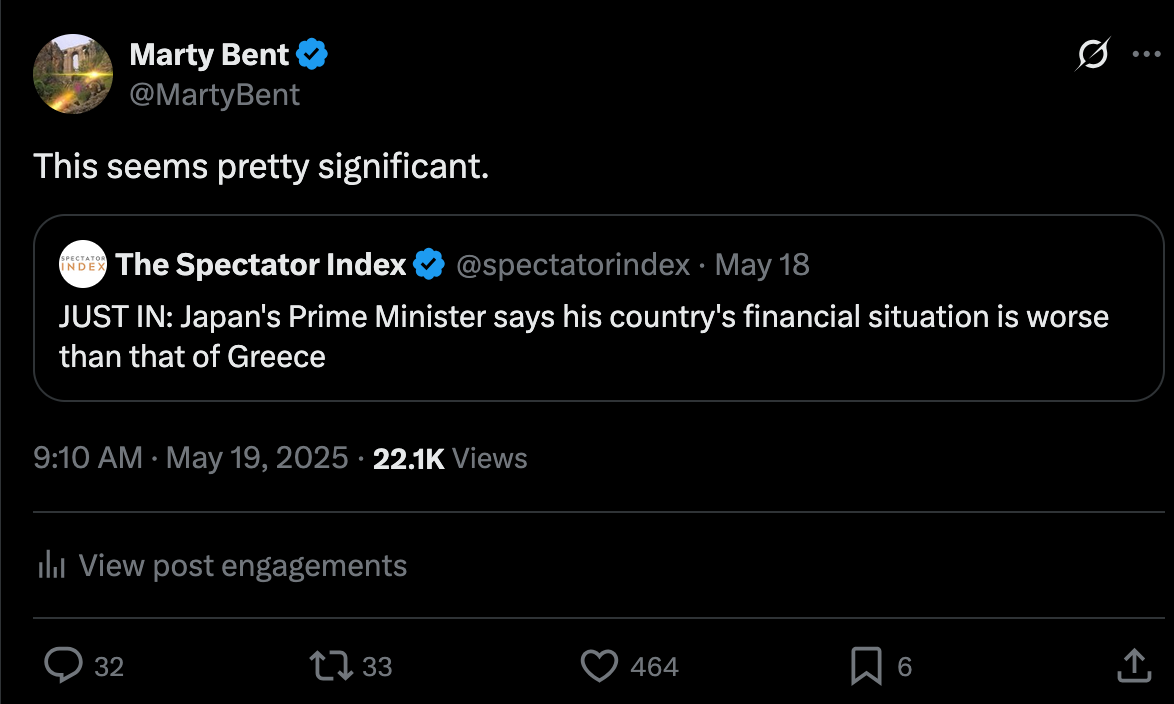
via me

Don't sleep on what's happening in Japan right now. We've been covering the country and the fact that they've lost control of their yield curve since late last year. After many years of making it a top priority from a monetary policy perspective, last year the Bank of Japan decided to give up on yield curve control in an attempt to reel inflation. This has sent yields for the 30-year and 40-year Japanese government bonds to levels not seen since the early 2000s in the case of the 30-year and levels never before seen for the 40-year, which was launched in 2007. With a debt to GDP ratio that has surpassed 250% and a population that is aging out with an insufficient amount of births to replace the aging workforce, it's hard to see how Japan can get out of this conundrum without some sort of economic collapse.


This puts the United States in a tough position considering the fact that Japan is one of the largest holders of U.S. Treasury bonds with more than $1.20 trillion in exposure. If things get too out of control in Japan and the yield curve continues to drift higher and inflation continues to creep higher Japan can find itself in a situation where it's a forced seller of US Treasuries as they attempt to strengthen the yen. Another aspect to consider is the fact that investors may see the higher yields on Japanese government bonds and decide to purchase them instead of US Treasuries. This is something to keep an eye on in the weeks to come. Particularly if higher rates drive a higher cost of capital, which leads to even more inflation. As producers are forced to increase their prices to ensure that they can manage their debt repayments.
It's never a good sign when the Japanese Prime Minister is coming out to proclaim that his country's financial situation is worse than Greece's, which has been a laughing stock of Europe for the better part of three decades. Japan is a very proud nation, and the fact that its Prime Minister made a statement like this should not be underappreciated.
As we noted last week, the 10-year and 30-year U.S. Treasury bonds are drifting higher as well. Earlier today, the 30-year bond yield surpassed 5%, which has been a psychological level that many have been pointed to as a critical tipping point. When you take a step back and look around the world it seems pretty clear that bond markets are sending a very strong signal. And that signal is that something is not well in the back end of the financial system.
This is even made clear when you look at the private sector, particularly at consumer debt. In late March, we warned of the growing trend of buy now, pay later schemes drifting down market as major credit card companies released charge-off data which showed charge-off rates reaching levels not seen since the 2008 great financial crisis. At the time, we could only surmise that Klarna was experiencing similar charge-off rates on the bigger-ticket items they financed and started doing deals with companies like DoorDash to finance burrito deliveries in an attempt to move down market to finance smaller ticket items with a higher potential of getting paid back. It seems like that inclination was correct as Klarna released data earlier today showing more losses on their book as consumers find it extremely hard to pay back their debts.
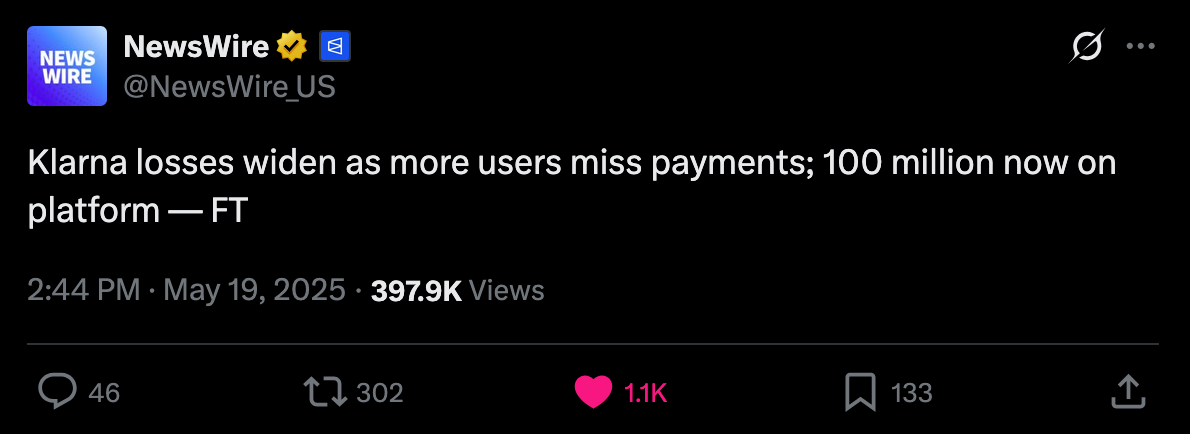
via NewsWire
This news hit the markets on the same day as the average rate of the 30-year mortgage in the United States rose to 7.04%. I'm not sure if you've checked lately, but real estate prices are still relatively elevated outside of a few big cities who expanded supply significantly during the COVID era as people flooded out of blue states towards red states. It's hard to imagine that many people can afford a house based off of sticker price alone, but with a 7% 30-year mortgage rate it's becoming clear that the ability of the Common Man to buy a house is simply becoming impossible.

via Lance Lambert
The mortgage rate data is not the only thing you need to look at to understand that it's becoming impossible for the Common Man of working age to buy a house. New data has recently been released that highlights That the median home buyer in 2007 was born in 1968, and the median home buyer in 2024 was born in 1968. Truly wild when you think of it. As our friend Darth Powell cheekily highlights below, we find ourselves in a situation where boomers are simply trading houses and the younger generations are becoming indentured slaves. Forever destined to rent because of the complete inability to afford to buy a house.
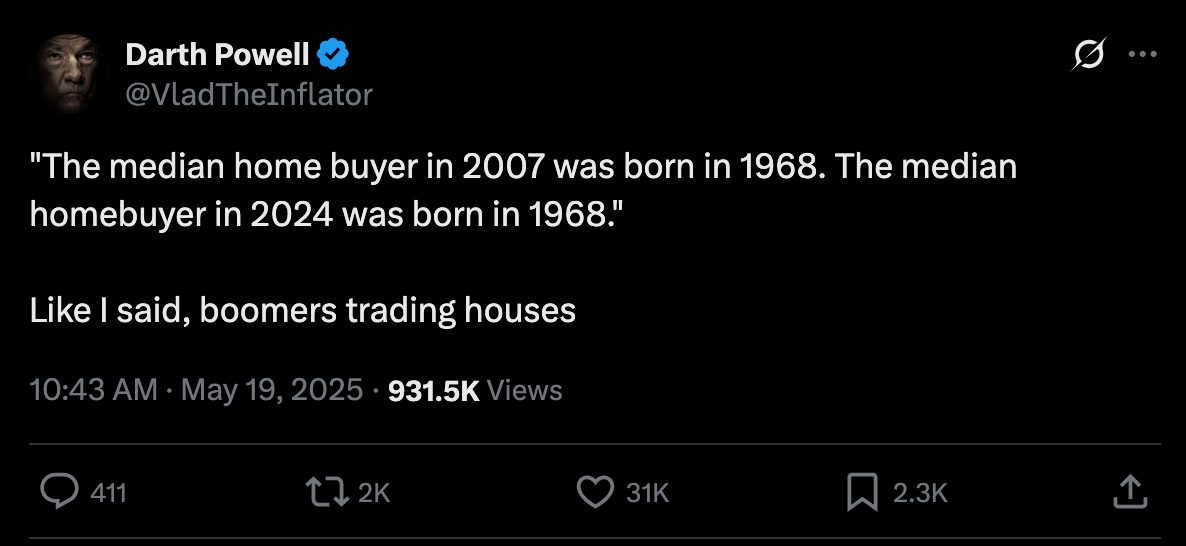
via Darth Powell
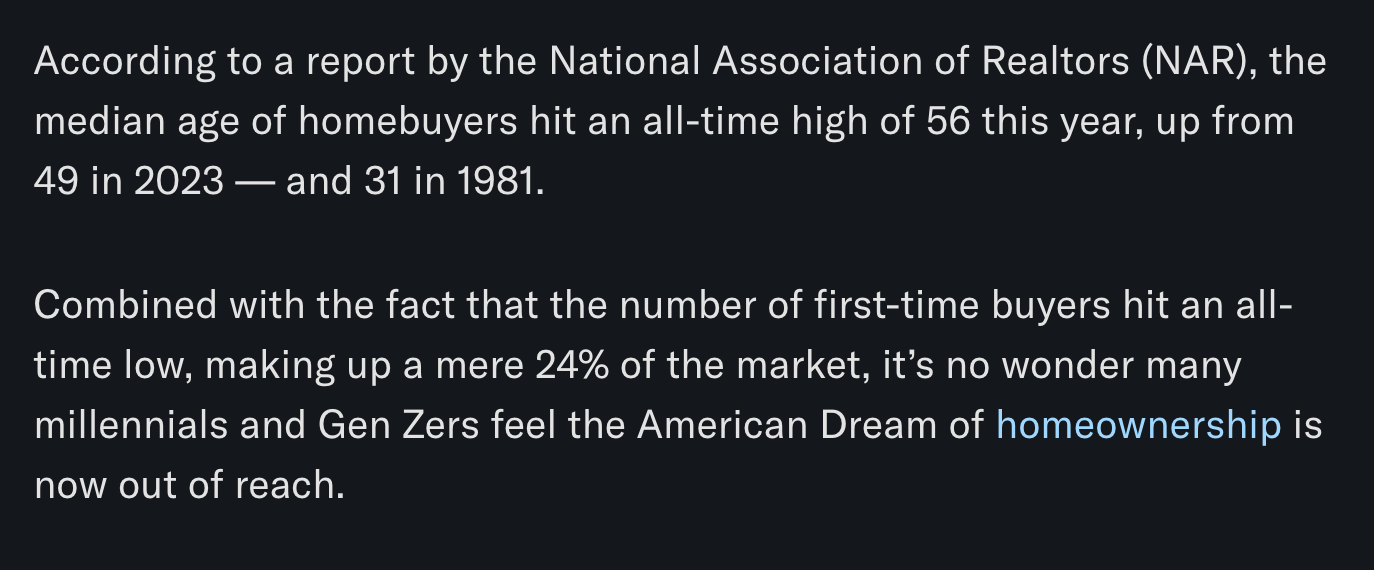
via Yahoo Finance
Meanwhile, Bitcoin re-approached all-time highs late this evening and looks primed for another breakout to the upside. This makes sense if you're paying attention. The high-velocity trash economy running on an obscene amount of debt in both the public and private sectors seems to be breaking at the seams. All the alarm bells are signaling that another big print is coming. And if you hope to preserve your purchasing power or, ideally, increase it as the big print approaches, the only thing that makes sense is to funnel your money into the hardest asset in the world, which is Bitcoin.

via Bitbo
Buckle up, freaks. It's gonna be a bumpy ride. Stay humble, Stack Sats.
Trump's Middle East Peace Strategy: Redefining U.S. Foreign Policy
In his recent Middle East tour, President Trump signaled what our guest Dr. Anas Alhajji calls "a major change in US policy." Trump explicitly rejected the nation-building strategies of his predecessors, contrasting the devastation in Afghanistan and Iraq with the prosperity of countries like Saudi Arabia and UAE. This marks a profound shift from both Republican and Democratic foreign policy orthodoxy. As Alhajji noted, Trump's willingness to meet with Syrian President Assad follows a historical pattern where former adversaries eventually become diplomatic partners.
"This is really one of the most important shifts in US foreign policy to say, look, sorry, we destroyed those countries because we tried to rebuild them and it was a big mistake." - Dr. Anas Alhajji
The administration's new approach emphasizes negotiation over intervention. Rather than military solutions, Trump is engaging with groups previously considered off-limits, including the Houthis, Hamas, and Iran. This pragmatic stance prioritizes economic cooperation and regional stability over ideological confrontation. The focus on trade deals and investment rather than regime change represents a fundamental reimagining of America's role in the Middle East.
Check out the full podcast here for more on the Iran nuclear situation, energy market predictions, and why AI development could create power grid challenges.
Headlines of the Day
Bitcoin Soars to $106K While Bonds Lose 40% Since 2020 - via X
US Senate Advances Stablecoin Bill As America Embraces Bitcoin - via X
Get our new STACK SATS hat - via tftcmerch.io
Texas House Debates Bill For State-Run Bitcoin Reserve - via X
Take the First Step Off the Exchange
Bitkey is an easy, secure way to move your Bitcoin into self-custody. With simple setup and built-in recovery, it’s the perfect starting point for getting your coins off centralized platforms and into cold storage—no complexity, no middlemen.
Take control. Start with Bitkey.
Use the promo code *“TFTC20”* during checkout for 20% off
_Ten31, the largest bitcoin-focused investor, has deployed 158
-
 @ c1e9ab3a:9cb56b43
2025-06-01 13:54:06
@ c1e9ab3a:9cb56b43
2025-06-01 13:54:061. Introduction
Over the last 250 years the world’s appetite for energy has soared along an unmistakably exponential trajectory, transforming societies and economies alike. After a half‑century of relative deceleration, a new mix of technological, demographic and political forces now hints at an impending catch‑up phase that could push demand back onto its centuries‑long growth curve. This post knits together the history, the numbers and the newest policy signals to explore what that rebound might look like—and how Gen‑4 nuclear power could meet it.
2. The Long Exponential: 1750 – 1975
Early industrialisation replaced muscle, wood and water with coal‑fired steam, pushing global primary energy use from a few exajoules per year in 1750 to roughly 60 EJ by 1900 and 250 EJ by 1975. Over that span aggregate consumption doubled roughly every 25–35 years, equivalent to a long‑run compound growth rate of ~3 % yr‑¹. Per‑capita use climbed even faster in industrialised economies as factories, railways and electric lighting spread.
3. 1975 – 2025: The Great Slowdown
3.1 Efficiency & Structural Change
• Oil shocks (1973, 1979) and volatile prices pushed OECD economies to squeeze more GDP from each joule.
• Services displaced heavy industry in rich countries, trimming energy intensity.
• Refrigerators, motors and vehicles became dramatically more efficient.3.2 Policy & Technology
• The Inflation Reduction Act (U.S.) now layers zero‑emission production credits and technology‑neutral tax incentives on top of existing nuclear PTCs citeturn1search0turn1search2.
• The EU’s Net‑Zero Industry Act aims to streamline siting and finance for “net‑zero technologies”, explicitly naming advanced nuclear citeturn0search1.3.3 Result
Global primary energy in 2024 stands near 600 EJ (≈ 167 000 TWh)—still growing, but the line has flattened versus the pre‑1975 exponential.
4. Population & Per‑Capita Demand
World population tripled between 1950 and today, yet total energy use grew roughly six‑fold. The imbalance reflects rising living standards and electrification. Looking ahead, the UN projects population to plateau near 10.4 billion in the 2080s, but per‑capita demand is poised to climb as the Global South industrialises.
5. The Policy Pivot of 2023‑2025
| Region | Signal | Year | Implication | |--------|--------|------|-------------| | COP 28 Declaration | 20+ nations pledge to triple nuclear capacity by 2050 | 2023 | High‑level political cover for rapid nuclear build‑out citeturn0search2 | | Europe | Post‑crisis sentiment shifts; blackout in Iberia re‑opens nuclear debate | 2025 | Spain, Germany, Switzerland and others revisit phase‑outs citeturn0news63 | | United States | TVA submits first SMR construction permit; NRC advances BWRX‑300 review | 2025 | Regulatory pathway for fleet deployment citeturn1search9turn1search1 | | Global Strategy Report | “Six Dimensions for Success” playbook for new nuclear entrants | 2025 | Practical roadmap for emerging economies citeturn0search0 | | U.S. Congress | Proposed cuts to DOE loan office threaten build‑out pace | 2025 | Finance bottleneck remains a risk citeturn1news28 |
6. The Catch‑Up Scenario
Suppose the recent 50‑year pause ends in 2025, and total energy demand returns to a midpoint historical doubling period of 12.5 years (the average of the 10–15 year rebound window).
6.1 Consumption Trajectory
| Year | Doublings since 2024 | Demand (TWh) | |------|----------------------|--------------| | 2024 | 0 | 167 000 | | 2037 | 1 | 334 000 | | 2050 | 2 | 668 000 | | 2062 | 3 | 1 336 000 |
(Table ignores efficiency gains from electrification for a conservative, supply‑side sizing.)
7. Nuclear‑Only Supply Model
7.1 Reactor Math
- 1 GWᵉ Gen‑4 reactor → 8.76 TWh yr‑¹ at 100 % capacity factor.
- 2062 requirement: 1 336 000 TWh yr‑¹ → ≈ 152 500 reactors in steady state.
- Build rate (2025‑2062, linear deployment):
152 500 ÷ 38 years ≈ 4 000 reactors per year globally.
(Down from the earlier 5 000 yr‑¹ estimate because the deployment window now stretches 38 years instead of 30.)
7.2 Policy Benchmarks
- COP 28 triple target translates to +780 GW (if baseline 2020 ≈ 390 GW). That is <100 1 GW units per year—two orders of magnitude lower than the theoretical catch‑up requirement, highlighting just how aggressive our thought experiment is.
7.3 Distributed vs Grid‑Centric
Small Modular Reactors (300 MW class) can be sited on retiring coal plants, using existing grid interconnects and cooling, vastly reducing new transmission needs. Ultra‑large “gigawatt corridors” become optional rather than mandatory, though meshed regional grids still improve resilience and market liquidity.
8. Challenges & Unknowns
- Finance: Even with IRA‑style credits, first‑of‑a‑kind Gen‑4 builds carry high cost of capital.
- Supply Chain: 4 000 reactors a year means a reactor‑grade steel output roughly 20× today’s level.
- Waste & Public Trust: Advanced reactors can burn actinides, but geologic repositories remain essential.
- Workforce: Nuclear engineers, welders and regulators are already in short supply.
- Competing Technologies: Cheap renewables + storage and prospective fusion could displace part of the projected load.
9. Conclusions
Recent policy shifts—from Europe’s Net‑Zero Industry Act to the COP 28 nuclear declaration—signal that governments once again see nuclear energy as indispensable to deep decarbonisation. Yet meeting an exponential catch‑up in demand would require deployment rates an order of magnitude beyond today’s commitments, testing manufacturing capacity, finance and political resolve.
Whether the future follows the modest path now embedded in policy or the steeper curve sketched here, two convictions stand out:
- Electrification will dominate new energy demand.
- Scalable, dispatchable low‑carbon generation—likely including large fleets of Gen‑4 fission plants—must fill much of that gap if net‑zero targets are to remain credible.
Last updated 1 June 2025.
-
 @ eb0157af:77ab6c55
2025-06-02 15:02:11
@ eb0157af:77ab6c55
2025-06-02 15:02:11The Pakistani government embraces Bitcoin, following the example set by the United States.
Pakistan has officially announced the creation of a strategic Bitcoin reserve. The announcement was made during the Bitcoin 2025 conference in Las Vegas, marking a significant shift from the government’s previous stance against digital assets.
During the event, Bilal Bin Saqib, head of the Pakistani Crypto Council, shared the country’s decision:
“Today, I announce the Pakistani government is setting up its own government-led Bitcoin Strategic Reserve, and we want to thank the United States of America again because we were inspired by them.”
Bin Saqib then added:
“This wallet, the national Bitcoin wallet, is not for speculation. We will be holding these bitcoins and we will never, ever sell them.”
It remains unclear how the bitcoins will be acquired, whether through direct purchases or other means.
Pakistan’s shift in approach toward digital assets traces back to last February, when the government first explored the idea of creating a National Crypto Council. This body was designed to oversee the development of a comprehensive regulatory framework for cryptocurrencies and to attract foreign investment in the sector.
The Council’s proposed initiatives included projects such as utilizing surplus energy for Bitcoin mining, building high-performance data centers, and accumulating Bitcoin for the national treasury.
Just a few days ago, the Council officially allocated 2,000 megawatts of surplus energy to support mining operations and AI data centers.
Moreover, Changpeng Zhao, co-founder of Binance, was appointed as an advisor to the Council in April, offering expertise on crypto regulations, blockchain infrastructure, and the adoption of digital assets.
To further consolidate this new approach, the Pakistani Ministry of Finance has commissioned the creation of the Digital Asset Authority, an agency dedicated to supervising digital asset regulations and issuing licenses for crypto service providers operating within the country.
The post Pakistan announces the creation of a strategic Bitcoin reserve appeared first on Atlas21.


